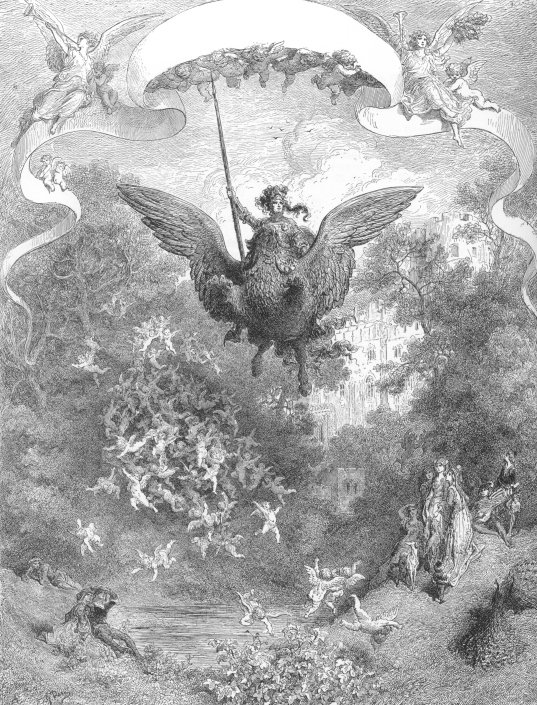HISTOIRE DES QUATRE FILS AYMON
(THE FOUR SONS OF AYMON)
Based on the 12th century poem "Renaud de Montauban"
and the 14th century prose "Histoire des Quatre Fils Aymon"
From the Bibliothèque Bleue published in 1726 by Pierre Garnier in Troyes
Modern French by Charles Marcilly 1883
Illustrated by Eugène Grasset 1883
Modern English by Nol Drek 2025
HISTOIRE DES QUATRE FILS AYMON (THE FOUR SONS OF AYMON)
CHAPTER 1 - How Emperor Charlemagne knighted the four sons of Aymon, and how Duke Beuves of Aigremont killed Lohier, son of Charlemagne.
We read in the history of King Charlemagne that once during the feast of
Pentecost he held a great Court in Paris after he had returned from the
wars in Lombardy where there had been a great battle against the
Saracens whose leader was called Guerdelin the Fène, who was killed by
Charlemagne. There were killed many dukes, counts, princes, barons, and
knights, like Salomon of Brittany, Hoël Count of Le Mans, Lord Arnoul of
Breulon, Lord Galeran of Bouillon, and several other great lords. The
Twelve Peers of France came to the court. [1] Many Germans, English,
Normans, Poitevins, Bérules, and Lombards were there. There came among
others the valiant Duke Aymon of Dordogne [2] who had brought his four
sons, namely Renaud, Alard, Guichard, and Richardet, who were handsome
and very courageous and mainly Renaud who was the tallest that one could
find in the world because he was sixteen feet tall.
When Charlemagne saw the entire court assembled, he addressed the barons
as follows: "My brothers and friends, you know that it is through your
valor that I have conquered a large number of towns and have brought
many Saracens under my power, witness the infidel Guerdelin whom I
defeated and whom I made embrace the Christian religion. Although I have
lost a lot of nobility through the fault of several of our vassals who
did not want to help us although we had sent for them, such as Gérard of
Roussillon, the Duke of Nanteuil, and the Duke Beuves of Aigremont, who
are all three brothers. I complain to you about them. For if it had not
been for Sir Salomon who came to help us with thirty thousand fighters
and Sir Lambert Berruyer and Sir Geoffroy of Bourdeille with Galeran of
Bouillon who carried our standard, we would have been defeated and
through the fault of three brothers who did not want to submit to our
orders, mainly the Duke of Aigremont, despite the fact that they have
all sworn an oath of loyalty to me. I will still summon him to come and
serve me with all his power and, in case he refuses, I will summon all
my subjects and friends, I will go and besiege Aigremont, and if we can
hold it I will have his son Maugis hanged and flayed alive. I will also
have his wife burned and will put his whole country to fire and blood.
Then Duke Naimon of Bavaria [3] stood up, and said to Charlemagne,
"Sire, there is no need to get angry. But if you listen to me, you will
send a messenger to the Duke of Aigremont, and you will have him
accompanied. He must be a prudent man who will show the duke what you
will charge him with and, according to his response, you will see what
you have to do."
Charlemagne answered him, "I approve of your advice." Then he thought to
himself which messenger he would choose who would be bold enough to
deliver his message to Duke Beuves. No one dared to come forward,
because several were from his family, like Duke Aymon of Dordogne who
was his first cousin, because they were four brothers from the same
father and the same mother. The king was angry and swore that he would
destroy the entire country of the duke. He then called his son Lohier
[4] and said to him, "My son, you must deliver this message. You will
take with you a hundred well-armed knights. You will tell Duke Beuves
that if he does not come to my court for the next feast of Saint John, I
will go and besiege Aigremont and destroy his country. I will have him
and his son hanged, and will have his wife burned."
"Sire," said Lohier, "I fear nothing. I will fulfill your message well."
Then Charlemagne was angry to have charged his son with this message,
but since he had said it, it had to be accomplished. The next morning,
Lohier and his men got dressed, mounted their horses, and came before
the king.
Lohier said to his father, "Sire, we are ready to carry out your
commands."
"My son, I commend you to God and pray that he will watch over you and
your men."
Lohier left with his company, and his father regretted it, not without
cause.
The messengers therefore set out against Aigremont, threatening Duke
Beuves. But a spy heard them and came immediately towards Aigremont, and
told the duke how the king's messengers were coming towards him,
threatening him, and having the king's son at their head.
The duke then said to his barons, who had gone to his court because of
the Pentecost celebrations, "Lords, the king thinks very little of me,
wanting me to go and serve him with all my people, and sending his
eldest son to threaten me. Dear barons, what do you advise me to do in
this circumstance?"
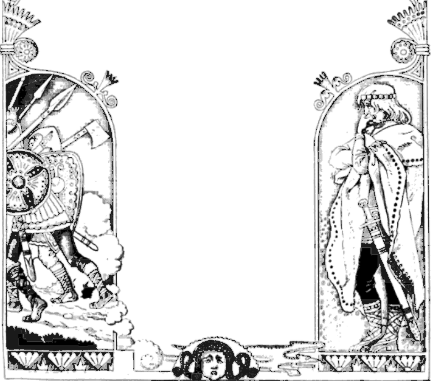
Then a wise and prudent knight named Lord Simon stood up and said to
him, "Lord, I advise you to receive the king's messengers honorably,
because you know that he is your lord, and you know that it is acting
against God and reason to fight against your lord. Do not have any
regard for your family or for the fact that your brothers Gérard of
Roussillon and the Duke of Nanteuil did not want to obey him. Know that
the king is powerful and can destroy you and your property if you do not
obey."
The duke replied that he would do nothing and that he was giving him bad
advice, because he said, "I have three brothers who will help me to
support the war against him. I also have four nephews who are all
courageous."
The duchess said to him, "Listen to your council, because you will never
be advised to make war against your lord. The law of God forbids it."
Then he looked at the duchess with an irritated air and forbade her to
speak to him further about this. There were lively disputes in the
Palace of Aigremont, because some said that the duchess advised well,
others badly. The duke then said to those who advised him not to obey
the king, that he would be grateful to them and that as long as he lived
he would not obey him. On the contrary, he would find friends to make
war against him.
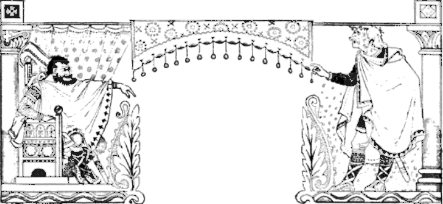
The king's messengers arrived at the castle of Aigremont, which is
located on a rock. It was flanked by large towers so that, by its
location and its strength, it was impregnable except by famine.
Lohier said to the lords who were with him, "Consider this fortress and
the river which passes at its foot. I do not believe that there is its
like in all of Christianity."
A knight named Savary then said to Lohier, "Lord, it seems to me that
the king, your father, is very foolish to undertake to destroy the Duke
of Aigremont, because he is very powerful. I believe that he will have
as many people to fight for him as your father the king does, if he
comes to attack him. They would have to be in good agreement. But I know
very well that if the king, your father, captured him, all the gold in
the world would not prevent him from having him hanged and flayed alive.
I beg you to speak gently to Duke Beuves, because he is very proud.
There could be a difficulty between you and him which would fall on us,
and we are too few."
Lohier replied, "I will speak cautiously, but if he tells us something
unpleasant, he will be the first to suffer."
They arrived at the gate of the castle of Aigremont where they knocked.
The gatekeeper asked them, "Lords, who are you?"
"Friend," said Lohier, "open the gate for us. We wish to speak to Duke
Beuves on behalf of the king."
"Wait a moment, I am going to speak to my lord the duke." So he went to
the palace and told the duke that there were many armed people at the
gate.
"My lord, please let me bring them in."
"Yes," said the duke, "because I do not fear them."
The gate was opened to them and Lohier and his people entered. They went
to the keep of the castle.
The duke said to his barons, "I see the king's eldest son coming. He
would do well to speak to me honestly, because if he says something that
displeases me, I will have the right."
Beuves was accompanied by two hundred knights. Meanwhile, Lohier entered
with his well-armed people into the hall of the palace that was full of
nobility and the duke was in their midst. Near him were the duchess and
her son Maugis, who had no equal in the art of necromancy and in
weapons. Lohier therefore entered at the head of his people.
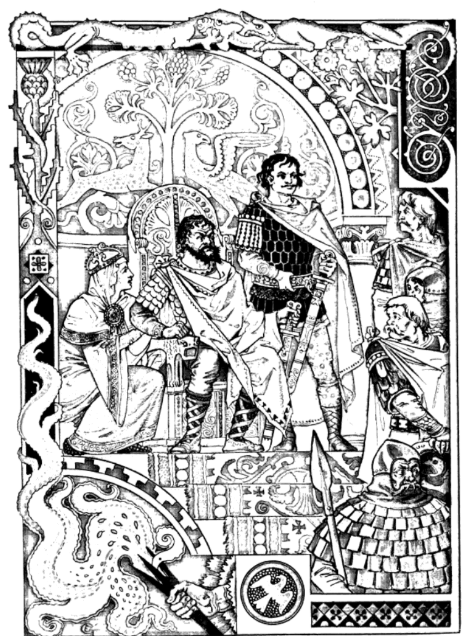
He spoke in this way: "May the Almighty God keep and preserve the king!
May he confound the Duke of Aigremont! The king, my father, commands you
to go to Paris with five hundred knights, to help him wherever he
pleases to send you, and also to answer to him for not being with him in
Lombardy against the Saracens, because it is through your fault that
Baudouin, Lord of Melun, Geoffrey of Bordeille, and several other
combatants died. You will be captured and taken to France as a traitor,
you will be flayed alive, your wife will be burned, and your children
will be exiled. Do what the king commands you, for you are his subject."
When Duke Beuves had heard Lohier, son of King Charlemagne, speak in
this way, he began to get angry, and told Lohier that he would not go to
the king, and that he held neither fortress nor castle from him. He
would go against him with all his power to destroy the Kingdom of
France.
Then Lohier said to him, "Vassal, how dare you respond like this? If the
king knew of your threats, he would come and destroy you! Remember that
you are his subject, and that you must obey him. So come and serve the
king, and listen to me, for if you do not, he will burn you and throw
your ashes to the wind."
When Duke Beuves heard him speak in this way, he stood up and said that
he who came to give him such a message from Charlemagne was unlucky, and
that he would never hear a response.
There was a noble knight of Duke Beuves's people who said to him, "My
lord, be careful not to do this folly! Let Lohier say what he wants, you
are worth neither more nor less. You know how powerful Charlemagne is,
because you are his subject, and you hold your castle of Aigremont and
your land from him. You would be wise to do this, for if you rise up
against your Lord, it can only do you harm."
The duke, hearing him speak, said to him, "Be silent, I will take
nothing from him as long as I can bear arms and ride a horse. I will
summon my brothers Gérard of Roussillon, the Duke of Nanteuil, and
Garnier, his son. We will then go and attack King Charlemagne. Wherever
I meet him, I will tell him what he thinks of me. All the gold in Paris
would not prevent me from killing the messenger who threatens me, even
if I were torn to pieces."
Lohier said to him, "I neither esteem you nor fear you."
Duke Beuves, stung by these words, exclaimed, "Barons, take hold of him!
He must perish!"
They did not dare to oppose his wishes. They all drew their swords and
threw themselves on Charlemagne's people. Lohier shouted at his ensign,
and began, with his people, to defend themselves. They fought in the
palace hall, and the rumor soon spread throughout the city. Then, you
would have seen townspeople and artisans with axes, swords, or sticks.
There were about seven thousand, but the entrance to the palace was
narrow, and the French were there, and prevented them from entering
easily. How terrible and unhappy that day was! Those who had less
strength were forced to fight courageously.
Lohier, seeing that his people were on the losing end, struck a knight
so roughly that he knocked him down dead at the feet of Beuves. He then
said, "Almighty God, who was born from the womb of a Virgin, and
suffered death and Passion to redeem humanity, deign to protect me from
death. I know very well that if you do not help me, the king my father
will never see me again."
The duke said to Lohier, "God grant that today is your end!"
"No," said Lohier. Then he gave the duke such a strong blow with his
sword that blood flowed into the room. He then said, "I knew well that
you would not escape."
The duke, furious, ran at him and struck him so cruelly that he knocked
him down dead at his feet. Thus unfortunately Lohier, eldest son of King
Charlemagne, perished. The cruel Duke Beuves cut off his head.
When the people of Lohier saw that their master was dead, they lost
their courage. Of a hundred who had come with Lohier, only twenty
remained. The duke had ten killed, and said to the ten others, "Promise
me, on your faith as knights, that you will carry your lord Lohier to
his father Charlemagne. You will tell him that I am sending him his son
whom, unfortunately for him, he sent to me. I will let you go at this
price, and you will tell him that I will not give him a penny. On the
contrary, I will go find him with a hundred thousand combatants and
ravage his country."
"Lord," they replied, "we will do what you please to command us." He had
a coffin made to put the body in. They put it on a cart and left the
city.
When they were in the fields, they began to cry, saying, "Alas! What
will we say to the king when he learns of your death? He will kill us."
Thus saddened, they went straight to Paris.
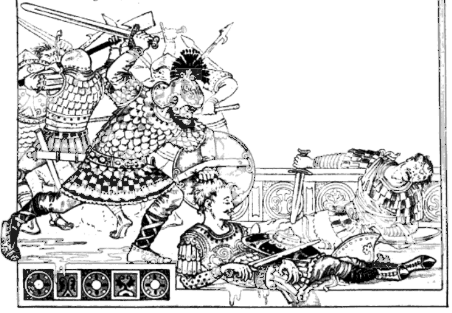
King Charlemagne, being there, said one day to his barons, "I am worried
about my son Lohier, whom I sent to Aigremont. I am afraid he had some
trouble with Duke Beuves, who is a proud man. I fear he killed him. But
I swear by my crown that, if he did it, I will go against him with a
hundred thousand men and have him hanged."
"Sire," said Duke Aymon, "if he has done wrong, you will do well to take
revenge. He is your vassal, he must respect you and serve you. He gets
his land from you. I would be sorry if you missed him. I have here my
four sons, namely Renaud, Alard, Guichard, and Richardet, who are very
courageous and who will serve you at your will."
"I am grateful to you for the offers you make to me. I want you to bring
them so that I can make them knights. I will give them enough cities."
Duke Aymon immediately sent for his sons and had them presented to the
king who, as soon as he saw them, found them very beautiful.
Renaud spoke first and said to the King, "Sire, please make us knights,
we will be forever devoted to you."
The king called his seneschal and said to him, "Bring me the armor that
belonged to the King of Cypress, whom I killed at the battle of
Pamplona. I will give it to Renaud as to the most valiant of all. I will
give other armors to his three brothers."
The seneschal brought these armors which were very beautiful. Thus were
armed the four sons of Duke Aymon of Dordogne, and Ogier the Dane, who
was their relative, [5] put the spurs on knight Renaud. King Charlemagne
girded his sword on him, made Renaud a knight, and said to him, "God
increases you in goodness, honor, and courage." [6]
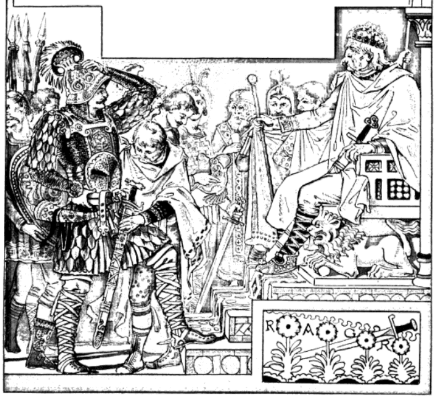
Renaud then mounted the good horse Bayard, who never had an equal,
because he could run ten leagues without being tired. He had been raised
on the island of Brescau, and Maugis, the son of Duke Beuves of
Aigremont, had given him to his cousin. The valiant Renaud wore a
painted shield on his collar, he made his sword shine, and he was a very
handsome knight. The king had a quintain drawn up at which the new
knights jousted. [7] They jousted valiantly, but Renaud won the prize.
Renaud's actions greatly pleased the king, who said to him, "Renaud,
from now on you will come into battle with us."
"I thank you," said Renaud. "I promise to serve you faithfully, and will
never fail you."
The Emperor Charlemagne, after the jousts, returned to his palace, and
said to his barons, "I am worried that my son Lohier is not returning. I
fear that some accident may have happened to him, because last night I
dreamed that lightning fell on him, and that the Duke of Aigremont came
and cut off his head. But I swear that if this is so, he will never have
peace with me."
"Sire," said Duke Naimon, "I do not believe that, and we must not
believe it."
The king said, "If, however, this is true, I will summon Normans,
Berruyers, Flemings, Germans, Bavarians, English, and Lombards, with
whom I will go and destroy him."
A very tired and wounded messenger immediately arrived. Charlemagne, who
was at the windows, came down from the palace with Duke Naimon of
Bavaria and Ogier the Dane.
The messenger saluted the king deeply and said to him, "Sire, you have
done great folly to send your son to ask for the obedience of Duke
Beuves of Aigremont. Your son asked him boldly, but the duke, who is
extremely proud, having heard it, had him caught, and said that he would
never give you an answer. Immediately there arose a fight where your son
was killed by Duke Beuves, with almost all your people, except me and
nine others who brought your son in a bier, and I am injured." The
messenger then collapsed out of weakness.
The king, seized with pain, began to say, "Great God! What a misfortune
I have just learned about! I will not be able to survive it."
Duke Naimon consoled him and said, "Sire, do not abandon yourself to
pain like this. Have your son buried honorably and then attack the duke
and destroy him and his country."
The king consoled himself, and taking the advice of Duke Naimon, he told
his barons to prepare to meet the body of his son. They immediately
carried out his orders.
When they were ten leagues from Paris, they met Duke Naimon, Ogier the
Dane, Samson of Burgundy, and other great lords who were bringing
Lohier's body in a bier. The king dismounted and, advancing towards the
bier, he raised the sheet, and seeing that his son had his head cut off,
he exclaimed, "I must therefore hate Duke Beuves for having treated my
son in this way!" He kissed the bloody body and said, "Ah, my son! You
who were such a valiant knight, I pray to God that he places your soul
in his holy Paradise."
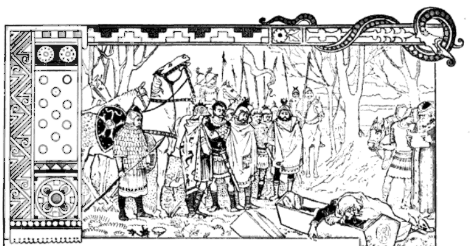
Then Thierry the Ardennois and Samson of Burgundy had the bier taken to
Saint Germain-des-Prés, where he was buried honorably as the son of a
king.
We will now speak of the good Duke Aymon, and of his four sons who were
in Paris.
"My children," said Duke Aymon, "you know that King Charlemagne is
rightly angry, because my brother, your uncle, killed his son Lohier. I
know very well that he will go against him, but we will not go. Let us
go to Dordogne, and if the King wants to make war on him, then we will
help him."
They mounted their horses and set out for Laon. From there, they went to
Dordogne. When the lady saw her lord coming with his four sons, she was
very joyful, and came to meet him, asking if Renaud and his brothers
were knights. Duke Aymon replied that they were. She then asked him why
his sons did not stay with the king. He told her how Duke Beuves of
Aigremont had killed the king's eldest son. She was very angry at this
news, because she knew well that it meant the loss of her husband, of
herself, of her children, and of all their lands. Renaud greatly
threatened the king.
Seeing this, the lady said to him, "My son, I beg you to listen to me.
Love and respect your sovereign lord and you will be loved by God. And
you, my lord Aymon, I am surprised that you left the king's court
without his leave, he who did you so much good, and who gave such
expensive armor to your children. Please do not get involved, because
this summer you will see that the king will attack your brother. By my
advice, serve our lord the king, for if you do otherwise, you will be
disloyal."
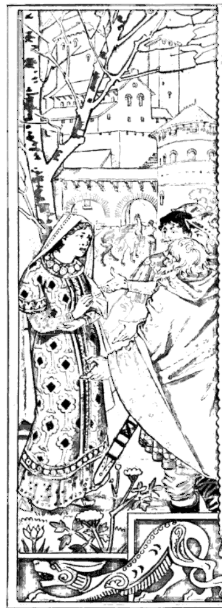
"Lady," replied Duke Aymon, "by God! I would rather have lost my horse
and half of my land, instead of my brother Duke Beuves having killed
Lohier."
We will leave Duke Aymon and his sons to talk about the king, who
regretted the loss of his son.
While Charlemagne was in distress, a messenger came who said that Aymon
and his four sons had returned to their country. The king was irritated
by this, and swore that before he died, Aymon and his four sons would
pay him dearly, and that Duke Beuves of Aigremont and all his family
could not oppose him. Dinner was prepared, which the king hardly ate at
all, he was so sad. Salomon served as his cupbearer that day.
After dinner, the King said to his barons, "Lords, Duke Beuves has
insulted me by having killed my son Lohier, but if it pleases God, I
will go to him this summer and destroy all his land, and if I can reach
him I will take revenge, in relation to Aymon and his sons, whom I made
knights, and of whom I repent."
"Sire," said Duke Naimon, "your son died unfortunately. Send your
people, go towards Aigremont, and if Duke Beuves shows up, sell him
dearly the death of your son."
"Naimon, said the King, "you are prudent and wise, I will follow your
advice."
Then he sent away several of his barons, commending them to go and
prepare in their country, and to return on the first day of summer. Thus
it was done as the king had ordered, and from then on the word spread
that Charlemagne was recruiting people of arms. Eventually, Duke Beuves
was informed, and for his part he summoned all his relatives and
friends, and mainly his brothers Gérard of Roussillon and the Duke of
Nanteuil. There were around eighty thousand combatants who promised to
defend the castle.
Duke Beuves said to his brother Gérard, "Fear nothing, for I hope to
achieve victory. Let us go to Troyes, and there we will fight
courageously with the help of God."
It was at the beginning of the month of May when Charlemagne awaited his
people who were to come. He did not wait long, for Richard of Normandy
arrived with thirty thousand men, Count Guichard came afterwards with as
large a number, Salomon from Brittany also arrived with many Poitevins,
Gascons, Normans, Bernese, and Burgundians, who all stayed at Saint
Germain-des-Prés. The king having learned that all his people had
arrived, had his army ready, and composed his vanguard of forty thousand
combatants who were led by Richard, Galeran of Bouillon, Guidelon of
Bavaria, Ysachar of Nemours, Ogier the Dane, and Estout, the son of
Odon. They left Paris and marched towards Aigremont. After a few days of
walking, Ogier the Dane, who led the vanguard, saw a messenger coming
who asked him to whom these people belonged. Ogier replied that they
were Charlemagne's men. The messenger told him that he would like to
speak to Charlemagne, and Richard led him towards him. The messenger
respectfully saluted the king, told him that he was from Troyes, and
that the governor begged him to send him help, because otherwise he
would be obliged to return the city to the Duke of Aigremont and his two
brothers.
When Charlemagne heard that Troyes was besieged by Duke Beuves and his
brothers, he was angry, and swore by Saint Denis of France that he would
go with his army, and that if he could capture the Duke of Aigremont, he
would put him to death.
He called Naimon of Bavaria, Godfrey of Friesland, Duke Galeran, and
said to them, "Barons, let us fly to the aid of Troyes before it is
taken."
They all responded very willingly, and all marched towards Troyes. The
vanguard arrived with the Oriflamme, [8] which Ogier carried, and
Richard of Normandy, Duke Galeran, and thirty thousand combatants with
them. The messenger went before them. When they were near the city, a
new messenger came there to tell Galeran that the king was coming to
help them.
"Aubert has a lot of company there," said Gérard of Roussillon to his
brothers, being the first in the vanguard.
They all marched against each other.
When Ogier the Dane saw Gérard of Roussillon coming, he said to Richard
of Normandy, "See how Gérard of Roussillon thinks he is mistreating us.
Now, let us think about defending ourselves well, so that the honor may
be to the king and to us."
So they let the horses run on either side.
Gérard struck a German with his lance so hard that he felled him dead.
He took his insignia and shouted, "Roussillon!"
Then a terrible battle began. Ogier, seeing that his people were being
killed, became furious and struck a knight to death. Gérard of
Roussillon, seeing this, knocked one of Ogier's people to death. The
battle became very bloody. Broken lances and unraveled hauberks were
seen on both sides. The battlefield was strewn with dead people and
dying people swimming in streams of blood.
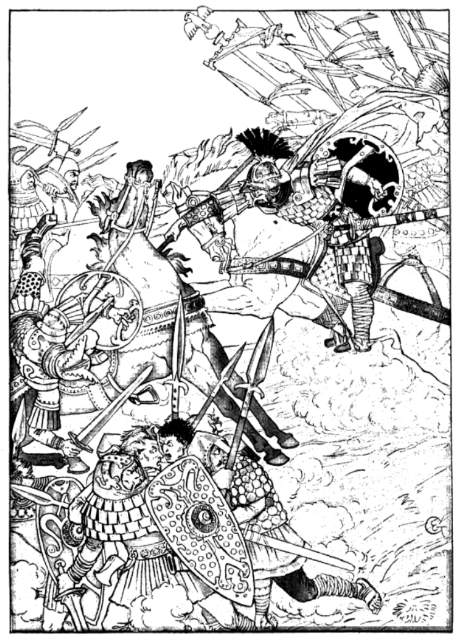
Duke Beuves of Aigremont came at full speed, and struck Ogier, lord of
Péronne and Saint Quentin, so roughly that he laid him dead at his feet.
Then he shouted, "Aigremont!"
His brother from Nanteuil, and all his people came to him. They
immediately marched against the king's people. There also came
Poitevins, Germans, and Lombards, who were from the king's party. They
mixed together, and the combat became more terrible, because there were
valiant knights there.
Richard of Normandy showed his courage there, because he killed a knight
who was loved by Gérard of Roussillon, who swore to avenge the death of
this knight and then cried, "Roussillon!"
His brother, the Duke of Nanteuil, immediately came to help him, and
said to him, "Brother, I would be in favor of going back, for here is
the king and all his people. If we wait for them, it will go poorly for
us."
While they were walking, Galeran of Bouillon killed one of Gérard's
nephews in front of them.
Gérard, insane with anger, sent for Duke Beuves, who immediately came to
his aid. On the other side, the king assembled his people, and that day
about forty thousand men perished on each side.
Duke Beuves struck Lord Gauthier of Pierrette in his shield, so hard
that his lance passed through his body. He shouted, "Aigremont!"
The fight was bloody, and Richard of Normandy showed his valor, for he
jousted against the Duke of Aigremont, so that he pierced his shield and
wounded him. Then he said to him, "Your loss is inevitable. Unfortunate
is the day when you put Lohier to death!"
Saying these words, he struck him on his helmet. As the cap was of
steel, the blow fell on the horse's neck and knocked him down, without
this, Duke Beuves would have died. Then Duke Beuves quickly rose up,
sword in hand, and struck a knight named Sir Simon, and killed him. Then
came Ogier, Naimon, Galeran of Bouillon, Hoël of Le Mans, Count Salomon,
Léon of Frisia, Archbishop Turpin, [9] and Estout, son of Odon, for at
this battle there was much nobility.
Charlemagne came in the meantime shouting, "Barons, do not let him
escape, for we would only be left with shame!"
Then he put his lance to rest, and struck Gérard of Roussillon with such
force that he knocked him to the ground. He would definitely have
perished if his brothers had not helped him. On the other side came
Ogier the Dane, who struck down a knight of the people of Gérard of
Roussillon. He split him in two, and he fell dead on the spot.
When Gérard saw this knight perish, he called upon God and the Virgin,
saying, "Alas, I lost some very good knights today!"
Duke Beuves, for his part, prayed to God to protect him from death and
from falling into the hands of the king. The sun was ready to set, and
the combatants on both sides were tired. The three brothers returned to
their tents in much distress, mainly Gérard who, that day, had lost his
dear cousin Aymon, and a hundred others of his company.
Gérard began to say, "Cursed is the hour when the king's son died!" Duke
Beuves arrived, all bloody as if he had been seriously injured. When
Gérard saw him, he began to sigh tenderly, saying to him, "Brother-in-
law, are you mortally wounded?"
"No," he said, "I will soon be cured."
Then Gérard swore that at the rising of the sun he would begin such a
great fight with the king that thirty thousand men would perish.
"Do not do it," said the Duke of Nanteuil. "but if you will listen to
me, we will send the king thirty of the wisest knights. We will ask him
for a truce, promising him that our brother Duke Beuves will compensate
him for the death of his son. You know that we are his subjects, and
that it would be wrong to attack him with arms, because if he had lost
all the people he brought, within a month he would have twice as many,
and we could not resist him for long."
His brothers replied that they would rely on his advice. They concluded
between themselves to send the knights there when the day arrived. They
kept a good guard, then they had the messengers prepared to be sent to
the king.
When they were ready, Gérard of Roussillon said to them, "Lords, show
the king that we are very sorry for the death of his son Lohier, and
that our brother Duke Beuves repents of it. If it were his pleasure to
have pity on us, we would go and serve him wherever he saw fit to send
us, with ten thousand combatants. You will ask Duke Naimon to do his
best for us."
When the messengers heard what they were to report to the king from the
three brothers, they mounted their horses, carrying olive branches as a
sign of peace, and came to the king.
They greeted him humbly, and Sir Étienne spoke to him. "Sire, I pray to
God that he gives you a good and long life. Know that Duke Gérard of
Roussillon, Duke Beuves of Aigremont, and Duke Nanteuil have sent us to
ask you for mercy, and to beg you to forgive them for the death of your
son, for which they are greatly pained. Duke Beuves particularly informs
you that, if you wish, he and his brothers will come and serve with ten
thousand combatants. Sire, remember that God forgave his enemies for his
death, so will you please forgive them?"
When the King heard the messengers of the three brothers, he frowned
and, hiding his face, he said nothing. A little later he spoke to them
in these terms, "The Duke of Aigremont must have lost his common sense
when he caused my son Lohier, whom I loved dearly, to perish so
unworthily. He is my vassal in spite of himself."
"Sire," replied Sir Étienne, "I am certain that he will comply with the
report of your Council."
"We will consult," replied the King. He withdrew and called Duke Naimon
of Bavaria, Ogier the Dane, Lord Salomon, Hoël of Le Mans, Galeran of
Bouillon, Ogier of Langet, and Léon of Frisia, and said to them, "Lords,
here are the messengers of Duke Beuves of Aigremont and of his brothers,
who say that they will come and serve me wherever I wish with ten
thousand combatants, if the death of my son were to be forgiven. They
will remain our vassals and will only hold their lordships from us."
"Sire," said Duke Naimon, "I advise you to forgive them, because they
are bold and very courageous."
The king followed the advice of Duke Naimon, and pardoned the three
brothers. He called the ambassadors, and told them that he forgave the
death of his son Lohier, on the condition that Duke Beuves of Aigremont
would come and serve him next Saint John's Day with ten thousand
combatants, all well armed. He tells them to come and take the oath of
loyalty as soon as possible.
The messengers left and returned to the duke, to whom they related their
negotiation which greatly pleased the three brothers.
Gérard of Roussillon says, "It is right to strip ourselves of our
clothes, and go naked to the king, to ask him for mercy for having
offended His Majesty."
They stripped down to their shirts and left, accompanied by four
thousand knights.
The king, seeing the three brothers coming, with the barons, called Duke
Naimon and several barons, and said to them, "Can you tell me who these
people are?"
"Sire," said Duke Naimon, "it is Duke Beuves of Aigremont with his
people, who come to ask for mercy."
Duke Beuves appeared immediately. He threw himself at the feet of the
king, and said to him, "Sire, I have come to ask you for mercy. We have
surrendered to your orders. I killed your son thoughtlessly, my brothers
and I are coming to you. We will serve you with all our strength
wherever it pleases you to send us, and with all our life
we will not fail to be faithful to you."
When the king saw him become so humble, he took pity on him, and forgave
him for the death of his son. Then they were permitted to come together
and embrace one another. Thus the king and the barons were appeased, by
the advice of Duke Naimon. The three brothers swore and promised the
king to follow him when he ordered them. They took leave of the king,
who made Duke Beuves promise that he would return to serve him next
Midsummer. The king returned to Paris, and the three brothers returned
to their lodging, because they thought they were well reconciled with
the king.
A short time later, the feast day of Saint John the Baptist arrived. The
king held his court in Paris. Duke Beuves did not fail to be there as he
had promised. He left Aigremont with two hundred knights, and set out to
come to the king and serve him wherever he wanted to employ him. As the
king was in Paris, Count Ganelon, Foulques of Morillon, Harare, and
Béranger came to him.
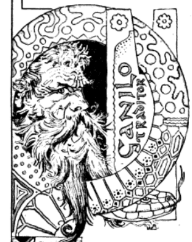
They said to the king that Duke Beuves of Aigremont was coming with two
hundred knights, and they also said to him, "How can you accept the
services of a man who killed your son, our cousin? If you want it, we
will avenge you."
"It would be treason," said the king. "We gave him safe conduct.
However, do as you wish, but I take nothing upon myself. Be careful
because the Duke of Aigremont comes from a large family. You could well
pay dearly for him."
"Sire," replied Ganelon, [10] "do not worry. There is no one bold enough
to fight against my family and me. I promise to leave tomorrow morning
with two thousand fighters, and we will avenge you."
The king repeated that it was treason.
"What does it matter?" said Ganelon, "He did indeed kill your son
through treachery."
"So do as you will. For me, I will not get involved in any way."
The next morning, Ganelon and his people left Paris with four thousand
combatants. They stopped in the valley of Soissons. They met Duke Beuves
and his people.
When Beuves saw them coming, he said to his people, "Here come some
courtiers. I do not know what it could be," he continued, "because the
king is vindictive, and if he has traitors with him, it is above all
Foulques of Morillon. I dreamed last night that a griffin came from
above and pierced my shield and my armor. He tore my insides to pieces,
and not a single one of my men escaped him."
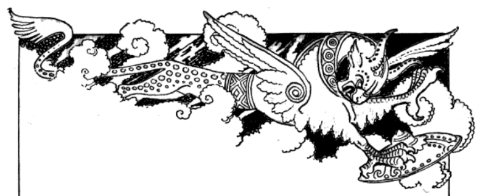
One of the knights told him that he should not be frightened by such a
dream.
"I do not know what God has in store for me," said the duke, "but I am
extremely worried."
He immediately ordered everyone to arm themselves, which was soon
carried out.
Count Ganelon and Foulques of Morillon strode forward, and came straight
to Duke Beuves, telling him that he had done very badly to have killed
Lohier, the king's eldest son, and that he would suffer the penalty
before it was dark.
When the duke heard them, he started saying, "Great God! Who could be
wary of traitors? I thought the king was not so treacherous, but I see
the opposite. But I assure you that I will sell my death dearly to
anyone who dares to attack me."
Then they began a terrible fight in which Ganelon killed Regnier, cousin
of Duke Beuves, and he cried, "Strike, Knights! They did very badly to
have killed my cousin Lohier."
They threw themselves with great force on the duke's people, who
defended themselves valiantly, and struck a knight named Lord Falcon, so
that he was knocked dead to the ground.
The duke then began to miss his two brothers and his nephews. "Alas!
Dear sons, where are you now? Why are you not here to help me? If you
knew my situation, you would come and help me. Ah! Duke of Nanteuil and
Gérard of Roussillon, you will never see me again! Why are you not
informed of the miserable enterprise of the king and Count Ganelon who
want to put me to death cruelly? And you, my dear nephews Renaud, Alard,
Guichard, and Richardet! I really need you! Ah! Very courageous Renaud,
if it would please Our Lord that you were informed of the treason to
which I have been delivered, I am very convinced that you would use all
your strength and your courage to rescue me from it."
The combat was terrible, but Duke Beuves of Aigremont could not resist
so many people, because he had with him only two hundred knights, and
the others more than four thousand. Limbs were seen scattered across the
battlefield, which represented a frightful spectacle. Ganelon then came
and struck Thessaume of Blois, and killed him. He made Duke Beuves'
people retreat. The Duke of Aigremont saw clearly that he must perish.
He struck a knight to death and he fought in desperation. Great God,
what a shame that he was betrayed! Because after that there were several
towns and castles ruined and many nobles lost their lives.
The traitor Ganelon caused great destruction to the people of Duke
Beuves, so that of the two hundred barons he had brought, only fifty
remained.
Duke Beuves said to them, "You see that if we do not defend ourselves
valiantly, we are all dead. So each of us must be worth three." Then the
duke struck a knight named Sir Hélie, so that he knocked him dead to the
ground. Then he shouted aloud, "Let us strike, barons!"
The melee was beautiful, we could hear the sound of the blows falling on
the helmets. A man named Griffon of Hautefeuille struck the duke's horse
in the chest, so that the horse fell under him, so that the duke,
thinking he had reached the knight Griffon, let the blow fall on the
horse, and injured him. Count Ganelon then came upon the Duke of
Aigremont and passed his blade through his body.
Duke Griffon threw him into the crowd and passed his sword through his
body, saying, "Here is the death of Lohier completely avenged."
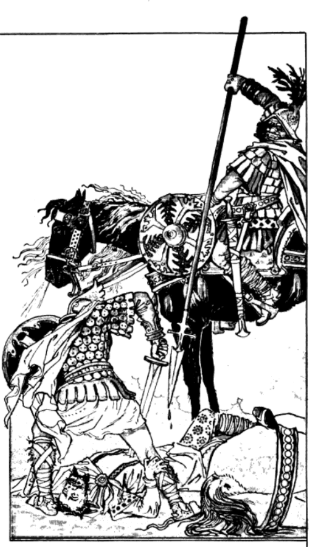
The traitor Ganelon and the Lord of Hautefeuille remounted their horses.
They went against the duke's people, who surrendered, because there were
only ten left. They made them swear and promise that they would carry
Duke Beuves of Aigremont, as they had carried the body of Lohier to
Paris. These knights promised to do so. They put the body in a bier,
then they set off. When they were a little removed from the place where
the action had taken place, they began to regret the loss of their
master and curse the black betrayal that the king had done to them.
Thus the knights left in the greatest sadness, carrying the body of Duke
Beuves of Aigremont, who did not stop bleeding for the space of four
leagues. They arrived in Aigremont. The news soon reached the duchess,
who no sooner heard the news than she and her son Maugis were very
saddened. The people of the city and of the church met their lord. When
the duchess saw her lord dead, she fell weak. The people of the church
took his body to the main church where the bishop buried him honorably,
and celebrated his service.
His son Maugis began to say, "Great God, what a shame that this lord was
killed by such cruel betrayal! If I live long, the king and the traitors
who have done this will pay dearly." He thus consoled his mother, and
said to her, "Have patience, for my uncles and my cousins will help me
to avenge the death of my father."
We will leave talking about Duke Beuves of Aigremont, and return to the
traitor Griffon, and Ganelon, his son, who, with their people, returned
to Paris.
CHAPTER 2 - How Griffon and Ganelon, after having killed Duke Beuves, returned to Paris, and how Renaud killed Berthelot, nephew of Charlemagne, with a chessboard while playing chess, and the war that resulted.
At the feast of Pentecost, the emperor held his court in Paris, after
having made peace with the brothers of the Duke of Aigremont. To this
festival came William the English, Galeran of Bouillon, fifteen kings,
thirty dukes, and forty counts. There also came Duke Aymon of Dordogne,
with his four sons, to whom the king said, "I love you and your
children, and I want Renaud to be my seneschal. The others will also
have my favor."
"Sire," said Aymon, "I thank you for the great honor you do me and my
children. Know that we will serve you loyally. But you really upset me
when, through treachery, you put Duke Beuves, my brother, to death,
after having given him safe conduct. If I did not fear your power, we
would take revenge. But just as my brother Gérard has forgiven you, I
forgive you too."
"Aymon," said the king, "you think better than you say, because the
offense he did to me by having killed my son Lohier well deserved this,
so it is one for the other, and there is no longer any question of it."
"So be it," said Duke Aymon.
Then Renaud, Alard, Guichard, and Richardet came and said to the king,
"Sire, you have brought us before you, but know that we do not love you,
because you put our uncle, Duke Beuves of Aigremont, to death."
The king having heard them, blushed with anger, and said to Renaud,
"Wretch, withdraw! Because if the court were not present, I would have
you put in a prison so dark that you would not see the light for a long
time."
"Sire," said Renaud, "there would be no reason to stop you. But since
you do not want to hear about it, we hold well over the assembly of
fifteen kings, thirty dukes, and forty counts."
They went to hear mass, returned to the palace, and sat down to table,
except King Salomon and Duke Godfrey who served that day. Renaud could
not eat because of the insult he had received, and said to himself,
"Alas! I will therefore not be able to take revenge on the one who
caused my uncle to die so cruelly!" But his brothers cheered him up a
little.
After dinner, the barons went out to have fun, and Berthelot, the king's
nephew, called Renaud to play chess, which was of ivory, and the
chessboard of solid gold. They played together, and there arose such a
heated argument between them in which Berthelot insulted Renaud, and
bloodied him. Renaud, feeling hurt, swore he would take revenge. He
immediately took the chessboard and hit Berthelot so roughly on the head
that he laid him dead at his feet. Then the rumor spread in the palace
of how Renaud, son of Aymon, had killed Berthelot.
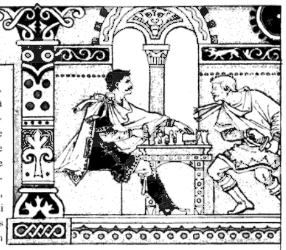
The king immediately cried out, "Barons, take care that Renaud does not
escape you, for, if I can capture him, I will make him die cruelly
because he killed my dear nephew."
They all ran after him, but helped by his relatives, Renaud defended
himself courageously, and there was a bloody fight throughout the
palace. Maugis, cousin of Renaud, caused great carnage. [11]
While these horrors were happening in the palace, Renaud, his three
brothers, and Maugis withdrew and, being mounted on horseback, they set
out from Paris, and returned towards Dordogne. When the emperor learned
that Renaud and his brothers had left, he had two thousand knights armed
to pursue them, but Renaud and his brothers did not stop until they were
in a place of safety, where they put their horses to pasture.
Renaud said, "Great God, who suffered death and passion for us, deign to
preserve today my brothers and my cousin from falling into the hands of
the king!"
The French pursued them and a knight, who was mounted on a better horse
than the others, reached Renaud and said to him, "Bold knight, you will
surrender to the power of Charlemagne."
Renaud turned around and, with a thrust of his lance, felled him at his
feet. He then took the horse, which he gave to his brother Alard. He
came to another, and slew him with a sword to his head. He gave the
horse to his brother Guichard.
One of the king's knights came and cried, "Unfortunate man! I will hand
you over to the king who will hang you all."
"We fear nothing," Renaud replied. Then he split him in two with a great
blow of his sword, and seized his horse, which he gave to his brother
Richardet, who had need of it.
The three well-mounted brothers, and Renaud on Bayard, with his cousin
mounted on the rear, were pursued by the king, but in vain, for the
night was so dark that the four brothers and their cousin arrived safely
at Dordogne, where they found their mother who ran to embrace them and
asked them where their father was, and if they had left the court in
disgrace.
"Yes, madam," Renaud replied, "because I killed Berthelot, nephew of the
king, because he mistreated me to the point of blood."
When the lady heard him speak, she fell weak, but Renaud brought her
back, and she said to him, "My son, why have you acted in this way? You
will repent of this one day and will be the cause of your father's
downfall. So I beg you to go and take a lot of gold and silver from my
treasury and go away, for if your father finds you, he will return you
to the king."
"Lady," said Renaud to her, "do you believe that our father is cruel
enough to hand us over to our enemy?"
Renaud, his three brothers, and Maugis did not want to stay any longer.
They took a lot of gold from their mother's treasury and left, kissing
her with tears in her eyes, because she thought she would never see them
again. They all left, with their cousin Maugis, and entered the Ardennes
forest, in the Valley of the Fairies. They came to the Meuse river and
built a beautiful castle, at the foot of which the said river passed.
When this castle was finished, they called it Montfort. It was the
strongest there was from there to Montpellier, because it was surrounded
by three walls and deep moats, and they could not be apprehended by the
King, except by treason.
Charlemagne was in Paris, and he regretted the loss of his nephew
Berthelot. He called before him the good Duke Aymon, and made him swear
that he would never help his children, and that wherever he found them,
if he could capture them he would deliver them to him. Aymon did not
dare to contradict him, and swore everything to him, from which he was
reprimanded.
After this promise was made, he left Paris, very irritated, and returned
to Dordogne. When the duchess saw him, she started to cry. He soon
guessed the subject. He asked her where her children were.
"Sire, I know nothing about them. But why did you allow Renaud to kill
Berthelot?"
"Renaud is one of the most valiant knights there has been for a long
time, because the whole assembly could not prevent him from killing
Berthelot. Renaud had previously spoken with the king to make amends for
the death of his uncle. But the king treated him outrageously, which,
together with the argument they had at chess, was the cause of
Berthelot's death. The king made me promise that, if I can capture my
children, I will have to bring them to him, and that they will have no
help from me, which I am very sorry to have promised."
CHAPTER 3 - How Charlemagne besieged Montfort, where he was defeated twice, how Montfort was burned, and of the revenge of Renaud who destroyed the greater part of his father's people.
The history of King Alexander does not contain facts as memorable as
those of the four sons of Aymon. For after Charlemagne had them banished
from the Kingdom of France, he held plenary court in Paris, and the
barons being assembled there, there came a messenger who, kneeling
before him, said to him, "Sire, I come from the great Ardennes Forest,
where I found the four sons of Aymon sons in a castle that they had
built."
When the king heard it, he was surprised, and said to his barons,
"Lords, I beg you to avenge the outrage done to me by the four sons of
Aymon."
The barons responded unanimously that they were ready to serve him, and
they asked him for permission to go to their countries to arm themselves
appropriately, which he immediately granted them. They all left for
their lands, but they soon returned to Paris well-equipped. Charlemagne
received them honorably, and, a short time later, they left Paris, and
slept in Montlion. [12] The next day the king set out again and gave the
leadership of his vanguard to Count Regnier of Montpellier, who had a
great hatred of Renaud.
When they were on their way, the king called Regnier, Guyon of Aufort,
Count Garnier, Geoffrey, Longon, Ogier the Dane, Richard of Normandy,
and Duke Naimon of Bavaria, and said to them, "Lords, I beg you to make
haste so that we can capture the four Aymon sons."
Naimon replied, "We will."
They sounded the trumpets and rallied the army. They then came to Molins
which was called Aspes. When they arrived, they saw the Castle of
Montfort. Having arrived at Aspes, they found the three brothers of
Renaud who had come to hunt in the Ardennes Forest. Richardet, the
youngest, wore a horn that Renaud loved very much. There were twenty
knights in number. As they returned to Montfort, Richardet looked
towards the Meuse, and saw the king's army.
He called Guichard, his brother, and said to him, "Who are these people
that I see there? I heard a messenger say that Charlemagne was to
besiege us."
As they were conversing, Guichard saw the vanguard which was guided by
Regnier. Richardet went forward and asked Count Regnier, "Who are these
people?"
"These are the king's people who are coming to besiege a castle that the
four sons of Aymon had built. I pray to God that they can succeed."
Richardet replied, "I am a friend of Renaud, so I do not thank you for
what you say, because I am obliged to defend him." Then he spurred his
horse so sharply that he knocked him down dead. He took his horse and
gave it to one of his squires.
The French began to shout, "Montjoie! Saint Denis!" and the brothers of
Renaud shouted, "Montfort!"
There was a bloody fight, because all of Regnier's people, who were in
the vanguard, were cut to pieces. A squire came to report to the king
that his vanguard was destroyed, and that Richardet, brother of Renaud,
had killed Regnier.
"O God!" said the King, "I have lost Regnier!" He then called Ogier the
Dane and said to him, "Go with Duke Naimon to the aid of our vanguard,
which Richardet almost destroyed, with three hundred well-armed
knights."
But they had already retreated into Montfort with all the loot they
took. When Renaud saw his brothers returning with the enemy spoils, he
could not help but embrace them and ask them where they had obtained
such considerable booty.
They answered him, "Know that the king is coming to besiege you with all
his army. We had just gone hunting, my brothers and I, in the Ardennes
Forest. We encountered Charlemagne's vanguard under the leadership of
Count Regnier. We fought together, but, thank God, we won. We killed
part of them, and the rest fled. We brought the loot you see. Count
Regnier died as did several of his people."
Renaud said to them, "I am very pleased that you have taken such spoils
from our enemies." He said to them, "Lords, the time has come to be
valiant. Let everyone think about doing their duty and let us show our
courage to the king."
When Renaud had said this, they replied, "Lord, do not be afraid, we
will not fail you."
Having heard the response of his people, he began to close the gate and
raise the bridge. They saw from a distance Ogier with three hundred
knights, who followed Richardet. As soon as he saw him enter the castle,
he returned to tell the king what he had done. When he heard Ogier
speak, he was very irritated, and swore that he would never return to
France until Renaud was taken, and if he could catch him, he would have
him hanged, and have his brother dragged by a horse's tail.
"Sire," said Ogier, "you must, because he has given us a lot of
trouble."
"Sire," said Foulques of Morillon, "we will take revenge. Lay siege to
the castle."
"Gladly," said the king. He sounded the trumpet, and ordered the Castle
of Montfort to be surrounded. This castle was built on a rock at the
foot of which the Meuse passed. On one side there was a large forest,
and on the other side were beautiful meadows.
When the king's people were lodged, he mounted his horse and went, with
little company, to visit the castle. After having considered it well, he
said to himself, "Great God, how this castle is fortified!" He then
tells his people to remember to fight well, because we are not at the
end of this war. He had his flag flown on a rich carbuncle [13] which
shone like a burning torch, and a golden apple of very great price above
it. When the tents were pitched, he went in and sent for Duke Naimon,
and told him not to ride for eight days, except for amusement, because
he is going to ask for help throughout the kingdom, and bring in
abundant supplies before the castle is assailed.
Duke Naimon replied, "Sire, you can do better if it is your pleasure.
Send a messenger to Renaud, who will tell him to return his brother
Richardet to you, and then you will abandon his country. If he returns
him to you, have his head cut off, and if he refuses, he will have to
support the war."
The king replied, "I cannot be sure of a faithful messenger."
"Sire," said Duke Naimon, "Ogier and I will deliver the message."
"I want this," said the king, "and I am grateful to you, because you
have never abandoned me."
Duke Naimon and Ogier prepared themselves. They took a green branch to
show that they were messengers, and they went away alone. When Alard saw
the knights approaching, he asked them who they were.
"Lord, we are messengers of the king, who sent us to Renaud."
Alard came to tell his brother that there were two messengers from the
king who wanted to speak to him. They were brought before Renaud, who
received them favorably. He made them sit on a bench.
Duke Naimon then said to him, "The king commands you to send your
brother Richardet to do his pleasure, and if you do not, he defies you,
and says that he will never stop until he has taken you, and if he can
capture you, he will put you all to death."
When Renaud heard these words, he turned red with evil intentions, and
said to him, "Naimon, by the faith that I owe to God, if it were not
that I love you, I would have your arms cut off, for you have served me
well. Seeing that you are my kinsman, you should have defended me. Tell
Charlemagne that he will not have my brother Richardet. Let him leave
his threats, and let us not fear him. Leave, because your presence
becomes a burden to us."
Duke Naimon of Bavaria and Ogier made no attempt to linger, but left
without further delay, and returned to the king, to whom they related
everything that Renaud had told them.
When Charlemagne heard this response, he was so irritated that he
ordered the attack on the castle. There were only three gates. At the
first, Guy, Foulques of Morillon, the Count of Nevers, and Ogier the
Dane were placed. The Duke of Burgundy and Count Albundes were at the
second. At the third was old Aymon, who had come to fight against his
children. The castle was besieged by a large number of people, but
Renaud did something for which he earned great honor.
He said to his people, "Lords, I beg you not to ride on horseback until
you hear the trumpet sound, for I see the king's people are occupied,
and we would earn no honor by making a sally against them, but when they
have rested a little, we will show them our prowess."
At the Castle of Montfort there was a false door in the rock, through
which Renaud and his brothers came out under cover whenever they saw
fit. Renaud knew well that it was time to attack his enemies. He called
Samson the Bordelois, who had come to his aid, and had brought with him
a hundred knights, and said to them, "Lords, it is time that our enemies
know who we are. If we stay any longer, the king will be able to say
that we are cowards."
After Renaud had said these words, he went to his brother Richardet, and
said to him, "I will never fail you, for I love you as much as myself,
and I regard you as the best of all knights." Then he kissed him and
said to his brothers, "Blow the trumpet to prepare the sortie, to show
the king who we are. If God wanted us to be able to take the Count of
Estampes, I would be very happy, because, of all our enemies, he is the
one I fear the most. He will not be able to escape us, he is always in
the vanguard."
Then the four brothers, and all those in their company, armed themselves
and went out through the false door of the castle without making a
sound. They fell precipitously on the king's army with so much fury that
they overthrew soldiers, tents, and pavilions. We should have seen
Renaud, mounted on Bayard, and the armor he wore, because whoever he met
could consider himself very miserable. Every person he attacked was
knocked down to the ground.
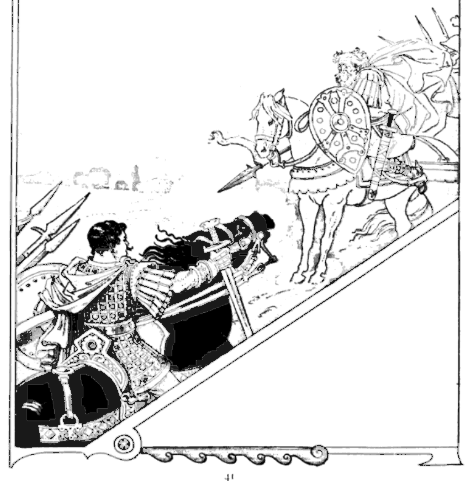
When the king's people saw their enemies, they ran to arms and came
against Renaud's people. Old Aymon heard the noise, and mounted his
horse, he and his men, and set out to battle against his children.
Renaud, seeing his father, was very angry, and said to his brothers,
"Here is our father, let us leave the place for him. I would not want
any of us to strike him." They turned the other way, but their father
came upon them and cruelly mistreated them.
Renaud, seeing that his father attacked them so strongly, said to him,
"Father, you are doing harm. You who should help us, you are doing worse
to us than to the others. It seems to me that you do not love us. It
displeases you that we are so courageous against Charlemagne, because
you have disinherited us. We had this small castle built for our
retreat, and you have come to destroy it. It is not good, even if you do
not not help us, but at least do us no harm. I swear to you that if you
advance, I will give you such a blow with my sword that you will have
reason to repent."
Aymon was very irritated to hear his son speak to him like this, because
he knew Renaud well, but he could not do anything else because he feared
the king so much. So he left without saying anything to his son.
While Renaud was reproaching his father, King Charlemagne, Aubri, Ogier,
Count Henri, and Foulques of Morillon arrived. When Renaud saw them, he
sounded his trumpet to rally his people. When they were reunited, a
knight named Thierry raced his horse against the people of Renaud. But
when Alard saw him, he spurred his horse and rode against Thierry, whom
he struck so roughly that he passed his spear through his body.
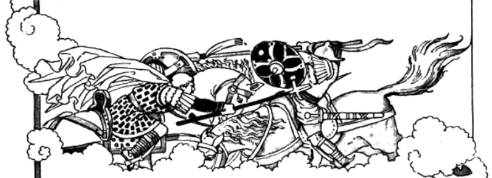
When the king saw Thierry fall, he was so angry that he said, "Lords,
take revenge on these unfortunate people who mistreat us."
When old Aymon heard the king speak in this way, fearing to be blamed,
he spurred his horse and struck one of his children's knights so cruelly
that he cut off his head.
"Father," said his son Renaud, "you are acting very badly to kill my
people like this, and if it were not for the fear of being blamed, we
would take revenge." He then said, "Ah, my mother! What sadness for you
to learn of all the evils that my father is causing us today!"
When Foulques de Morillon saw that the people of Renaud were
courageously defending themselves, he cried out, "Sire, what do I see? I
think we forget you. Have the traitors arrested, and hanged
immediately."
The French, having heard what Foulques of Morillon said, spurred their
horses, and struck Renaud's people with so much fury that they made them
retreat. Alard, seeing his people retreat, was so irritated that he put
his sword in his hand, and repulsed the enemies with such fury that the
French were surprised. There were many knights killed. No one dared to
confront Renaud, because he overturned everyone that was in his path.
Relatives did not spare their family, because they killed each other
like animals. Yon of Saint Omer, who was riding a very good horse,
knocked dead at his feet a knight named Guyon.
Renaud was irritated. He took his standard and said to his people, "See
that I have this horse. I would be very sorry not to have it, because I
value it like Bayard."
When Guichard knew his brother's desire, he rode his horse, killed Yon,
and brought the horse to his brother Renaud, saying to him, "Here is the
horse that you so desired."
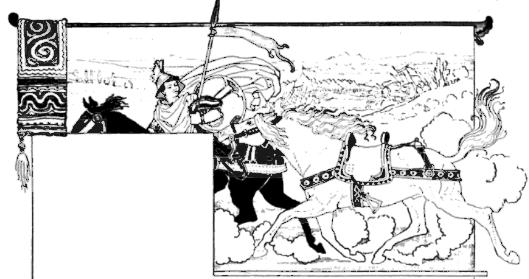
Renaud thanked him for this gift, and said to him, "We now have two
horses on which we can trust. Let us get on it quickly."
Guichard, hearing his brother, mounted the horse and gave his to a
squire.
When Renaud returned to the battle, and saw his father, he was so
irritated that he almost lost his senses, and he said to him
reproachfully, "Father, you are not esteemed for acting as badly against
us as you are. At Christmas and Easter we must be reconciled with our
enemies. But you do not do so, on the contrary you come and attack us
with open force, and harm us as much as is in your power. You do not
treat us like your children."
Duke Aymon then said to Renaud, "Be careful, because if Charlemagne can
capture you, no one will be able to prevent you from being hanged."
"Father," said Renaud, "leave him and come and help us, and the king
will soon be destroyed."
"Go! Miserable man, God curse you!" said the father. "I am too old to
commit treason."
"Father," said Renaud, "I see clearly that you do not love us, guard
yourself from me."
After saying these words, he spurred Bayard, and struck one named Gaymar
and killed him. Aymon, seeing that this knight was killed, spurred his
horse, and armed with an iron staff, ordered the combat, because he saw
clearly that his people were at a disadvantage. He ordered the French to
withdraw. It was time to begin, and as they were preparing to do so,
Bernard the Burgundian struck Simon the Bernese so roughly that he
knocked him down dead at his feet. When the four sons of Aymon saw that
Simon was dead, they were very angry, they spurred their horses, and
rushed through the ranks to take revenge on their enemies. Renaud made
his presence felt well, because he killed three hundred knights, which
the King greatly regretted. Alard broke through the press and came to
joust against the Count of Estampes, and passed his lance through his
body, from which he died immediately.
When Renaud saw this, he came to Alard and embraced him, saying to him,
"Beautiful brother, blessed be the hour in which you were born, for you
have avenged us from a great enemy." He sounded the trumpet to rally his
people.
When the king saw the great damage that the four sons of Aymon were
doing to him, he cried out, "Lords, withdraw, and let us return to our
tents, because I see that we will only be able to take this castle by
famine, because they are very courageous."
When the barons heard his command, they told him that they were ready to
obey him, and as they prepared to leave, Renaud rode at full speed and
drove the king's people back to their tents. They took Antoine,
Gueremaux, the Count of Nevers, and Thierry the Ardenois prisoner,
because no one could resist Renaud or his brothers. As soon as he saw
the king's people fleeing, he sounded the retreat, and his people
joyfully retired to the castle. As for him and his brothers, they walked
behind them.
Aymon, their father, wanted to oppose their march, but Renaud struck his
father's horse so roughly that he knocked it down dead, because he did
not want to hit his father. When Aymon saw his horse killed, he put his
sword in his hand to defend himself, but his defense would have been of
very little value, because his children would have taken him prisoner if
Ogier had not rescued him.

"What do you think of your sons?" he told him. "They are very brave."
When Aymon had remounted his horse, he said to his people, "Let us
pursue these wretches, for if they live long they will do us harm."
Renaud, seeing his father thus pressing on his people, turned Bayard
around and, helped by his brothers, they made their father's people
flee, because no one could withstand Renaud's courage.
The king, seeing the great courage of Renaud, made the sign of the
cross, spurred his horse, and went to Renaud and said to him, "I forbid
you from going any further."
When he saw the king, he withdrew and said to his people, "Get away,
here is the king. I would not want any of us to lay our hands on him."
When the people of Renaud heard these words, they returned to their
castle, very happy with their day. When they had all entered, they
raised the bridges, disarmed themselves, and then sat down at the table.
There were with them a large number of prisoners. After supper, Renaud
thanked his brother for having killed the Count of Estampes.
Charlemagne, seeing that Renaud had returned to the castle, returned to
his tent, and swore that he would never leave there until he had taken
the castle and the four sons of Aymon. They laid siege to Montfort for
thirteen months. They did not go a week without fighting, and when they
were not fighting, they went hunting.

Renaud spoke with the French to negotiate peace, and said to Ogier,
"Lord, I beg you to tell Charlemagne that no one will ever take us,
because our castle is well equipped with provisions. Tell him that he
should not seek to take by force what he may have by good will. He can
have the castle. I will hand over the Castle of Montfort to him,
provided that my brothers, our people, and I come out safe and sound,
and that the war ends, because it has lasted too long."
Ogier answered him, "I promise you that I will tell the king, and, if he
will listen to me, I promise you that he will do it."
As Renaud and Ogier were talking together, Foulques of Morillon arrived
and said to Renaud, "You are a fool. I heard you. You will leave
Montfort to us, because it is not yours."
"Foulques," said Renaud, "you have often served me. I see clearly that
the death of Berthelot is the only reason for Charlemagne's hatred of
me. You know very well that it was against my will. I beg you to tell
the king to have mercy on us. If you do, you could only gain honor."
Foulques replied, "All your proposals will not be able to save your
life, nor your brothers."
"Foulques," said Renaud to him, "you threaten us too much. Know that we
are better than you, so act as you wish."
Charlemagne had the back ban announced [14] throughout his kingdom to
gather his troops. When this was done, he said to his barons, "Lords, I
am very angry with the four sons of Aymon who destroyed my country.
Their castle is so well fortified that it can only be taken by famine.
Now, I ask your advice on what I should do, and will follow what you
tell me."
The barons made no response to this complaint from the king. But Duke
Naimon said to him, "Sire, will you listen to me? I will give you good
advice. Let us return to France, and in a better time we will return to
besiege this castle. I assure you that Renaud is not so confined that he
cannot go hunting whenever he pleases. A man who can go in and out is
not well besieged. Renaud and his brothers are knights so brave that
they cannot be easily destroyed. This is my advice."
Hernier of the Seine then said, "Lord, here is my advice. Give me the
Castle and five leagues of land around it. I promise you that within a
month I will return Renaud and his brothers to you as prisoners."
The King replied, "I agree, if you can do what you suggest."
"Sire," replied Hernier, "I promise you that I will succeed."
Hernier of the Seine said to the king, "Sire, I need a good captain with
a thousand courageous knights. I will make them pass quietly below the
mountain, and I will lead them before the castle."
The king immediately sent for Guyon of Brittany, and ordered him to
choose a thousand combatants, and to do everything that Hernier told
him. When Hernier was fully armed, he mounted his horse, went to the
gate of the Castle of Montfort, and said to those who guarded the gate,
"Lords, I beg you to have pity on me, and to let me in, otherwise I am
dead, because Charlemagne is pursuing me to have me hanged, because I
told him many good things about Renaud. I have something to tell him if
he would hear me."
When the gate guards heard him say this, they lowered the bridge and let
him enter, saluting him humbly, but this traitor cruelly deceived them.
The king had Guyon of Brittany and a thousand knights with him prepared,
and sent him to pass silently below the mountain. He had them prepare an
ambush near the castle while awaiting orders.
Hernier entered into the Castle of Monfort. Renaud no sooner learned
that a knight of Charlemagne had arrived than he sent for him. When he
was brought before him, he asked him who he was.
He replied, "Lord, my name is Hernier of the Seine. I aroused the
indignation of the king in relation to you, that is why I took refuge
here."
"Friend," said Renaud, "since you are on my side, you are welcome.
Please tell me how the camp of the king is arranged."
"Lord," said Hernier, "they are suffering a lot, which is the reason
that many barons cannot stay there, for which the King is very angry. I
promise you that if the army moves away, you can win."
"Friend," said Renaud, "if that is so, I am happy."
When supper time came, Renaud and his brothers sat down at the table and
supped happily with the traitor Hernier. After supper, the knights went
to bed, for they were very tired because they had not stopped fighting.
Hernier, for that night, was treated very well, because Renaud had
recommended him. When all the knights were asleep, Hernier did not
sleep, but he got up and armed himself. He then went to the bridge, cut
the ropes which supported it, climbed the wall, and found the one who
was keeping watch. He cut his throat. After taking away the keys, he
then went to open the gate. Then Guyon of Brittany, seeing the castle
open, entered with his people, and they took control of everything they
encountered. God save Renaud and his brothers from this cruel betrayal.
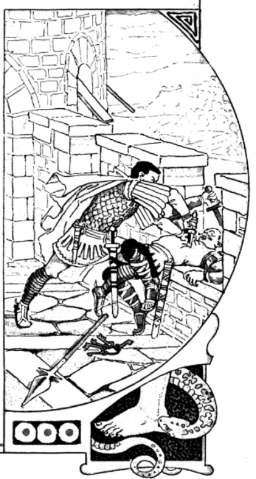
The stable servants, who had gotten drunk, went to bed. When they were
all asleep, Alard's horse, which was extremely proud, began to neigh at
the others. Richardet and Alard, hearing the noise of the horses,
immediately got up and saw armor gleaming in the moonlight. They went to
the bed where the traitor Hernier was lying, but they did not find him,
which surprised them greatly.
Then Renaud woke up and asked, "Who are you? Let the knights sleep."
Alard exclaimed, "Renaud, we are betrayed! Hernier brought Charlemagne's
people here, and they are destroying ours."
When Renaud heard him, he quickly got up, armed himself, and shouted
loudly, "My friends, have courage! We need it now more than ever!"
Renaud had only thirty knights with him in the keep, because all the
others were in the bailey, [15] which resembled a small town, in which
Guyon, at the head of his people, was causing great carnage.
Renaud, seeing Hernier coming with a hundred knights, cried out, "My
brothers, advance! Because if God does not want to help us, we are
lost!"
Then they began to fight with such fury that no one came near them
without it costing him his life. The courtyard was in turmoil, and the
fight became very stubborn. When Charlemagne's people saw that those of
the keep defended themselves very well, they set fire to the courtyard,
and began to tear down the houses. The fire quickly reached the keep.
Renaud, seeing himself thus surprised, said to his brothers, "What shall
we do here? If we stay here we will perish, because the fire is
growing."
He then told his brothers to follow him. They went out through the false
door, but they were more confused than before and did not know which way
to turn. Seeing that the castle was all in flames, they retreated into
an underground passage, and they courageously defended their lives.
Hernier saw them and came with his people to attack him. Renaud defended
himself courageously, but he thought that they had to go and help their
people, and they left the underground passage.
The combat recommenced more fiercely, because Renaud tore to pieces
everyone that was in front of him. He had put his shield behind him,
and, with great blows of his sword, he caused such destruction of
Charlemagne's people that the earth was covered with blood.
When Renaud saw his enemies thus destroyed, he said to his brothers, "We
were very wrong to hide ourselves instead of fighting well. The traitors
will soon be defeated."
He reached the gate of the castle, which he closed and raised the
bridge. He then returned to the fray where he and his brothers destroyed
the knights.
CHAPTER 4 - How Renaud, after destroying Charlemagne's people, had the twelve who remained hanged, and pulled Hernier on four horses, then burned his limbs, and threw his ashes to the wind.
The traitor Hernier was in the battle of the keep, where Renaud had
closed the gate and raised the bridge. This is why he no longer feared
the king's army. He entered the battle so quickly that with the help of
his brothers only the traitor Hernier and twelve others remained. When
Renaud saw that they were all destroyed, they took the traitor Hernier
and tied each of his limbs to the tail of a horse. Each horse was ridden
by a page, and he was pulled by four horses, and so he was dismembered.
After he was dead, Renaud made a large fire and had the twelve thrown
into it, and had their ashes thrown to the wind.
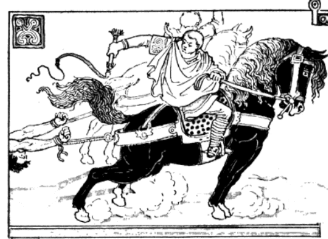
Charlemagne soon learned that Renaud had killed all of Hernier's people,
had him drawn and quartered, and had several of his people hanged.
Charlemagne said to himself, "How mistreated I am by these four knights!
I did very badly when I gave them the order of chivalry! It is right to
say that we often give arms against ourselves. I am desperate. Their
uncle killed my son Lohier, Renaud killed my nephew Berthelot whom I
loved so dearly, and now they have hanged my people and put others to
death. So I will not be able to take revenge on four simple knights! But
I will not leave here until I have taken revenge, or I will lose
everything."
"Sire," said Foulques of Morillon, "you are right. However, Renaud does
not fear you, because he would not have had your people hanged in spite
of you."
Duke Naimon said to him, "Lord Emperor, if you had listened to me, you
would not have lost the best of your people, but you listened to
Hernier, and you see what has happened."
The emperor, hearing what Naimon said, recognized the truth, and did not
know how to respond, but he lowered his head in shame.
Renaud and his brothers climbed the walls and looked around the castle.
They saw that the courtyard, where all the provisions and the garrison
were, was engulfed in flames.
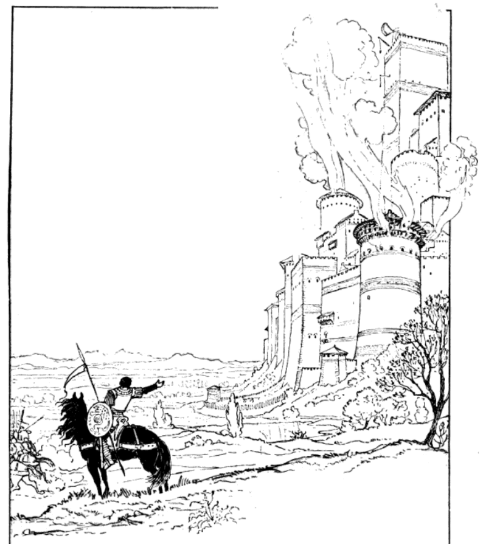
Renaud then said to his brothers, "We are almost out of provisions. We
are lucky to have survived this long! There is no way we can stay here
any longer."
"Brother," said Alard, "you speak wisely. We will follow your advice, we
will never leave you."
When the three brothers had agreed, they prepared all their affairs, and
waited until night. When everything was ready, they mounted their
horses, and Renaud said to them, "Lords, how many are we?"
"There are," Alard replied, "about five hundred of us."
"That is enough," said Renaud, "but what will we do? Let us always stay
together, without fearing anything. We will win our way to Germany, and
if Charlemagne's people attack us, we will have to defend ourselves
courageously, and let us try to prevail over them."
When it was time to mount a horse, Renaud mounted Bayard, and the others
each mounted their own. They opened the door, and they went out without
noise. When they had gone out, Renaud looked sadly at the castle, and
said, "Farewell, beautiful castle. What a shame to see you destroyed
like this! It was built only seven years ago. We are forced to leave our
wealth there."
When Alard saw Renaud so sad, he said, "Brother, you are wrong to be so
sad, you who are one of the most valiant knights I know. Take comfort. I
swear to you, in the name of all the saints, that in less than two years
you will have your castle, which will be worth more than four. Let us
leave, because we no longer have business here."
"Brother," said Renaud, "I have always found prudence in your opinions.
Take the vanguard between you and Guichard. Richardet and I will be
behind."
"Lord," said Alard, "do as you please."
Then Alard and Guichard set out at the head with a hundred knights, and
they placed the wagons in the middle. Renaud and Richardet came
afterwards with the rest of their people, but Charlemagne's people saw
them. When the king learned that Renaud was running away, he was very
irritated, and called his men to arms. Then the army began to move. When
Alard and Guichard, who were going in front, saw that they could not
pass without fighting, they set their horses against Charlemagne.
Renaud took with him twenty of the most valiant knights and said to
them, "Take these sommiers, [16] and go ahead without stopping. I will
go and help my brothers."
"Lord," they replied, "we will carry out your commands."
Renaud spurred Bayard and rode into the melee, where he showed all his
valor, and made Charlemagne's people tremble. Those of Renaud passed
beyond the army, and Charlemagne lost several of his people that day.
When Renaud had passed, he found his sommiers and his knights leading
them.
He was very happy and said to his brothers, "Let us walk!"
He followed his people with his brother Guichard. Charlemagne, having
learned that Renaud was leaving, was very happy that he had left the
castle, but he had his army pursue him.
Renaud made his people march in front of him, and gave the leadership to
Alard and Guichard, to whom he said, "If the king's people attack us,
let us defend ourselves."
"Lord," said Alard, "we will not fail to do so."
Charlemagne advanced, followed by Ogier the Dane, Duke Naimon of
Bavaria, Foulques of Morillon, and several others. Charlemagne, who was
well mounted, seeing the four brothers, shouted to them, "With the help
of God, you will perish, unfortunate ones that you are! Today is the day
I hang you all."
"Sire," said Renaud, "it will not be as you say, if it pleases God, for
if God gives me strength, we will defend ourselves courageously."
Then he rode like a madman to strike at Charlemagne, but he missed. Lord
Hugues put himself between Charlemagne and him. His heart was pierced by
the blow of the lance that Renaud tried to give Charlemagne, who cried
to his people, "Lords, seize these unfortunate ones! If they escape us I
will never be content."
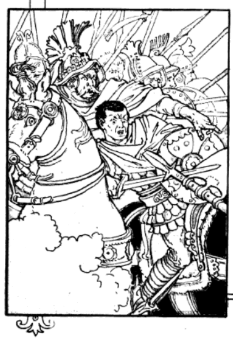
Renaud returned to his people, and said to them, "Lords, fear nothing as
long as I live. Walk boldly and without fear." For thirteen leagues they
were pursued by Charlemagne's people, but they did not lose a single
man, and they went as far as the river.
The king called all his barons and said, "Lords, let us leave the
pursuit. It would be madness to follow them, because our horses are very
tired. I believe this Renaud has the devil at his command, to act as he
does. Let us stay near this river."
"Sire," the barons replied, "we will comply with your orders." Then they
unloaded the sommiers and pitched their tents. The king had all of his
armor removed and had food prepared, because they had not been able to
do so all day.
When Renaud was away from Charlemagne's army, he found a beautiful
fountain lined with greenery. He found this place delightful, and said
to his brothers, "Here is a place suitable for grazing our horses."
"Lord," said Alard, "you are right." Then they unloaded their sommiers
and put them to pasture, but the knights were not at ease, for they had
nothing to eat.
Until now, Charlemagne could not boast of having taken revenge on the
four sons of Aymon. He had camped near the river where he had grown
tired of pursuing Renaud. The next day, at daybreak, Charlemagne said to
Duke Naimon, "What shall we do?"
"Sire," said Naimon, "if you listen to me, we will return to France. I
believe that it is useless to go further, because the wood is thick and
the river is too perilous."
As the King and Duke Naimon were speaking together, he saw several
knights coming, and, as soon as they had approached, he called Bridelon,
Regnier, and Ogier, and said to them, "Lords, I want you to return to
Paris with me."
They were all well pleased, and said to the king, "Sire, this is the
best advice you can follow." Charlemagne had it announced in the camp
that everyone was to pack up to return.
"Sire," said the barons, "we are at your command."
Everyone then set off. The king returned to Paris, and the barons each
to their own country.
When Charlemagne arrived in Paris, he called his barons before him, and
said to them, "Lords, my power is therefore of very little value, since
I have not been able to take revenge on the four sons of Aymon. I think
they will return to their country or their castle. If they return there,
we will besiege them again."
"Sire," said Duke Naimon, "they will not do it. They are in the Ardennes
Forest, but it is so big that I think they will die of poverty there."
"This could well be," said Charlemagne. "May a thousand evils befall
them!" Then he turned to Ogier and said to him, "Take Girard, Foulques
the German, and also Dion of Montdidier with you. Then you will give
leave to the others."
"Sire," said Ogier, "your orders will be carried out." The barons did
what the king had ordered them. They gave leave to all the knights, who
each returned to their own country.
As Duke Aymon was returning, he came to the fountain where his sons were
resting. When he saw them, he said to his people, "Lords, advise me how
I should act against my children. If I attack them, their loss is
certain, and I would be angry. If I do not attack them, I would be
disloyal, but God forbid that I be though of as a traitor!"
"Lord," said Emofroy, "if you attack your children, you will not act
badly, since you have promised it to the king, beware of disloyalty."
"You speak correctly," replied Aymon. "I will do so well that I will not
be blamed." Then he called two of his knights, and said to them, "Go to
Renaud and his brothers, and challenge them for me."
"Lord," said the knights, "you command us to do something that is
repugnant to us, but, since you want it, we will do it." Then they went
to Renaud, who was very sorry to see his father's messengers.
He said to his brothers, "Lords, let us arm ourselves, otherwise we will
soon be defeated, because I know all of my father's anger against us."
"Brother," said Richardet, "you are right."
Meanwhile, the two knights arrived near Renaud who went to meet them,
and asked them, "Lords, who are you, and what subject brings you here?"
Then one of the knights said to him, "We come to challenge you on behalf
of your father."
"Lord," said Renaud, "I suspected it when I saw you coming. Go back and
tell my father to grant us a truce. It would not be natural to see a
father who would fight his own children."
"Lord," said the knight, "always be ready to defend yourself, because he
will attack you." The knights returned and told Aymon that they had
delivered their message.
When old Aymon heard them, he did not wait long. He spurred his horse
and rode after his children.
Renaud, seeing his father coming to meet him, said to him, "Alas! My
father, what are you doing? We have no crueler enemy than you. If you do
not want to defend us, at least do us no harm."
"Unfortunate man," said Aymon, "do you want to stay in the woods
forever? You are not worth a speck. Remember to defend yourself, because
if you are caught, you will perish in torments."
"Father," said Renaud, "you are wrong. I will therefore defend myself,
since it is necessary. I cannot do otherwise."
When Aymon heard this, he rode at his children with his lance lowered,
as if they were strangers.
Renaud cried to his brothers, and said to them, "Lords, let us think
about defending ourselves well, the danger is pressing." He spurred
Bayard and entered the melee, where he fought with so much courage that
his father's people were surprised. The fight became intense, but Renaud
was forced to give up, because his father had more people than him.
Renaud, seeing that of five hundred men he had only fifty left, several
of whom were wounded, while Duke Aymon had lost half of his men, fled to
a mountain, still pursued by his father, who thought to grab hold of
them.
When Renaud saw himself on this mountain, he said to his brothers, "Let
us not leave this place, it is very suitable for our defense."
There were a number of knights killed, and Alard's good horse perished.
His master, seeing him dead, immediately put his sword in his hand and
defended himself valiantly. Richardet rode to him to help him. Aymon and
his people attempt to capture him. The combat became even more terrible
than before, and Alard would have been taken if Renaud had not rescued
him by throwing himself into the melee and overthrowing his father.
"You have done wrong against my brother," he said to him. And he grabbed
Alard and helped him mount behind him. When Bayard felt himself burdened
with two riders, he held his head high and straightened up so much that
Renaud was surprised. He fought for a long time, having his brother
behind him, and then he withdrew. The four sons of Aymon, except Renaud,
were exhausted by fatigue. From time to time Renaud returned to his
enemies. When he saw, however, that his people were very far away, he
spurred Bayard and came to join them. His horse flew with incredible
speed.
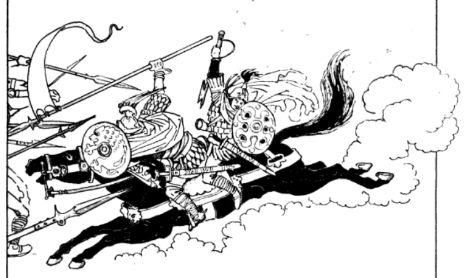
While Renaud was returning, Emofroy, who was one of the valiant knights
of Charlemagne, came mounted on a horse which the king had given him.
When he was near Renaud, he said to him, "Traitor, you will perish or be
taken. I will place you in the hands of Charlemagne."
He struck Renaud's shield, and he, like a desperate man, struck him so
roughly that he knocked him down dead at his feet. He then took the
horse by the bridle, and said to Alard, "My brother, get on this horse.
I give it to you."
Alard thanked him for the beautiful present his brother had given him.
Then he came down from Bayard and mounted Emofroy's horse. He spurred
it, and came to joust against one of his father's knights, named Arfroy,
so roughly that he killed him.
The battle began again stronger than before, because at that moment one
of the best knights of Aymon was killed, who cried out, "Lords, let us
avenge the death of Emofroy, the good knight that the king had given
me!"
When his people heard him speak like this, they threw themselves like
madmen at Alard, made him abandon the place, and, if it had not been for
a small river, Renaud and his brothers would have had a difficult time.
If Renaud had fifty knights crossing the river, he would have destroyed
all his father's people but, due to lack of people, he was obliged to
leave the place, and was only able to save fourteen knights. It greatly
distressed him to see that, of his five hundred men, he had so few left.
They might well have been caught, if it had not been for the river.
Renaud, seeing so many people perished in this affair, could not hold
back his tears. History records that Aymon, his father, also cried.
After shedding a torrent of tears, Aymon said, "Alas! my children, how
sad I am to have caused your loss. Henceforth you will live as wanderers
and fugitives. You lack everything, and I cannot help you!" After giving
vent to his tears, he ordered all the dead to be buried. He had Emofroy
put on a litter, and went to Dordogne, where he only slept one night.
The next day he had the litter carried by two mules, and went to Paris
before the king, to whom he said, "Sire, as I was returning to my
country, I found my children with five hundred knights in the Ardennes
Forest. I wanted to take them prisoner, but I could not, because they
did me so much harm! I destroyed them all, with the exception of
fourteen, who escaped with them, but before I had killed them, they
killed your knight Emofroy, and we would have taken them if it had not
been for the river."
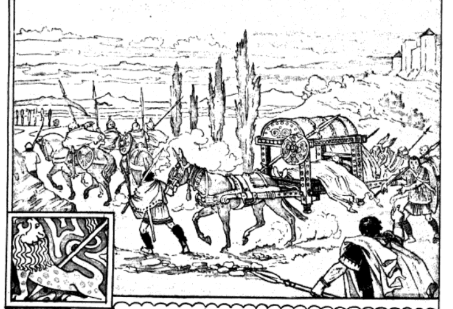
When the king heard these words, he was so irritated that he became
furious and said to Aymon, "By Jove! Your excuse is very bad, because a
crow never ate its young! You will not be able to deceive me."
When Aymon heard the king speaking to him with such anger, he said to
him, "Sire, know that what I am telling you is the pure truth. I am
ready to affirm it in the face of heaven and men."
"Aymon," said the king, "I know you, because if it were up to you, your
sons would be lords of France."
"Sire," said Aymon, "if you are irritated, I am not the cause. Moreover,
if there is a knight who is willing to support what you say, I will
prove to him that he is a deceiver. You have never loved your most
faithful knights, you have always preferred flatterers to them, and
nothing but harm has ever resulted." He got back on his horse and
returned to his country without taking leave of the king. He almost did
not remit his service to him. He arrived at Dordogne, where he found the
duchess coming to meet him, and she asked him what he had done.
Duke Aymon replied that he had done very badly, because, he said, "I
found our children in the Ardennes Forest. I attacked them cruelly to
try to take them, which I was unable to do. On the contrary, they
damaged my people and killed many of them. It is true that without the
valor of Renaud, I would have taken Alard, but he withdrew him from the
battle and made him mount behind Bayard. He then caused such great
carnage that no one dared to go out to meet him. He killed Emofroy, a
knight of the king. He even took his horse in spite of us. I returned to
Paris, I told the king everything that had happened..."
The duchess interrupted him by saying, "You acted cruelly to have caused
them so much harm. You who should defend them, you do them worse than
the others. Are they not your children? Alas! You should have the
friendship of a father for them. Blessed be the hour in which they were
born! I wish they had taken you prisoner, in order to make you give back
to them what they lost. I am very glad that the king is angry with you,
because he will not be able to harm you or your children."
Duke Aymon said, "Lady, you are right. I promise you from now on not to
do them any harm."
CHAPTER 5 - How, after Duke Aymon had conquered his children, they withdrew into the Ardennes Forest, like wild beasts, and how they then went to find their mother, who gave them silver to fight against Charlemagne.
After Renaud and his brothers had been in the Ardennes Forest for a long
time, they began to wander. They did not dare go to the towns to buy
food. However, they were hard pressed by hunger and cold, and most
people died because of the snows. Renaud and his brothers escaped, and
they had only four horses, Bayard and three others. They had neither
wheat nor oats to give them, and they lived only on roots, whereby the
horses were so thin that they could hardly walk, except for Bayard who
was doing well, because he lived better on roots than the three others
on oats. The four valiant sons of Aymon led this unhappy life for a long
time. Their armor was rusty, their saddles and bridles were rotten. They
had become completely dirty and hairy. Renaud looked so terrible that no
man dared approach him.
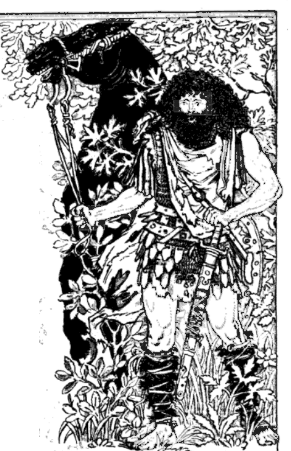
When he saw himself so unhappy, he said to his brothers, "I am very
surprised that we take no notice of our misfortune, I believe that we
have lost our courage. We would not be so unhappy as we are. Our armor
and our horses are no longer worth anything, and we no longer have the
silver to buy them. Let us therefore take advice on what remains to be
done."
When Alard heard Renaud speak in this way, he said to him, "Noble
brother, I noticed it a long time ago, but I was careful not to say it,
because I feared that you would not be happy about it. But if you want
it, I will give you good advice. We have suffered many sorrows here and
cannot go to any country, because you know that all the barons of
France, our father, and even all our relatives, hate us mortally. If you
will listen to me, we will go straight to our mother in Dordogne. I hope
she does not abandon us. We will take a little rest there, then we will
go and serve a great lord, and we will acquire glory."
"Brother," said Renaud, "you are right, I promise you that this will be
done."
When the other brothers heard the advice that Alard had given, they
began to say, "Brother, we know that you are giving good advice to
Renaud, and we are very ready to follow it."
The four brothers waited until night had come, then mounted their horses
and set off on their way, and they rode until they arrived at Dordogne.
It was then that they felt all the poverty and misery they had endured.
Renaud said to his brothers, "We did wrong not to have asked our father
for safety, because you know well that he is so cruel that if he can
take us he will make us prisoners."
"Brother," said Richardet, "you said well, but I do not think our father
does it as you say, if indeed he does. I would rather die in Dordogne
than die of hunger in a wood. Keep going, for I swear to you that no one
will know us, and if we cannot enter Dordogne, we still risk nothing,
because we are too loved there, and our mother would support us."
"Brother," said Renaud, "you speak wisely and have reassured me. Let us
ride now."
Everyone who saw them was astonished, because they were not known, and
they said, "These people are not of our religion."
When they reached the palace, they dismounted and gave their horses to
three servants whom they found. They went up to the palace and met no
one, because Aymon, their father, was out hunting. The duchess was in
her room, where she was very worried at not having received any news
from her children. They entered the room, and finding no one to speak
to, they sat down and remained for some time to rest. Their mother, who
was coming down from her room, saw them in the room, but she did not
recognize them because they were so dishevelled, but she wanted to know
who they were.
Alard, seeing his mother coming, said to Renaud and his brothers, "Here
is our mother. Let us go to meet her and tell her about our poverty."
"Brother," said Renaud, "let us wait for her to speak to us, to find out
if she will recognize us."
She entered the room and said to them, "Lords, may God protect you! May
I know who you are and what country you are from, whether you are
Christians or Pagans, or people who do penance? Do you ask for alms? I
see you need it. I will be truly happy to help you for the love of God,
begging Him to have pity on my children and protect them from all
dangers. It has been a good seven years since I last saw them. Alas!
When will I have the pleasure of seeing them?" She showed so much sorrow
that they felt sorry for her.
When Renaud saw his mother so desolate, he could not hold back his tears
and went to make himself known, but the duchess, having looked at him,
fell weak, and remained for a long time without uttering a word.
Finally, having come to her senses, she recognized him by a scar he had
had on his forehead since his childhood.
She then said to him, "My dear son, you who are one of the most valiant
knights, what has become of your beauty? I love you more than myself."
While she was saying these words, she recognized all her children. When
she recognized them, she kissed them tenderly, and made them sit near
her, and said to them, "My children, how poor and defeated I see you! So
you have no knights with you?"
"Lady," said Renaud, "we no longer have any knights with us, because our
father killed them, and wanted to kill us too."
Then she called a servant and bade him groom their horses. Her squire
came and told the duchess that dinner was ready. She took her children
to dine with her, and as they were eating, Duke Aymon, their father,
returned from hunting, and he had killed four deer and two wild boars.
He entered the room and found his children sitting at the table with the
duchess, their mother, who was serving them.
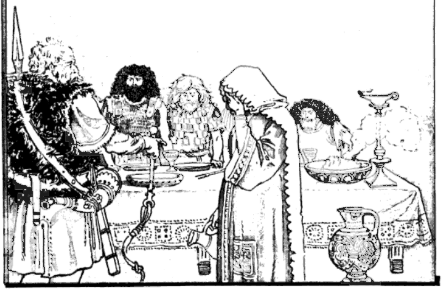
He did not recognize them, and asked the duchess, "Who are these people
who are so disordered?"
She began to cry and said to him, "Lord, these are my children and
yours, whom you have pursued like wild beasts, who have remained in the
Ardennes Forest so long that they are in the sad situation in which you
see them. They came to me hoping for comfort."
Aymon was very angry, and turned to his children, and said to them,
"Unfortunate ones, you are not worth a cent!"
"Father," said Renaud, "out of respect that I owe you, our country is
peaceful, but the others are not. Eighty leagues from here, most of the
people have withdrawn into the woods. You were very wrong to hurt us!
Lately you took away our good Castle of Montfort. You then killed so
many men in the Ardennes Forest, that of five hundred knights, only
fourteen remained. But, since you want to do us so much harm and have
our heads cut off, you will be a friend of Charlemagne and an enemy of
God."
Duke Aymon clearly felt the valor of Renaud's words. He began to sigh,
and said to his children, "Consider leaving here quickly."
Renaud said to him, "You speak very harshly. We have killed so many
people that we cannot go anywhere other than your country." Aymon did
not want to consent, and his son Renaud said to him, "I now discover all
your ill will, and I feel that you only want our ruin. I assure you that
if we absolutely have to leave these places, you will pay dearly for it.
How can you drive us out of our country! I would rather fall under your
blows than die of hunger in other places, but since it cannot be
otherwise, we will see!" He changed color and drew his sword half out of
the sheath.
Alard, seeing his brother irritated, ran to embrace him as quickly as
possible, and said to him, "I pray you, calm your anger. Our father is
our master, so he can do whatever he wants. It is up to us to humbly
obey him. Be careful not to lay your hands on him because it would be
against the commandment of God."
"Brother," said Renaud, "I almost burst into invectives when I see that
the one who should defend us and help us, instead mistreats us. He made
an agreement with Charlemagne to destroy us. I have never seen a father
so cruel, because he treated us like wretches. He hurt us so much that
we fell into extreme poverty. If my father had acted well towards us, I
would have been the first to help him, but, on the contrary, I will
ravage his entire country."
When Aymon heard Renaud speak thus, he began to cry and said, "Great
God! How unhappy I am not to be able to enjoy the good that God has
given me! How happy I would be if my children had peace with Emperor
Charlemagne! King Priam never had braver children. Should I therefore
cause them so much grief and make myself hated, I who should love them
more than myself?" After he had spoken these words, he said to Renaud,
"You are as generous as Hector, so I rely on you." He then said to the
duchess, "I am leaving, because I no longer want to be with Charlemagne.
Give gold and silver to my children, also give them as many horses and
sommiers as they need."
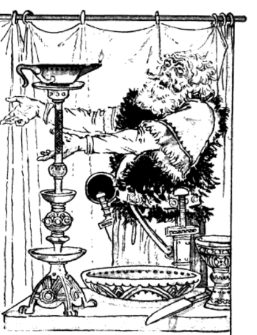
"Father," said Renaud, "I thank you for your good will. We will leave
tomorrow. I can tell you that we would never have come back except for
the love we have for our mother."
Aymon then said to him, "You know what the king made me do against you.
I am very sorry to have fought against you in the Ardennes Forest, but I
was forced to do so for my honor and to maintain peace with Charlemagne.
Your mother can give you everything you need, as for me, I am going back
into the woods."
The duchess was very satisfied that Duke Aymon had given her permission
to act as she wished. She called her children and said to them, "Since
your father is no longer here, you will be well treated."
She had a bath prepared for them in which they washed themselves, and
gave each of them a scarlet cloak lined with ermine. When they had
recovered well, she led them into a room where her husband's treasure
was, and she showed it to them.
Renaud, seeing such rich treasure, could not contain his joy, and said
to his mother, "We have many obligations to you. You helped us at the
right time, because we needed it." So he took the treasure, and paid a
messenger and several others to serve him for a year.
Renaud and his people slept that night at the castle, and the next day
they left, taking with them about five hundred men, all well armed.
The duchess then said to her children, "I would like you to go to Spain,
because the country is very good."
They answered her, "We are ready to obey you."
They set off on their way. They had barely left when they met their
cousin Maugis who was coming from France. He immediately ran to embrace
Renaud and his other cousins.
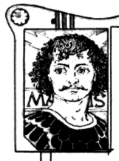
Renaud said to him, "Where have you been that we have not seen you?"
"Cousin," said Maugis, "I come from Paris, where I saw the king who was
well armed."
Renaud left Dordogne, and met his father. He also met his mother who was
sad at the departure of her children. Aymon reassured her and said, "Do
not be upset, your children are in good health."
CHAPTER 6 - How Renaud, his brothers, and their cousin Maugis arrived in the Kingdom of Gascony, and caused a lot of havoc while passing through France, and how King Yon retained them in his service.
After the four Aymon brothers and their cousin Maugis had left Dordogne,
numbering seven hundred, all well armed and in order, they passed
through Brie, Gâtinais, Orléanais, and the Loire River. They ravaged the
country through which they passed as far as Poitiers, where they learned
that King Yon was being attacked by the Saracens.
Maugis said to Renaud, "Cousin, let us go and defend this king, because
he deserves it."
"Gladly," said Renaud.
They took the road to Gascony, and arrived in Bordeaux where they found
King Yon with a large number of knights. When they arrived, Renaud said
to his people, "Let us quickly look for lodgings."
Maugis said to Renaud, "Let us go talk to King Yon. If he wants to
retain us in his service, we will support his rights. If, on the
contrary, he does not want to, we will go and serve Bourgons the
Saracen, who has already conquered Toulouse, Montpellier, Saint Gilles,
Tarascon, and Arles."
"Cousin," Renaud replied, "you are right. We will do as you said."
Then Renaud, his brothers, and Maugis disarmed themselves and dressed
very honorably. Having with them a large number of knights, they went to
the court of King Yon. As Renaud was walking in the city of Bordeaux,
everyone ran after him to see him, such was his good grace. When they
were at the door of the palace, Renaud went down and found the king in
his council.
The seneschal, seeing that Renaud was such a handsome man and so well
accompanied by all his people, went to him and said to him, "My lord,
welcome."
Renaud replied, "God give you good luck. Tell me, please, where is the
king?"
"My lord, he is holding council about Bourgons the Saracen who entered
his country and burned towns, castles, and abbeys, and who is now in
Toulouse with superior forces."
Renaud said to him, "Is this Bourgons as powerful as they say?"
As they were talking together, the king arrived. When Renaud saw him, he
called his brothers. They went to meet the king. Renaud saluted him
honorably and said to him, "Sire, my brothers and I are foreign knights.
We come with our soldiers to offer you our services. If you accept them,
we promise, by the faith of the king, that we will not fail you in
anything."
"Welcome friend," said King Yon. "Since you offer me your services, I
thank you with all my heart, but first I want to know who you are,
because I could be your enemy."
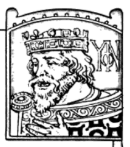
"Sire," said Renaud, "since it pleases you to know who we are, I will
tell you. Know that I am Renaud, son of Duke Aymon of Dordogne, and
these three knights are my brothers. Here is our cousin Maugis, one of
the best knights in the world. Charlemagne banished us from France and
disinherited us. He made our father disown us, so we seek a lord who
will be faithful to us. He will help us defend ourselves, and we will
serve him faithfully."
When King Yon heard what Renaud said to him, he was joyful, because he
recognized that they were the four best knights in the world, and that
he could wage war through their valor. He looked to Heaven and thanked
God for the arrival of these knights. Then he said to them, "I gladly
retain you in my service. I promise you, by the word of the king, that I
will help you with all my strength against everyone. You are
disinherited and so am I, it is quite right that we take revenge with
all our power."
"Sire," said Renaud, "I return thanks to you, and I promise you that we
will die being in your service, but your land will be returned to you."
The king called his seneschal, and ordered that Renaud and his company
be well housed. His orders were carried out immediately.
CHAPTER 7 - How Renaud, his brothers, and Maugis defeated Bourgons the Saracen, who had conquered the Kingdom of Gascony and chased King Yon from Bordeaux.
When Bourgons had taken Toulouse, he said to his people, "Lords, you
know that iron must be struck when it is hot, so let us march towards
Bordeaux while the wheat is thick, because our enemies will have enough
to eat."
The next day Bourgons left Toulouse with twenty thousand combatants, and
came to camp in front of Bordeaux. He sent four hundred well-equipped
Saracens to ravage the countryside right up to the city. When the sentry
heard it, he cried out a call to arms. All those in the city were very
surprised.
When Renaud saw that it was time to arm himself, he said to his
brothers, "Go and get ready, all of you, and have your people prepared."
When they were ready, Renaud mounted Bayard and went to meet King Yon,
to whom he said, "Sire, do not be surprised. Trust in God, he will help
us all today. I augur well that we will achieve victory against the
Saracens."
"Friend," said the king, "we will follow your advice."
Renaud left Bordeaux first, having mounted Bayard, and rode towards the
pagans. He went forward and struck a pagan with such force that he laid
him dead. He began to destroy the Saracens as if they had all been
disarmed.
When Renaud's people were all ready to fight, they attacked the Saracens
with such fury that they forced them to flee towards the ambush. When
Bourgons saw that his people were fleeing, he sounded the trumpet and
marched his troops, and set off.
Renaud was not surprised at the approach of this numerous army. He said
to his brothers, "Lords, let us not fear. It is today that we must
acquire glory. Let us think about showing our courage." As he was thus
encouraging his people, Bourgons came with his sword in his hand and
passed it through the body of one of Renaud's people. Alard, irritated
at this, drove his horse into a Saracen, making him bite the dust. Then
the fight became terrible.
King Yon, who came to help, was surprised at the valor of Renaud and his
brothers and said to his people, "Let us go and help these generous
knights."
He spurred his horse and entered the fray with so much fury that he
broke the battalions, and came to stand beside Renaud, who said to him,
"Sire, be certain that the pagans are vanquished."
The battalions were assembled on both sides, but when King Bourgons saw
the harm that Renaud was doing to him, he said to his people, "These
five knights are causing us a lot of damage. It is time to save
ourselves." They fled immediately.
Renaud, seeing that Bourgons was fleeing, spurred Bayard and pursued
him, threatening to kill him. He was soon separated from his brothers
and the company of King Yon. They did not know what had become of him.
Then Alard began to say, "Alas! What happened to our brother?"
King Yon came immediately, and said to them, "Lords, we must not push
our enemies too much, let us withdraw, please."
"Sire," said Alard, "what do you say? We have lost our brother Renaud,
and we do not know if he is dead or alive."
The king was very angry at this, and had them search for Renaud among
the dead, but he was not found. When Alard, his brothers, and Maugis saw
that he was not found, they began to regret it.
"Alas!" said Alard, "what shall we do? We left our country with the best
knight in the world. My brothers and I thought that he would cover our
past misfortunes with his courage!"
King Yon, seeing the regrets they felt about Renaud, said to them, "Why
are you so sad? He may not be dead. If he has been captured, we will buy
him back. Besides, we have made their people prisoners, and we will not
harm them."
"Sire," said Alard, "let us follow and find out what has become of him."
"Friends," said the King, "willingly." They all set off in pursuit.
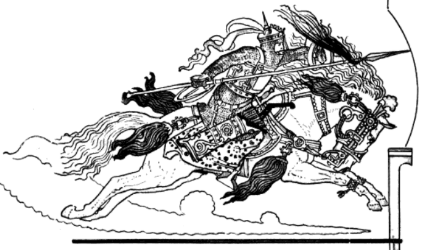
Renaud pursued Bourgons with such haste that he soon reached him and
shouted to him, "Turn around and face me. It would be shameful for you
to die while fleeing."
When Bourgons heard Renaud speak thus, he turned back, and having seen
him, he recognized that he was the knight who had destroyed part of his
army, and said to him, "Knight, do not risk losing your horse, because
you will never find one like it." He said this to frighten him, because
he did not dare to joust against him.

But Renaud was not a man who could be distracted. He said to Bourgons,
"It is now a matter of defending yourself."
Bourgons, seeing that he could only free himself from Renaud by
jousting, spurred his horse, ran at Renaud, threw him to the ground and
broke his lance. But Renaud caused him a considerable wound. Bourgons
got up and put his sword in his hand.
Renaud, seeing that he had dismounted, said to him, "I will not be
reproached for having acted unworthily."
He got off Bayard and put his sword in his hand. They advanced against
each other. The fight was stubborn. When the pagan's horse felt freed
from its master, it took flight. But Bayard ran after him, took him by
the mane and brought him back to the battlefield. Renaud struck Bourgons
so roughly that he left him with a large wound in his side.
Bourgons, feeling injured and inferior to Renaud, said to him, "Generous
knight, give me mercy. I will give you everything I own."
"No," said Renaud, "because I promised King Yon to defend him against
all. But if you want to convert to the Christian religion, I will pardon
you."
Bourgons said to him, "I go to you in the hope that you will be gracious
to me."
Renaud replied, "If you surrender to me, I will do you no harm."
"You promise me," said Bourgons.
"Yes," Renaud replied, "I promise you, by my knightly faith." So they
got back on their horses and took the road to return to Bordeaux.
As they were returning, they met King Yon who was coming with his
people. When Renaud saw him, he presented Bourgons to him, and said to
him, "Sire, I beg you not to do any harm to Bourgons, because I promised
him."
"Friend," said King Yon, "he will receive no harm, in your
consideration."
When the three brothers and Maugis saw that Bourgons was taken, they
were delighted and ran to embrace Renaud, saying to him, "You have
caused us great pain, because we believed that you were taken, but on
the contrary, the war must be over."
After they had complimented each other on both sides, they went to
Bordeaux. The king went up to the palace with the four sons of Aymon and
Maugis, their cousin. He found some people enjoying themselves, and said
to them, "Lords, give more honor to these knights than to myself, for it
is by their valor that I gained the victory and ended the war."
The king gave the most considerable part of the spoils to Renaud and his
brothers, but Renaud gave everything to his people. The king, seeing
this generosity, attached himself even more to Renaud than before, and
wanted to make him the lord of all his land.
King Yon had a sister, who was very beautiful. When she had heard so
many good things about Renaud, she summoned a knight named Gauthier, and
asked him, "Tell me, please, who had the honor of the battle?"
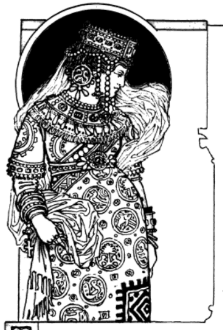
"Lady," replied Gauthier, "know that Renaud is the most valiant knight
in the world, because he captured Bourgons the Saracen, and through him
the war is ended."
The king's sister was delighted to hear this news.
Bourgons, seeing himself prisoner, sent word to King Yon that he wished
to speak to him, and he said to him, "Sire, you are holding me prisoner
with the majority of my people. I will give you six sommiers loaded with
gold for our ransom."
The king replied that if Renaud agreed, he would consent. He then took
advice from Renaud, his brothers, and all the barons. They advised him
to accept the offer made to him by Bourgons, but on the condition that
Toulouse would be returned to him. Renaud did not want to receive
anything.
One day, Renaud and his brothers, being in a forest, caught four wild
beasts, and as they were returning they found themselves near the
Gironde river. Alard saw a mountain beyond, and said to Renaud, "It
seems to me that there was once a castle in this place. If we could
close ourselves within it, Charlemagne would not be able to come and
take us. You can ask King Yon for it, and we will build a fortress
there."
"Cousin," said Maugis, "Alard gives you good advice."
"I will follow it," Renaud replied.
They crossed the Gironde and returned to the king. They presented him
with the wild beasts they had captured. The king received them
honorably, and the next day, after he had heard mass, Renaud took him
aside and said to him, "Sire, we have already remained at your service
for some time."
"You are right," replied the king, "and I must reward you for it. If
there is any town or castle in my kingdom that would please you, I will
grant it to you."
"Sire," said Renaud, "I thank you. Do me the pleasure of listening to
me. We have just been hunting, and as we were returning, I saw a
mountain beyond the Gironde river. If you want, I will build a fortress
there."
"I grant it to you with a good heart," said the king to Renaud, who
thanked him. He promised to help him in all his endeavors.
"Sire," said Renaud, "God will reward you for your good deeds."
The next morning, the king called for Renaud. They took twenty knights
and set out on the river Gironde, which they crossed, and climbed onto
the rock, and found the place very favorable. Renaud was very pleased
with this, and said to himself that if he could make a fortress, he
would not be caught by Charlemagne, provided that he did not lack
provisions. There was a beautiful fountain at the top of the rock.
When they had examined the place well, one of the knights pulled the
king aside, and said to him, "Sire, what do you want to do? Do you want
to have a lord on your land? If he builds a fortress, I assure you that
he will fear neither you nor the barons of Gascony. Consider that Renaud
and his brothers are foreign knights, and that they could cause you a
lot of damage. If you would listen to me, then give them something else,
because much harm could come to us."
When King Yon heard what the knight had said to him, he was surprised,
because he felt that what he said was true. The castle almost came close
to remaining incomplete. He thought a little, then he told him that he
had given Renaud his word.
He called him and said to him, "Friend, you can build your fortress, but
I hope that if I grant it to you, it will not be used to make war on
me."
"Sire," said Renaud, "I give you my word as a knight that I would rather
die than commit such a black treason! Besides, I am an enemy of
Charlemagne who is my sovereign lord, although I have not committed any
treason against him. Know that it was against my will that I killed his
nephew Berthelot. He had hit me without my having given him cause. I
swear to you on my honor that if anyone comes to attack you, I will
avenge you with all my power, and if you have any suspicion, do not hide
it from me."
"Friend," said the king, "I trusted in you, so I want you to be lord of
all my country."
Renaud thanked the king for his kindness, and brought in the best masons
and carpenters in the country. He gave them his idea for the layout of
the fortress, and he recommended that they build a large tower. When the
keep was finished, he enclosed the fortress with walls of considerable
thickness. Renaud was very satisfied when the fortress was finished. The
king came to see it, and Renaud went to meet him. He took him up to the
tower where there was a beautiful fountain.
The king, after examining all this, said to Renaud, "Friend, what name
will you give to this fortress? It seems to me that we should give it a
nice one."
"Sire," replied Renaud, "you will be kind enough to give it a name."
"I will therefore name it Montauban."
The king had it announced throughout the country that all those who
wanted to come and live in the fortress of Montauban would be free from
all rights for ten years. [17] When the people of the country learned of
the franchise, the knights, gentlemen, burghers, and merchants came
there in such large numbers that the fortress was soon populated.
The barons were soon jealous of the friendship that King Yon had for
Renaud because of his valor. They said to the king, "Sire, be careful
what you are going to do. Montauban is well fortified, Renaud is
courageous, and you could repent of it."
"It is true," replied the king, "but Renaud is honest, and he will not
betray me."
"Sire," said a former knight, "if you listen to me, I will give you a
way to always be your own master and not fear anything from Renaud."
"What is this means?" the king asked him.
"It is to give him your sister in marriage. She will be very good with
him, because he is an honest knight."
"Friend," replied the king, "you give me good advice. I will definitely
follow it."
King Yon returned to Bordeaux very happy, and on the first day of May,
Renaud went from Montauban to Bordeaux to see his brother Alard who came
to meet him. When they had gone up to the palace, the king asked for
cards to play against Renaud.
As they were playing, a former knight who was responsible for the
marriage of Renaud with the King's sister, named Godefroy of Moulins,
came in the room and said, "Lords, listen to me. I dreamed last night
that Renaud, son of Duke Aymon, had climbed onto a shaft, that all the
people of this kingdom bowed before him, and the king gave him a hawk.
There also passed in front of Gironde a wild boar so frightful that no
one dared approach it, but Renaud came and killed it. Then I woke up."
There then came a cleric, named Bernard, who said, "Lords, if you deign
to listen to me, I will give you the explanation of this dream. The
shaft where Renaud climbed is the fortress that he had built, the people
who bow before him are the inhabitants of this kingdom, the king's gift
is his sister that he gives him in marriage, and the boar is a great
Christian or pagan prince who will come to attack the king, and Renaud
will defend him. This is Godfrey's dream. For my part, I would be of the
opinion that we celebrate the marriage of Renaud and the king's sister."
"You are right," said the king, "I would like this marriage very much."
The courageous Renaud thanked the King for this beautiful gift, and
asked him to wait until he had spoken about it to his brothers and his
cousin Maugis.
"Brother," said Alard to him, "you would be wrong to refuse the present
that the king is giving you. If you listen to me, you will accomplish
his will. We are all very happy with it."
"Brother," said Renaud, "I will do it since you agree."
He returned to the king and said to him, "Sire, I am ready to do as you
wish."
The King took him by the hand and had them engaged.
CHAPTER 8 - How King Yon, after having received several services from Renaud, [18] gave him Lady Claire, his sister, in marriage, from whom he had two beautiful children who were taken to Charlemagne who received them honorably.
When Renaud's marriage was granted, King Yon went to his sister's room
and greeted her. She curtseyed to him.
"Beautiful sister," said the king, "I have married you."
And when she heard it, she answered him, "Sire, to whom have you given
me?"
"To the best knight in the world. He is Renaud, son of Aymon."
When she learned that it was with Renaud, she said to her brother, "You
will do as you please."
The king took her by the hand and led her to the palace.
He then said to Renaud, "Generous knight, I give you my sister in
marriage."
"Sire," said Renaud, "I thank you for this present. It is not
appropriate for a knight like me." Renaud, however, took the Lady by the
hand and led her to the church, where the Bishop of Bordeaux gave them
the nuptial blessing.

When they were married, Renaud sent for his brothers, who were in
Montauban. They arrived and attended the celebrations, which lasted
eight days. King Yon was delighted by Renaud's marriage, because he
thought that this valiant knight would defend him with all his power.
CHAPTER 9 - How Charlemagne, having learned that Renaud and his brothers were at the fort of Montauban, summoned King Yon to surrender his enemies, namely Renaud and his brothers, under penalty of being besieged. The king replied that he would not do this.
King Charlemagne, being in Paris, one day wanted to go on a pilgrimage
to Saint James in Galicia. He left Paris, and took with him Ogier the
Dane, Naimon of Bavaria, and several other lords. After several days of
walking, they arrived at Saint James. When they were there, the king
entered the church and offered ten marks of gold on the altar. After
having made his devotion, he set out to go to Bordeaux. As he was on his
way, he saw the Castle of Montauban beyond the Gironde.
Then he said, "Lords, here is a considerable fortress. I know that King
Yon had it made to wage war against us." He asked a local man whose
castle it was.
"Sire, its name is Montauban. It was Renaud, Aymon's son, who had it
built."
Charlemagne was angry to hear this news, and told his barons that he had
just found his enemies, who were the four sons of Aymon. "Ogier, and
you, Duke Naimon, mount your horses and go to King Yon, and tell him
that he must deliver to me the four sons of Aymon, who are my enemies,
and that he must give me knights to lead them to my country, in order to
have them hanged. If he does not want to do it, tell him that within
three months I will be in Gascony with my army, and that I will come and
lay siege to the city of Bordeaux. If I can take him, I will certainly
punish him."
Ogier delivered the message that the king had ordered him, and told King
Yon what was recommended to him.
"Ogier," said King Yon, "it is true that I have the four sons of Aymon,
who are very valiant. They helped me when I was in need, I would have
been disinherited without them. As a reward for the services they
rendered me, I gave my own sister in marriage to Renaud, so I would be a
traitor if I delivered them into the hands of their mortal enemy, since
they have served me so well. I would rather die or be disinherited than
cause them any dishonor, because Charlemagne himself would blame me for
that. You can tell the emperor for me that I would rather abandon my
property than return them."
When King Yon had spoken, Renaud said to Ogier, "I do not know why
Charlemagne will not leave us alone. He chased us from France, he took
our Castle of Montfort, and made us wanderers and fugitives, and he
still wants to chase us from Gascony! If he wishes, we are still ready
to do his will, but if he refuses, tell him that we are able to defend
ourselves. Ogier, I want Charlemagne to know that the king made us build
a castle called Montauban, which is well fortified."
Ogier says to him, "You speak like a madman! Do you think you inspire
terror in us with your speeches? You know that Charlemagne made you a
knight. You killed his nephew Berthelot, so do not think you will ever
have peace with him. Do you think you are very safe because you have a
fortress? Know that within two months we will destroy the country."
"Ogier," said Renaud, "I swear to you that when Charlemagne comes to
Gascony, he will wish he had never been there, and we will see which of
us will win the victory, and one who speaks very loudly will then lower
his voice."
"Do as you wish," said Ogier to him, "I have delivered my message. I
return to the emperor to whom I will report your intentions."
CHAPTER 10 - How Roland, nephew of Charlemagne, arrived in Paris with thirty well-armed squires, and the good reception given to him by the emperor.
When Charlemagne heard their reply, he turned red with anger and said,
"We will see how King Yon and Renaud will defend Gascony against me."
Then he set out, crossed the Garonne, and returned to Paris.
The next day, the king called all his barons, and when they arrived, the
king held his council and said to them, "Lords, I have called you to let
you know the shame that the King of Gascony has brought me, because he
keeps the four sons of Aymon in spite of me. You know what wrong they
did me by having killed my nephew Berthelot. I drove them out of my
kingdom. They had the Castle of Montfort built, from which I expelled
them, and now they are in Gascony with the king, who said he would
defend them against me. He even had his sister marry Renaud."
Not one of them answered, because they were angry about going against
Renaud and his brothers. Charlemagne, seeing that they answered nothing,
called Duke Naimon, Ogier the Dane, and Count Guidelon, and said to
them, "Lords, what advice will you give me?"
"Sire," said Duke Naimon, "if you listen to me, you will delay until
spring. Your people are still tired from the last war. When they are a
little rested, you will start again, and we will march with courage."
The king was irritated by this advice, and as he was preparing to answer
it, a handsome damoiseau arrived [19] at the head of thirty knights. He
gave the king a deep bow.

"Good damoiseau," said the king to him, "you are welcome. May I know who
you are?"
"Sire, I am the son of your sister and Duke Milo. My name is Roland."
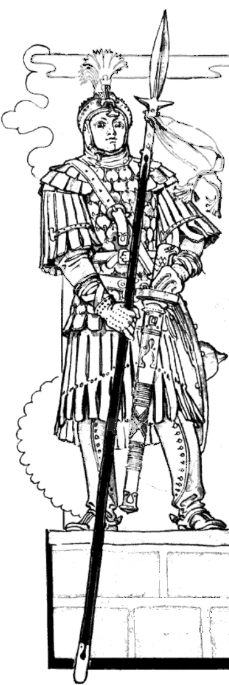
The king was very satisfied, kissed him several times, and said to him,
"Tomorrow morning I will make you a knight and you will be able to fight
against Renaud, the son of Aymon."
"Sire," said Roland, "I will march under your orders. I promise not to
spare Renaud. He killed my cousin Berthelot, and I will avenge his
death."
The next morning Charlemagne knighted his nephew. Meanwhile a messenger
arrived who said to Charlemagne, "Sire, your people from Cologne greet
you, and inform you that the Saracens have burned and destroyed your
country. They beg you to come and help them."
The king stood thinking for a moment.
Roland, seeing his uncle perplexed, said to him, "Sire, what are you
thinking? Put me at the head of your people. I will go and lift the
siege that the Saracens have placed on Cologne."
The king said to his nephew, "Happy is the hour at which you were born,
you will support me, and I want to send you." He gave him twenty
thousand armed men, and said to him, "I put you at the head of my
people, so try to return with honor."
"Sire," replied Roland, "fear nothing." And he set off.
The French, seeing their enemies, began to say, "Let us break through
their ranks and they will be defeated." Then they rushed towards the
Saracens, whom they defeated in a short time, and took back all their
prisoners. As soon as the Saracens heard the French coming, they
immediately mounted their horses and ran at the French, who, having seen
them, returned to their ambuscade.
When Roland saw that it was time to strike, he came out of his ambuscade
with his people, and quickly attacked the Saracens. The combat was
cruel, the earth was covered with so many dead bodies that one could
barely pass through the battlefield. Roland struck a Saracen king,
knocked him to the ground, and took him prisoner, then he put him on his
horse and led him away. When the Saracens saw their lord taken prisoner
and the valor of Roland and the French, they fled.
Roland then said to his people, "Let us pursue these cowards, and if we
catch up with them, they will soon be defeated since we hold their lord
prisoner."
"We will take them dead or alive," replied his people.
"Lord," said the king of the Saracens, named Escorfaut, "I beg you not
to kill my people, they are unfortunate enough to see me prisoner. Take
me to King Charlemagne. If you can obtain my pardon, I will become his
vassal, as well as my posterity."
"You speak correctly," said Roland to him, and Duke Naimon approved his
reason. They made a truce with the Saracens, and led Escorfaut to
Charlemagne.
When the king learned that his nephew had returned, that he had defeated
the Saracens and taken their king prisoner, he mounted his horse and
came to meet him.
When Roland saw his uncle, he dismounted, respectfully saluted the king,
and said to him, "Sire, we bring you Escorfaut whom we have captured. He
promised us to become a Christian if you want to forgive him, he will
also recognize that it is from you that he and his posterity will hold
their lands."
"Nephew," said Charlemagne, "he is a traitor, I distrust him."
Then he ordered that Escorfaut be put back in prison, well guarded, but
that he be given to eat and drink as he wished.
When his orders were carried out, he called Duke Naimon and said to him,
"What do you think of all this?"
"Sire," replied Duke Naimon, "it must be admitted that Roland is a good
knight, and that it is through his courage that the Saracens are
defeated. If he had a good horse, there would be no enemy he would not
subdue by arms."
Charlemagne showed all his satisfaction and said to Duke Naimon, "How
shall we go about finding him a horse?"
"Sire," replied the duke, "if you listen to me, I will give you good
advice. You should announce with the sound of trumpets that you want to
see all the horses of your army running, and that the one who owns the
horse that runs the best will be rewarded with a golden crown, five
silver marks, and a hundred pieces of silk cloth. By this means you will
be able to know the best horse in your kingdom, and then you will buy it
for your nephew Roland, after which you will give leave to all your
barons until next Midsummer."
"Duke Naimon," said Charlemagne, "your advice is good, and I will follow
it."
The king ordered that lists be made for the horse race, and had the
prize of the race placed at the end of the lists.
A squire who was going to Gascony, passed through Montauban and told
Renaud what was to be done in Paris, how Roland had defeated Escorfaut,
and how Charlemagne wanted to have the best horse to give to his nephew.
This squire also said that the king had chosen the time for the horse
race to be next Midsummer.
Renaud, having heard this, began to laugh, and said to Maugis,
"Charlemagne will see the best race in the world and I will win his
crown. I want to ride Bayard to try him out."
"Do not do it," Maugis told him. "But if you want to go, let me
accompany you, you will be safer, and we will bring well-armed knights
with us."
"Willingly," replied Renaud, "since it makes you happy."
When it was time to leave for Paris, Renaud said to his brothers, "It is
time to go to Paris, let us choose some horses and go." When they were
ready, Renaud went to his wife and said to her, "Please guard my castle
well. I will come back shortly."
"Lord," she replied, "command your knights not to leave it, and I answer
you that when the king my brother comes here, he will not enter. Go to
the care of God."
Renaud kissed his wife and left with his people.
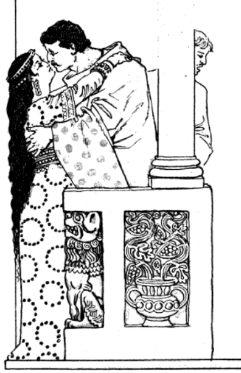
When they were in Orléans and had passed Loiron, he was asked where it
was he came from. Maugis, who spoke for all, replied, "Lords, we are
Bernese, and we are going to Paris for the prize that the king offered
for racing horses."
They continued their journey and arrived in Melun, where they stayed in
the bourg. [20] The day before Saint John's Day, Renaud called Maugis
and said to him, "Cousin, what shall we do tomorrow? We will race
horses, so we have to go and sleep in Paris."
"You are right," replied Maugis, "but let me do it." Then he took a
certain herb which he pounded and soaked with a little water, then
rubbed Bayard with it, so that his black coat turned completely white,
and they could not recognize him. He then anointed Renaud with an elixir
that made him appear as young as if he were fifteen years old.
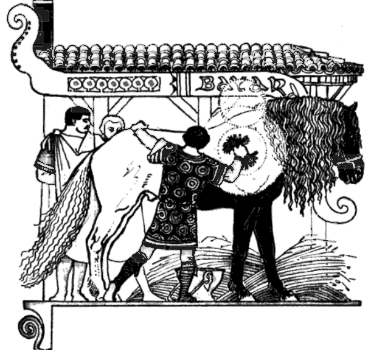
When Maugis had thus transformed Renaud and his horse, he said to his
cousins, "Lords, what do you think? I think they will not be able to
recognize them. See how old Bayard has become! He will not be able to
win the prize."
They were all very surprised. Renaud being mounted on horseback with his
brothers, said to them, "Do not be angry with me, I will not be
recognized."
Alard said to Maugis, "Cousin, we commend our brother to you, because
without you we would not allow him to go to Paris."
Charlemagne, seeing that his barons had arrived, called Duke Naimon,
Ogier the Dane, and Foulques of Morillon, and said to them, "Lords, take
a hundred well-armed knights with you, and go on the road to Orléans, so
that no one can pass unless you know who he is. I have an idea that
Renaud might come, and if the idea struck him, he would arrive soon."
"Sire," replied the barons, "we will carry out your commands, and if
Renaud is foolish enough to come here, he will not be able to escape
being taken prisoner."
They set off on the road to Orléans, and stopped two leagues from Paris.
They waited a long time without anyone passing by. When Duke Naimon saw
that no one was passing, he said to Ogier, "By my faith, the king makes
us look like fools for staying here waiting!"
"Lord," said Ogier, "you are right. For my part, I will not stay here
any longer."
As they were about to return, Duke Naimon saw Renaud and Maugis coming
from afar.
Foulques immediately cried out, "Here is Renaud, he will not be able to
escape us!"
"You are right," said Duke Naimon, "this horse looks like Bayard, if he
were a different color."
Foulques then put his sword in his hand, and went to meet Renaud. But he
was very surprised that he did not recognize him. Renaud and Maugis
passed by. Duke Naimon seeing them pass, called Maugis and said to him,
"Who are you? Where are you going?"
"Lord," replied Maugis, "I am from Péronne, my name is Josuate."
Naimon then said to him, "Can you give me news of Renaud, son of Aymon?"
"Yes," said Maugis, "he walked with us for two days."
Naimon, seeing that Renaud said nothing, said, "I believe that he who is
there without saying anything has bad thoughts."
"Lord," said Maugis, "he is my son who does not know how to speak
French."
Then Duke Naimon said to Renaud, "Can you give me some news about
Renaud?"
He answered him, "Imi scajus prena Franches, en prenant par cheval à
Paris couronne Ri, non Draphonis gagner mi." [21]
Naimon laughed and said to him, "Who taught you to speak? I cannot
understand a word you are saying."
Renaud and Maugis continued on their way, and finally arrived in Paris.
As they entered, Renaud was recognized by a man they met. Many people
came to them. When this man saw such a large crowd, he became even
bolder and took Bayard by the bridle. But the horse kicked him so hard
that it crushed his heart. Seeing this, the other people withdrew
promptly.
Renaud and Maugis continued on their way and were not recognized. They
went to stay with a cobbler. When they had dismounted, Maugis bound
Bayard's foot with silk which he waxed. The host who looked at him asked
why he tied the foot of this horse, and he also said to him, "Who is the
knight who rides him?"
"Lord," said Maugis, "I tied the foot of this horse because he is lame,
and the one who rides it is my son." As Maugis spoke, he accidentally
said the the name of Renaud.
"Ah!" said the host, "you have said enough! He is undoubtedly Renaud who
killed Berthelot, nephew of the king. He will be informed before this
evening."
Renaud, completely irritated, said to him, "You are mistaken, for I have
never seen Renaud. I do not know who he is."
"Be quiet," said the host, "I recognize you." Then he tried to leave his
house, but Renaud pursued him and killed him with a sword.
Maugis, seeing this murder, said to Renaud, "Ah! Cousin, what have you
done? If God does not help us, we are lost!" Maugis went to the stable,
saddled Bayard, and made Renaud ride. They left from this place. When
the wife and children saw what Renaud had done, they began to scream.
But Renaud and Maugis left, and no one could know what had become of
them, because they joined the melee with the others. Bayard went limping
to the gate of Saint Martin, where they remained all night.
The next day they heard Mass with the other barons, then they went to
the fields of the Seine. Maugis and Renaud followed the king. Bayard is
still limping. The king ordered that his crown be placed at the end of
the lists with five marks of silver and silk sheets. Duke Naimon and
Ogier immediately did what the king had ordered. When everything was
prepared, the knights mounted their horses. Each of them thought they
would win the prize. The king told Duke Naimon, Ogier, Guidelon of
Burgundy, and Richard of Normandy to take a hundred well-armed knights
to guard the race, so that there were no disputes.
The knights who were to run got ready to start. They made fun of Renaud
who was limping along, and said to each other, "It will be this one who
will win the prize and the crown."
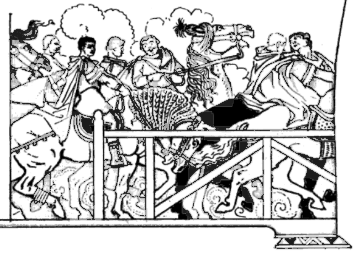
One of them said to Renaud, "You have done well, valiant knight, to have
brought your good horse. You will surely win the prize."
Renaud, hearing all the words that were said about him, was angry, but
if he had not feared losing the prize, he would have started the race,
and he stood without saying anything. When the king heard what the
knights said to Renaud, he was very irritated and said quite loudly, "I
commend you, on pain of incurring my disgrace, that no one reproaches
these knights."
Renaud hardly cared what people said about him. When Duke Naimon and
Ogier saw that it was time to ride, they sounded the trumpet, then all
the horses started running.
When Maugis saw that it was time to start the race, he untied Bayard's
foot, but before he was untied, the others were already far away. When
Renaud saw it was time to start the race, he said to Bayard, "We are
behind. If you do not finish first, you will be blamed."
When Bayard heard Renaud, he wrinkled his nostrils, stretched out his
neck, and set off with such vivacity that the earth seemed to melt under
his feet, and in a short time he had passed them.
When those who guarded the lists saw him running, they were all
surprised, saying to one another, "See how quickly this white horse
runs! He has not been limping for long, and now he is the best of all."
The Emperor Charlemagne called Richard of Normandy, and said to him,
"Have you ever seen so many beautiful horses run together?"
And Richard answered him, "No, sire, but the white horse has passed them
all. Great God, but he looks a lot like Bayard if he were his type, and
the one who rides him is even faster!"
Know that Renaud did so well that Bayard passed all the other horses.
When Renaud was at the end of the lists, he took the crown and put it
under his arm. As for the silver and the sheets, he left them. When he
had taken the crown, he returned to the king, still taking small steps.

The king, seeing him coming, said to him laughing, "Friend, please stop
a little. If you want my crown you will have it, and I will give so much
for your horse that you will never be poor for the rest of your life."
"By God," said Renaud, "these words are of no use! My name is Renaud,
and I am taking your crown. Look for another horse for Roland, because
you will have neither your crown nor Bayard." [22] Then he took off like
lightning.
When Charlemagne heard what Renaud had said to him, he was so irritated
that for a long time he could not say a word.
Shortly afterwards he cried out, "Lords, my enemy Renaud, the son of
Aymon!"
The knights, having heard what the king had said, spurred their horses
to pursue Renaud, but they could not overcome him. Renaud, seeing them
far away, swam across the Seine. When he had crossed the river, he
dismounted.
The king, who was also in pursuit, called Renaud and said to him, "Son
of a noble man, return my crown! I will give you the value of it, and a
truce for two years."
Renaud replied to him, "I will do no such thing. You will never have
your crown. I will sell it and pay my knights. I will have the carbuncle
placed above my castle, so that those who go to Saint James can see it
better."
Charlemagne, hearing Renaud, did not know how to answer him. Renaud set
off on a path and had already passed some distance along it.
Maugis left Paris, and said to Renaud, "Let us walk quickly, because the
weather is not good here."
"Cousin," said Renaud, "you are right." They set out to go to Melun.
Alard, seeing them coming, said to his people, "Lords, let us prepare to
leave. Let us ride on horseback, and if they need help, we will give
it."
As they were leaving the ambuscade, Renaud and Maugis arrived, who said
to them, "Lords, remember to hurry, you must not stay here. I take with
me the king's crown that Bayard won for me in his race."
They set out to go to Montauban, where they were very well received by
their people who were all very delighted to see their lord. Renaud told
them how he had won the king's crown, which made them very happy.
CHAPTER 11 - How Charlemagne besieged Montauban and how Renaud won the first battle.
After Renaud had won the crown, Charlemagne called his barons and said
to them, "Lords, please advise me how I can take revenge on Renaud. You
know how he irritated me. I must make sure I take back my crown, I fear
that he will bring the carbuncle to his castle."
"Sire, said Roland, if you want to take revenge on Renaud you must go
and destroy his country, and if we can capture King Yon of Gascony, you
will do such justice as you please."
"Nephew," said the king, "you are right, because I really want to take
revenge."
"Sire," said Duke Naimon, "calm your anger. If you listen to me, you
will soon destroy Renaud and his brothers. Assemble all your barons so
that everyone is ready for the next Candlemas. [23] It will be necessary
to stock up on food for seven years. We will then lay siege to Montauban
until it is taken, and then you will place it under your obedience."
Charlemagne approved this advice. He circulated letters throughout his
kingdom, in which it was stated that any man who wanted to go to war
would have to be at the king's court around the next Candlemas, with
provisions for seven years. When the barons learned of the king's will,
they prepared themselves, and came to Paris, where they presented
themselves to the king and to Roland, his nephew. There were so many
that they could not all find accommodations in Paris.
The king assembled all his barons, and said to them, "Lords, you know
that I have conquered four kings who are under my obedience, except for
the King of Gascony who gave refuge to my mortal enemies, the four sons
on Aymon, so I invite you to come to Gascony to take revenge for the
wrongs they have done to me."
Then the Count of Nanteuil said, "Sire, we will not go this time,
because it is not possible. You know that it has not been long since we
returned from Germany, and we are still very tired. There are still
several barons here who have not returned to their countries and who
would like to return there. Wait until Pentecost, give leave to your
barons so that they can rest and, when the time comes, you will bring
them to follow you to Gascony or elsewhere."
The king was very dissatisfied with this proposal, and said that he
would go to Gascony even if he had to lose everything. "I will take all
the young men of my army there, and you will be disappointed."
"Sire," said Naimon, "you will do well, for these young men will be very
happy to try it."
Charlemagne said, "I hope they will destroy King Yon, and when I have
taken Renaud and his brothers, I will give all Gascony to the young
knights."
A spy of Renaud, who had heard everything the king had said, immediately
set out, and, arriving at Montauban, he went to find Renaud, his
brothers and Maugis. When Renaud saw him, he asked him what news he
brought from the court of Charlemagne.
"My lord," said the spy, "know that he is very angry with King Yon, you,
your brothers, and Maugis. He summoned all his subjects, but no one
wanted to come. So he swore that he would only take with him young
people to whom he would give all of Gascony."
Renaud then said, "Do not be discouraged, I will see how Roland and
Oliver behave against me and my people."
Then he came into the hall, and found Maugis with the knights, and said
to them, "Lords, I will tell you that Charlemagne is coming to besiege
us and is bringing with him a numerous army. Let us put ourselves on
defense and try to resist them."
"Brother," said Alard, "do not fear, they will be well received. For as
long as we live and see you mounted on Bayard, we will fear neither
Charlemagne nor his power."
Charlemagne reflected and thought of the advice that the Count of
Nanteuil had given him. He told his barons that it was Easter time, and
that he was holding a general council. When it was time, everyone
prepared as best they could. Richard of Normandy brought with him
several noble knights, and presented himself before Charlemagne. Salomon
of Brittany came next, and brought a large company with him. Dizier of
Spain then came at the head of ten thousand well-armed knights.
Geoffrey, Count of Avignon, also brought with him many people, and a
great load of provisions. Bertrand of Germany also brought with him many
knights, both from Ireland and Africa. Archbishop Turpin also came
there, and the king had a great attachment to him. All these great lords
were well received by the king.
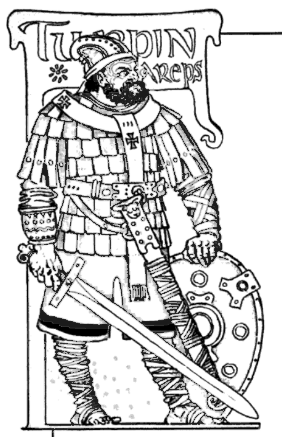
When the whole army was assembled, food became excessively expensive in
Paris. The king, seeing this, reviewed his entire army. He found that it
was composed of thirty thousand knights, not counting the elders.
He called Roland and said to him, "I give the command of my army to
you."
"I will do my best," Roland replied.
The king gave him the Oriflamme. They went to sleep in Blois the first
day. Charlemagne had it announced that everyone was mindful to bring
provisions behind the army. They crossed the Gironde, then organized the
entire army into battalions.
When all of his army was arranged around Montauban, Roland said to
Charlemagne, "It seems to me that you must attack Montauban."
The king replied, "I do not want to damage my people. We must know if
the castle will be willing to surrender, because I would immediately end
the battle."
He then sent a messenger to the castle. The sentries who guarded it
opened the gate immediately. When he entered, he found a seneschal to
whom he said, "I am a knight of Charlemagne, and I would like to speak
to Renaud."
The seneschal took him to Renaud. When this knight was near Renaud, he
greeted him humbly and said to him, "The Emperor Charlemagne asks you if
you want to surrender and return your brother Richardet to do with as he
wishes, otherwise he will besiege your castle, and if he can capture
you, he will kill you by torture."
Renaud began to laugh, and said to him, "Tell Charlemagne that I am not
a traitor. If I did so, he would blame me himself. But if it pleases
him, we are at his command, my brothers and I, and we will willingly
return the castle to him provided that our lives are spared. If the king
refuses us, we will try to defend ourselves."
The messenger returned and told Charlemagne everything that Renaud had
said to him. The king began to think, because he felt that Renaud was
right. He called Duke Naimon and Ogier the Dane, to whom he said,
"Lords, Renaud is telling me that he will not do my will, so I want the
Castle to be besieged."
"Sire," said Naimon, "it seems to me, as I have heard, that Renaud is
making you a good offer and, if you listen to me, you will accept it.
You know that these are people from whom you could receive great
services, and besides, if Renaud were at the head of your troops, you
would be feared and revered everywhere. We can only do what you will,
but I would not be of the opinion to besiege the castle, because it is
very strong, and Renaud has many people to defend it. If you besiege
them, they will go out through false doors. Otherwise, it will be
necessary to hold them so tightly that they cannot come out."
CHAPTER 12 - How, after Charlemagne besieged Montauban, Roland went to camp opposite the gate, in a place called Balançon.
Charlemagne felt that Duke Naimon was right. He said to him, "I want to
comply with your opinion." He immediately had it announced that they
were approaching as close as possible to the castle. He ordered his tent
to be placed opposite the gate. Soon there were more than ten thousand
tents around Montauban.
When the army was encamped, Roland took ten thousand knights, all young,
and went to camp in a place called Balançon, opposite the other gate,
and on the banks of a very large and deep river. He had his tent set up
in this place, with a dragon atop it. This place was so located that we
could see the whole country around it. Montauban was surrounded by two
rivers, the Dordogne and the Gironde.
Roland, seeing the place so well fortified, was surprised, and said to
his people, "Lords, I am not surprised that the four sons of Aymon make
war against my uncle, since they have such a well fortified castle. We
will never be able to take Montauban."
"You are wrong," said Oliver. "We have taken Losanes, and we have
demolished the great tower and the keep of Constantinople, so we can
have Montauban, and if Renaud and his brothers do not come to surrender,
their lives are in great danger."
"I promise you," said Roland, "that they will do nothing about it, but I
swear to you that Renaud will scare us so much that the boldest would
want to be in Paris. He is courageous, and so are his brothers. They
have valiant knights, that is why I am of the opinion that, as long as
they live, they will never be taken."
When Roland's flag was raised, they saw a large number of birds between
the two rivers. Then he said to Archbishop Turpin and the other barons,
"Seeing that we are well housed, let us go hunting with our falcons."
"Lord," said Archbishop Turpin, "very willingly."
Roland mounted his horse, and took with him about thirty barons who took
their falcons and rode on mules. They only took their swords, and went
hunting where they caught many river birds. Archbishop Turpin and Ogier
were not there, but they remained in their tents at the head of the
army, and questioned an old knight about the manner in which he had been
used to take the great city of Troyes.
There was a spy from Renaud who had slipped into the king's army to find
out everything that was happening there. He left immediately, and went
to tell Renaud that Roland and Oliver had gone hunting with thirty well-
armed knights. Renaud was very happy about this. He called his brothers
and Maugis, and told them how Roland and Oliver had gone with thirty
knights to hunt in the plains of Balançon.
"What should we do?" said Renaud.
"Cousin," said Maugis, "we must destroy them if we can. You must
remember that Charlemagne said that he would leave the old knights in
his kingdom, and would only take with him young people to whom he would
give all of Gascony. Roland and Oliver are so well informed of the power
of Charlemagne that they think that no one can resist him, but, if you
will believe me, I will tell you a way to embarrass them."
Renaud, his brothers, and Maugis armed themselves. Renaud mounted Bayard
and made him prance around. He then said, "Let us try to take the best
knights of Charlemagne."
They all came out well-armed through the false gate, numbering about
four thousand, with a forester who led them through the thickest part of
the forest. Renaud told him to lead them straight to Balançon.
When Renaud saw the tents, he said to his people, "Lords, see the
beautiful capture we are going to make!"
"Lord," they replied, "let us advance boldly. As long as you are at our
head, we would attack Hell."
Archbishop Turpin, who was guarding the camp, raised his head and saw
crows making a loud noise above Montauban. He then looked towards the
forest, and saw his enemies.
Then terror seized him, and he called Ogier the Dane, and said, "Go and
arm yourself quickly, behold our enemies are advancing. Roland and
Oliver were very wrong to have fun hunting, and to leave the army in
danger."
Ogier immediately went to arm himself, and sounded the trumpets so that
the whole army was ready. Ogier mounted his horse and saw that the whole
army was on its feet.
Then he said to his people, "Lords, they are coming to attack us. Let us
think about defending ourselves."
Renaud was very surprised to see the whole army in motion. He said to
his people, "We are discovered. However, let us not stop attacking
them." He told his cousin Maugis, "Stay in the forest with a thousand
knights. If you see that we need help, come immediately." Maugis did
according to what was prescribed to him.
Renaud jumped on Bayard and crossed Balançon. The first he met was
Aymeri, the Count of Nicol, whom he knocked down dead. He put his sword
in his hand and pursued the knights with such fury that they all fled
before him, and he began to cry, "Where are Roland and Oliver? They
threatened us and called us traitors. I want to prove them wrong."
When Archbishop Turpin heard Renaud, he rode against him, and they
fought against each other for a long time and broke their lances, but
they did not fall. Renaud dealt him a great blow with his sword on the
head, saying to him, "It would have been better if you stayed in your
church."
Archbishop Turpin, hearing the reproach that Renaud made against him,
rode towards Renaud, and then the whole army was in turmoil on both
sides. There was great carnage. Ogier arrived mounted on Broisart. He
hit Richardet so hard that he overturned his horse. Richardet, seeing
himself dismounted, immediately put his sword in his hand, and prepared
to defend himself. But Ogier went beyond, and began to shout, "To the
Banner of Saint Denis!" [24]
Renaud, seeing that his brother Richardet was dismounted, spurred Bayard
and rode against Ogier. Then they gave each other a huge blow on their
shields. Renaud hit Ogier with so much force that he could not help but
fall to the ground.
Renaud seeing him on the ground, took Broisart by the mane, and said to
Ogier, "You were wrong to overthrow my brother. You who are our
relative, should you not defend us? On the contrary, you are our
cruelest enemy. This is not doing the right thing. Meanwhile, take back
your horse, but I hope you will not do us any harm."
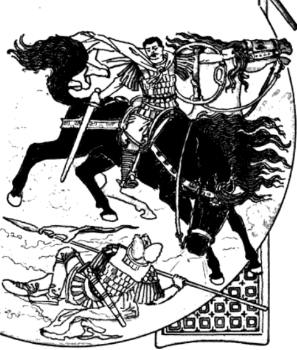
"Cousin," said Ogier, "you are quite right." When he had risen again, he
put his sword in his hand, and began to strike so roughly that he made
all in front of him tremble.
Maugis, seeing that all the battalions were in order, left his ambuscade
and came to Balançon. He crossed the ford and entered the fray. The
French were very tired and they fled. The Gascons chased them about a
league, then returned to the army where they took everything they found
there. Maugis went to Roland's tent and took the Dragon which was atop
it. They crossed the Balançon ford again, and returned to Montauban with
great joy. Maugis had the spoils distributed to his people, after which
he climbed the tower of Montauban, and placed the Dragon of Roland above
it, so that all of Charlemagne's army could see it. The king saw it and
thought that Roland had taken the castle.
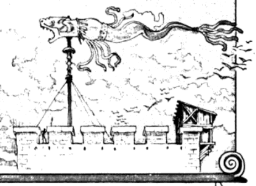
CHAPTER 13 - How the King of Gascony returned Renaud and his brothers to Charlemagne.
In this chapter we will talk about Roland and Oliver who were returning
from hunting, very happy to have caught many birds. As they were
returning, Lord Rambaut went to meet them, [25] and said to them, "You
have caught a lot of birds, but they will cost you dearly. If you took
birds, Renaud and his brothers took men and horses, because you can see
your Dragon on the tower of Montauban. It is the work of the four sons
of Aymon, everyone thinks that you took Montauban."
Roland having heard him speak, sat down on a stone and reflected on what
had happened. He then called Archbishop Turpin, and said to him, "What
will you tell me? I would never dare to appear in front of my uncle,
because I fear bad relations."
"Lord," said Archbishop Turpin, "fear nothing. You are not the first
this has happened to. I promise you that, before three days have passed,
you will have captured people from Renaud like he has from us."
"Lord," said Roland, "I rely on your prudence."
They all got back on their horses and rode towards Charlemagne. After
them went more than two hundred gentlemen on foot, who had lost their
horses. They entered Duke Naimon's tent. Roland stayed there for two
days without going out, he was so ashamed.
While he was in the tent of Duke Naimon, Archbishop Turpin went to the
tent of Charlemagne, greeted the king, and said to him, "Sire, I have
come to tell you unpleasant news. You will know that the four sons of
Aymon defeated us. They took what was in our tents, our horses, our
armor, the Dragon of Roland, and several of our people."
The Emperor Charlemagne was very irritated, and swore by Saint Denis
that he would take revenge. He then summoned his barons.
Then they came to him, and he said to them, "Lords, I have sent for you
to tell you all that has happened. Know that the four sons of Aymon
defeated the knights that my nephew Roland had led to Balançon, for
which I am very sorry, because I would rather have lost something else
and that this had not happened, but we must suffer, since we cannot do
otherwise. Tell me, please, how I can take Montauban?"
When he had finished, no one dared to speak. Duke Naimon said, "Sire,
you ask for advice to besiege Montauban. We certainly will not recommend
it to you. There is too much danger. But, if you will listen to me, tell
King Yon not to allow your enemies to retreat into his country. Tell him
to return them to you, and that otherwise you will take away his lands
and will not show him any mercy."
"Naimon," said the king, "your advice is wise and prudent."
The king sent for a messenger to whom he said, "Go to Toulouse, and tell
King Yon, for me, that I have entered Gascony with the Twelve Peers of
France and a hundred thousand combatants. Tell him that if he does not
give me the four sons of Aymon, my enemies, that I will exile him from
all his land and take away his crown, and they will call him the
dethroned king." [26]
"Sire," said the messenger, "your orders will be carried out with
precision." So he left the army and went to Toulouse, where he found
King Yon in his palace. He greeted him on behalf of the emperor, then
told him the subject of his message.
King Yon, after hearing what the messenger told him, began to think to
himself. Then he said to the messenger, "Friend, you should stay here
eight days, after which I will give you an answer."
"I will gladly wait," replied the messenger.
King Yon entered his room accompanied by eight counts, whose door he
ordered to be securely closed. Then he said to them, "Lords, please
advise me reasonably what I should do. Charlemagne entered my country
with a hundred thousand combatants. He asks me to return the four sons
of Aymon to him, otherwise he will leave me neither city nor castle
standing, and if he can take possession of me, he will take away the
crown that I wear. But I would rather die than live shamefully."
When King Yon had spoken, a knight named Godfrey, who was his nephew,
stood up and said to him, "Sire, I am surprised that you seek advice to
betray knights such as the four sons of Aymon. Renaud is your brother
and you gave him your sister in marriage. You know what good he did for
your country. You have promised and sworn to serve him against all, so
you must keep your word to them or let them seek adventure. They could
at least offer their weapons to some great lord who will do them more
good than you have done them. Please do not do anything that could bring
dishonor upon you."
The old Count of Anjou then said, "Sire, you asked us for advice. If you
will follow it, we will give you some."
"Speak," said the King, "I will follow your advice."
"Sire," said the Count of Anjou, "I have heard it truly said that Duke
Beuves of Aigremont killed Lohier, at whom Charlemagne was very angry.
Renaud and his brothers were very young then, and when they were grown
up, Charlemagne wanted to make them carry out his foolish bidding, but
they had so much courage that they did not want to surrender. Renaud has
since killed Berthelot, the king's nephew. Sire, I am not hiding
anything from you. You know that Charlemagne is powerful, that I have
never succeeded against him, so I advise you to return Renaud and his
brothers to him. You will be delivered from great danger."
The advisor then said, "We would all be traitors! You gave him your
sister in marriage. He warned you that he was at war with Charlemagne.
He has won many battles and delivered you from your enemies, and you
would not be worthy to wear the crown, if, to save your life, you
betrayed knights such as the four sons of Aymon. You have not yet lost
anything with them, and you would be a traitor to hand them over to
Charlemagne."
Old Antoine then spoke, and said, "Sire, do not believe this advice, you
might be betrayed. I know Renaud's intentions better than anyone. He is
the son of a lord who had only one city. He would never submit to the
King of France. He killed Berthelot, and Charlemagne expelled him from
the Kingdom of France. He came to Gascony, you gave him your sister in
marriage with much wealth, and he became so proud that no one can live
with him. If he can take your life, he will do it to possess your
kingdom. Because of this, I advise you to return him, his brothers, and
Maugis to King Charlemagne, and you will appease his anger."
Duke Guichard of Bayonne said, "Sire, I tell you that Count Antoine is
wrong to speak like this. Renaud is the son of Duke Aymon of Dordogne.
Charlemagne had their uncle, Duke Beuves of Aigremont, killed. Renaud,
it is true, killed Berthelot, but it was against his will. I say that a
king who commits treason through fear of another king is not worthy to
wear the crown."

Count Hector then spoke and said, "Sire, you ask advice from someone who
is not in a position to give it to you. Know that Renaud is a valiant
knight, and that he waged war against Charlemagne. He came to Gascony
and you gave him your sister in marriage. You were very wrong to do
this, as well as allowing him to build the Castle of Montauban in the
most secure place in your kingdom. Charlemagne came and besieged him. I
advise you to return Renaud to him as soon as you can. It is better to
lose four knights than your kingdom. Give your sister to another, for
you cannot have a greater enemy than Charlemagne. You will not be blamed
if you want to follow my advice."
"Friend," said King Yon, "I am ready to do what you advise me. I feel
that your opinion is the best of all and the most useful."
When King Yon saw that the barons of his council had agreed that he
should return Renaud and his brothers to King Charlemagne, he heaved a
deep sigh, and said to himself, "Alas! Renaud, I am very changed towards
you and your brothers! You will have to leave us. You will perhaps lose
your life and I my honor, but I cannot do otherwise."
He then said, "Lords, I see clearly that I must return the four sons of
Aymon to King Charlemagne, because the majority of my friends agree, but
I will be known as a traitor as long as I live."
The barons left the council, and each returned to their lodgings. King
Yon, having left his room, went to sit on a bench, and began to think.
As he thought, tears flowed from his eyes, as he missed these valiant
knights.
He called his chaplain and said to him, "Write a letter for me to King
Charlemagne. You will indicate to him that I send him greetings and
honor, that if he wants to leave my country in peace, I promise him that
before ten days have passed, he will find the four sons of Aymon in the
plains of Vaucouleurs, dressed in scarlet cloaks lined with ermine,
mounted on mules, and carrying roses in their hands. I will have them
accompanied by eight of the counts of my kingdom. If they escape him,
do not blame me."
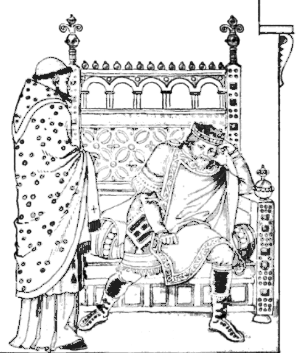
The chaplain went up to his room and wrote the letter as the king had
dictated it to him. When it was written and sealed, the king called his
seneschal and said to him, "Get on horseback, go to the king's tent,
which is in front of Montauban, greet him on my behalf, and give him
this letter. You will tell him that, if he wants to live in peace, I
will act according to his intentions, and that, if he does not want to,
I will defend myself."
The seneschal returned to his lodgings and mounted his horse. He passed
through Toulouse, and took the herald of King Charlemagne with him, and
when they were near Montauban, they found King Charlemagne in his tent.
The seneschal entered and greeted him on behalf of King Yon.
He presented him with the letter saying, "Sire, King Yon tells you that,
if you want to leave his country in peace, he will keep all the promises
he makes in this letter."
Charlemagne was satisfied when, after reading the letter, he saw that it
contained the betrayal he most desired in the world, and he said to the
seneschal, "Your lord, King Yon, speaks well. If he does what he tells
me, he will be my friend, and I will defend him against all those who
come to attack him."
"Sire, swear to what you tell me."
"I swear it to you, in the name of the virgin and Saint Denis."
"That is enough," replied the Seneschal.
Then Charlemagne called his chamberlain and said to him, "Write a letter
to King Yon, and let him know that, if he will keep his word, I will
increase his lordship by fourteen good castles. I am sending him four
beautiful scarlet cloaks for the knights when they go to the plains of
Vaucouleurs. That is where I will have them all hanged."
"Sire," said the Chamberlain, "I will carry out your orders."
Then he wrote the letter which the king sealed and gave to the
seneschal, saying to him, "You will give this letter to King Yon, and
you will greet him on my behalf." Then he gave him ten marks of gold and
the ring he had on his finger.
When the Seneschal had left, the king called for Foulques of Morillon
and Ogier the Dane, and said to them, "Lords, I have called for you to
tell you my secret, but I want no one to know it except the three of us,
until it is accomplished."
"Sire," replied the knights, "we will make our oath to you beforehand."
"Lords," said the king, "I accept it. You will go to the plains of
Vaucouleurs with three hundred well-armed knights. You will find the
four sons of Aymon there. You will bring them to me dead or alive."
"Sire," said Ogier the Dane, "we have never seen them except in armor.
How can we recognize them?"
"You will be able to recognize them easily, because each of them will
have a scarlet cloak lined with ermine, and will have a rose in their
hand."
"Sire," said Ogier, "these marks are sufficient, and we will carry out
your command."
They secretly left the army and went to the plains of Vaucouleurs. They
lay in ambush in a pine forest, waiting for the four sons of Aymon to
come to Vaucouleurs. Great God! If Renaud and his brothers had known of
this treason, instead of mules they would have mounted good horses and
would have armed themselves at all points!
When Ogier and Foulques had prepared the ambush, Foulques called his
people and said to them, "Lords, I hate Renaud, who killed my uncle. You
will know that I came with you to take revenge. King Yon betrayed them,
and he will deliver them to Charlemagne. They will come here with no
weapons other than their swords. When you see them, you will have to
show all your valor and your zeal to serve me."
When King Yon, who was in Toulouse, had received Charlemagne's letter,
he called his secretary Gendard, and said to him, "Open this letter and
read it."
He opened it and read the treason it contained against Renaud and his
brothers. When the clerk read the letter, he shed tears. King Yon,
seeing him crying, told him not to hide anything from the contents of
the letter. Then his secretary told him, "If you keep your word to him,
Charlemagne will increase your fief by fourteen beautiful castles. He
sends you four scarlet cloaks lined with ermine which you will give to
the four sons of Aymon, which will be useful to make them recognized,
because Charlemagne does not want anyone to harm anyone but them. And he
he tells you that his people are lying in ambush waiting for the four
sons of Aymon whom you must deliver to them."
When King Yon heard the contents of the letter, he immediately summoned
a hundred well-armed knights, mounted his horse and set off for
Montauban. He lodged his people in the town, and went to the palace.
When his sister, wife of Renaud, heard of his arrival, she went to meet
him, and taking him by the hand, she wanted to kiss him. But he turned
his face away, telling her that he had a toothache. He asked that a bed
be prepared for him, because he needed rest. He lay down and said to
himself, "Great God! How unfortunate I am to betray such generous
knights so shamefully! Their doom is decided if God does not help them.
I am a real Judas." This was the regret that he felt.
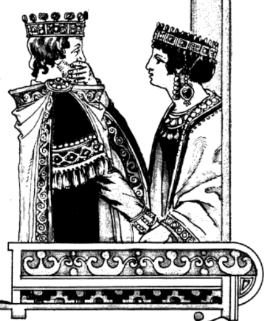
Renaud and his brothers returned from hunting, and they had caught four
large boars. When Renaud was in front of Montauban, he heard the sound
of horses and asked his servant, "Are these King Yon's people? There was
no point in him coming, I would have gone to find him."
He called his nephew, and told him to bring him his horn, and said to
his brothers, "Take each of yours, and let us celebrate the arrival of
King Yon." Then they all began to blow their horns together, and made
the Castle of Montauban ring.
King Yon stood up and said to himself, "How badly I have acted against
these knights!" Then he went back to bed.
Renaud and his brothers went up to the palace. When he saw them coming,
he held out his hand to them, and said to Renaud, "Do not be surprised
if I do not kiss you. It is because I am uncomfortable."
Renaud said to him, "Sire, we can relieve you here, and my brothers and
I will provide you with all the necessary assistance."
"I thank you," said the king to them.
He called his seneschal and said to him, "Bring me the scarlet cloaks."
He brought them immediately, and the king had them put them on, and
begged them to wear them for his consideration.
"Sire," said Alard, we will wear them." But if they had known of the
treason, they would not have put them on. When each of them had put on
their cloaks, the king looked at them and began to cry. His seneschal
was there, who knew about all the treason, but he dared not say anything
because of the king. Renaud asked the king to eat, because he wanted to
serve him well.
After the meal, the king took Renaud by the hand and said to him,
"Brother-in-law and friend, I have a secret to tell you. You will know
that I was at Monbadel, and that I spoke to Charlemagne, who accused me
of treason because you are in my kingdom, which I asked for evidence of
in front of the whole company, but no one was bold enough to prove it.
We had several talks together, and in the end we decided on peace on the
following conditions, namely that you will go tomorrow to the plains of
Vaucouleurs. You will only have your swords as weapons, you will ride on
mules, you will be clad in the cloaks that I have given you, and you
will each carry a rose in your hand. I will have eight of my counts
accompany you as honestly as possible. There you will find the king, the
Duke of Bavaria, Ogier, and the Twelve Peers of France. You will greet
Charlemagne, kiss his feet, and he will return all your lordships to
you."
"Sire," replied Renaud, "I distrust Charlemagne, because he hates us."
"Fear nothing," replied King Yon, and he took an oath in the presence of
his entire barony.
"Sire," Renaud said to him, "we will follow your advice."
"What are you saying?" replied Alard. "You know that Charlemagne has
sworn our destruction, if he could capture us, and I am surprised that
you agree to go, completely disarmed, to place yourself in his hands.
For me, I will not go without armor."
"God forbid," said Renaud, "that I should not yield to King Yon!"
Then he turned to the King and said to him, "Sire, we will go, whatever
happens. I hope to make our peace with Charlemagne."
Then he took leave of the king, and went to his room with his brothers.
Renaud's wife, seeing her husband coming, ran to meet him and kissed
him.
Renaud said to her, "I love you very much. Your brother is doing
everything possible to bring us peace with Charlemagne, which Roland,
Oliver, and the Twelve Peers of France were unable to do."
Then the lady said to him, "I thank God, but tell me, please, where will
the agreement be made?"
"Tomorrow the four of us are leaving for the plains of Vaucouleurs, and
there we will make peace, but we must go there without arms except our
swords, mounted on mules, and each with a rose in our hand as a sign of
peace, and we will find Duke Naimon and the Twelve Peers of France there
to receive our oaths."
When his wife heard this, she said to him, "My love, if you listen to
me, you will not go, because the plains of Vaucouleurs are too
dangerous. Instead, try to speak to Charlemagne near Montauban. You will
appear before him mounted on Bayard. You will tell Maugis to take with
him three thousand well-armed knights, who will be in ambush on the
shore to help you in need, because I fear treason, so I ask you to take
great care. Last night, I dreamed that I was at the windows of the
palace, and I saw a thousand wild boars come out of the woods and kill
you, and that the tower of Montauban fell to the ground. I dreamed that
a traitor came who struck down Alard and pierced his arm. I then saw two
angels hanging our brother Richardet from an apple tree. Then he began
to cry, 'Help me! my brother Renaud...' You went there immediately on
your horse Bayard, but he fell under you, for which you were very angry.
So I advise you not to go there."
"Lady," replied Renaud, "be silent, for I consider one who believes in
dreams to be crazy."
Alard said he would not go.
Richardet said, "We must not go like cowards, but like valiant knights,
well armed and well mounted, and with you leading your horse because, in
need, it could carry all four of us."
"By God," said Renaud, "you can say what you like. I will go, whatever
may happen to me."
He left his room and went to find King Yon, to whom he said, "I will
tell you that my brothers do not want to come with me because we do not
ride on horses. Will you give us permission to each ride our own?"
"No," said the king, "Charlemagne fears you too much. Besides, I took an
oath that you would not wear armor there, and that you would not ride on
horses. If you go otherwise, he will think that I want to betray him. It
could cost us dearly, and I advise you to act as I told you."
He took leave of the king and returned to his room, where he found his
wife and his brothers who asked him if he would ride on Bayard. He told
them that he had not been able to obtain permission. "But," he said,
"fear nothing. King Yon will not betray you. He will even have us led by
eight of the greatest counts of his country. I never recognized any
malice in him."
"Lord," said his brothers, "since it pleases you, we will go with you."
The next day Renaud got up and said to his brothers, "Let us prepare to
leave, because Charlemagne will not be happy if he arrives at the plains
of Vaucouleurs before we do."
When they were ready, they went to hear mass, and Renaud and his
brothers made their offerings at the offertory. After mass, they got on
the mules and left with the eight counts who knew of the whole betrayal.
The four sons of Aymon could easily be recognized from the others,
because they were dressed in scarlet cloaks lined with ermine, and
carried roses in their hands as a sign of peace. The king felt pain on
seeing them leave because, despite his betrayal, he had pity, but he had
only acted on bad advice.
As they were on their way to Vaucouleurs, Alard began to sing a song.
They then all sang together. These poor knights sang and did not know
that they were going to die.
Renaud went behind them with his head bowed, and he listened to them
sing. He lifted up his hands sadly to heaven, and said, "Great God, who
preserved Daniel in the lions' den and delivered Jonah from the belly of
the whale, please preserve me from death and imprisonment, and also my
brothers, for I do not know where we are going. It seems to me that we
are in great danger." When he finished his prayer, he began to shed
tears because he was afraid of causing misfortune to his brothers.
Alard, seeing his brother crying, said to him, "What is wrong with you?
I have never seen you so sad."
Renaud replied, "Today we must make peace with Charlemagne."
"It is because of this that we must be cheerful. Walk and sing with us."
"Very willingly," replied Renaud. Then Renaud began to sing so well that
it was a pleasure to hear him. His brothers walked slowly, talking about
what would become of them on the plains of Vaucouleurs.
The plain where they were to stop was situated so that it was surrounded
by four very thick forests, the least of which was a day's journey
across, four very deep rivers named Gironde, Dordogne, Noire, and
Balançon, and where there was no habitation within ten leagues. This is
why the treason had been ordered to occur in this place. There were four
paths, one of which went to France, the second to Spain, another to
Galicia, and the fourth to Gascony. There were five hundred men on each
path to capture Renaud.
When the four brothers and the eight counts had arrived in the plain,
Ogier saw them first, and said to his people, "Lords, you know that
Renaud is my cousin. Please do not harm him or his brothers."
Renaud and his brothers went down into the valley, and were surprised to
find no one there. Alard called his brother Richard and said to him,
"Brother, we are betrayed! I fear it is Renaud who has betrayed us."
"I have never been so afraid," said Richardet.
He then said to Renaud, "What are we waiting for, since we did not find
anyone? If there were twenty armed knights here, they would take us away
like animals. You would not believe what we said at Montauban. I fear we
have reason to repent of it. If my cousin Maugis were with us, and we
had your horse Bayard, we would not fear the power of Charlemagne. Let
us go! It would be madness to stay here. I see clearly that King Yon has
betrayed us."
As they were preparing to leave, Renaud saw a thousand knights coming
towards them. At their head was Foulques of Morillon, shield at his neck
and lance lowered. Renaud recognized him and said, "Ah God! what will
become of us? We must perish in this place."
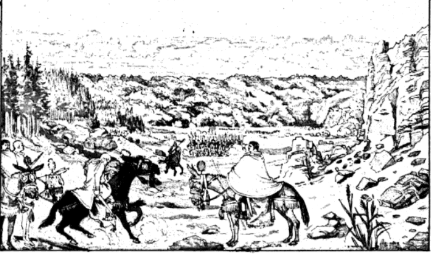
Alard asked him what he saw. Renaud answered him, "Do you not see
Foulques of Morillon who is coming to kill us?"
Alard having seen him, said to his brothers Guichard and Richardet,
"Today is our last day. I see that Renaud has betrayed us. I would never
have thought that he would have been capable of such a black action.
You, Renaud, our brother, have betrayed us!"
"Richardet," said Alard, "draw your sword from its sheath. The traitor
must perish with us." Then they put their swords in their hands, and ran
towards Renaud to kill him, but he began to laugh instead of defending
himself.
"What was I thinking?" said Richardet then. "No, I would not kill my
brother for all the gold in the world!"
Alard and Guichard then said to Renaud, "We are all brothers, so you
will tell us where this betrayal comes from."
"Brothers," Renaud replied to them, "I pity you more than myself. I
brought you here against your will, because if you had not listened to
me, this misfortune would not have happened. But I hope that God will
give us the grace to return. Let us commend ourselves to him, and
remember to defend ourselves well."
"Brother," said Richardet, "will you help us?"
"Do not doubt it," replied Renaud.
And he turned to the counts and said to them, "Lords, King Yon has
ordered you to come with us for our safety, so I hope you will help us."
"Renaud," replied the Count of Anjou, "we have nothing more to do here."
"Traitors," said Renaud, "I will cut off the heads of all of you!"
"What are you waiting for?" said Alard, "They must be killed, these
miserable wretches!"
Renaud then put his sword in his hand, and cut off the head of the Count
of Anjou. He deserved it, because it was he who had advised the treason.
The others immediately fled, and Renaud could not pursue them, because
his mule could not carry him fast enough. He dismounted and said, "Ah!
Bayard, my good horse, why am I not on you and well armed! I will avenge
my death before I die."
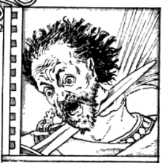
Guichard said to him, "Brother, our enemies are here. Let us climb onto
this rock, we will have better defense there."
"You are right," said Renaud. He then said to his brothers, "Since we
cannot escape, we must at least die gloriously."
"We will do everything possible," his brothers replied. They embraced
Renaud, and each of them wrapped his cloak over his arm, and put his
sword in his hand.
Foulques of Morillon, seeing them become so bold, although unarmed and
on mules, was surprised. He said to them, "Have you come to seek death?
I assure you that King Yon has betrayed you. It is now that Berthelot's
death will be avenged. All your explanations will be of no use to you,
because if you try to defend yourselves, I will put you to death on the
spot."
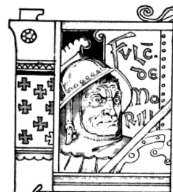
Renaud replied, "Do not expect that I will be taken alive by you or by
Charlemagne, because, if I can reach you, I will cut off your head. If
you would act like a brave gentleman, you would let us go, and we will
be faithful to King Charlemagne, and I will give you the Castle of
Montauban, and if Charlemagne wants to make war against you, we will
help you with four hundred knights. If you do not want to be seen as a
traitor, choose twenty of your best knights, and let them be mounted on
good horses. We will fight with them, and we will gladly forgive them
our death, but if we win, you will let us return to our Castle of
Montauban."
"By God," said Foulques, "everything you say will be of no use to you,
for I would rather give a thousand marks of gold than let you go. Your
cousin Maugis is now far away from you, as are your people. You cannot
be rescued. All my people have promised to deliver you to Charlemagne."
Renaud said to him, "Since you will not have pity on us, we would be
considered cowards if we did not fight to the death."
Alard, seeing that it was necessary to fight, said to Renaud, "How shall
we organize ourselves to fight?"
Renaud replied, "Let us go up two by two. You and Guichard will be
behind, Richardet and I will be in front. Today we must distinguish
ourselves. It is only at this price that we can escape."
"Fine brother," his brothers told him, "we were very mistaken in
believing that you wanted to betray us."
"I fear nothing," said Guichard, "since our brother Renaud is with us.
As long as he lives we will defend ourselves, and if he dies then I will
no longer want to live."
The four sons of Aymon assembled together to fight against three hundred
knights, and were not defeated although there were only four, but they
showed all their courage.
When Foulques saw Renaud coming, he lowered his lance and wounded Renaud
in the thigh, from which he fell.
Alard, seeing this blow, cried out to his brothers, "We are going to
lose Renaud, our only hope! We will not be able to escape death or
prison, if we lose our defender."
Renaud, hearing him speak, said to him, "Weak soul, what do you say? I
am not harmed, thanks be to God, and I will take revenge before I die."
He stood up and with great pain tore out the lance that was in his
thigh, then he drew his sword and said to Foulques, "If you are honest,
get off your horse and you will see what my sword is worth." Foulques
turned proudly towards Renaud, thinking of hitting him on the head, but
he avoided the blow, and ran towards Foulques, to whom he gave such a
blow that he laid him dead at his feet.
"Ah, traitor," Renaud said to him, "may your soul perish with your
body!"
Renaud took Foulques' horse, mounted it, took his lance, and said to his
brothers, "Be sure that as long as I am alive you will have no harm. The
French can say that they have a good neighbor in me."
When Renaud was on horseback, he lowered his lance and ran towards
Augmenon, whom he put to death. He killed a knight, four counts, three
dukes, and eleven knights. He then shouted, "Montauban!" Then, looking
around him, he did not see his brothers, at whom he was very surprised.
"Alas!" he said, "where are my brothers? We can never unite."
Then he saw Alard who had won a horse, a shield and a lance, because he
had killed a knight. He was injured, and brought his brother with him.
When they were assembled, they rode so hard against the French that no
one dared to wait for them, because they destroyed everything.
The French, seeing this, said, "This is supernatural. They are not
knights, but devils. We attack them in front and behind, and if they
resist much longer, they will do us great damage."
Then they rode against the four sons of Aymon, whom they dismembered.
[27] Renaud came out of the crowd with Alard, Richardet fled onto the
rock, but Guichard remained alone, because the French had killed his
mule under him, and he was forced to surrender himself as their
prisoner. They tied his hands and put him on a horse, and he lost a lot
of blood from the wounds he had received.
When Renaud saw that his brother was being taken away, he said to Alard,
"What shall we do? We must take back our brother. If we let him be taken
away, we will be scorned."
"There are a large number of them," replied Alard.
"Great God!" said Renaud, "If the king hangs my brother at the foot of
Montfaucon, I will not dare to help him."
Alard said to him, "Go ahead, and I will follow you."
Renaud immediately set off like a lion, and made his way through the
ranks, and when he had passed near those who were taking his brother
away, he said, "Unfortunate man! Leave this knight. You are not worthy
to touch him."
When those around him saw Renaud, they were so afraid that they fled and
left Guichard. Renaud immediately said to Alard, "Go and untie our
brother Guichard, and put him on a horse, give him a lance, and follow
me."
"Brother," said Alard, "I will go wherever you want, but if we leave
once, we will never be able to rally."
Then they came to Guichard, untied him, and set out to fight. Guichard
was the most valiant after Renaud, but his mule had been killed, and he
was so wounded that he could not defend himself. He had killed five
counts and fourteen knights, and he was so exhausted that he was forced
to lie down against the rock.
Then came Gérard of Vauver, cousin of Foulques of Morillon, who had
promised to avenge the death of his cousin. He came to the rock, and
finding Richardet there, he spurred his horse and lowered his lance with
which he struck Richardet, and made a wound so large that his guts came
out of his body.
He began to shout, "The four sons of Aymon are finished, because I
killed Richardet who was the boldest knight! If God helps me, I will
capture the others, and the king will have them put in Montfaucon as
soon as he has them."
Richardet, despite this blow, got up and came against Gérard and said to
him, "Traitor, you will pay me for the harm you have done to me. Renaud
will not be blamed for killing his brother without his death being
avenged." He then struck Gérard and laid him at his feet.
He then said to him, "Now brag that you have killed one of Aymon's four
sons!" As he was exhausted with weakness, he fell to the ground and
began to regret the loss of his brothers saying, "My brothers, I will
never see you again! And you, King Yon, you betrayed us and sold us to
Charlemagne!" He then cried out, "Great God, help my brothers! I do not
know where they are and I cannot help them, because I am about to die."
The other brothers fought hard against their enemies, but their defense
would have been of little value if they had not been on one side of the
rock, where they could only be attacked from the front.
When they were there, Renaud said to Alard, "What has become of my
brother Richardet? It's been a long time since I last saw him and I
would like to have some news about him."
"Brother," said Alard, "if you listen to me, you will not go if he is
dead, may God forgive him, we cannot help him. I even believe that we
will perish before this evening."
"Ah!" said Renaud, "must we then abandon our brother Richardet? I want
to know how he is doing, even if I have to go alone."
"Brother," said Alard, "if we leave this post, we will never see each
other again. Nevertheless, I will find him dead or alive." So they went
to the other side of the rock.
When those who had chased Richardet saw Renaud and his two brothers
coming, they fled. Then Renaud found his brother Richardet holding his
guts in his hands, with many of the knights he had killed. Renaud,
seeing him thus injured, kissed him tenderly and said to him, "What a
misfortune to die at your age! If you had lived, neither Roland nor
Oliver would ever have equaled you in chivalry. Alas! of the four
brothers, only we three remain and we are much less courageous, because
we are injured and tired. God grant that, since you are ready to expire,
I may avenge your death! This is my desire. I will do it if I can."
As he worried about his brother Richardet, he saw his two other brothers
coming who said to him, "Brother, what are you doing here? See this
rock? If we could climb on it, I believe we would not fear our enemies,
because our cousin Maugis certainly does not know what has happened to
us."
"Brother," said Renaud, "would to God that we were with him! But, tell
me, do you think you will recover?"
"Yes," he said, "if you escape, but otherwise no, for I might die of
grief."
When Renaud heard it, he was happy, and said to Alard, "Take our brother
on your shield, and carry him to the rock. Guichard and I will clear the
way."
When they reached the rock, Renaud showed great courage, for he killed
thirty knights, and he fought desperately. Alard put Richardet down and
joined in the defense.

While they were defending themselves, Ogier arrived with Morgon of
Africa, Cusmar, and three thousand knights who shouted to Renaud,
"Vassal, you will perish! You swore our death, today you die. You were
very simple-minded to trust King Yon, because he sold you all to
Charlemagne."
When Alard saw so many people, he was astonished and said to Guichard,
"There are so many people to fight four knights! If we were five hundred
knights, not one of us would escape, because there are a great number of
them."
"If God does not help us," said Guichard, "we are dead."
Richardet said, "It would be a great shame if my brother Renaud were to
perish."
Alard and Guichard then went to Renaud and embraced him, saying, "My
brother, do us the pleasure of going to Montauban to get Bayard, and
bring our cousin Maugis, and you will be able to help us."
"Brother," he said, "I would rather die than be told that I am
abandoning you! May God save us from this danger!"
As Renaud spoke to his brothers, Count Cusmar began to shout, "Renaud,
do you want to defend yourself or surrender?"
"Truly," he said, "you are wrong. I will never surrender, because I
would rather die like a brave knight than be hanged like a thief."
"Lords," said Cusmar, "let us attack them. They will not be able to
resist us for long."
"Lord," said Ogier, "you can fight them, but I will not put them to
death. They are my cousins, and try to destroy them without my presence."
The French said, "We will besiege them."
Ogier retreated behind, and he wailed over Renaud and his brothers. He
said to himself, "My dear cousins, it would be a shame if you perished!
I must see you perish without being able to defend yourself, because I
have sworn to it."
There were, in front of the rock, four counts who were to attack the
four sons of Aymon, but Renaud defended himself on all sides, for Alard
was wounded by a javelin which had pierced his thigh.
He had lost so much blood that he fell to the ground, then he cried out,
"Let us surrender, for Richardet and I can no longer help each other."
"Brother," said Renaud, "you clearly show that you are weak. You know
that if we were in the hands of Charlemagne, he would have us hanged, so
it is necessary to help each other, otherwise we would be said to be
bastards."
"You are right," said Alard, "but you would not believe how weak I am!"
"I will defend you with all my power," Renaud told him.
Richardet, hearing the dispute of those who were against the rock, said,
"Brother, cut off my shirt, and gird me so that my guts do not come out
of my body, and I will defend myself with you."
Renaud then said, "Here is a brave Knight."
Alard was satisfied with this answer and said to Ogier, "Cousin, what
are you doing to your family? Should you not help us?"
Ogier replied that he would do him all the good imaginable.
Ogier approached the rock, and said to those who were besieging it,
"Retire back until I have seen whether they will surrender, for it is
better to have them alive than dead."
Then the French withdrew and Ogier the Dane approached the rock and said
to the four sons of Aymon, "Cousins, rest a little and gather stones to
defend yourself, for the king will hang you if he captures you. If
Maugis finds out, he will come to help you, and you will be able to
escape."
"Cousin," said Alard, "you should defend us yourself."
Ogier said to them, "I am not able to, because I swore an oath to
Charlemagne."
After bandaging their wounds, they rested. Then Renaud went to the rock
to collect stones. He made a pile of them where his brothers were.
When the French saw that Ogier had stayed so long, they cried out to
him, "Tell us if they want to surrender?"
"No," said Ogier, "they want to defend themselves to the death."
"Let us attack them," said the French.
"I promise you," said Ogier, "that I will help them with all my power."
The count said, "We will recommend to you, by the king, to come into
battle against them, as you have promised."
"Lords," said Ogier, "you know well that they are my cousins. Let us
withdraw and leave them in peace, I would rather pay the price."
"We will do no such thing," said the French, "because we will make them
prisoners of King Charlemagne, who will dispose of them as he wishes. We
will tell him what you have done, and he will hold it against you."
Ogier answered them, "If there is any of you bold enough to take the
four sons of Aymon, I swear that I will cut off his head."
But they replied that when they had taken them, they would see who would
take them from them. They attacked the rock.
Renaud, seeing them coming, exclaimed, "Ah, cousin Maugis, if you knew
our difficult situation, you would come and help us! I was wrong not to
speak to you before leaving. Alas! If I had climbed on you, Bayard, I
would not have been on this rock."
The French attacked the rock, and, without Renaud, they would have been
taken. Ogier, seeing his cousins so mistreated, began to cry, because he
could not help them. We will talk about Gendard, the secretary of King
Yon, who had read the letters containing the treason.
CHAPTER 14 - How, after Gendard, secretary of King Yon, declared the treason to Maugis, made by King Yon, Maugis brought so much help to Renaud and his brothers that he removed them from danger.
When Gendard, who was secretary to King Yon, saw that Renaud and his
brothers were going to their death, he took pity and was angry for two
reasons. The first, because his master had committed treason, the
second, in relation to the loss of these valiant knights. Maugis came
and found him crying.
Gendard said to him, "Your affairs are going badly, because if God does
not help Renaud and his brothers, you could lose them, because King Yon
has betrayed them."
When Maugis heard these words, he said, "I think that Renaud and his
brothers are dead."
"You are right," said Gendard, "because the letter says that Ogier and
Foulques hid in ambush in the Vaucouleurs valley with ten thousand
knights. Renaud and his brothers went there all unarmed, by the advice
of King Yon, by which they cannot help but be captured."
When Maugis heard it, he wanted to kill himself. Gendard stopped him by
saying, "Do not do such an unworthy action. Think of your soul. Mount
your horse and lead all your people with you into the Vaucouleurs
valley, and you will try to succor them."
Maugis exclaimed, "Ah, Renaud, noble knight, what a shame to lose you!"
Then, without saying anything to King Yon, or to Renaud's wife, he sent
word that all those who could bear arms should think of preparing to
follow him. He mounted Bayard and looked very good, because he was one
of the most valiant knights of his time. They left Montauban in the
number of five thousand, with two thousand seven hundred archers, all
determined to fight well.
Renaud defended himself on the rock. He saw his cousin Maugis coming,
mounted on Bayard who was running like a deer. He leaped for joy and
said to his brothers, "Let us not fear. Here is our cousin Maugis who
comes to help us."

"Brother," said Alard, "is it true that someone is coming to help us?"
"Yes," Renaud replied.
"I do not complain anymore," said Alard.
Richardet, who was on the ground, hearing the sound of the horses, made
every effort to sit up. He then said to Renaud, "It seems to me that I
heard the name of Maugis who brings us the army of Montauban, show him
to me."
Renaud lifted him and held him up. Then he said he felt somewhat healed.
Renaud then said, "What shall we do? If the French notice the arrival of
Maugis, they will flee, and I would not want them to leave without
having taken revenge. Let us go down to the foot of the rock and start
the fight. Maugis will arrive during this time, and they will not be
able to escape us." Richardet remained on the rock, because he was
extremely injured.
When the French saw them, they said to each other, "Here are the four
sons of Aymon who have come to surrender themselves as prisoners. Let us
not kill them, but let us take them, and we will lead them to
Charlemagne."
They then said to Renaud, "If you surrender willingly, we will ask
Charlemagne to forgive you."
When Ogier heard them speaking thus, he went up towards the rock and
said to Renaud and his brothers, "You were wrong to leave the rock which
was the safest place for your life."
"We are not as crazy as you think," replied Renaud, "but I want you to
flee before it is too late."
While they were talking, Ogier saw Maugis coming, mounted on Bayard, and
at the head of a fairly considerable army, which made him say, "There
would have to be a hundred thousand of us to be able to fight them."
Maugis arrived, and having seen Ogier, he said to him, "You are very
foolish to have come here to commit treason. You should not do it,
because they are your relatives." Then he rode against Ogier and gave
him a great wound. When Ogier felt the blow, he was irritated and wanted
to ride against Maugis, but he could not, because Bayard, sensing his
master, ran towards him.
Then Maugis came down and embraced Renaud, Alard, and Guichard, and
asked where Richardet was.
"Cousin," Renaud replied, "he is so injured that I do not know if he can
come back from it." Then he armed himself and mounted Bayard, placing
his shield at his neck and holding his lance in his hand. He said to his
brothers, "Arm yourselves, we have help."
Renaud ran against Ogier and unhorsed him. Then he took the horse, and
said to Ogier, "You have treated a relative very poorly, so mistrust me
as we will do you."
Maugis then ran against Guimard, and struck him so hard on his shield
that he knocked him down dead. He then drew his sword and killed a
knight named Allan. Then he shouted, "Montauban!"
They all shouted, "Let us fall on the French! They clearly demonstrate
their cowardice by attacking four unarmed knights."
The fight became terrible, and the French were defeated. Seeing the
damage that Renaud and his brothers had done to them, they withdrew with
Ogier towards the Dordogne river.
Ogier swam past on his horse. When he had passed, he dismounted, and
Renaud seeing him there, said to him, mocking him, "You are playing the
fisherman, and I propose a course of action. Go to my side, or I will go
to yours. If you pass here, I will answer for my people, answer me the
same for Charlemagne's people, and I will go and joust with you." He
then said to him, "Unfortunate man! You have distorted your faith in
Charlemagne, because you flee, and leave us as pledges Foulques, Count
Guimard, and four hundred knights of the king."
The French were very surprised to hear Renaud speak thus to Ogier, and
said to him, "You are repaid for your kindness, because if you had done
like us, we would have taken the four sons of Aymon."
When Ogier saw himself thus despised by both sides, he became sad, and
Charlemagne's people left him on the banks of the Dordogne. Only two men
remained with him. Seeing himself thus abandoned, he said to himself, "I
deserved what happened to me today. It is very true that we are often
blamed for doing the right thing."
He then said to Renaud, "Wicked man, you blame me wrongly, for without
me you would be lost. You call me a traitor, yet you have betrayed me.
If I feared no one other than you, I would soon be on your side."
Renaud replied, "You speak as you please, but you will do nothing of all
that you say."
"I will," said Ogier. Then he dived Broisart, and crossed the river. Wet
as he was, he prepared to fight.
Renaud took pity on him, and said to him, "I do not want to joust. Go
back."
"You are making fun of me," Ogier said to him. "You called me a traitor
in front of several knights, and if I returned like this, the king could
be told that I betrayed him. My lance is still whole, it would be
shameful for me not to break it on one of you."
Renaud said to him angrily, "I defy you, guard yourself from me!"
They rode against each other so violently that they broke their lances
and both fell wounded. They stood up and put their swords in their
hands. The horses, seeing their masters fighting, ran against each
other, and began to bite and kick each other.
Ogier, who knew that Bayard was the strongest, ran to help his own, but
Renaud said to him, "What are you going to do? It is not with my horse
that you must fight." And immediately he gave him such a blow that he
injured his thigh, and knocked him down to the ground. He would have
died if Renaud's shield had not turned in his hand.
He said to him, after having struck Ogier, "Let Bayard go. You are tired
of answering me."
Ogier returned to Renaud, sword in hand, and said to it, [28] "When I
went to Germany, Roland and Oliver tried their swords on the steps, and
I struck afterwards to try you, cutting off half a foot of it and
breaking you, for which I was very angry, but for your courage I had you
redoubled, and for that you are named Courtain."
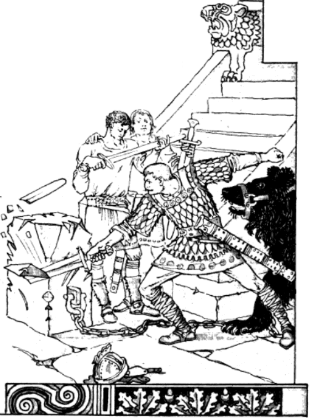
Ogier hit him on the helmet, and made him stagger. He said to him, "I
have returned to you what you gave me, so we are equal. Do you want to
start again?"
"That is what I want," Renaud replied.
They fought again, but Alard, Guichard, and Maugis arrived with their
people. Ogier, seeing them coming, crossed the river, and when he had
gone down, he found himself without a saddle.
Renaud, seeing Broisart without a saddle, said to Ogier, "Cousin, come
and get your saddle. It would be very shameful to return this to you.
Thank God that you did not do worse, for if you had stayed, I would have
put you in a prison cell."
"Renaud," he said, "you threaten from afar. I know that without your
people who rescued you I would have taken you prisoner to Charlemagne."
Renaud said to him, "You showed your value by crossing the river to come
and fight. If you want to wait for me, I will come by, and we will start
again."
"Yes," said Ogier, "and if you do, I will esteem you the most valiant
knight in the world."
Renaud wanted to cross the river to go fight, but Alard and Maugis
stopped him by saying, "Brother, what do you want? You outrage too much
those who have done you good. You know that without Ogier we would have
died, and that the help of Maugis would have become useless. Leave Ogier
in peace, because he is an excellent knight."
Alard said to Ogier, "Cousin, go away."
He then said to Renaud, "Dear brother, I am of the opinion that we
return to the rock to find out how our brother Richardet is doing."
"Renaud," said Ogier, "you have defeated us, but we will come upon you
again with so many people that we will take you."
"We have," replied Renaud, "a castle where we will wait for you. For
now, the loss is on your side, and you will not bring good news to the
king."
Ogier returned to his people who had left him, and came to the king's
tent. When Roland and Oliver saw Ogier thus wounded, they thought that
Renaud and his brothers were captured, so they called Duke Naimon,
Salomon, Richard of Normandy, and Count Guidelon. When they were all
assembled together, they said among themselves, "What shall we do? If
the king hangs the four sons of Aymon, our cousins, we will all be
dishonored."
When Charlemagne saw Ogier, he asked him, "Where are the four sons of
Aymon? Did you capture them or kill them?"
"Sire," said Ogier, "I believe it is impossible to take them, because
they are the best knights in the world. We found all four of them on the
plains of Vaucouleurs. They were dressed in scarlet cloaks lined with
ermine, mounted on mules, and carried roses in their hands. King Yon
kept his promise to us. They found lances and shields, and when Renaud
had gained a horse, he killed Foulques, after which he retreated to a
rock where he defended himself for a long time with his brothers. They
would all have been killed if Maugis, their cousin, had not rescued
them, coming at the head of five thousand knights who defeated us all,
and killed Count Guimard."
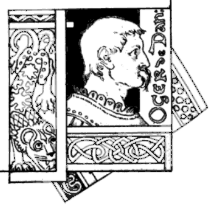
"So they escaped?" said Charlemagne.
"Yes," said Ogier.
The king was very angry and said, "So I will never be able to take
revenge on these four miserable knights!"
Ogier then said to him, "Renaud gave me such a terrible blow that the
tip of my helmet fell off. Of the three thousand knights that were with
us, only three hundred survived."
When Roland heard it, he was angry, and said to him, "Ogier, you have
done very badly, and any other knight would have done better than you.
You wanted to save them because they are your cousins. The king must be
very good not to punish you for it."
Ogier, seeing himself thus reproached, replied to Roland, "You lie, and
I am not as you say, because I would not want to commit treason for all
the gold in the world. I am ready to prove to you, body for body, that
my relatives nor I have never done anything against the king. Know that
I come from a very noble family. Gérard of Roussillon was my uncle and
raised me from my childhood. Deon of Nanteuil and Duke Beuves of
Aigremont were my uncles, and Geoffroy of Denmark was my father.
Archbishop Turpin was my relative, and I come from the family of Richard
of Normandy and the four sons of Aymon. You, Roland, now tell us who
your family is? I will then show you, sword in hand, whether I am honest
or not."
Roland, irritated by what Ogier had said to him, advanced to strike him,
but he put his sword in his hand, and said to Roland, "Do not be so bold
as to lay your hands on me, for I swear to you that I will cut off your
head if you come here."
The king, seeing the barons so angry, was annoyed. Duke Naimon and Count
Emery said to Roland, "What do you think you are doing? This is not as
you say. Ogier is a noble knight. We are surprised how the king suffers
so much pride from you, but we will not suffer it."
The king was angry at this quarrel and said, "Roland, remain calm. I
will know tomorrow how Ogier will have behaved."
"Sire," said Ogier, "I am willing. There is no one bold enough in France
to accuse me of treason, and I am ready to fight against him. I will
remember the words that Roland said against me, and I promise him that
wherever I find him, I will be able to repay him. Roland was too eager
to threaten that he would hit me, without my having given him reason to
do so, but let him learn that if he saw Renaud mounted on Bayard, he
would not call him a coward, and would not dare to wait for him."
Roland said to him, "Certainly you give him enough praise. Would to God
that I could meet him mounted on Bayard, and fully armed, to find out if
he is as valiant as you say!"
CHAPTER 15 - How, after the defeat of the French by Maugis, King Yon, being in a monk's habit, was taken by Roland.
After Renaud and his brothers had destroyed the French, they returned to
the rock of Montbron, where they had left their brother Richardet.
Seeing him thus injured, they said, "Alas, we lost our brother
Richardet, the bravest among us!" They felt regret over the loss of such
a good brother.
Maugis arrived and said to them, "If you will promise me, in front of
all your barons, to come with me to Charlemagne's tent, and help me
avenge the death of my father, I promise to heal Richardet."
Renaud said to him, "Cousin, please return my brother to me safe and
sound, and if there is anything I can do, I will do it with a good
heart. I will do anything for you."
"Richardet will soon be healed," said Maugis. Then he dismounted and
took a bottle of white wine. He washed Richardet's wound and removed the
blood that was around it, then took his intestines, put them back, and
sewed up the wound without doing him any harm. Then he took ointment and
anointed the wound. Immediately he felt safe and sound. He then gave him
a drink. Richardet got up and asked where Ogier and his people had gone.

"Brother," said Renaud, "we destroyed them all, thanks to Maugis who
came to help us, otherwise we would all have perished."
"Brother," said Richardet, "we owe him many obligations."
Alard said to Maugis, "I have a wound on my thigh. Heal me, please."
Guichard also asked him for healing.
"I will heal you all," Maugis told them.
He took white wine and washed their wounds, then anointed them, and they
were immediately healed. They put Richardet on horseback, and set off to
return to Montauban.
They sent a spy from Renaud to King Yon, who said to him, "Sire, know
that Renaud and his brothers have escaped from the plains of
Vaucouleurs, where you had sent them. They defeated Ogier the Dane and
all the emperor's people. They killed Foulques and Count Guimard, and a
large number of other knights."
When the King Yon heard it, he was very surprised, and said, "What bad
news! So they did not find Charlemagne's ambush?"
"They found it," replied the messenger, "and they would have been taken
if Maugis had not rescued them. He defeated Ogier and all his people."
"Alas! I am an unfortunate man! What will I do? If I wait for Renaud, I
am dead, and no one will defend me against him. Judas was no more
treacherous than me! Let us leave these places, and if we can reach the
forest, we will stay at the abbey of Saint Lazarus, where I will take
the habit of a monk, and I think it will not do me any harm."
There was a spy named Pignaut, who was seven feet tall, and who walked
faster than a horse. This Pignaut had heard what King Yon said. He
immediately set off towards the Forest of the Serpent. In a short time
he was with Renaud, who returned with his brothers and Maugis to
Montauban, and took many prisoners.
It was there that Pignaut observed everything, and then went to Roland's
tent, to whom he said, "Lord, I bring you good news."
"Friend," Roland said to him, "what good news?"
"Lord, know that King Yon fled completely unarmed with his people. They
only take their horses, and they go to the Forest of the Serpent, to a
convent called Saint Lazarus, and he will turn himself into a monk."
"By my faith!" said Roland, "I will go and attack them with four
thousand combatants, and I will take revenge on Renaud, and have them
all hanged."
"Lord," said Pignaut, "I found the four sons of Aymon at the ford of
Balançon, who were taking several of our people prisoners."
"Friend," Roland said to him, "you deserve a reward for this good news."
Oliver said to him, "Let us now mount our horses, and bring with us
Guidelon and Richard of Normandy. And you, Ogier, will also come with
us, and see the value of Renaud. We will only lead four thousand
knights. Renaud has the same on his side, so we can fight without any
risk."
"I will go with you," said Ogier, "to see if you will take him. And when
you have him, I will lend you a rope if you need it."
When they were ready, the great Pignaut led them to the ford of
Balançon. They arrived at the monastery of Saint Lazarus of Autun.
Meanwhile, Roland and his people arrived at the abbey. The abbot went to
meet them singing the Te Deum, then he said to Roland, "Lord, welcome.
Would you like to have dinner with us?"
"Lord, we thank you with all our hearts. Know that we are looking for
the worst traitor in the world, it is King Yon who is here. I want him
to hang like a thief."
The abbot replied, "You will not do it, please, because he has taken our
habit."
Roland seized the abbot, Oliver seized the prior, and they threw them so
roughly against a pillar that they broke their heads. Then Roland said
to the abbot, "Give me back this king who is a brother of Judas, for he
will never commit treason."

The abbot and the monks, hearing this, fled. Then Roland, seeing them
flee, put his sword in his hand, and entered the cloister, where he
found King Yon kneeling before an image of Our Lady.
He said to him, "You must come with me to Charlemagne. Where are the
four sons of Aymon that you had to return? You will be repaid for the
treason you have committed, and I will avenge Renaud and his brothers."
He had him placed backwards on a horse and blindfolded. King Yon called
one of his barons, and said to him, "Go to Montauban, and tell Renaud to
come and help me, and please forget my wickedness."
"Sire," said the knight, "I would like you to exempt me from this
message, because he will not do it because of the betrayal you have done
to them."
"He will," said the king. Then the knight left to go towards Renaud.
CHAPTER 16 - How Renaud and his brothers returned to Montauban, and gave aid to King Yon, and of the combat between Renaud and Roland.
Renaud and his brothers, being healed of their wounds, returned to
Montauban. Lady Claire went to meet them, [29] taking with her her two
children Aymonnet and Yonnet. The lady saw her husband, she trembled
with joy, and the two little children ran to embrace their father and
uncles, but Renaud roughly pushed them back.
His wife came to kiss him, but he said to her, "Go away. I no longer
love you, go back to your brother. It was his fault that we were almost
dead. Fortunately, God and Maugis gave us help! I do not want anything
more from you."
Claire, all in tears, said to him, "I swear to you, in the name of all
the saints, that I had no part in this betrayal. On the contrary, I
urged you not to go there. You see clearly that I am not guilty." She
fell weak at Renaud's feet.
Richardet took her by the hand and lifted her up, saying, "Do not be
angry, and let Renaud speak, you are still our sister."
"My brothers," he continued, "let us go and ask our brother Renaud to
forgive our sister. She is in no way guilty, because if we had listened
to her, we would not have gone there."
They went to Renaud and said to him, "Brother, do not be so angry. You
know that your wife was unaware of the betrayal that her brother
committed against you. If you had listened to her, we would not have
risked going there. We ask you to forgive her."
"I gladly forgive her in your favor." They immediately went to look for
the lady, and took her to Renaud, who kissed her tenderly.
Then there was joy in Montauban. They washed their hands and sat down to
eat.
As they began to eat, King Yon's messenger arrived and said to Renaud,
"The king commands you to come and help him, or else he will be dead.
Roland and Oliver take him to hang in Montfaucon. Forgive him as God
forgave Mary Magdalene, he knows well that he deserves death."
"We will not go," said Alard, "and damn Roland if he does not hang him
like a traitor!"
Renaud lowered his head, letting a few tears escape as he looked at his
brothers, because a good heart cannot be denied.
He forgot the treason of the king, and said to his brothers, "Lords, you
know that it is wrong that Charlemagne has disinherited me and, not
content with that, made my father swear that I would never have anything
from him. You know that after all the evils we endured, we came here,
and that King Yon showed me much friendship by giving me a duchy, and
his sister in marriage. My children became his nephews, and I never
recognized any evil in him. It was the fear he had of Charlemagne that
led him to betray us, and he only did it because of the evil council of
his barons. We must go and help him. It would be shameful for my
children if it were said that their uncle had been hanged. Despite his
betrayal, we must not forget his gifts."
Alard said that he did not care about helping a traitor.
Richardet said to him, "We must obey Renaud, he is our lord."
The citizens all said, with one voice, "Blessed be the hour in which
Renaud was born. We have never seen a bolder knight."
They said to him, "Lord, we will recognize you as our king. We beg you
to help Yon. It would be shameful for Gascony if its king were hanged."
Renaud took a trumpet and made the Castle of Montauban ring out with the
sound of it. Immediately everyone went to arm themselves. Renaud took
his lance and mounted Bayard.
They set out in the number of six thousand men on horseback and well
over a thousand men on foot and when they were outside Montauban, Renaud
said to them, "Lords, we believe that King Yon is in great danger, so I
beg you to do your best. You know that Roland hates me, so I ask you to
think of me, and we will see who is the best knight."
Alard said to him, "We will never abandon you."
They saw Roland's people. Alard stopped and waited for Renaud. When
Roland saw the people of Renaud, he said to his people, "Lords, I see
many armed people coming, could they not be Renaud and his brothers?"
"Lord," said Archbishop Turpin, "it is them. They make themselves well
known, but we cannot escape with them."
Ogier, seeing Renaud, was very happy that he had met Roland. Then he
said to him, "You have what you want. We will see if you can take him to
Charlemagne as a prisoner. You will then have Bayard, and the war will
be over."
Roland replied, "We will see which of us is the better knight." He
arranged all his troops in order.
Renaud said to his brothers, "Lords, here are the French. See Roland,
Duke Naimon, and Ogier. Stay here to act as rear guard. If we need help,
you will come to succor us."
"Lord," said Maugis, "let us attack our enemies vigorously."
"Let us think about doing well," said Renaud. "I am going first to
destroy Roland's pride, and everyone prepare to follow me."
When his brothers heard that he wanted to fight against Roland, they
said, "Alas! Do you then want to destroy us all? You are wrong, because
we cannot hurt him. [30] We ask you to leave him and fight against
others."
"I know well that Roland is courageous and that there is no more valiant
knight in the world, but I have the right and he is wrong, I risk
nothing to fight against him. If he wants to have peace, he will have
it, because I prefer to die with glory than to languish shamefully.
Please do not bother me with any more talk. Think about attacking our
enemies. We are dealing with good knights."
"Attack them," said Maugis, "and we will help you."
Roland, seeing Renaud and his people coming in such good order, said to
Ogier, "What do you think of these people?"
"Great God!" said Oliver, "they are well ordered, and appear to
outnumber us. We must take care of ourselves, because they are good
knights."
"Oliver," said Roland, "you are right, but know that the Gascons are not
courageous."
"This is true," said Archbishop Turpin, "but they have the best guide
one could have."
Roland was not happy with the praise given to Renaud. Then he spurred
his horse and came against Renaud, who, seeing him coming, said to
Alard, "Take care not to leave here until I return from fighting Roland,
for I will see him alone."
Renaud set off like lightning, rode towards Roland, and when he was near
him, he dismounted and tied Bayard.
He then took off his sword, and came before Roland to whom he said, "You
know that I am your relative, and, if you want, my men and I will be
your people. I will give you my horse Bayard, and will give you the
Castle of Montauban, provided that you make my peace with Charlemagne.
If you agree, I promise you that we will leave France to wage war
against the Saracens."
Roland took pity on him, and let a few tears escape, then he said to
him, "Renaud, I cannot offer this to him unless you return Maugis to
him."
Renaud replied to him, "No, I never will, because Maugis is not a man to
surrender for peace."
Then he got up, and took his sword and his shield, went towards Bayard,
mounted him, took his lance, and, when he was fitted, he returned to
Roland, and said to him, "Roland, I will not cry out for mercy out of
apprehension of you, but you are so proud that you will not listen to
me. I am doing you a good job, so that you cannot tell the barons of
France that fear has led me to ask you for mercy. If you want, we will
both fight. If I am victorious, you will come with me to Montauban."
"Will you do as you promise?"
"I swear to you," Renaud replied, "I swear to you."
Roland then said to him, "I want first to take leave of Oliver, my
companion, because I promised to let him know of all my undertakings."
"Go on," said Renaud.
Roland went to his people. Hector, Oliver, and Ogier the Dane said to
him, "What do you think of Renaud? Did you talk to him?"
"Yes, said Roland. "Renaud is a good knight, because he proposed to me
to fight man to man, on the condition that our people will not act on
either side."
Oliver said to Roland, "You will do as you please, but I do not advise
you to go there."
Archbishop Turpin and the other barons said to him, "What will you do
against Renaud? He is your relative, so it is better to have your people
fight against his people than to expose yourself to the death of one or
the other."
"I will follow your advice," Roland replied. He said to his people,
"Remember to fight well." They got ready, and Roland shouted, "Montjoie!
Saint Denis!"
When Renaud saw that everything was prepared to defend himself, he threw
himself into the melee of the French, and began by knocking down a
knight to his death with a blow he gave him in the chest. He then put
his sword in his hand, and began to shout, "Montauban!" He broke up the
first battalion of the French.
Richardet, seeing that the first battalion was broken, shouted,
"Dordogne!" He then worked wonders. Renaud had stopped to look at him,
and Richardet said to him, "Where are your tremendous blows? Strike and
they will soon be defeated."
When Renaud heard Richardet speak, he returned to the fight with more
fury than before.
The French, seeing that their side was losing, cried out to Roland to
come and help them. Roland, animated, jumped into the fray and shouted,
"Renaud! Where are you? I am ready to accept your proposal by fighting
hand to hand."
Renaud, hearing his name, put his sword back in its sheath and took a
thick short lance. He came against Roland, and said to him, "Where are
you? And why did you wait so long?" So they pitted their horses against
each other.
Salomon of Brittany and Hector, seeing that they were jousting together,
said to Duke Naimon, Archbishop Turpin, and Oliver, "Lords, will you
allow the best of knights to perish before your eyes?"
"It is true," replied Duke Naimon, "that it would be painful for us to
lose him."
They then recommended Ogier to go and tell Roland not to fight with a
sword against Renaud, but to take a lance and break it on Renaud.
"Lords," replied Ogier, "you must let them do it. You do not know
Renaud, he is not the man to be frightened, because Roland will be tired
before he returns, and will be as willing to leave the battle as
Renaud."
"Ogier," said Hector, "you speak out of envy. If you were to fight
against Roland, you would speak differently. Make sure they do not fight
any more."
Ogier came to Roland and told him what the barons had recommended to
him.
"May God punish them, because today they will have the challenge of my
uncle Charlemagne!"
Then he turned to Renaud, and said to him:, "Lord, you have tested my
sword and not my lance."
Renaud said to him, "If you leave your sword, I will not be kind to you.
However, I do not fear you. Let us finish our fight."
Roland wanted no more, and he did what the barons had recommended to
him. He took a lance and ran against Renaud, who also came against him,
and they struck each other so roughly that they broke their lances and
made their horses go backwards. Roland fell with his horse and Renaud
shouted, "Montauban!"
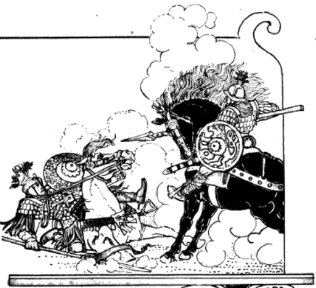
CHAPTER 17 - How Roland was defeated by the blow of the lance that Renaud gave him, and by the combat that took place between the two of them.
Roland, seeing himself knocked down, was very unhappy. He got up and put
his sword in his hand, and came against his horse Mellenaie to cut off
his head, and said, "Bad roussin, I almost killed you for having fallen
under the blows of a Gascon. I will never trust you."
Renaud said to Roland, "You are wrong, because it has been a long time
since your horse has eaten, so he cannot work, but Bayard ate well last
night, and consequently he is stronger than yours."
He got off because Roland was on foot. When Bayard saw that his master
was on the ground, he ran on Roland's horse and kicked him with his hind
feet so roughly that he almost broke his thigh.
Roland ran against Bayard to cut off his head, but Renaud said to him,
"What do you want to do? It is against me that you must fight. I am
ready to account for you."
Roland said to Renaud, "Do not threaten so much, because in a little
while you will see something that will not please you very much."
Renaud, irritated by these threats, ran against Roland, and gave him
such a blow on the helmet that he broke it.
Renaud then said to Roland playfully, "What do you say about my sword?
Does it cut well? Take care, and do not continue to treat me like a
Gascon."
Roland retreated back for fear that Renaud would give him a second blow.
He drew Durendal, his good sword, and with one blow he split Renaud's
shield in two.
He then said to him, "I have just returned to you what you lent me. We
are equal."
"I will not retreat," said Renaud, "but I will fight with all my power."
As they were about to start again, Maugis arrived and said to Renaud,
"Stop. It would be a shame if one of you were killed."
Ogier and Oliver put Roland back on horseback. Ogier was delighted that
Roland had been overthrown.
Roland began to shout, "Renaud, where are you? Let us finish our fight,
because we cannot judge which of us is the better knight."
"You have courage," replied Renaud, "but if we fight here, our people
will not want to suffer. It would be better to do what I tell you. You
are well mounted and so am I. Let us cross the river, go to the Forest
of the Serpent, and there we will be able to fight without hindrance."
"I want to," Roland replied. So they spurred their horses to go to the
woods, but Oliver noticed this and stopped Roland in spite of himself.
Renaud was preparing to cross the river. He saw eighty knights taking
King Yon away.
Then he put his sword in his hand, spurred Bayard, and cried with all
his might, "Wretches! Leave this king." He cut one of them down with a
sword and left him for dead.
The rest fled, saying among themselves, "Where did this man come from?
Whoever waits for him perishes!" They left King Yon, and won their way
through to the thickest part of the forest.
Renaud approached King Yon, opened his eyes, untied him, and said to
him, "Ah! Bad king, how dare you betray us like this? My brothers and I
had done you no harm. It was your fault that we were almost all hanged.
You deserve to have your head cut off."
When King Yon saw that Renaud had delivered him, he threw himself at his
feet and said to him, "Noble knight, I know that I deserve death,
because I committed a cruel treason, but since I must die, cut off my
head, I would rather it be you than anyone else. The Count of Anjou and
Count Antoine had advised me to take this black action. Put me to death,
a traitor like me must not live any longer."
"Get on your horse," said Renaud to him. "Then we will see what we have
to do."
CHAPTER 18 - How Roland and his people were defeated in an encounter, and Richardet was taken prisoner by Roland.
After Roland left to fight against Renaud at the Forest of the Serpent,
Roland, Ogier, and Oliver fought against Alard, Guichard, Richardet,
Maugis, and their people. The fight was difficult, and there were many
killed on both sides, but the loss went to Roland's side, and the
brothers of Renaud, helped by Maugis, remained the victors.
As Roland was returning, Ogier said to him, "Lord, who stole your shield
and wounded your horse in the thigh? I see you are hurt, because he
appears at your side. I believe you have found Renaud, Aymon's son. Are
you taking him prisoner?"
Roland, irritated, put his sword in his hand and ran at Ogier to strike
him. But Oliver and Idelon separated them.
Richardet then came and shouted, "Roland, come and joust with me."
"Gladly," he replied.
They spurned their horses and met so roughly that Richardet fell to the
ground. He immediately got up, remounted his horse, drew his sword, and
defended himself.
When Roland saw that he was one of the four sons of Aymon, he was
joyful, and began to cry, "To me, my friends! If he escapes, I will tell
Charlemagne."
The French all threw themselves on Richardet, killing his horse under
him. He wounded Count Antoine with a sword blow, and killed another. He
was told to surrender if he did not want to be killed.
"Lord," said Richardet to Roland, "I would rather go to you than to
anyone else." Then he gave him his sword, and they put him on a mule and
took him away. His squire, seeing his master taken away, immediately ran
to tell Renaud, who asked him if they were already very far away.
"Yes," he replied. "You will not be able to catch them."
Renaud was more angry than before. He saw Alard, Guichard, and his
people coming, who thought that Richardet had arrived. Alard, seeing
that Renaud was sad, asked him what was wrong with him.
"Alard," said Renaud, "I left you our brother Richardet. You let him be
taken prisoner, because Roland has captured him, and they are already
very far away."
Alard and Guichard heard him, and were very angry.
"Alas!" said Renaud, "What a great shame! If you had lived, you would
have surpassed all your brothers in courage."
Alard said, "It is your fault, because you made us come here against our
will to help King Yon. Now we have lost our brother Richardet, with no
hope of seeing him again." Then he said to Guichard, "Brother, draw your
sword, we will cut off King Yon's head."
"I beg you," said Renaud, "not to do him any harm, for he has
surrendered to me. Take him to Montauban, and let him be guarded. For
me, I want to go to Charlemagne's tent where I will find my brother
Richardet, or I will perish with him."
He tried to leave, but Alard held his horse by the bridle, and Guichard
said to Renaud, "You will certainly not go."
In the meantime, Maugis arrived, and seeing his cousins distressed, he
asked them what was wrong with them.
"Cousin," said Alard, "know that the French have taken our brother
Richardet prisoner, and Renaud wants to go to Charlemagne's tent. If he
goes, we will never see him again."
Maugis said to Renaud, "You would be wrong to go there. Return to
Montauban. If Richardet is not dead, I will bring him, even if he is
locked up in prison, despite Charlemagne."
"Cousin," said Renaud, "I will become your man if you can do it." [31]
"Cousin," said Maugis, "I will."
The three of them set out to go to Montauban. When Renaud's wife learned
of her husband's arrival, she was joyful, and took her two children with
her. Aymonnet and Yonnet began to shout at their uncle, "Vassal, if you
were not a prisoner, you would die." They said to him, "Ah! Bad king,
why did you betray our father and our uncles? Certainly you deserve
death."
When Alard heard his nephews, he could not hold back his tears. He
kissed Aymonnet, and said, "How humbled we are!"
When the lady saw Alard crying, she thought that it was not without
reason, and said to Alard, "Brother-in-law, tell me the reason for your
sadness."
"Lady," said Alard, "know that we have lost our brother Richardet,
because Roland is taking him prisoner to Charlemagne."
When Maugis returned to Montauban, he disarmed himself and stripped
himself naked, took some grass which he ate, and became swollen like a
toad. He then took another herb, rubbed himself with it and became black
as coal, and looked like a dying person. When he was thus counterfeited,
he put on a large hood, shoes, and, a stick in his hand, he left
Montauban, and arrived at Charlemagne's tent before Roland.
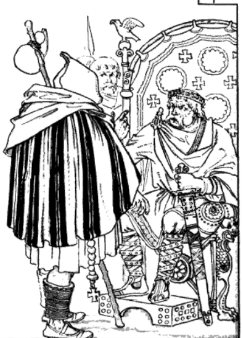
He approached the King, and said, "May God preserve you!"
"Vassal," said Charlemagne, "I distrust you since Maugis deceived me.
Maugis said nothing.
Some time later, he said, "Sire, if Maugis is a rascal, the others are
not the same. I have just come from Jerusalem to adore the Holy
Sepulchre. I passed yesterday at Balançon and went to Gironde. I passed
above Montauban, where I found brigands who killed ten men that I was
leading, and took away what I had, and I had great difficulty in getting
out. When I was saved from their hands, I asked who these bandits were.
I was told that it was the four sons of Aymon and a great thief named
Maugis. I asked why they acted like this, seeing as they were gentlemen.
It was, I was told, because they were reduced to extreme poverty in
Montauban. I do not believe you can see a more cruel man than Maugis,
because he put me in the state you see me in. Sire, I beg you to take
revenge on these people."
Charlemagne asked him what his name was.
"My name is Guidon, and I was born in Brittany. I am rich in my
country."
"Pilgrim," said Charlemagne, "I cannot take the right for myself, for if
I held them, I would put them to death.
"Sire," said Maugis, "may God make me right, since you cannot!"
The barons said to the king, "This Pilgrim seems to us an honest man.
Assist him, we beg you."
The king gave him thirty pounds of silver coins. Maugis received them
and said in a low voice, "I will give you your silver back before
leaving here." When he had the silver, he asked for something to eat.
The king had food brought to him, and Maugis thanked him honestly.
As the king spoke to Maugis, Roland and his people brought Richardet as
a prisoner. Ogier, Hector, and Naimon, seeing Roland go to Charlemagne's
pavilion with Richardet, said to him, "Why do you want to deliver
Richardet to the King?"
"What do you want me to do with him?" Roland replied.
"That you deliver him."
A servant, who had heard everything, went to Charlemagne, and said to
him, "We have been defeated at the ford of Balançon by Renaud, but
Richardet, one of the most valiant after Renaud, is taken."
At this news, Charlemagne does not could contain his joy, especially
when he saw Richardet whom Roland had taken prisoner.
"I see clearly that you were there," said Charlemagne, "otherwise you
would not have taken Richardet." Then he said to him, "You will be
hanged, you wretch."
"Sire," said Richardet, "you are holding me prisoner, but as long as my
brother Renaud can mount Bayard, I will not be hanged."
The king took a stick and gave Richardet a terrible blow on the head,
who, grabbing him by the half of his body, made him fall to the ground
with him. Roland wanted to attack Richardet, but Ogier and Salomon
stopped him, and told the king that he must not strike a prisoner.
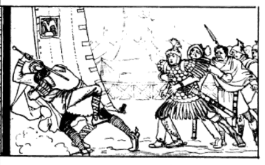
Richardet saw Maugis leaning on his stick and saying nothing. His
presence reassured him, and he said to the king, "Sire, where will I be
hanged?"
"It will be at Montfaucon," [32] the king replied.
Maugis, having heard everything, returned to Montauban, where Renaud and
his brothers were waiting for him. Renaud, seeing him coming from afar,
said to his brothers, "It is your fault if Richardet is hanged. We are
losing him forever, because I see our cousin Maugis returning alone."
He arrived, and he told them that Richardet was not hanged, but that
they had to go and rescue him quickly, because the king had sworn to
have him hanged at Montfaucon. Maugis then took off his hood, took some
grass which he ate, and was soon deflated. He immediately armed himself
and presented himself to Renaud. The brothers of Renaud and their people
also armed themselves and marched towards Montfaucon. When they were
within a bowshot, Renaud said to his people, "We must save our brother
or perish with him."
"Brother," said Alard, "let us set ourselves in ambush in this pine
forest." They entered it and fell asleep there.
Charlemagne called Duke Naimon and Richard of Normandy, and said to
them, "Lords, I beg you to give me your advice as to what I should do
with Richardet. I fear that Renaud will come to his aid when I have him
hanged. I need a man who fears neither him, nor his brothers, nor
Maugis."
He called Béranger of Valois, and said to him, "You get everything from
me, so I think you will be of use to me if Renaud comes to rescue
Richardet."
"I cannot," replied Béranger, "because it would dishonor me."
The king, seeing that Béranger did not want to consent, called Count
Idelon, and said to him, "You have Bavaria from me, you must serve me
with two thousand men. If you will hang Richardet, I will give you
Melun."
Idelon replied that he would do everything possible to ensure that
Richardet did not suffer any harm.
"Withdraw," said the king to him.
He called Ogier, and said to him, "It was reported to me that you had
betrayed me on the plains of Vaucouleurs. I will see if this is true, I
will give you the Duchy of Laon, and leave you with everything if you
will hang Richardet."
"I cannot, Richardet is my cousin. I challenge the first who dares to
lay their hands on him."
He said to Archbishop Turpin, "I will make you Pope if you will hang
Richardet."
"I cannot, because I am a priest, and he is my cousin."
He called Salomon and promised him the Duchy of Anjou, but he replied
that he would not do so.
He then turned to Roland, and said to him, "Nephew, I will give you
Cologne if you will hang Richardet."
"Sire, I would be a traitor. On the contrary, I beg the Twelve Peers not
to do him any harm, for I would be dishonored."
"May God curse you!" Charlemagne told him.
He then said to Hector, "I will give you the County of Clermont and
Montferrant if you will hang Richardet."
Hector replied that if he would give him all the country that his father
owned, he would willingly submit to his orders. "You have to go there
necessarily, you would not want to come there for half of your kingdom."
The angry king took a stick with which he struck Hector.
The Twelve Peers, indignant at this action, all left the king's tent,
which made him very angry, and he said to Duke Naimon, "Where have they
gone?"
"Sire, they left with good reason, because it does not suit you to
strike barons, and you will be blamed for it."
Charlemagne said to Richard of Normandy, "Will you hang Richardet?"
"Gladly," he replied. "Come with me at the head of a thousand well-armed
knights, and I will hang him wherever you want."
"Depart from me," said the king to him.
He called Duke Naimon, and said to him, "What advice do you give me?"
"Sire, you know that Renaud, his brothers, and Maugis are the best
knights in the world. Besides, the war has been going on like this for
quite a long time. If you listen to me, you will return Richardet to his
brothers, and Renaud and his brothers will become your men."
"Naimon," said Charlemagne, "they have disdained me too much. I want to
hang Richardet."
"You will not do it," said Naimon to him. "He is from our family."
Ogier arrived and said to Duke Naimon, "Let him do it, because the more
you beg him, the worse he will do."
Ogier left the tent with several barons, and they assembled their
people. Ogier then shouted, "We will see who dares to lead Richardet to
be hanged."
When Richardet heard Ogier speaking thus, he said to him, "I see that if
you could save me, you would."
The Twelve Peers of France came to Charlemagne, and said to him, "We are
your people. We have done everything possible to get you to agree with
our cousin Richardet, but since you will not do it, we will not talk to
you about him anymore."
CHAPTER 19 How Charlemagne sent Richardet to be hanged, how Renaud came to his aid and delivered him, and how, after this, Charlemagne hanged Ripus.
Charlemagne called Ripus, and said to him, "If you will hang Richardet,
I will make you my chamberlain."
"I am willing," he replied, "because Renaud killed my uncle at the ford
of Balançon. [33] Promise me that none of the Twelve Peers of France
will hold it against me." The king made all his barons promise it.
Ripus went to arm himself and returned to the king, who told him to lead
one thousand knights to defend himself in case Renaud tried to free
Richardet. Richardet was delivered to him, and he put a rope around his
neck, like a thief. He made him pass in front of Charlemagne's tent, who
was well satisfied.
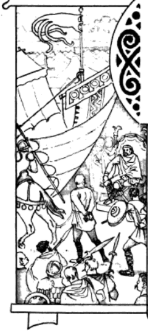
Ripus having arrived at Montfaucon, said to Richardet, "This is the
place where I will avenge the death of Foulques of Morillon."
Richardet said to Ripus, to amuse him a little, "If you free me, I will
give you two hundred marks of gold."
"I will do no such thing," replied Ripus.
"Have pity on my soul, and bring a priest to hear my confession."
The priest came and Richardet took a very long time to confess, waiting
for someone to come and help him. Seeing that no one came, he asked the
priest for absolution, who gave it to him while crying.
Ripus, seeing that his confession was over, prepared to put him to
death.
But Richardet said to him, "Please let me say a prayer which I learned
in my childhood."
Ripus granted him this, and he began thus, "Almighty God, who by your
divine goodness created the Sun and the Moon, the Earth and the four
elements, formed man in your image, placed him in your Paradise, where
you let him enjoy all the fruits, except the forbidden fruit, but,
because he was disobedient, he was cast out and suffered many evils.
Lord, who by your divine goodness have had pity on human nature, and
delivered Noah from the flood, who took Jonah from the belly of the
whale, who took human flesh, and suffered death and the Passion to
redeem us. Deign, on this day, to deliver me from the danger to which I
see myself exposed."
Then, overcome with grief, he told Ripus to do whatever he wanted with
him.
CHAPTER 20 - How Bayard woke Renaud who was sleeping, by stamping his foot so hard on his shield that he woke with a start.
The courageous horse Bayard, who had been well trained by Maugis, and
who understood what was said almost as well as a man, heard all the
debate and the noise made by the arms of the knights of Charlemagne that
the wicked Ripus had brought with him to Montfaucon to defend him in
case Renaud came with armed people with the intention of freeing his
brother Richardet. Bayard, seeing that Renaud was sleeping, kicked so
hard on his shield that he woke him up with a start. Renaud, very
frightened, quickly got up, and, casting his eyes in all directions, he
saw that towards Montfaucon, his brother was already on the ladder. He
made no delay, but he mounted Bayard who ran like the wind. Alard,
Guichard, and Maugis woke up to the noise caused by the vigilant Bayard.
They immediately got up and rode after Renaud to give aid.
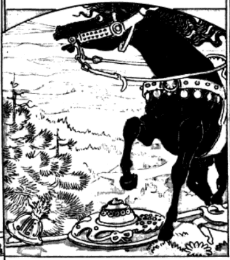
When Ripus, who was preparing to hang Richardet, saw his brothers and
Maugis coming, he was so surprised that he did not know what to do. He
then said to Richardet, "I realize clearly that you will be delivered
from my hands, and that here is Renaud and your brothers who are coming
to help you, so I beg you to have pity on me, because what I did, in
bringing you here, it was to put an end to all disputes between the king
and the Twelve Peers of France. I knew well that you would be succored
by your brothers and Maugis."
"Do not taunt me so much," Richardet replied.
"By my faith!" said Ripus, "I tell you the truth. They are not very far
from here. Come down from this ladder, and have pity on me, I pray you."
Richardet, seeing Renaud coming who was running like lightning, said to
Ripus, "I will never claim my brother Renaud if he does not hang you
with his own hands on the same gallows where you wanted to hang me
yourself."
While Richardet was talking to Ripus, Renaud arrived and heard what he
was saying. He began to shout, "Ripus! you will perish by my hand,
because you are an unfortunate person! And to punish your wickedness, I
will hang you myself on this gallows, instead of my brother. All the
power of Charlemagne cannot protect you from this."
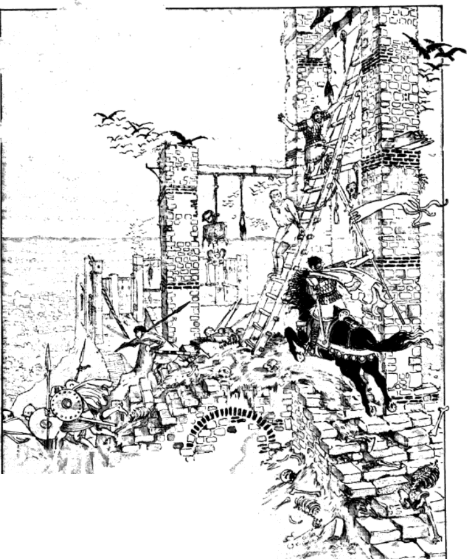
However, Maugis came in great fear and said to Ripus, "Traitor! you are
always ready to do bad things against us."
He raised his lance to strike him, but Renaud would not allow it, and
said to him, "Cousin, do not strike him. I do not want, for all things,
that anyone other than myself should hang him. If it pleases God, I will
avenge my brother." He then took his lance, and struck Ripus so hard
with it that he knocked him down dead at the foot of the ladder.
He said to his brothers, "We must hang him dead or alive and not let him
escape." Renaud took Richardet and began to untie his hands and feet,
and kissing him, he said to him, "Brother, perhaps you are in
discomfort?"
"Not at all," said Richardet. "But arm me with the armor of Ripus." He
was soon armed, mounted on his horse, and he carried the standard of
Ripus. Renaud took the rope that Richardet had around his neck, and put
it on the neck of Ripus, who he then tied to the gallows. He also hanged
fifteen of the principals of the company of Ripus, and said to
Richardet, "These will keep guard in your place."
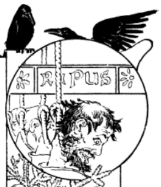
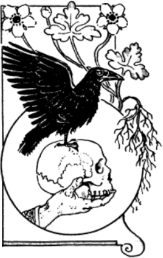
Maugis came to Renaud and asked him who had awakened him.
"It is Bayard," Renaud told him.
"The excellent horse!" said Maugis.
"Lords," said Renaud, "since we have rescued Richardet, let us return to
Montauban, and we will console my wife and my children."
Richardet said to his people, "We must love Ogier, Roland, Hector,
Richard of Normandy, Salomon, and Oliver, for they all took my interests
against Charlemagne, they really thought that Ripus would kill me, and
that I would find myself without help. If you want, I will present
myself to Ogier and to all our relatives."
"Ogier," said Renaud, "acted like a good relative. We must help our
loved ones." Then he said to Richardet, "Brother, the sun is going down,
I fear for you. If you want to go there, take with you four hundred
knights lying in wait near you. I will be here with my people, and you
will carry my horn, and if it happens that you need help, you will sound
it, and I will come and help you immediately." Then he gave his horn to
his brother Richardet, who went to Charlemagne's army carrying the
standard of Ripus.
Richardet finally arrived at the army of King Charlemagne, who was armed
in front of his tent, and watching on the road. Ogier, seeing Richardet
coming, and mistaking him for Ripus, thought that he had just hanged
Richardet. His pain was so great that he fell to the ground and said,
"Alas! We have lost Richardet, without hope of seeing him again. Renaud
and Maugis betrayed him!" Then he wanted to ride against Richardet,
thinking that it was Ripus.
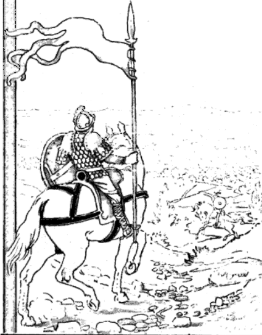
Charlemagne, believing that Ogier was pursuing Ripus, said to his
people, "Go after him, my barons! We will see who my friends will be. I
see Ripus coming, who served me well, for he delivered me from
Richardet, and now Ogier wants to kill him, but if I can hold him, I
will do him such justice that it will be talked about for a long time."
The French, accompanied by the king, pursued Ogier for a long time. But
he was already very far away, and cried, "Ripus, you will perish, and I
will take revenge for what you have done to my cousin Richardet."
Richardet said to him, "Cousin, I am Richardet and not Ripus. We hanged
him in my place. That is why I came to show myself to you and my other
relatives."
"You lie, traitor Ripus. You will not escape me!"
Richardet said to him, "Cousin, do you not know me?"
"No," said Ogier, "for you bear the arms and standard of Ripus."
"I did it," said Richardet, "so as not to be known."
Ogier says, "I want to see you in the open, otherwise I will not believe
it."
Richardet raised his helmet and uncovered his face. Ogier was happy to
see him, and asked him what they had done with Ripus.
"By my faith, cousin, my brother made him bishop of the fields, [34] and
did not want anyone to have a hand in it except him."
Ogier said to him, "Take care, for I see Charlemagne."
Ogier returned, and the king said to him, "Why are you going to Ripus
before me?"
"Sire, if you were not so close to me, I would have cut off his head,
but I do not dare for the love of you. Go to him, because I assure you
that he will not have any harm."
Charlemagne tells him, "I will defend him before and against all
people."
Then he spurred his horse and rode towards Richardet, thinking that he
was Ripus. He said to him, "Come, my friend Ripus, and fear nothing, for
I will defend you against all."
Then Richardet answered him, "I am not the traitor Ripus, but I am
Richardet, the son of Aymon. You hit me on the head this morning, and
caused me great pain. This is why my brother Renaud hanged Ripus where
he tried to hang me, with fifteen of his companions. But I defy you, be
on your guard against me!"
Charlemagne, hearing him speak thus, set his horse against Richardet.
They gave each other such great blows on their shields that they made
their lances fly into pieces. They put their swords in their hands, and
struck each other so roughly that they were forced to abandon their
stirrups. Richardet quickly got up, put his sword in his hand, and
struck Charlemagne's helmet so hard with it that he stunned him. The
sword slipped and fell on the horse's spine, so much so that it split it
in two, and the king fell to the ground. But he quickly got up and
struck Richardet on his helmet with such force that he staggered. Then a
terrible fight began, and the king began to shout, "Montjoie! Saint
Denis!" Richardet took his horn and blew it so loudly that his brothers
heard it. They spurred their horses and came to rescue Richardet.
When they arrived, Renaud shouted, "Montauban!"
Alard shouted, "Paravaine!"
Guichard shouted, "Balançon!"
And Richardet shouted, "Dordogne!"
Then Maugis rode against Mongeon, lord of Pierrefite. He attacked him so
brutally that he laid him dead at his feet. Renaud also struck another
in such a way that he passed his lance through his body and he fell to
the ground. Guichard struck another with his sword with so much force
that he split his head right down to the teeth. Alard hit the third on
his helmet so roughly that he was not spared. They fought with great
courage.
When Renaud saw that the sun was beginning to set and that night was
approaching, he feared for his brothers, and cried out, "Great God!
Protect my brothers and me today from death and prison!" As he said
these words, Charlemagne arrived and rode against him. They fought with
such fury that their lances were shattered, and they both fell to the
ground. They rose quickly, and each of them put his sword in his hand.
The king began to shout, "Montjoie! Saint Denis!" He then said, "If I am
defeated by a knight, I do not deserve to be king or to wear the crown."
When Renaud knew that it was Charlemagne, he withdrew and said, "Alas!
What have I done? It is the king against whom I jousted. It has been at
least fifteen years since I spoke to him, but I will do it now, when I
should perish!"
He then advanced towards Charlemagne, and knelt before him, saying,
"Sire, give me a truce until I have spoken to you."
"Gladly," said the king, "but I do not know who you are. However, you
joust valiantly."
"Sire, I am Renaud, son of Aymon. I ask you for mercy, therefore have
pity on my brothers and on me. You know very well that I am your vassal,
but you chased me from your land and mine about fifteen years ago, of
which several people died. You know what war is, to lose today and win
tomorrow, so I hope that in the name of Our Lord, you will have pity on
us. It is not the fear of death that makes me speak thus, but in order
to have your friendship. Sire, grant us peace, and we will be at your
service forever. I will give you Montauban with my horse Bayard, which I
need and love best after my brothers and my dear cousin Maugis, and
there is no other horse in the world like mine. And if you will not do
it, I will forgive my brothers even more, and I will leave France
without ever returning. I will go barefoot to the Holy Sepulchre out of
friendship for you, and I promise you that my brothers and I will never
return to France."
Charlemagne then replied to him, "You speak in vain. I will not grant
you peace. You will never get it from me if you do not do what I tell
you."
"Sire," said Renaud, "what do you want? Tell me."
"It is to surrender Maugis to do as I wish, because I hate him more than
anyone in the world."
"But, sire, if I give him back to you, what will you do with him?"
"I would have him dragged at the tail of a horse in Paris, then I will
have all his limbs cut off, and burn them, then throw the ashes to the
wind."
"Sire," said Renaud to him, "will you accept cities or castles, gold or
silver for his ransom?"
"No," said the King.
"Sire, if you had my brothers prisoners and you wanted to have them
hanged, I would be sorry to hand over Maugis to you for their ransom."
"Be quiet. We will never agree."
"Sire, since this is so, I will defend myself as best I can."
Then the king rode against him, but Renaud said to him, "Sire, allow me
to lay my hands on you, for if I allowed myself to be killed by you, I
would deserve to be blamed."
Charlemagne replied to him, "All this is worth nothing. You have to
defend yourself."
Then he put his sword in his hand, and struck on his helmet. The blow
fell on the shield, striking so well that it cut off a large piece.
Renaud, feeling this great blow, seized the king, grabbed him by the
middle of his body, and put him on Bayard's neck to take him with him,
but without wanting to do him any harm.
The king began to shout again, "Montjoie! Saint Denis!" and he said,
"Roland, my dear nephew, where are you? Oliver, Duke Naimon, and
Archbishop Turpin, if you let me be taken away you will receive no
honor!"
Renaud shouted his battle cry as loudly as he could.
Then Roland, Oliver, and the other barons came to the king's aid. The
brothers of Renaud and Maugis came on the other side with four hundred
knights. When they were assembled on one side and the other, there was a
terrible fight, and they killed one another like beasts.
Having arrived in the melee, Roland rode towards Renaud and gave him
such a strong blow on his helmet that he completely stunned him, and
said to him, "Vassal, you are wrong to think of taking the king away in
this way. You will let him go before you escape from me."
Renaud, seeing himself thus attacked, furiously put his sword in his
hand, and, although Charlemagne was present on his horse, he rode
precipitously towards Roland, saying to him, "Come forward! You know how
sharp my sword is!"
When Roland heard him speak, he rode after him. Renaud, seeing him
coming, left the king and fell upon Roland. There was a terrible fight
between the two of them. Then Renaud's brothers arrived, who gave Roland
so much trouble that he was forced to flee.
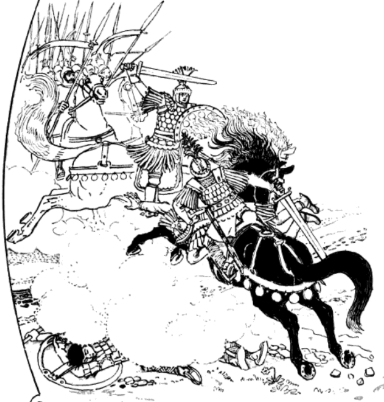
When Renaud noticed that Roland and the king were saved, he was very
angry, and said to his brothers, "My friends, you have worked poorly. If
you had been with me, we would have had a better result, because I had
captured the king whom we would have taken to Montauban."
"Lord," said his brothers, "we are very sorry about it, but we have had
so many affairs elsewhere that we had difficulty escaping. Blow the
trumpet to rally our people because night is coming, let us go to
Montauban."
When Charlemagne saw Roland and his people coming, he was joyful, and
said to his barons, "I fear that much harm will happen to you, for
Renaud has put us to flight."
"Sire," said Roland, "you were wrong to go and joust against him. You
exposed yourself to being taken prisoner."
CHAPTER 21 - How, after the defeat of Charlemagne's army, his tent was torn down and his massive Golden Eagle was taken from him, for which he wanted to give up his crown in anger and disappointment.
Renaud, seeing that Charlemagne was returning, rallied his people to
return to Montauban. He, his brothers, and Maugis stayed behind for fear
that the French would follow them.
When the greater part had crossed Balançon, Renaud took three thousand
men, and said to the others, "Go to Montauban, because I want to attack
the king."
Then they crossed Balançon, and went to the king's army.
Renaud approached the tent, and said to his people, "My dear friends, I
beg you to govern yourselves wisely."
"Lord," said Richardet, "whoever wants to acquire glory must not lack
heart."
When Richardet had thus spoken, he put his sword in his hand, and ran to
the king's tent. He cut the ropes, and caused the tent to fall to the
ground. Above it was a massive Golden Eagle which was of very great
value.
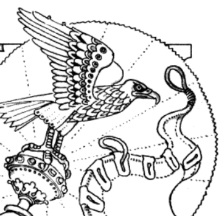
Richardet cried out, "Montauban!"
The king's people, frightened, ran to arms, but they were very surprised
to see the tents overturned on the ground.
Richardet then said to Maugis, "Cousin, come forward. Help me carry away
the loot I took." They dismounted and took the Golden Eagle.
Then he said to his people, "Lords, strike without delay."
The king's people immediately armed themselves and left their tents to
fight against the four sons of Aymon. The combat became terrible, and
the battlefield was covered with dead and dying people.
Maugis having secured the Golden Eagle, returned to the king's tent, and
said to him, "Sire, you have been persecuting us for a long time, but
you will remember your coming to Gascony. I will avenge the death of my
father, [35] and will give you such a blow that you will never make war
on anyone." Then he threw his spear against the king's breast, but he
avoided the blow by turning around a little quickly, and the spear
pierced two feet deep into the king's bed.
When Charlemagne saw this, he was very surprised and began to shout,
"Montjoie! Saint Denis!" and he said, "My dear nephew Roland, where are
you?"
When Maugis heard the king, he looked around him, and did not see Renaud
or his brothers, because they had returned. Maugis remained in
Charlemagne's army too long, because Renaud was already across Balançon,
and Roland and Oliver, very frightened, came running to the cries of the
king. When Maugis saw them coming, he did not stay long, but he left to
join Renaud. When he was beyond Balançon, he met a large company of
knights of King Charlemagne, who were coming to him. He struck one so
roughly in his shield that he knocked the man and his horse to the
ground. He broke Milo's shield and laid him dead at his feet.
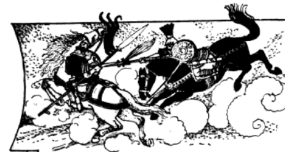
Immediately he shouted, "Montauban!" and he said, "Renaud, where are
you? Help me, because if you lose me, you will suffer!" He saw clearly
that Renaud had departed.
Meanwhile, Oliver came through the fray and struck him so roughly that
he cut him in the chest and knocked him to the ground. He quickly got up
and put his sword in his hand. The night was so dark that neither of
them could see the other.
Oliver, seeing that Maugis defended himself well, said to him, "I do not
know who you are, but if you do not surrender to me, I will cut off your
head."
"What is your name?" said Maugis. "If you are a brave knight, I will
surrender to you."
"My name is Oliver of Vienne."
Maugis having heard him, said to him, "Generous knight, I surrender to
you on your word of honor, but on condition that you will not surrender
me to Charlemagne, otherwise he would make me perish like an unfortunate
by the final torture."
Oliver replied, "It would be impossible for me to hide you from him.
Give yourself up. I promise to help you with all my power. I will
skillfully make your peace with him."
"Lord," replied Maugis, "I willingly surrender to you."
He gave him his sword, and Oliver put him on horseback and took him to
Charlemagne's tent. But they did not find him, because he had come out
as was said. Oliver, seeing that he did not find the king, feared that
Maugis would escape from him by means of his enchantment.
He said to him, "Maugis, you know that I took you by force, and that you
are my prisoner. I want you to swear not to leave here without my
permission."
"Lord," said Maugis, "very willingly."
So he swore whatever Oliver wanted. He had himself disarmed, bandaged
his wound, and had himself put in a bed. While Maugis was taken
prisoner, Renaud and his brothers made haste to carry away the loot.
"Brother," said Alard, "where did Maugis go?"
"Do not worry about him," Renaud said to him, and he went to Montauban.
Charlemagne was therefore so irritated at having his spoils taken away
from him, that he called Duke Naimon, Archbishop Turpin, Estout,
Salomon, Richard of Normandy, Ogier, and all the barons of France.
When they were all assembled, the king began to complain in these words,
"Lords, you are now my subject vassals. For fifty years no one has taken
anything away from you, and there is none of your neighbors who dares to
ask you anything. Now I am old, so I no longer want to be your king.
What will I do without you? You abandoned me out of friendship for
Renaud, with whom I am very angry, because he took me on foot and chased
me out of the camp. But since this is so, I no longer desire to live or
be king. I return the crown to you, give it to Renaud, and let him be
King of France in my place."
When the Twelve Peers of France and the barons heard him speak thus,
they were so astonished that not one of them dared to say a word. They
began to look at each other with great shame.
Duke Naimon, who had paid attention to the king's words, said to him,
"Sire, God forbid that we have contempt for you out of consideration for
Renaud! But you must think that what we have done with him is not for
bad, but for good. We thought to put an end by this means to a war which
has lasted too long, and in which many people perished. But we see that
you do not want to make peace with the four sons of Aymon. Take back
your crown, and calm yourself. We promise to serve you faithfully, and
we will take Montauban before a month has passed. We will rather perish,
and would put to death those who would spare them."
The king then answered him, "Leave all this in peace. I tell you that I
will certainly never be your king if you do not deliver to me Renaud or
Maugis the villain, who has deceived me so many times."
Then Oliver arrived, and was so astonished at the king's sadness that he
said to him, "Sire, why are you so irritated?"
Duke Naimon replied, "The king has defamed us all, because he gave up
his crown and his kingdom."
"Sire," said Oliver, "do not do it, please, but take back your kingdom,
and whoever does not obey you will be punished."
"Oliver," said the King, "I will do nothing if I do not have Renaud or
Maugis."
"Sire," said Oliver, "forgive us, and I will return Maugis to you
immediately."
Charlemagne answered him, "I am not a man who can be deceived. I know
that Maugis does not fear you."
"Sire, do you want to take back your crown? I will bring him to you
later."
"If this is so, I will do whatever you want, because I hate him more
than anyone. If Maugis were dead, the four sons of Aymon would not be
able to resist me."
"Sire," said Oliver, "I will bring him to you soon."
He went with Roland to his tent. Several other knights also entered to
see Maugis.
Oliver said to him, "Will you come to see the king?"
Maugis replied, "You have betrayed me, but I know very well that the
king will be more honest than you, because he will not do me any harm."
When they arrived at the king's tent, Oliver said to him, "Sire, you
promised me that if I returned Maugis to you, you would take back your
crown, and that you would maintain yourself as in times past."
"It is very true," said the king, "if you do what you promised me."
"Look, sire, here is Maugis whom I present to you. I took him by force
of arms."
Charlemagne was more satisfied than anyone could be, and he then said to
Maugis, "I will make you pay dearly for your pride when you took away
the Golden Eagle, and for all the thefts that you committed. You have
irritated me several times, and I will have the pleasure of punishing
you."
"Sire," said Maugis, "you will do with me what you please, because I am
in your hands. You will gain nothing from my death. I have cousins who
will know how to avenge my death by force of arms."
"Ah, thief, you are afraid now!"
"Sire," said Maugis, "I am not a thief. I can no longer defend myself,
since you hold me in your hands. When you have put me to death, you will
be able to do nothing more, and you will be infuriated with me before
twenty-four hours have passed."
"Wretch," said the king, "do not speak so boldly, for I will put you to
death before it is night, your four bad cousins cannot rescue you, and
you will not be able to save yourself by your enchantments."
Renaud and his brothers having left Charlemagne's army, returned to
Montauban.
The lady came to meet him and said, "Lord, welcome. Have you freed
Richardet?"
"Yes, thank goodness!"
Then she kissed Richardet. They rejoiced. Renaud asked about his cousin
Maugis.
The Lady replied, "I have no news."
Renaud, angry, returned to his brothers, and said to them, "I urge you
to learn if our cousin Maugis has arrived, and to go and look for him
throughout the house. Maybe he went to disarm himself."
So they asked two of his people, who said they had not seen him since he
was with them. They returned to their brother Renaud, and told him that
they had not heard from him. He was so upset and so worried that it was
pitying to see.
He then said, "My dear Maugis, you are truly abandoned! What can we do
now, since we have lost you?" He then said to his people, "Lords, I
invite you to cease your regrets. This is not the remedy that should be
given. I must go to the Forest of the Serpent to speak to the Abbot of
Saint Lazarus. He will perhaps know some news. I think that within
twenty-four hours I will know something. Farewell, my brothers."
"You are quite right," Alard replied, "but we will go with you."
"You will not come," Renaud replied.
So he had Bayard brought to him. He left Montauban, arrived at Balançon,
crossed the river and found a page who had just watered the king's
horses. When the page saw Renaud who was armed, all alone, he asked him
who he was and why he was alone.
"I am of the people of Ripus, who escaped when the four sons of Aymon
hanged him."
Renaud then asked him, "How is the king doing?"
"Lord," said the page, "he is very happy, and he has already forgotten
the loss of Ripus, because Maugis, whom he hated to death, has been
delivered to him."
He then asked him to tell him if Maugis was dead.
"Lord," he told him, "he is still alive."
Renaud was happy, and the page went away and left him alone to think
about his business. Renaud said to himself, "Great God! I do not know
what I should do or think because, if I go to attack Charlemagne, the
night is already very dark, he will believe that I have many people with
me and will be very afraid of losing my cousin, so he could kill him,
but, since this is so, I will wait until tomorrow morning, if he leads
him to his death, I will try to defend him."
CHAPTER 22 - How Maugis, condemned to death, fled with the crown, the sword, and the treasure of the king, and also took the swords of the Twelve Peers of France, and took all this loot to the Castle of Montauban.
Charlemagne, seeing himself master of Maugis, called all his barons, and
said to them, "Lords, I beg you earnestly to have a gallows erected, for
I am determined to have Maugis hanged tonight before supper, for I do
not wish to guard him until it is day."
"Sire," said Duke Naimon, "you want him to die, but you would do
otherwise if you listen to me."
"How?" he asked him.
"Sire, I advise you not to hang him at night, otherwise we would be
reproached for it. Renaud and his brothers would say that, out of
apprehension, you did not dare to do it during the day, so wait until it
is daylight to have him hanged, and, when they take him there, send
people there, so that if Renaud and his brothers come to help him, we
can hang them all together."
"Naimon," said the king, "you are mocking me. If this thief escapes me,
I am defamed."
"If you are afraid that I will go," said Maugis, "I will give you
hostages as proof that I will not leave without saying goodbye to you."
"Who would answer for you?"
"I will find someone," replied Maugis.
Then he looked around and saw the Twelve Peers. He called Oliver, to
whom he said, "You promised to do me a service with the king, when I
surrendered to you. I ask you to be a hostage for me."
"Gladly, I will do it with my life."
He then begged Richard of Normandy, Duke Naimon, Ogier, Archbishop
Turpin, and Estout to be his hostages for the night.
"Maugis," said Duke Naimon, "do you promise us not to leave here without
our permission?"
"Yes," said Maugis, "I swear it to you."
Then the Twelve Peers went to the king, and said to him, "Sire, we
answer for Maugis with our lives, and with what we have from you, and he
will not go without our permission, nor without bidding farewell to the
company."
Charlemagne then replied to them, "Lords, take care that this traitor
does not enchant you, for he is the greatest deceiver in the world.
Since you answer for him, I am putting him back into your custody, on
the conditions that, if I do not have him tomorrow morning, you will all
lose your lands, and will never be able to return to France."
"Sire," said Oliver, "we will do as you said."
Then they went to Maugis, who said to them, "Lords, I beg you to give me
something to eat, for I am dying of hunger."
When the king heard Maugis speak thus, he looked at him and said to him
laughing, "Will you eat well? Say, wicked thief."
"Yes," he replied, "when I have money."
"Let us give him something to eat." The king sat down at the table, and
made Maugis sit next to him, and served him at table.
During supper, the king did not dare eat or drink, so much did he fear
the enchantments of Maugis, but Maugis ate well, because he needed to.
When Oliver saw this, he began to laugh, and pushed Roland, saying to
him, "Did you see how the king dared not eat for fear that Maugis would
enchant him?"
"Surely," said Roland, "it is very true."
After supper, Charlemagne called his seneschal, and said to him, "I beg
you to bring a hundred torches, and let them burn all night."
"You will be obeyed."
The king returned to Roland, and said to him, "Nephew, I ask that you,
Oliver, and all the Twelve Peers of France keep watch with me to guard
this thief Maugis. You will arm a hundred good knights who will keep
watch with us, and play tables, [36] chess, and other games, so that we
do not fall asleep. You will have a thousand knights stand guard, so
that if he escapes from us, they will hold him back."
When he had spoken he sat down on his bed, and had Maugis sit next to
him, and on the other side Roland and Oliver, and all the Twelve Peers
of France.
"Sire," said Maugis, "where should I rest?"
"What?" said the King. "Do you want to sleep?"
"Yes, sire." said Maugis, "Please."
"By my faith!" said the king, "You will have a bad rest. You will not
sleep again in your life, because you will be hanged tomorrow at
daybreak."
"Sire," said Maugis, "you are wrong. I gave you hostages. Will not allow
me to do what I want with the little time that I have left to live?
Therefore, let me rest, or acquit my hostages."
"Thief," said the king, "this is of no use to you, because I want your
hostages to be free."
Charlemagne had large irons brought to him, and had them put on his
feet, with a long chain around his waist, attached to a pillar. Then he
had an iron collar put around his neck, of which he kept the key.
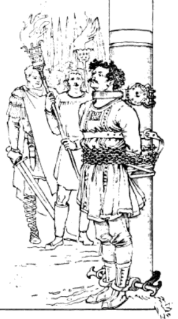
When he was thus tied, he said to him, "Maugis, you will not escape
now."
"Sire, you are mocking me. I tell you before the Peers of France that I
will be in Montauban as soon as tomorrow morning comes."
When the king heard what Maugis had said to him, he became furious,
stood up, drew his sword, and came towards Maugis to cut off his head.
When Roland saw this, he came forward and said to the king, "Sire, stop,
I pray you, because if you killed him we would be defamed forever. But
you must not pay attention to what he says because if he speaks, it is
like a desperate man and how could it happen that he would escape your
notice? So as you hold him, he is well taken."
"Nephew, I do not know how, but he mocked me so much that I am
suspicious of him."
Maugis, feeling that he wanted them to sleep, began to work his charm,
and he put them sound asleep. The king himself fell asleep so hard that
he fell upside down on his bed. When Maugis saw that the king and all
the Peers of France were well asleep, he made another charm which was of
such great virtue that the irons he had on his feet, the collar, and the
iron chain all fell to the ground. Then he got up and saw Charlemagne
sleeping with his head crooked. He took a pillow and raised his head.
He then took Joyeuse, his good sword, from him and put it on his belt,
then went to Roland, from whom he took Durendal, his good sword, then he
went to Oliver and took Hauteclaire, and then to Ogier. Then he came to
the chest where the crown and the treasure were, and he took everything.
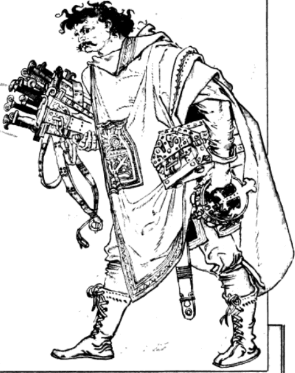
When he had done all this, he took an herb and rubbed the king's nose
and beard with it, and decharmed him. [37] Then he pushed him with his
finger, and said to him, "Sire, I told you that I would not leave
without talking to you." When he had said this, he left the king's tent
and set out for Montauban.
When the king heard what Maugis had said to him, he rose up in great
fury and went towards the Peers, but he could not awaken them. When he
saw this, he went to get some herb that he had brought from overseas. He
took some and rubbed it over the nose, mouth, and eyes of Roland and all
the other Peers of France, and immediately they all woke up, very
astonished, and when they were all awake, they looked at each other.
The first who began to speak was Duke Naimon, who said to the king,
"Where is Maugis?"
"By my faith!" he said, "You will bring him back to me, because it was
you who facilitated his escape. If you had left him hanging for me
yesterday, I would have been freed from him."
"Roland," said Ogier, "did you hurry him away?"
"No, by Saint Denis!" said Roland.
"I saw him go," said the king.
"Sire," said Roland, "you should have said something, because he would
not have gone away." He immediately looked to his side, and did not see
Durendal, his sword, at which he was very angry.
The king then said to him, "Nephew, where is your sword? God! I can see
that Maugis has enchanted us, none of us has his sword."
The Twelve Peers, seeing that they had lost their swords, were more
angry than could be expressed.
Roland then said, "Certainly Maugis made a very large booty by taking
our swords, for they are worth more than Paris."
Charlemagne, seeing his coffers open, began to say, "Ah! thief Maugis, I
have gained nothing from your capture!"
Meanwhile, Maugis was going to Montauban. He crossed the ford where
Renaud was. Bayard smelled him and began to neigh loudly, and went
towards Maugis despite Renaud.
When Maugis saw Renaud, he said to him, "Vassal, who are you who comes
here?"
"Cousin," said Renaud, "do you not know me? Praise be to God who
delivered you from the hands of Charlemagne!"
"You have forgotten me," said Maugis.
"Cousin, it is not my fault. I assure you that I was determined to help
you or perish." He then asked him what he was carrying.
"Cousin," said Maugis, "it is the crown of the king and the swords of
the Peers.
They went towards Montauban and met Alard, Guichard, and Richardet who
seemed plunged into sadness. Renaud saw them coming from afar and asked
them what they were doing.
"We were going to look for you."
They approached Maugis, and said to him, "Cousin, where were you
yesterday when we lost you?"
"Yesterday," said Maugis, "when Richardet had arrived at the king's tent
and had taken the Golden Eagle, I remained and tried to kill the king,
and I came very close to doing it! When I thought of returning after
you, I encountered a company of knights who stopped me. I defended
myself with all my strength, but Oliver came, who knocked me to the
ground. I surrendered to him, and he delivered me to the king who wanted
to hang me, but I escaped."
They went to Montauban, where they were well treated.
The next day they went to Mass, and Maugis said to them, "Lords, show us
the spoils you won yesterday."
Richardet then took the Golden Eagle and said to Maugis, "Cousin, what
shall we do with this eagle?"
Maugis said to him, "It seems to me that we should put it on the rounded
ball at the peak of the tower, so that Charlemagne and all his army can
see it."
Renaud had it placed on the highest tower of Montauban. When the sun's
rays fell on it, it cast a dazzling light that could be seen from five
leagues away.
Charlemagne, irritated, called the Peers of France and said to them,
"Lords, we have had nothing but misfortune since our arrival, because
the four sons of Aymon have insolently taunted us, with the help of
their cousin Maugis. So, lords, I complain to you, and beg you all to
help me take revenge."
The Peers replied, "Sire, we are ready to do what you command us."
"I would really like," said Charlemagne, "for Ogier, Duke Naimon,
Archbishop Turpin, and Estout, who are from the family of Renaud, to
tell him and his brothers to give me back my crown, my sword, my Golden
Eagle, and all your swords. I will give them a truce for two years, and
have my army return to France."
When they heard this command, they mounted their horses and went to the
gatekeeper, who was keeping watch.
He asked them, "Lords, who are you?"
"My friend," said Ogier, "we are people of Charlemagne. Go tell Renaud
that Duke Naimon, Archbishop Turpin, Estout, and Ogier want to speak to
him."
Renaud said to his people, "I see the valiant knights coming."
They went to the gate, and Richardet went out first, did them great
honors, and said to them, "My lords, welcome."
Renaud then came forward and saluted them honorably, and he took Ogier
by the hand, and led them to the keep where they were all well received
by the Lady Claire.
Renaud said to them, "Lords, please tell me why you have come here? It
must be for some particular reason."
"You know very well," Ogier said to him, "that everyone who is here
loves you. I assure you that, if it only depended on us, you would have
peace with Charlemagne. You are aware that Maugis, your cousin, has
dishonored us all, for we had sworn an oath to the king that we would
return him to him whenever he wanted, but he escaped, and what is worse
is that he took away the king's crown, his sword, and the swords of the
Peers. So the king commands you to return to him his crown, the Golden
Eagle, and all our swords. He will give you a truce for two years and
will return to France with his army."
Then Maugis said to them, "Lords, I am delighted to see you, but speak
no more, I beg you, on this matter. You will stay with us this night.
Tomorrow we will give you answers."
Oliver said to him, "We will happily stay, since it pleases you."
Maugis then told the seneschal that it was necessary to have a feast for
the messengers. He gave him orders for everything that needed to be
prepared.
"Lord," replied the seneschal, "do not worry about anything, you will be
well served."
When the meal was ready, Renaud and his brothers took the knights to a
dining room. They washed their hands. Maugis made Duke Naimon sit next
to Lady Claire, wife of Renaud. He then placed Archbishop Turpin beside
Renaud, Ogier next to Alard, and then seated Guichard, Estout, and
Richardet. The whole meal was well managed and in good order.
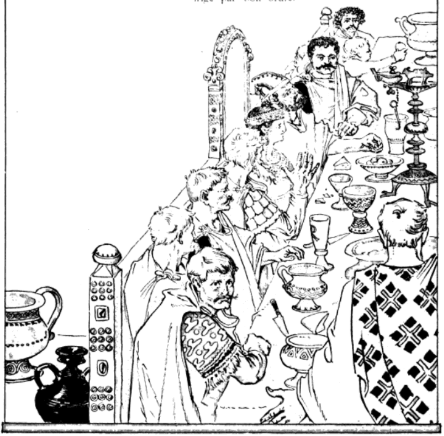
When they had finished their meal, Duke Naimon said to Renaud, "Cousin,
please give us answers."
"Lord," said Renaud, "I will do enough that the king will be content
with us, for I will do what pleases him to have peace with him." Then
Renaud had the king's sword, his crown, the Golden Eagle and the swords
of the Twelve Peers of France brought forth.
When Ogier saw this, he began to laugh, and said, "By my faith! Renaud,
you would have had good loot if you had kept it!"
Richardet, seeing that Renaud wanted to return the Golden Eagle, said to
him, "Brother, I swear on my faith which I owe to God, that what I have
taken by force of arms will not be returned."
"Brother," said Renaud, "leave it to me."
"No," said Richardet, "because the king mistreated me too much with a
stick when I was a prisoner in his tent."
"Lords," said Duke Naimon, "let us speak no more of it. Let us accept
everything that Renaud gives us, because he does enough for us."
"By my faith!" said Archbishop Turpin, "that is good."
They took back the king's crown and all their swords.
When they had them, Ogier said to Renaud, "Cousin, I advise you to come
with us. Maugis will stay here to guard your castle."
"Lords," said Renaud, "I fear that the king will make me die
disgracefully."
"Come in safety," said Duke Naimon, "for we will take you."
"Lords," said Renaud, "on your assurance, I will obey your orders."
Renaud having therefore agreed to go with Charlemagne's messengers, they
all mounted horses, and Renaud had himself armed from head to toe, as
did Alard.
When Lady Claire saw that Renaud was about to leave with the messengers,
she came to meet them and kneeling, she said to them, "Lords, I thank
you for the honor you have done to Maugis. I beg you once again to place
my husband under your protection and not to abandon him."
"Lady," said Ogier, "fear nothing. Renaud will not be harmed."
They crossed the river at the place of Balançon, and Ogier began to say,
"Lords, you know how vindictive the king is. I fear very much for this
poor Renaud whom we have brought. We must know Charlemagne's will before
he sees Renaud."
"Ogier," Duke Naimon said to him, "you are right. We will go with you, I
will speak to the king, and Renaud will wait here for us until we
return."
Renaud said to them, "I will follow your advice, but I beg you not to
fail in what you have promised me."
"Fear nothing," said Duke Naimon.
Ogier and Duke Naimon went to Charlemagne's army. As for Renaud, he
stayed with Archbishop Turpin and Estout.
Pinabel, nephew of Charlemagne, [38] was at the ford of Balançon with a
large company when the aforementioned spoke together. When he heard the
whole agreement, he slipped away from the company and went to the king,
to whom he said, "Sire, I left Renaud and Alard near the ford of
Balançon, with Archbishop Turpin and Estout. But Duke Naimon and Ogier
come to you to ask if they will bring him to you."
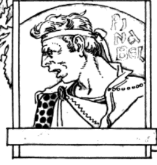
"Is what you tell me true?"
"Yes, Sire."
Charlemagne, instantly, saw Oliver to whom he said, "Go to the ford of
Balançon. You will find Renaud and Alard there. Lead two hundred well-
armed knights, take them whatever happens, bring them to me, and ask me
for whatever you desire."
While Oliver went to Balançon, Duke Naimon and Ogier arrived in front of
Charlemagne's tent, and they entered it immediately. Ogier humbly
greeted the king, but he did not answer him a single word.
When Ogier saw this, he said to him, "I am surprised that you have given
us such a bad reception, since we have just obeyed your orders."
"Ogier," said the king, "where is Renaud? I am sure that you brought him
with you."
"Sire," replied Ogier, "it is true, we brought him on our faith as a
hostage for the truce that you gave him."
"By Saint Denis!" said King Charlemagne, "I will do no such thing, for
if I can get hold of him, he will perish."
"Sire," said Duke Naimon, "for half his kingdom, a king like you should
not say such words."
"Sire," said Ogier, "in the name of God, do not bring blame on yourself.
If you do what you have just said, I assure you that Archbishop Turpin,
Estout, and I will find you unwelcome, and will do everything in our
power to save Renaud, since we have brought him here upon our faith."
"We shall see," said Charlemagne, "how you will help him!"
"Sire," said Ogier, "if you do us outrage or dishonor, we will give back
the faith that we owe you and we will fight against you."
When Oliver arrived at Balançon, he saw Renaud, who was on foot, having
not been able to get on Bayard.
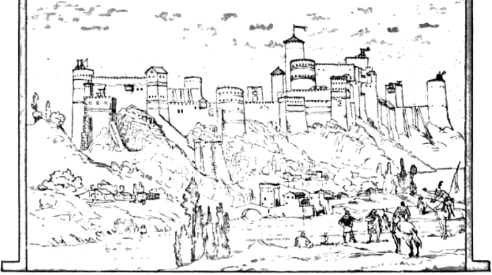
When Renaud saw this, he returned to Archbishop Turpin and to Estout,
and said to them, "Vassals, I believe you have betrayed me. I would
never have thought so, it is a bad thing to do."
"Lord," said Archbishop Turpin, "I swear to you on my faith that we know
nothing of this. I promise you that we will defend you with all our
strength."
Renaud then said to Oliver, "Now you can return the courtesy I gave you
when my cousin Maugis unhorsed you on the plains of Vaucouleurs, for
when you were on foot, I returned your horse to you and helped you to
mount."
"Lord," said Oliver, "it is true. I promise you that I am very sorry to
have found you here, and that I will defend you against everyone."
Meanwhile, Roland arrived, who had come after Oliver to help him take
Renaud and his brother. He began to shout, "Renaud, you are captured!"
Ogier, who had followed him at full speed, said to him, "Certainly,
Roland, on my faith you will do no harm to Renaud, because Duke Naimon
and I have brought him on our faith and oath as a hostage for the truce
that we gave to him, as we were charged by the king to do. I tell you
that if you offend him, you will be a traitor. By my faith, if you
attack him, we will help him!"
Then Oliver said to Roland, "I beg you to leave Renaud, because he has
done me a courtesy and now I want to do the same for him. If you will
listen to me, we will take him to the king, and we will all force
ourselves to pay his judgement."
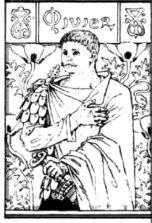
"Lord," said Duke Naimon, "Oliver speaks honestly, because if he makes
us appear as traitors, it would be a great shame to him and to us. If he
offends Renaud, we will not suffer him."
Then Roland and Oliver led Renaud to Charlemagne's pavilion. But Duke
Naimon, Archbishop Turpin, and Estout did not abandon Renaud, and when
Oliver wanted to present him to Charlemagne, Ogier came forward and
said, "Sire, you know that you sent us, the four who are here before
you, to Montauban to tell Renaud what you have charged us with, and he
did everything that we told him on your behalf, so that he would not be
harmed, and you had him captured. We would never have thought of that,
seeing that you will have your crown, our swords, and your Golden Eagle
when you please. You promised him that you would not harm him if we did
this. If you do not keep your promise, you will be blamed, but if you
will work like an honest lord, then take care that we will not be
blamed. Send Renaud to Montauban with what he gave us, so you can do
whatever you want to him."
"Ogier," said Charlemagne, "you speak in vain, and so do your
associates, because I will do nothing but my will and you had sworn I
would not do with Renaud as with Maugis."
When he had said this, he turned to Renaud and said to him, "I have you.
You will not enchant me like Maugis did, because I will make you burn."
"Sire," said Ogier, "do not do this."
"Ogier," said the King, "will you defend my enemy against me?"
"Sire, what do you want me to do? You have called me a traitor, know
that I am not, nor is anyone in my family, and I do not know anyone in
the world who, if he said that I was a traitor, I would not fight
against him."
"By my faith!" said Charlemagne, "I will prove it to you by arms."
"Sire," said Renaud, "speak now as king. I will give you my pledge and
will find someone to serve as my hostage." So he asked Ogier, Duke
Naimon, Archbishop Turpin, and Estout if they were willing to support
him.
"Renaud," said Duke Naimon, "we will gladly endorse you."
Renaud then said, "Sire, here are my sureties, do you accept them?"
"Yes," said the king, "I ask no more."
Renaud then said, "Who will fight against me?"
"It will be me," replied the king.
"My uncle," said Roland, "not you, please. I will do it."
"Sire," said Renaud, "choose whoever you want."
Bayard was returned to Renaud, who went to Montauban, and with him
Ogier, Duke Naimon, Estout, and Alard. All night, Renaud and his company
made good cheer at Montauban, and were honorably received by Lady
Claire.
The next day, they heard Mass and Renaud armed himself, said goodbye to
Lady Claire, his wife, and said to his brothers, "I leave the castle in
your custody and commend my wife and my children to you, because I am
going to fight the best knight in the world. I do not know what will
happen. If I die, you will need this castle. Here are my sureties who
will come with me."
"By my faith!" said Alard, "we will go with you, and we will see the
combat, and that your rights are preserved, for if you need help, we
will give it to you."
Renaud told Maugis that he should stay at the castle, and that he
commended everything to him. They then set out and arrived at the foot
of Montfaucon, a place intended for combat.
CHAPTER 23 - How Renaud fought against Roland, and how Maugis carried the sleeping king to Montauban on Bayard.
When Roland saw the daylight, he got up and went to hear Mass. Then he
armed himself and mounted his horse.
Then Charlemagne said to him, "My nephew, I commend you to God, that he
has you in his custody, and wants to keep you from death and from
prison, because you know that Renaud is right, and we are wrong. So I
would not want, for half of my kingdom, for any harm to come to you."
"Sire," said Roland, "your repentance is too late. Since you knew you
were wrong, you should not have accepted the battle, but since the
matter is so far along, I cannot leave it without it being to my great
dishonor. Now may God have me in his good and holy custody through his
divine mercy!"
Roland found Renaud waiting for him, to whom he shouted, "Renaud, you
must deal with me today!"
Renaud said to him, "Roland, it is not proper for a knight like you to
threaten. Do you want peace or battle?"
"You will have it, Renaud," he said. "I did not come here for peace.
Beware of me, you will be better off for it."
"Also guard yourself from me," said Renaud, "because today I will lower
your pride."
Then they spurred their horses and gave each other such great blows that
they broke their lances, and collided so roughly on their shields that
Renaud had to fall to the ground, his saddle between his two thighs.
Renaud abandoned the stirrups. He got up quickly and mounted Bayard
without a saddle. He rode against Roland, and gave him such a great blow
with his sword that Roland felt very injured, and he put his sword in
his hand and rode against Renaud. The fight began terrible between them,
because they tore their hauberks into more than a thousand pieces, so
much so that the barons who watched them had great pity on them.
When Duke Naimon had watched the combat for a long time, he exclaimed,
"Ah! Charlemagne, cursed be your cruelty, because by your hatred you
cause the death of the two best knights in the world, and you will pay
for it one day."
Renaud, seeing that none could win, said to Roland, "If you listen to
me, we will fight on foot so as not to kill our horses, because we could
never find any as good."
"You are right," said Roland.
After they dismounted, they ran against each other like two lions.
Roland, seeing that he could not defeat Renaud, ran against him and
grabbed him, and Renaud asked him to fight. They turned each other
around for a long time and neither one could make the other fall. Seeing
that neither of them could overturn the other, they let go of each other
and leaned back to breathe. They were already very tired. Their shields,
hauberks, and helmets were all broken. Where they had fought, the earth
was also trodden as if wheat had been threshed.
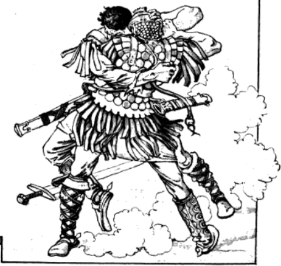
Charlemagne, seeing that one could not win over the other, and that both
were in very bad shape, was afraid for Roland. He knelt down, raised his
hands to heaven, and said, weeping, "Great God, who created the world,
the sea, the sky, and the earth, who delivered the great Saint Margaret
from the teeth of the horrible dragon, and Jonah from the belly of the
whale, I beg you to deliver my nephew Roland, and to put an end to the
battle. Deign to inspire me how to act for one and the other."
The brothers of Renaud, seeing how tired he was, were very afraid for
his person. They began to pray to Our Lord to preserve their brother
from death and prison. Our Lord, at the king's prayer, caused a
beautiful miracle to be seen, for he caused such a large cloud to appear
that one could not see the other.
Roland then said to Renaud, "Where did you go? Certainly either it is
night, or I cannot see anything."
"Surely," said Renaud, "I cannot either."
"Renaud," said Roland, "please do me a courtesy, another time I will do
the same for you if you ask me."
Then Renaud answered him, "I want it, my honor is saved."
"Many thanks," said Roland, "for your good will, know that the thing I
require of you is that you take me to Montauban."
"Roland," said Renaud, "if you will do it, I will be happy."
"I will go, on my faith!" said Roland.
"Lord," said Renaud, "may God reward you for the honor you give me, for
I have not done a disservice to you!"
Roland, after saying this, regained his sight and saw as clearly as
before. He saw Mellenaie, his horse, and mounted it. Similarly, Renaud
mounted Bayard.
The king, seeing this, was very surprised, and began to shout, "Lords,
look! I do not know what all this means, because Renaud is taking
Roland. We will see if you will let him take him."
When the barons of France heard the king speak like this, they all rode
after Renaud. Charlemagne followed them to the gates of Montauban, and
loudly cried out, "Renaud, what you have done will be worth nothing to
you. As long as I live, you will not have peace."
He returned from Montauban to his army. His people, seeing him coming,
went to meet him, and said to him, "Sire, what have you done with
Roland?"
"Lords," said the king, "he went to Montauban. I order you all to
immediately and without delay, transport my seat very close to
Montauban. Oliver will carry the Oriflamme, and Richard of Normandy will
lead our army."
He had barely made this order when everyone, without contradicting him,
set about taking down the tents to set up camp in front of Montauban.
The whole army decamped. Richard of Normandy came to the ford of
Balançon with ten thousand combatants to guard the passage until the
army had crossed. Meanwhile, the king had gone ahead to find out where
he would place the siege. When the army arrived in front of Montauban,
the king immediately had his tent pitched in front of the gate.
When the army was encamped, the one who kept watch on the tower came to
Maugis, and said to him, "Know that the king has arrived with his army
and has encamped in front of the great gate."
"Do not worry," said Maugis, "If he is looking for his downfall, he will
find it sooner than he thinks."
He told Renaud how the king had come to camp his army near Montauban.
He said to Maugis, "Cousin, please keep a good watch tonight, because we
are exposed."
After everyone had gone to bed, Maugis went to the stable, untied
Bayard, mounted on top, left Montauban, and went to the king's tent. He
charmed the king, along with all those in the army. He went to the king,
grabbed him, put him on Bayard, and then took him to Montauban and laid
him down in his bed.
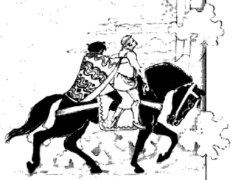
He lit a torch which he placed in the middle of Renaud's room, and said
to him, "Cousin, what would you give to someone who placed the king in
your hands?"
"By my faith!" he replied, "There is nothing I would not give if they
brought him here to me."
"Cousin," said Maugis, "promise me that he will not suffer any harm, and
then I will show him to you."
"I swear to you."
Then Maugis led him into his room, and he saw the king sleeping. Maugis
told Renaud to keep him safe. He left Renaud, took a satchel and a
pilgrim's staff and left Montauban.
CHAPTER 24 - How Maugis, to save his soul, went to a hermitage where he lived in poverty for a very long time.
When Maugis had given Charlemagne to his cousin Renaud as a prisoner, he
left Montauban, without telling anyone in the Castle, except the
gatekeeper. Maugis walked until he reached Dordogne, and crossed the
river. When he had completely passed, he entered a thick wood and walked
until the ninth hour of the day. Then he looked far away and saw a very
old hermitage. He went to this place, and found it very pleasant,
because there was a beautiful fountain in front of the door. Maugis
entered the chapel and knelt down. He addressed his humble prayer to Our
Lord, begging him to forgive his sins. As he was fervent in his prayers,
he made a vow to spend the rest of his days in this place, to serve God
there. He resolved to live only on roots. Then he prayed to God that it
would please him that Renaud and his brothers could have peace with
Charlemagne, and that he would die happy if he learned this. He resolved
to do penance for the evils he had done in the past, to avenge the death
of Duke Beuves, his father, one of the valiant knights, because he had
been killed by the treachery of Ganelon.
CHAPTER 25 - How Charlemagne, greatly vexed by the trick of Maugis, who had put him into a deep sleep, could not forget this insult, to the point that, being released by Renaud, he soon reduced the Castle of Montauban to famine.
Then Renaud called his brothers, and said to them, "Tell me what we will
do with the king that we hold in our hands? You know that he has caused
us damaged for a long time and done many evils, so it seems to me that
we must take revenge on him, since we have him."
"Lord," said Richardet, "I do not know what you will do, but if you
listen to me, he will soon be hanged, because after his death there will
be no one in France who dares to attack us."
Renaud lowered his head and began to meditate seriously within himself.
Richardet asked him, "What are you thinking? Do you know who will do it?
I will do it now, if you give him to me."
Renaud raised his head and said, "My brothers, you know that the king is
our sovereign lord, and besides you see how Roland, Duke Naimon, Ogier,
Archbishop Turpin, and Estout are here to pay our judgement. They know
well that we have the right, and consequently, if we kill him rightly or
wrongly, everyone will blame us, and as long as we live, we will have
war."
Alard then said to him, "Brother, you speak with caution, but if we
cannot have peace with him, it seems to me that we must ask him for it,
once and for all. If he gives it, praise be to God, and if he refuses,
let us keep him without killing him, so that he cannot do us harm."
"Lords," said Richardet, "we have a good leader in our brother Renaud.
Let us leave him, and do what he says."
They left the king sleeping, and went to Roland's room.
Renaud said, "Roland, get up, please. Send for Ogier, Archbishop Turpin,
and all the others who are here, for I will tell you one thing."
Roland, seeing Renaud coming at this hour, was very surprised.
Nevertheless, he sent for all his people.
When they arrived, Renaud said to them, "Lords, you are my friends. You
must know that I have here a prisoner by whom I can have peace, and also
all my inheritance."
"Renaud," said Roland, "please tell me who he is, and how you brought
him here?"
"It is Charlemagne, our King."
"Did you take him by force of arms?"
"No, certainly," said Renaud.
"Please tell me how it happened last night?"
"Know," said Renaud, "that I do not know how Maugis worked, because he
brought him here, and laid him in a bed in his room, where he fell
asleep."
"Lords," said Duke Naimon, "how can it be that Maugis captured the king?
You know that he is guarded night and day. Everything is done by God,
out of friendship for Renaud, because from now on the war will be over,
for which I thank Our Lord, because many knights are dead."
Roland and the other knights then went to the room where the king was
sleeping so soundly that they could not wake him.
When the barons saw the king sleeping, they were very surprised, and
Roland spoke first, and said, "Renaud, where is Maugis who has performed
so well? I beg you to bring him so that he may awaken him, and being
awake, we will all go to his feet to shout thanks to him, and I beg you
to insult him no more with words."
"By my faith!" said Renaud, "I would rather die enraged than insult the
king, but I will offer him my brothers and myself to obey his orders. I
will pray to him that it pleases him to grant us peace. I am going to
get Maugis to come with me." He looked for him for a long time and could
not find him, which made him very angry.
When the gatekeeper learned that he was looking for Maugis, he said to
him, "Lord, know that he left last night dressed in poor rags. He asked
me to open the gate for him and left. I have not seen him since."
Renaud then knew well that Maugis had left because he no longer wanted
to suffer the wrath of the king. He began to cry, then he returned to
the barons and told them how Maugis had left.
Richardet said to them, "Ah! cousin, what will we do from now on, since
we have lost you? We can say that we are defeated, because you were our
hope. It is not long ago that I would have died shamefully if it had not
been for you. If you have endured sorrows and incurred the king's
disgrace, it is only out of friendship for us."
Then he gnashed his teeth in anger, put his hand to his sword, and
wanted to kill the king. But Roland stopped him, and Ogier and Naimon
told him, "Richardet, it would be a very bad act to kill a sleeping man.
On the other hand, if it pleases God, before we leave here we will make
peace."
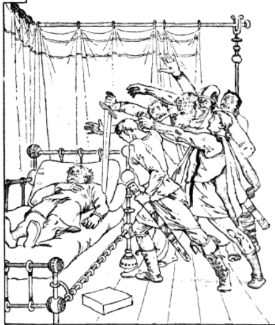
Naimon said, "Lords, we are very wrong to grieve, for all our sadness
can bring us no benefit. I beg that you therefore try to calm down, and
that we begin to speak of the peace which must be made with Charlemagne,
so that we may put an end to this war which has lasted so long. But I
wonder how we can speak to him without Maugis, because we cannot awaken
him and, if God does not remedy this, we will not be able to speak to
him."
As the barons spoke together, the enchantment passed, but they did not
notice that the king was awake. He stood up straight and began to look
around him, and was surprised when he realized that he was at the Castle
of Montauban in the hands of Renaud. He was very angry, and became so
furious that everyone who was there thought he had gone mad. When he was
fully awake, he knew well what Maugis had done, and swore that as long
as he lived there would be peace as long as he was in Montauban, until
Maugis had been given to him so that he could do what he wanted with
him.
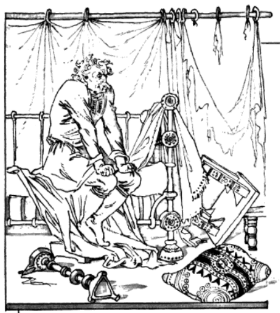
Richardet said to him, "What the hell! Sir king, why do you think you
can speak like this? You know you are our prisoner, and yet you still
threaten us! If it were not for the fact that I promised that I would
not hurt you, I would cut off your head."
Renaud said, "Let the king say his will. Let us ask him for mercy, and
pray that his wrath is appeased, for the war has lasted too long."
Renaud, by his wisdom, thus pacified his brothers. Then he said to them,
"Please come with me to ask for peace from our lord Charlemagne."
"Renaud," said Alard, "we will do what you please."
Naimon said, "He is prudent, and we will succeed in everything by acting
in this way."
Renaud and his brothers, Roland, Oliver, Ogier, Duke Naimon, Archbishop
Turpin, and everyone else submitted in the same way.
Renaud said to Charlemagne, "Great monarch, have pity on us, in the name
of God, for my brothers and I are willing to serve you in exchange for
our lives, and then we will obey whatever orders you please to give us.
Please make peace with us, and if you do not forgive me, then I beg you
in your grace to forgive my brothers, to give them back their
inheritances, and I will give Montauban and Bayard to you."
Charlemagne said, "If everyone asked me to do this, I would not do it,
unless I have Maugis, to put him to death."
"Alas," said Renaud, "I would rather let myself be hanged than consent
to the death of my cousin Maugis. He has never done us a disservice, on
the contrary. Rather, he deserves to be our master."
"Renaud," said the king, "do not think that I would do anything against
my will, even though I am your prisoner."
"Sire, I want to humble myself before you. I would rather you be at
fault than us. Tell me, please, how could I return Maugis to you? He is
our life, our help, and our hope everywhere. So, Sire, I tell you that
if you had my brothers in your prisons and you wanted to have them
hanged, even if I held Maugis prisoner and he was in my power, I still
would not give him to you to redeem my brothers, and I swear I do not
know where he went."
"Ah!" said the king, "God curse him, because I am sure he is here."
Renaud said to him, "No, by my faith, he is not!"
Then Renaud turned to Roland and the other barons, and said to them,
"Lords, for the love of God, ask the king to have mercy on my brothers
and me, so that we can return to France."
Duke Naimon, who was then on his knees, having heard what Renaud had
said, said to the king, "Sire, it seems to me that you could accept the
offer that Renaud makes to you, before there is further harm, because
all those of your court would be very happy about it."
Charlemagne swore by Saint Denis that he would do nothing until he had
Maugis to do with as he wished.
When Renaud heard these words, he immediately got up indignantly. His
brothers and the barons also rose. Then he spoke to Roland, and said to
him, "Sir Roland, and all you barons of France, I want the king to be
informed of my will, and I will tell him before you. Know, since I
cannot find favor with him, I beg you not to blame me from now on if I
ask for my right, for I asked for it in every way, as a loyal knight
should do."
He turned towards the king, and said to him, "Sire, you can leave
whenever you wish, for I promise not to do you any harm, because you are
my sovereign lord. When it pleases God, we will have peace with you."
All the barons of France were surprised at Renaud's great honesty.
Duke Naimon then said, "God! Have you heard the great humility of our
knight, Renaud?"
Richardet said to him, "Brother, what do you want to do? Although we
hold this wicked king under our power, and his life is in our hands, he
has such great pride that he will not do anything that we advise him. He
threatens us even more. And you want to let him go! We will suffer
because if he held us as we hold him, all the gold in the world would
not be enough to prevent him from making us perish shamefully. I tell
you that you are doing great folly to let him go. If you wanted, you
could now have peace. It seems that you seek only our death!"
When he heard his brother speak, he said to him, irritated, "Be quiet,
evil young man, may God punish you! He will be let go in spite of you,
and the peace you desire will only be made when it pleases God."
He then called one of his gentlemen, and said to him, "Leave immediately
and have my good horse Bayard brought to me, for I want my sovereign
lord to ride him all the way back to his army."
Richardet, having heard this, went away very irritated. However, the
gentleman brought Bayard, and Renaud presented him to Charlemagne, and
said to him, "Sire, leave whenever you please."
He mounted Bayard and left Montauban to return to his people. Renaud led
him to the city gate.

When the French saw him return, they were all very happy. They asked him
how he had fared, and if he had granted peace.
"Lords, quite well, thank God! But I did not want to make peace, and as
long as I live it will not be made."
"Sire," asked one of his barons, "how was Bayard delivered to you?"
"By my faith! Renaud freely gave him to me, despite his other brothers."
"Sire," said the barons, "have you seen Roland, Oliver, Duke Naimon,
Ogier, Archbishop Turpin, and Estout?"
"Yes, surely. But they have all abandoned me out of friendship for
Renaud, and if I can capture them, I will show them that they have done
wrong."
He had Bayard sent back to Renaud, who, seeing him brought back, said to
Roland and those who accompanied him, "Lords, I see that you are in the
king's bad graces out of friendship for me. So, lords, I discharge you
of all the quarrels that I could have with you. You can leave whenever
you please."
Then the barons returned to the king's army, and said to him, "Sire, we
come to ask you for mercy, begging you to appease your anger against us.
Since peace is not pleasing to you, we have abandoned Renaud and his
brothers, and we will never help them, as long as we live."
"Lords," said the king, "I forgive you and beg you for one thing, that
you attack Montauban, both day and night, because I am assured that they
have hardly any provisions. The passage is closed so tightly that no one
can enter or leave to provide them with provisions, and they will soon
be starving. And, what is worse, they have lost the traitor Maugis, who
alone gave them all their hope. So I am determined never to lift the
siege until I have them at my will."
Then Duke Naimon stood up and said to him, "Sire, you say that those of
Montauban no longer have food, and that you will not lift the siege
until you have starved them. I assure you that you will be there for a
long time. Sire, I beg you to listen to my advice, if it is good. First,
pay attention to the courtesy that Renaud gave you, because, if it had
not been for him, no one in the world would have been able to prevent
Richardet, his brother, from cutting off your head. Moreover, think of
the great humility which he always had, to the confidence he had in you,
when he gave you his horse which has no equal in the world. If you think
carefully about everything, you will see that no man ever showed you as
much courtesy as he did. Besides, they are all, as we know, valiant
knights. I swear to you, Sire, on all the saints, that before you take
Montauban, its people will do you so much harm that you will remember
it. Furthermore, you must consider that we are ravaging the fields, and
that you are spending your money. It would be better for you to use it
to wage war against the Saracens than to use it against the four sons of
Aymon, for the Saracens are now at rest and in great joy on the occasion
of this war, for if the war fails, we will have to support it, and it is
so cruel and so terrible that many noble and valiant knights died
there."

Charlemagne was very surprised when he heard Duke Naimon speak to him
like this. All his blood quivered in his veins, and he turned pale, he
was so transported with anger. He began to look askance at Naimon, and
said to him out of spite, "Duke Naimon, by the faith that I owe to my
God, if there is anyone bold enough to ever speak to me about making
peace with the Aymon brothers, I will end my friendship with him,
because I am resolved to do no such thing, no matter what anyone says to
me about it. I will capture them, whatever it costs me, or I will never
leave here."
When the barons heard him speak so proudly, they were very surprised,
and said nothing more.
When Ogier saw that the barons no longer dared to speak of this affair,
he said to the king, "Cursed be the moment when Renaud prevented your
head from being cut off, because you would no longer threaten them!"
The king, having heard what Ogier said to him, bowed his head, and then
said, "Barons, I expressly order that everyone put themselves in arms,
because I want, from this hour, a siege of Montauban."
His orders were immediately carried out. When they were ready, they came
in good order, with ladders and hammers, to knock down the walls. They
presented themselves before the king to fulfill his orders. When he saw
them so well prepared, he ordered them to attack Montauban.
Renaud, seeing the enemies, called his brother Alard and said to him,
"Brother, I beg you to take my horn and blow it loudly so that our
people arm themselves, for here are the French who are coming to attack
us."
Alard sounded the horn. When those of the castle heard it, they were
very surprised, and without waiting long, they armed themselves and put
themselves in defense on the walls. The French arrived and threw
themselves into the moat. Then they set up their ladders against the
walls, but those within defended themselves valiantly, and destroyed
many of the French, for Renaud and his brothers defended themselves so
well that their blows could not be sustained. Those from Montauban put
up such resistance that they made those who were on the ladders fall.
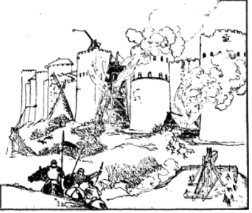
When the king saw this, he knew well that he could not take Montauban by
force. He sounded the retreat. The French were not angry, and the king
lost many knights, whose loss he regretted long after. When the French
were withdrawn, the king swore that he would never leave Montauban until
he had starved them. Then he ordered that two hundred knights be placed
at each door to prevent people from leaving.
Renaud, seeing this, knelt down, and raising both hands towards heaven,
he said, "O my God, who suffered death and Passion on the cross, I beg
you to allow us to have peace with the king."
When Richardet heard his brother's prayer, he said to him, "If you had
listened to me, we would now be at peace, and Charlemagne would have
been very happy to grant it to save his life. You know that our cousin
had made him prisoner here with the intention of obtaining peace with
him, but you would not listen, and I promise you he will not do us any
good."
Charlemagne kept Montauban besieged for so long that the inhabitants
almost ran out of food. Anyone who had a little bread was forced to hide
it, because it could not be bought with gold or silver. It was so bad
that people were starving in the streets, and they hid food from each
other, the father from the child, and the son from the mother. Renaud
was forced to have a mass grave built to bury the dead.
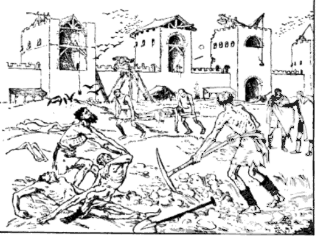
Richardet, seeing his brother Renaud in great sorrow, said to him,
"Brother, things are going very badly. It would have been better to kill
the king, and then we would not be in such great poverty."
Then he began to cry, saying, "Alas! I should pity myself rather than
pity others, since we all must perish in the end. My dear cousin Maugis,
what has become of you? We miss you when needed and if you were here we
would not fear the king or death. I know you would still find enough
food to feed us. Alas! We must die of hunger, because the king hates us
more than the pagans and the Saracens. We must not expect him to have
pity on us, because he is the cruelest of kings."
Charlemagne was informed by one of his people that the famine was very
great in Montauban. He was very satisfied with this, and assembled all
the barons, and said to them, "Lords, the people of Montauban will
surrender despite their bravery, because most of them have already died
of hunger. I want Renaud to be hanged, and his brothers too, but first I
want his brother Richardet to be dragged behind a roussin, and I forbid
anyone to go against my will, and to represent anything to me."
When Duke Naimon, Roland, Oliver, Archbishop Turpin, and Estout heard
the king speak in this way, they were very displeased because of their
friendship for Renaud and his brothers. They bowed their heads without
saying a single word, for fear of incurring his disgrace.
During the time that Charlemagne was laying siege to Montauban,
persecuting the four sons of Aymon, their father was in the king's
party, waging war against his children. He was angry, because he knew
well that if his children died he would never have joy. Although he made
war against them, he loved them no less tenderly, because good blood
cannot be denied. So he could not help saying to the king, "Sire, I beg
you to act righteously with my children, for I will always love them.
They are my dear children."
"I do not want to hear anything," said the king, "because Renaud killed
my nephew whom I loved."
He then saw that the barons were talking to each other. He said to them,
"Lords, you can murmur, but I swear to you, on my faith, that I will not
leave them for any man of the world, and will do as I please. I order
that each of you make siege engines to bring down this tower as well as
the rest. By this means we will surprise them. My dear Roland, you will
make seven, Oliver will make six, Duke Naimon will make four, Archbishop
Turpin and Ogier four more, and you, Duke Aymon, will make three."
"Great God!" replied Duke Aymon, "how can I do that? Sire, you know that
these are my children and not rascals. They are valiant knights, and I
promise you that if I saw them perish, I would also die of pain."
When the king heard Duke Aymon speak thus, he was very angry, and began
to gnaw a stick which he held in his hand. Then he said, "If there is
anyone who does not do my will, I will cut off his head with my sword."
"Sire," said Duke Naimon, "do not be angry, for what you have ordered
will be done from now on."
Then the barons went to make siege engines, as the king had ordered
them. They were quickly worked. They were engines for throwing large
numbers of stones. They were raised against the castle and they damaged
it considerably. There was a general cry throughout the castle, and
everyone went to hide where they could. The people of Montauban suffered
this confusion until they had no more food.
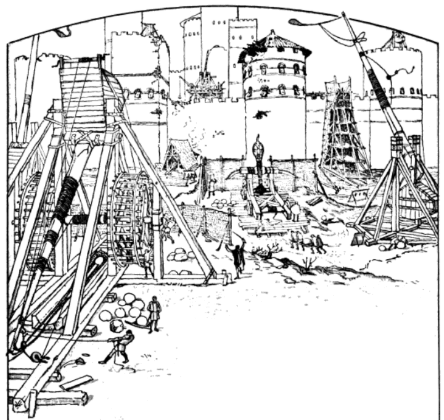
Renaud, seeing such extremity, said, "O my God! What could I do? I can
see that we can no longer resist, because I do not know where to get
provisions. Ah! Great God! Where is Maugis? Why does he not know my
state of affairs!"
Lady Claire, hearing Renaud, said to him, "My dear love, you are wrong
to be alarmed, it will discourage us all, and what is more, there are
still more than a hundred horses here. I beg you to have one killed, and
we will eat it."
Then she fell fainting at Renaud's feet, in great weakness. Renaud
picked her up and held her in his arms. When she had recovered, she said
weeping, "Alas! Virgin Mary, my heart fails me, I feel so much need. My
dear children, I never thought that you would have died of hunger!"
Renaud had a horse killed which he had prepared to give to his people.
All the horses that were in Montauban were eaten one after the other
except four, Bayard and the horses of his three brothers.
When there was nothing left to eat, Renaud said to his brothers, "What
shall we do? There is nothing left to eat but our four horses. Let us
have one killed so that our people can eat."
Richardet said, "It will not be mine, and if you want to eat, kill your
own horse, because you will not have mine, and if you need it, you
deserve it because of your pride. We are in this state because you let
Charlemagne go, and if you had listened to me, we would not be in this
misery."
Aymonet then came, and said to Richardet in this manner, "Uncle, despite
what we cannot do, we must still do the best we can. You must never
repeat the past but do what my father commands you. If he failed to live
up to his expectations, he will surely pay dearly."
Richardet, hearing his nephew speak so wisely, took pity on him, and
said to Renaud, "Have my horse killed whenever you please. Give some to
your wife and my little nephews to eat, because my nephew Aymonet here
deserves to eat for the good advice he gave me."
"Brother," said Alard, "kill whoever you want, except Bayard, for this
one will not die, and that would be a great pity. I swear to you that I
would rather die than see Bayard destroyed."
"Brother," said Richardet, "you are right." So they had Richardet's
horse killed and eaten.
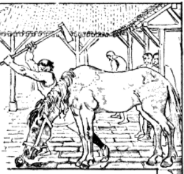
Renaud, seeing that there was nothing left to eat, was more angry for
his brothers and his wife than for himself. Then he said, "I am
helplessly lost. It would have been better to listen to my brother, and
I would not be in the misery I am in. I see clearly that Charlemagne has
contrived so much that he has caught me in his nets, and I cannot
escape. I know that I cannot blame anyone, because it was I who provided
weapons against myself. My repentance is too late."
But Richardet said to his brother, "What shall we do? We must surrender,
since we no longer know what to do."
Renaud said to him, "Brother, will we surrender to the wickedest king in
the world? Let us rather eat not only my horse Bayard, but eat my own
children, to resist longer, while waiting for some help or means of
respite, for I have heard that a day's respite is worth much."
"Brother," said Alard, "I am of the opinion that we eat Bayard first,
who has so many times kept us from death."
Renaud says, "Brother, do you want to eat Bayard, who is the best horse
in the world? I beg you, before putting him to death, to take my own
life, for I could not see such a sad spectacle. When you have killed me,
you can kill Bayard, and if you do not do it, I will defend you as much
as you love me. Do not touch him, for whoever does harm to him will do
it to me."
When the duchess heard him speak in this way, she did not know what to
do, and said with regret, "Ah! Kind, good-natured duke, what will our
poor children do! Do you want them to starve because of your horse? It
has been three days since they ate anything. They will have to die and
so will I, for my heart falls from weakness. You will see me die if you
do not help me."
When the children heard their mother speaking thus, they said to Renaud,
"Father, by God, give us your horse! He might as well die of hunger. It
is better that he die than us."
When the brothers heard their nephews speaking thus, Richardet said to
Renaud, "Gentle duke, for God's sake, do not allow your children, your
dear wife, to perish by famine, and us too!"
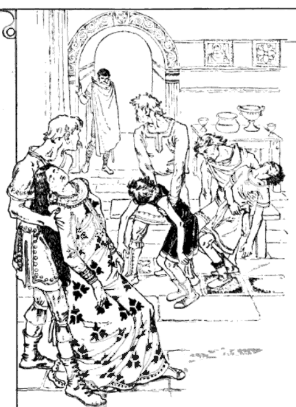
When Renaud heard his brother speak like this, his heart was softened,
and he said, crying, "My brothers, since you want Bayard to die, I beg
you to kill him."
When they all agreed to kill Bayard, they came to the stable and found
him, who sighed heavily. When Renaud saw this, he said that he would
kill himself before Bayard perished, because he had saved his life
several times. The children of Renaud, hearing this, returned to their
mother crying from the great hunger they were suffering. When Renaud saw
that his children had gone, he came to Bayard and gave him a little hay,
because he had nothing else to give him, and he went to his brothers,
and found Alard holding Aymonet, his nephew, who was crying. Richardet
held Yonnet and Guichard held the Duchess, who was swooning.
He said to them, "Ah! Thank God, I beg you to take courage until night,
then I promise you that we will have something to eat."
"Brother," said Alard, "we must suffer in spite of ourselves."
The knights waited patiently, and when night had come, Renaud said,
"Brothers, I will speak to our father to see what he will say to me and
whether he will let us starve."
"Brother," said Richardet, "I want to go with you, please, and you will
be safer from him."
"My brother," said Renaud, "do not come there. I want to go there alone,
and if I do not bring you something to eat, I will deliver Bayard to
you."
He left Montauban secretly and went to his father's tent. He knew it
from having seen it during the day from the top of the great tower. It
happened that he found Duke Aymon alone outside his tent, waiting to
find out if he would have news from the Castle of Montauban.
When Renaud saw his father, he asked him, "Where are you going, and who
are you?"
Aymon, hearing Renaud speak, recognized him, and was well satisfied, but
he did not make him reveal himself, and said to him, "You yourself, who
are you who walks at this late hour?"
Renaud, hearing his father speak thus, soon recognized him, and said,
"Lord, for God's sake, have pity on us, for we are dying of hunger, and
all my people are dead. We only have Bayard left, who will not die as
long as I live, because he often saved my life and the lives of my
brothers. If you will not take pity on us, take pity on my children."
"My son," said Aymon, "I cannot help you. Go away, for I have left you.
I cannot be disloyal for any thing in the world, and for this reason I
cannot help you. I am angry about it."
"My father," said Renaud, "you are wrong. Do not be displeased, for if
you do not help us, know that in three days my wife, my children, my
brothers, and I will die of hunger, because it has already been three
days since any of us has eaten anything, and we do not know what to do.
You are our father, so you must relieve us. I know very well that if the
king takes us, he will hang us, and that would not be an honor for you.
You must not leave us, it is the natural law. In the name of God, my
father, have pity on us, and no longer be angry with your children, that
would be too cruel. You also know that Charlemagne is very wrong to
persecute us like this."
Aymon took pity on Renaud's grief. Then he looked at him, weeping, and
said to him, "My son, you are very right, for the king wishes you great
harm. Because of this, dismount and enter into my tent, and take
whatever you please, for nothing will be hidden from you. Yet I will not
break my oath by giving you anything."
Renaud dismounted and knelt humbly before his father, thanking him. He
then entered the tent, and loaded Bayard with bread and fresh meat.
Bayard carried more than two other horses would have carried.
When night came, Aymon, who could not forget his children, said to his
chief servant, "You know that I have abandoned my children, and that I
have great regret, because they are in great poverty, and, although I
have abandoned them, I would not want them to be lacking. We already
have three siege engines that Charlemagne had me make to tear down their
walls, and we have already damaged them badly. Now, we must help them
and I will tell you how. You will have to put bread, salted meat, and
fresh meat in the siege engines instead of stones. We will throw them
into the castle. If I have to die of hunger, I will not regret it, as
long as I repent of the harm I did them, because everyone should have
blamed me."
"Lord," said the chief servant, "you are quite right. You have done so
much that everyone greatly blames you."
Then he filled the siege engines with food, and ordered the chief
servant to throw them into Montauban. Many blamed the old man Aymon for
what he catapulted against his children, because they believed they were
stones.
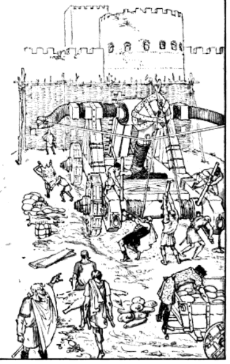
The next day Renaud found plenty of food that his father had thrown at
them, with which he was happy, and said, "Great God! I give you thanks.
I see clearly that whoever places his hope in you, nothing bad can
happen to him."
He called his brothers and his wife and said to them, "My brothers, you
see that our father had pity on us."
Charlemagne learned that the old man Aymon had given food to his
children. He immediately said to him, "Aymon, why were you so bold to
provide food for my enemies? I hate them! And I know very well how
things are. You cannot apologize honestly. But I swear to you that I
will take revenge before night comes, because you will lose your head."
"Sire," said Aymon, "I will not deny it, but I tell you that if you were
to put me to death and throw me into the fire, that I would relieve my
children as long as I could. Sire, my children are neither thieves, nor
traitors, nor murderers, but they are the best and most valiant knights
in the world, and you want to destroy them this way! This war has lasted
too long. What you have done should be enough for you."
When he heard Aymon speak, he was angry, and almost hit him.
Duke Naimon said to him, "Sire, send Aymon away, because you have held
him too tightly. You know well that he will not allow his children to be
destroyed. You should not even blame him."
Charlemagne said to him, "Since you have judged, you will not be
repudiated." He turned to Duke Aymon, and told him to leave his army,
and that he had done him more damage than profit.
"I will go willingly," replied Aymon.
Then he had his horse saddled, mounted on it, and said to the Twelve
Peers of France, "Lords, I commend my dear children to you."
"Lords," then said the King, "I order you to dismantle all your siege
engines, because, through them, I lost the Castle of Montauban."
And so Renaud remained in good peace for a long time.
Some time later, food began to run out. Renaud then said, "Great God!
What will I do? I can see that in the long run we will no longer be able
to hold out. Charlemagne will not pity us. Ah! Maugis, why are you not
here to prevent us from suffering so much pain!"
As Renaud was complaining to himself, he saw Alard coming who was so
weak that he could barely support himself. He said to Renaud, "Lord, we
must kill Bayard, because we can no longer resist the need."
Renaud went to Bayard to kill him. When Bayard saw him, he began to show
joy.
Renaud said, "Ah! Poor Bayard, if I had the heart to hurt you, I would
be too cruel!"
When Yonnet, one of his children, heard this, he said to his father,
"Lord, when will you kill Bayard? I am raging with hunger, and if I do
not have something to eat, you will soon see me, my brother, and my
mother all die, because we cannot endure any longer."
Renaud, hearing his son speak, felt great pity for him, and on the other
hand he did not dare kill Bayard who he was stroking gently. He imagined
a way to avoid putting Bayard to death. He then asked for a basin,
punctured Bayard in the side, and a lot of blood poured out. When he had
bled enough, Renaud bandaged the wound, and Alard took the blood and
cooked it. When it was well cooked, they all ate a little, which
sustained them. Renaud and all his company sustained themselves for four
days without eating anything else. On the fifth day, they wanted to do
it again, but he was so weak that he did not shed any blood.
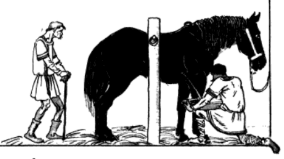
The duchess began to cry and said, "Lord, since your horse is no longer
bleeding, kill it, and your children, your brothers, and you and I will
eat it. Othwerwise, we will die of hunger."
"I cannot do it," said Renaud, "because he has often saved our lives."
CHAPTER 26 - How Renaud and his people, starved by the siege, left Montauban and went to Dordogne, where Charlemagne went to besiege them again.
Some time later, there was a very ancient man who said to Renaud, "Lord,
I see that we will all die of hunger if God does not have pity on us. I
will show you a way by which you can get out of here in complete safety,
without Charlemagne's knowledge. You should know that this place was
once closed off. [39] The Lord has made a path there which goes to the
Forest of the Serpent. You must open it at the place where I will show
you, and you will find the path."
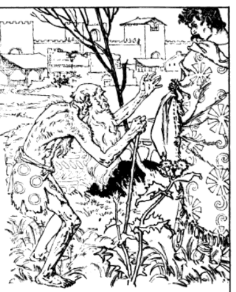
Renaud was very happy and said, "I have found what I desire, for I will
go to Dordogne, where I will be safe."
He had Bayard saddled, and he, his wife, his children, and all his
people took the road to the cave. Renaud had a large number of torches
lit to see more clearly. He ordered a few people to form his vanguard,
and had the rest of his people form the rear guard. When Renaud had
arranged his affairs well, he set out towards the cave, which was vast
and copious.
When they had walked for a long time, he stopped and said to his
brothers, "We have done very badly, for we have left King Yon in prison.
Certainly, I would rather die than let him die like this, because he
would perish of hunger like a rabid wolf. It would be a great sin for
us."
"By God," said Richardet, "you protect him, and you should not pity a
man as treacherous as him."
Renaud returned to take him out of prison, and brought him with him.
Arriving at the end of the cavern, they found themselves in the Forest
of the Serpent at daybreak. They were very happy that they had escaped
from Charlemagne. Renaud then looked around him, and saw clearly where
he was.
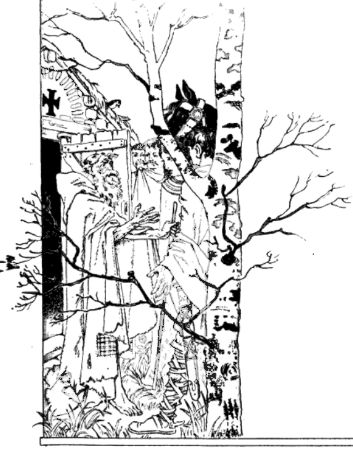
He called his brothers and said to them, "It seems to me that we are
here near the hermitage of my good friend Bernard."
"Brother," said Alard, "you speak the truth, but what shall we do?"
Renaud said, "I think it would be best if we went there, and we would
have to stay there until night came. Then we will go to Dordogne,
because I do not care to go there during the day, and besides it may
happen that the hermit will have something to eat, and then we will give
it to my wife and my children."
They found the hermitage but, as they entered the woods, they all spread
out and ate grass like wild beasts because they were so hungry.
Renaud said, "Lords, you could cause us harm by separating like this. I
ask everyone to regroup, and let us all go to the hermitage. There we
will find Bernard, the hermit, who will give us very good food."
Renaud knocked on the door.
Bernard came and opened the door for him, and kissed him, saying,
"Lords, you are welcome. Where do you come from, and how are you?"
Renaud said to him, "I left Montauban due to famine, and I am going to
Dordogne. I cannot do otherwise for the present. I beg you, if you have
food, to give it to me for the love of God, and to my wife and my
children, for they are hungry."
Bernard felt sorry for the state in which he saw him and his people, and
on the other hand he was happy to see them out of the danger of
Charlemagne. He went to the duchess and said to her, "Lady, welcome. Do
not be afraid, for you are in a place of rest."
He went into his room, and brought forth bread and wine, and sat down
near Renaud and said to him, "Lord, please take the good food that God
has given me."
"Many thanks," said Renaud, "this is good news for us."
They stayed with the hermit all day, and when night came, he told the
hermit that he wanted to go. He gave him three horses. The duchess rode
one, the children rode the other two, and they set off on their way to
Dordogne. When the people of the village knew that their lord had
arrived, they received him honorably, and led him to the fortress. The
townsfolk then held great celebrations throughout the city. Then the
barons of the country came to pay homage to him as their lord and
prince.
Charlemagne, walking around Montauban, saw no one on the walls. He sent
for all his barons, and said to them, "Lords, it has been eight days
since I saw anyone on the walls of Montauban, so I believe that Renaud
and his people are dead."
"Sire," said Duke Naimon, "it would be good if we knew the truth."
Charlemagne and all his barons mounted their horses and they went before
Montauban. Having come to the gate, they pretended to attack the castle
but no one appeared on the walls of the castle. It was thought that
Renaud and his people had died of starvation. A very high ladder was
brought in and placed against the walls. Roland went up first, with
Ogier, Oliver, and Duke Naimon following after. When they got to the top
of the wall, they looked in and saw no one. They went down inside,
opened the gates, and brought in the king and his people. Then he said
that all this had been done by the art of Maugis, and that he had saved
them all.
King Charlemagne walked inside the Castle of Montauban, searching for
Renaud or one of his brothers, and finally he found the path by which
Renaud and his people had escaped. He saw the cave and was surprised.
He called Ogier and showed him the way by which they had fled, and said,
"Maugis did this."
"Sire," said Duke Naimon, "you blame Maugis, but this tunnel was made a
hundred years ago."
Charlemagne said, "Search in this cave to know where it goes, for I will
not be content unless I know."
Roland had many torches lit to go down there. He entered the cave with a
large number of Frenchmen, and they walked until they found themselves
in the Forest of the Serpent.
Then he said to his people, "Lords, it seems to me that to go further
would be great folly."
"Lord," they said, "let us return to your uncle to tell him what we
found in the cave."
Charlemagne asked his nephew, "Have you not found the exit from this
cave?"
"Sire," said Roland, "Renaud and his brothers are gone. They took
Bayard. All of them are not here."
The angry king sent messengers throughout the country to get news of
Renaud and his brothers. He encamped his army at Montauban, and they
stayed six days.
Then the barons were very satisfied that Renaud and his brothers had
escaped.
A messenger came to the king and said to him, "Sire, I saw the four sons
of Aymon in great joy holding open court in Dordogne, where they make
large gifts to everyone, and I am surprised that they have taken so much
treasure. He has assembled a large gathering of warriors to defend
themselves against you if you were to attack him."
King Charlemagne swore that he would never lie down until he had
besieged Dordogne. He ordered everyone to arm themselves to besiege him.
They immediately set out on their way, and arrived at Montorgueil, which
was quite close to Dordogne, from where the bell towers could be seen.
That night Charlemagne's army camped there, and kept a good watch there
all night. When daylight came, he made his people break camp, and began
to march towards Dordogne.
When Renaud saw that he was being besieged, he swore that he would not
do as at Montauban, but that he would go and attack Charlemagne, and
that if he could fall into his hands, he would have no pity.
"Brother," said Richardet, "you speak like a knight. I swear by my faith
that before he besieges us, I will kill more than a hundred of them."
Renaud sounded his horn, and had his people armed. They left the city.
And he arrayed his army, and said, "My brothers, this is the day that we
shall all die, so I pray that each one proves himself a valiant knight."
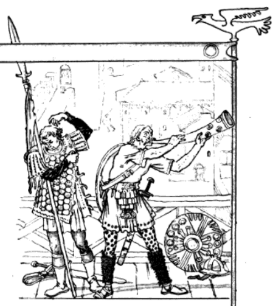
"Brother," said Alard, "we will do our duty, and come forward when it
pleases you."
Renaud spurred Bayard, and placed himself among the enemies.
King Charlemagne, seeing him coming, was surprised and said, "God! Where
have they gathered so many people? They are as many as ever before. If I
can capture them, I will take revenge."
He ordered his army to line up and mounted his horse. Renaud, seeing
that the two armies were approaching, told his brother Richardet that he
wanted to speak to the king, to see if he would grant him his pardon.
"Brother," said Richardet, "you are no longer worth anything, because
you lack courage."
"I want to go," said Renaud, "and if he refuses he will regret it."
"Brother," said Alard, "you are right."
Renaud spurred Bayard and ran to Charlemagne to whom he said, "Sire, if
it is your pleasure, allow us to have peace with you, and let this war
which has lasted so long come to an end. I will do whatever you please.
I will give you my horse Bayard."
"Unfortunate man," said Charlemagne, "withdraw, for if I capture you I
will put you to death."
"Sire," said Renaud, "you will not do it, for we will defend ourselves."
"Strike, knights," said the king. "I no longer esteem you if this
unfortunate man escapes me."
Renaud spurred Bayard, and rode against a knight, and struck him so hard
that he knocked him down.
When Charlemagne saw this, he cried out, "Strike, lords, they will soon
be defeated!"
When Roland heard Charlemagne shout, they all started running after
Renaud, but they could not reach him.
When Richardet saw his brother coming, he came to him, and said to him,
"Brother, what news do you bring? Will we finally have peace? God grant
it to us, for I am thinking of doing something today from which the king
may suffer."
"Brother," said Renaud, "I beg you to show your valor against our
enemies."
When Charlemagne saw that it was time to strike, he immediately called
Duke Naimon, and said to him, "Naimon, carry my Oriflamme, and act like
a good knight by guarding my honor."
"Sire," he said, "I am sorry that you do not grant peace, because the
war is too long."
"Naimon, I command you to take up your sword and strike down the
enemies, for as long as I live, they will not have peace."
Renaud, seeing the banner, went to the biggest press, and hit a knight
so roughly that he knocked him down dead. He then launched himself
through the enemies. He overthrew many knights, and at the third blow he
broke his lance into pieces. Then he put his sword in his hand and
struck a knight so roughly on his helmet that he split him to the teeth,
and made his head fly from his shoulders.
When he had done this, he shouted, "Dordogne!" to rally his people. He
said, "Frankish knights, today we will avenge the evils that Charlemagne
has done to us, and we will win the battle."
When Alard, Guichard, and Richardet heard Renaud speak, they all started
riding towards the enemies. They overthrew seven knights each at one
blow, because, since they were assembled, Charlemagne's people could not
resist against them. Renaud and his brothers destroyed them like beasts,
and most were defeated. The king rode against the people of Renaud, and
struck a knight so roughly that he knocked him dead to the ground. Then
he put his sword in his hand, and struck so hard that the people of
Renaud were forced to flee.
When Renaud noticed that his people were retreating, he came to the
standard bearer and said to him, "Friend, make your way to Dordogne as
carefully as you can, for we have fought too long, it is time to rest."
"Lord," said the knight, "I will do it willingly." He immediately set
off towards Dordogne.
Renaud called his brothers, and said to them, "My brothers, let us stay
behind, for otherwise we are lost."
"Brother," said Richardet, "fear nothing."
When Charlemagne saw that Renaud had gone with his company, he cried,
"Lords, we will vanquish them! Many of our knights have already lost
their lives."
Renaud put more than a hundred to death and, in spite of the king, he
and his brothers entered Dordogne. Richardet, brother of Renaud, was
near the city gate. As they entered, Richard of Normandy came with the
king's people. Renaud closed the doors, and they went to disarm, because
they needed to. And when Charlemagne saw that the four sons of Aymon had
escaped, and that they had taken Richard of Normandy prisoner, who was
one of the Twelve Peers, he was angry, because he was afraid that Renaud
would put him to death.
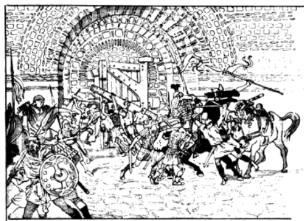
When he saw that he no longer knew what to do, he ordered that the town
of Dordogne be besieged. This thing was done immediately. Charlemagne
swore that he would not leave there until he had taken the city and
shamefully hanged the four sons of Aymon.
"Sire," said Roland, "you know well that I am the one who did the most
harm to the four sons of Aymon. I have never spoken to you about peace,
but now I am forced to speak to you about it. Sire, you know well that
you have been waging war against these four knights for fifteen years,
and we have always lost, because Renaud and his brothers are too
valiant, as everyone knows. I promise you that if you had fought so hard
against the Saracens, you would have been lord of a large region, and
you would have had great honor. And what is worse, you know that Richard
of Normandy, one of your good knights, is taken, for whom you will have
great dishonor, because if Renaud has him killed, you will have great
shame and France will be troubled, because Richard of Normandy has great
friends. And I tell you that if I were in Renaud's place, I would put
him to death, since I could not have peace with you. So, Sire, if you
would listen to me, for your honor you will let Renaud know that if he
returns Richard of Normandy to you, fully armed on his horse, then you
will make an agreement with him. I assure you that he will do it
willingly, and whatever you please to command him."
Charlemagne asked Roland if he had anything else to say to him.
"No," said Roland.
"I swear to you that the four sons of Aymon will never have peace with
me, and I tell you that I have no fear for Richard of Normandy, because
it is plain to see that Renaud will not do him any harm."
After Renaud and his people had arrived at Dordogne, he placed his watch
on the wall of the city, [40] then called for the Duke of Normandy, and
he said to him, "Richard, you know the wrong that Charlemagne has done
to me, so I tell you that if you do not make peace, I will have all your
limbs cut off."
"Lord," said the duke, "you can act as you wish, and if you do me any
harm, you will be disgraced for the rest of your life. Know that, as
long as I live, I will not betray Charlemagne."
Renaud ordered him to be taken to his room where he had him well
guarded. He ordered him not to be refused anything he asked for.
While Charlemagne was before Dordogne, King Yon of Gascony was attacked
by a great illness. He confessed all his sins, prayed devoutly to Our
Lord that it would please Him to have pity on him and grant him
forgiveness for all his faults.
CHAPTER 27 - How Maugis, being on his way to see Renaud, killed some bandits who had robbed merchants, and he returned their belongings to them.
Maugis, having remained in contemplation in his hermitage for a long
time, fell asleep, and dreamed that he was at Montauban, and saw there
Renaud and his brothers who came to meet him and complained about
Charlemagne, who wanted to have Bayard, but Renaud did not want to let
him take it. Maugis woke up with a start and got up furious, and swore
that he would not stop in his life until he had defeated Charlemagne.
About four hours after noon he entered a large wood where he found two
merchants who had been robbed by bandits and who were lamenting.
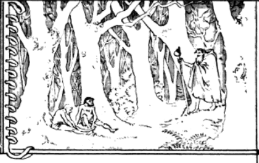
Then he came to them and said to them, "My lords, why are you tormenting
yourselves like this?"
"Good man," said one of these two merchants, "there are bandits in this
wood who robbed us of the fabric that we were going to sell. They killed
one of our companions because he responded to them too harshly."
Maugis took pity on them, and said to them, "Come with me, and I will
ask these thieves to return your belongings to you, and if they do not I
will hit them with my staff."
When the merchants heard Maugis speaking thus, they looked at him. One
of them said to him, "There are seven of them and you are alone, without
weapons and they are armed. And besides, you can barely hold your
stick."
Another said, "Let this fool go, for he does not know what he is saying,
see how he moves his head!"
He said to Maugis, "Brother, go your way and leave us alone, or I will
give you such a blow that you will feel it."
Maugis replied, "Brother, you are very wrong to insult me like this, but
I cannot do you well by force."
Maugis then left the merchants and walked until he found the bandits. He
said to them, "Lords, please tell me why you have taken the property of
these merchants? You know it does not belong to you, so I beg you to
hand over their goods."
When the thieves heard Maugis speaking like this, they were irritated.
The captain of the thieves said to Maugis, "Go away, my friend, or else
I will give you such a kick that I will burst your stomach."
When Maugis saw that this thief did not fear him, he was angry, took his
staff, and hit the thief so hard that he made him fall. When the thieves
saw that their master was dead, they all ran towards Maugis to kill him,
but he fought so well with his staff that he killed five of them, and
the other two fled into the wood.
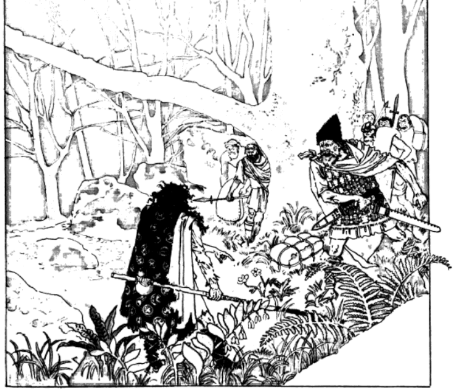
When he saw this, he pursued them and shouted to them in a loud voice,
"Hey, bad thieves, come back and return what you stole!"
The merchants, hearing Maugis cry, immediately ran to him, and found
that the thieves were dead. Then they said to one another, "Here is a
good pilgrim."
They came to Maugis, and knelt before him, asking his forgiveness for
having wrongly blamed him.
"Get up," he said to them. "Take your rings and go. [41] But before
leaving, please inform me if Charlemagne took Montauban and the four
sons of Aymon who were there."
"Lord," said the merchants, "he took Montauban, but not the four sons of
Aymon nor their people, because they had escaped through an underground
cave to Dordogne. There he has, as they say, besieged them again, and
cannot have peace or agreement."
Maugis hearing these words, said to them, "Farewell, merchants."
He took the road to Dordogne, and finally arrived at Charlemagne's army.
He came towards the town, and pretended to be weak, leaning on his
staff.
When Charlemagne's people saw Maugis, one of them said, "This pilgrim
seems very ill, he will not be able to go far."
"By my oath!" said another, "it could well be Maugis who is thus
disguised to deceive us."
"No," said the others, "he is dead."
While they were saying these words, Maugis approached the gate, and
found a way to enter, asking for charity. When he was inside, he went to
the palace, and found Renaud and his brothers, Lady Claire, the two
children, and other knights who were sitting down to dine. Maugis placed
himself against a large pillar which was in the middle of the room, in
front of Renaud and his brothers whom he loved more than the rest of the
world. The seneschal saw Maugis, and thinking that he was a hermit, he
ordered that he be served in the name of God. They gave him bread, wine,
and meat.
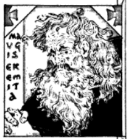
When he saw this, he said, "Lords, please give me black bread and water
in a wooden bowl, then I will be as I ought, for I will not eat meat."
When Maugis had everything he had asked for, he took his black bread and
made soups in his wooden bowl, [42] and ate it with a good appetite.
Renaud, seeing this poor man so thin and pale, felt sorry for him.
He took a dish of game and sent it to him by one of his servants, who
presented it to Maugis, saying to him, "Here, gentle man, the duke sends
this to you."
"Thank you," said Maugis. So he took it and set it before him, but did
not eat it.
Renaud seeing that Maugis did not want to eat, went to arm himself to
defend himself. When he saw that everyone had gone, he came to Maugis
and kissed him, saying, "Lord, please tell me whether you are Maugis or
not, because you resemble him."
Maugis could not hide it, and he said loudly to him, "My cousin, I
undoubtedly am, and I am very satisfied to see you in good health."
Renaud said to him, "Cousin, I beg you to take off this cape that you
are wearing, because I do not want to see such poor clothes."
Then Maugis said, "Cousin, do not be displeased. You know well that I
vowed never to eat anything but bread and wild herbs, and only drink
water. I will never dress differently, because I want to wear a
horsehair shirt to save my soul."
When he heard Maugis speak thus, he began to look at him, and would not
have recognized him, if it had not been for a small wound he had near
his eye. When he recognized him well, he gave him a great feast.
Then he called his brothers, and said to them, "Come and see our cousin
Maugis!"
When Alard, Guichard, and Richardet heard these words, they trembled
with joy. They all ran towards Maugis and embraced him. When the duchess
learned that Maugis had come, she immediately went to kiss him. Word of
Maugis' arrival spread throughout the city, and many came to see him. He
was so changed that it was a pity to see him.
Renaud said to his wife, "Dear wife, go get some linen."
Maugis said, "Lord, I beg you not to give me any linen or clothes, but
have me given a hood, a silk scarf, and an iron-shod staff. I will be
very much obliged to you if you give me these, and I will return
immediately. I only came here to see you."
Renaud was angry when he heard Maugis speak.
"Cousin," Maugis said to him, "cease your grief, for I have given myself
to God to save my soul. I will return to the Holy Sepulchre to serve
God, and I will spend my time there, and will come to see you again,
then I will go to my hermitage, and live on roots as I lived before I
came here."
Renaud said to him, "Cousin, take a good horse and some silver, because
I have enough."
"Many thanks," said Maugis, "I will not take any, and when I have some
bread, that will be enough. I beg you to please return to me safe and
sound."
When Maugis had made all his arrangements, the next morning he went to
hear mass, took leave of everyone, and departed. Renaud led him to the
city gate, and embraced him while weeping.
Maugis left, and shortly after he was surrounded by Charlemagne's
people, who said among themselves, "Here is the hermit whom we saw
passing yesterday. I think he is better dressed than he was, which I am
very happy with. It could well be Maugis who deceived us."
"Certainly," said some of the others, "it is surely him. Let us kill
him, and we will do well."
"We will not do it," said several of them. "He who is over a hundred
years old must be a gentle man, because he lives a holy life, as a good
hermit should do."
CHAPTER 28 - How the Twelve Peers of France asked to make peace with Renaud in order to have Richard of Normandy released, fearing that he would be hanged.
Charlemagne, being very angry at the siege of Dordogne because he could
not have Richard of Normandy, called his barons, and said to them,
"Lords, I see clearly that Renaud is mocking me, because he did not send
Richard of Normandy back to me."
"Uncle," said Roland, "I am very surprised at what you say, because you
did not want to listen to what we told you in the council. Think of the
consideration he showed you when he held you in Montauban. He delivered
you, and you are not grateful to him. But since he cannot make any
agreement with you, he will do as much harm to you as he can and to us
too. You can clearly see the experience of it every day by the damage he
causes us every day. He retains the best knight you have. I tell you
that if Renaud did not put him to death, he showed the greatest clemency
that a man ever showed. I rather believe that he is dead than otherwise,
for no one knows if he is alive or dead."
Charlemagne saw that he was speaking the truth. He began to sigh.
After these words, Archbishop Turpin, Duke Naimon, and Ogier came
forward and said, "Sire, Roland is right to be angry with you."
When Charlemagne heard his barons speak, he was astonished. Then he
called Duke Naimon, Archbishop Turpin, Ogier, and Estout, and said to
them, "Lords, I pray you to go to Dordogne, and tell Renaud to send
Richard of Normandy and Maugis to me, and he will have peace with me for
the rest of my life."
"Sire," said Duke Naimon, "you send us in vain, because I know well that
Maugis has been gone for more than three years, and if Renaud wanted to
hand him over, he would not be able, because he does not know where he
has gone."
"Naimon," said Charlemagne, "you will see what Renaud will say, and will
learn how Richard of Normandy is doing."
Duke Naimon said, "Since you want me to go there, it pleases me well.
But I am very afraid that we will all be disgraced."
When the barons saw that Charlemagne wanted them to go to Dordogne to
deliver their message, they did not dare to contradict him, so they
immediately set out and came to Dordogne, each carrying an olive branch
as a sign of peace. When they arrived, the gate of Dordogne was opened
for them and they went to the palace.
Duke Naimon was the first to greet Renaud, and said to him, "Charlemagne
tells you to return Richard of Normandy and Maugis to him. You will have
peace and he will restore all your lands to you. He will accept your two
children at his court and have them knighted."
"Lords," said Renaud, "you are welcome. I must love you. I am surprised
that Charlemagne told me this thing, everyone knows that I do not have
Maugis, he is lost to me because of him. But if I held Charlemagne here
in my hands as I hold Richard of Normandy, and he did not wish to grant
me peace, I swear that he would leave me his head as a pledge, and I
would be avenged for all the evils he has done to me. I thought he would
be more compassionate than he is. If I had known that he was so angry
with me, I would have taken revenge on him, but my repentance is too
late! I beg you to go back and tell your king that I do not have Maugis,
but that he is lost to me because of him. On the other hand, if I had
him, I would not want to give him back. And since I lost Maugis because
of him, I will hang Richard of Normandy on the gate in spite of him, and
I forbid all Charlemagne's people to come here, because I promise you
that I will have the heads of all those who come."
The barons, seeing him so angry, no longer dared to stay. They took
leave of him and returned to the army of the king.
Charlemagne was waiting for them, and said to them, "Lords, what news do
you bring? Do you have Richard of Normandy?"
"Sire," said Duke Naimon, "Renaud says that you will not have Maugis,
because he lost him because of you, and as revenge for this, he says
that tomorrow he will have Richard of Normandy hanged on the main gate.
He will do the same to all your people, as many as he has. He also said
that if he held you and you did not make peace with him, he would cut
off your head."
Roland said to him, "Sire, do not mind what I say to you. We find in
Holy Scripture that God curses the fruit which is never ripe. So it will
happen if you do not want to mature nor consent to peace with the four
sons of Aymon, who begged you so humbly. And I swear to you that, if
Richard of Normandy is hanged, you will be dishonored for the rest of
your life."
Charlemagne said to him, "You think to frighten me with your words. I am
not a child who is entertained like this, and if Renaud were bold enough
to do the slightest harm to Richard of Normandy, I would hang him and
his whole family with my own hands."
Naimon, seeing that the king was angry, said to him, "Sire, we are
surprised at what is being threatened by so many on both sides, and I am
no longer surprised that Renaud is so irritated. It is because you
caused him to lose Maugis and, out of spite, he will hang Richard of
Normandy and have your head cut off. We are not the cause and, since you
threaten so much, I advise all my relatives to leave and let you wage
war against the four sons of Aymon without us."
The other Peers said that Naimon was right. Charlemagne, angry at
hearing these words, replied nothing. He was agitated, because he was
afraid that Renaud would hang Richard of Normandy.
That same day, Renaud called his brothers, and said to them, "I am angry
that we cannot have peace with Charlemagne, because he is angry with us.
I think that if he had us he would have no pity on us, so I am of the
opinion that we hang Richard of Normandy."
"Brother," said Alard, "I beg you to do what you say. I will be the one
to hang him."
"Brother," said Renaud, "I am willing to have the gallows raised on the
great tower of the gate, so that Charlemagne can see it."
Roland saw it first, and began to shout as loud as he could, "Sire, look
at how Richard is being hanged! This is the payment for the services he
has rendered you, because you are doing him a great disservice. This is
not at all how he pledged to serve you."
"Alas!" said Oliver, "Duke Richard will soon be hanged, to our great
dishonor!"
"Peace!" said the king. "They are doing it to test me, that they may
have peace with me, but they will not have it, and I promise you they
will not hurt him."
Oliver, seeing that the ladder was being raised, said to Roland, "My
friend, they are raising the ladder!"
Renaud called ten of his people and said to them, "Go and get Duke
Richard of Normandy, for I want him to be hanged."
They immediately went away, and found him playing with Yonnet, son of
Renaud.
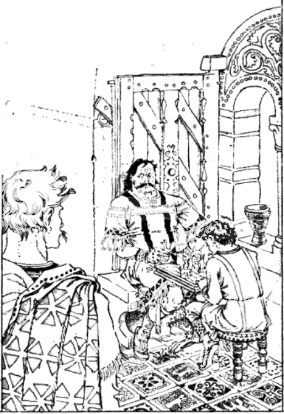
They took him and told him, "Come with us, for Renaud wants you to be
hanged."
The duke looked askance at them and said nothing, but they said to him,
"My friend, stop your game. It is time to leave."
When the people of Renaud saw that he answered nothing, they took hold
of him and said to him, "Get up, Richard, because you will be hanged in
spite of Charlemagne."
When he saw that they were holding him by the arm, he tried to hit
Yonnet with the checkerboard he was holding in his hand and knocked
three of Renaud's people dead to the ground.
Then Richard said to them, "Unfortunate ones! May you never return!"
He then said to Yonnet, "Play now in peace. I think these people were
drunk to try to take me like this. They well deserved what they got!"
When Yonnet heard him speak like this, he played his game without
contradicting him.
Richard called his servant, and said to him, "Go and take these people
who are dead, and throw them out of the windows."
The servant immediately obeyed him, because he did not dare contradict
him, so afraid was he that he would do the same to him as to the others
he had seen killed in his presence.
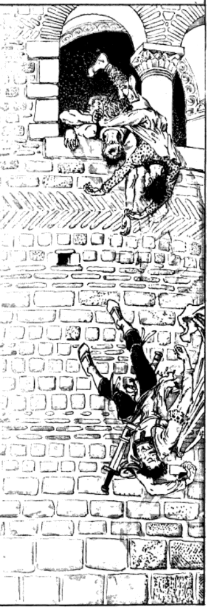
Alard was outside the castle, waiting for Duke Richard to be hanged. He
saw how the dead were thrown out of the windows of the tower, and was
outraged. He went to Renaud and said to him, "Brother, I see that Duke
Richard does not want to let himself be hanged. It will cost a lot
before he is taken. See how he threw them out of the windows."
"Brother," said Renaud, "Duke Richard is indeed to be feared. Let us go
rescue our people, otherwise they will be in great danger."
The people he had sent to take Duke Richard told Renaud, "He will not be
taken easily, because he put three of our companions to death, and began
to play with Yonnet."
Renaud swore that if he did not have peace with Charlemagne, Duke
Richard would be hanged whatever happened.
Then he went to him and said to him, "Why have you killed my people?"
"Cousin," said Duke Richard, "ten of them came to lay their hands on me,
saying that you had ordered it, which I could not believe. I got them
out of here with great haste. I do not know how many I killed. I would
not have acted like this if they had held you as you hold me. Besides,
if I have done something wrong, I am ready to repair it."
Renaud said to him, "You can say whatever you please, but if I do not
have peace with Charlemagne today, I will put you to a shameful death."
Richard said to him, "As long as Charlemagne lives, I am not afraid that
you will do what you say."
Renaud replied, "You know what I can do." Then he had him bound tightly
and taken to the place where the gallows were erected. He said to
Richard, "One of two things must happen. Either you help me to make
peace with the king, or else you forsake him. If one of the two does not
happen, you will repent."
Richard replied, "Do you think that for fear of death I would renounce
Charlemagne, my sovereign lord? I never will. If he loses me, he will
find me on the Day of Judgment, but if you want to act nobly, lend me a
messenger."
Renaud called one of his people and said to him, "Go and deliver the
message that Richard orders you."
Duke Richard told the messenger, "My friend, you will go to the king,
and tell him on my behalf that I beg him, as my sovereign lord, to be
willing to grant peace to Renaud. If he has received any insult, I will
give him satisfaction. If he does not want to do it, I will be hanged.
You will also tell Roland and the Twelve Peers to show the king that it
would be to his dishonor."
The messenger went immediately to the king's army, found him in his
tent, and said, "Sire, Duke Richard commends himself to you, and begs
you, if you still love him, to show him now all the friendship that you
require for him, because, if you do not make peace with Renaud, on my
return you will see the duke hanged shamefully. You see the gallows on
the gate."
He went to the Twelve Peers, first to Roland, then to the others, and
said to them, "Lords, Duke Richard of Normandy begs you, that if you
love him, to ask the king to make peace with Renaud, otherwise he will
perish without dignity."
Roland then said to the king, "Sire, do not allow yourself to be blamed,
you know that Richard is a noble knight who has always served you well.
Make peace with Renaud, because it would be shameful to let Richard
die."
Duke Naimon, Ogier, Archbishop Turpin, Estout, and Oliver said to the
king, "If you do not make peace with Renaud to recover Richard of
Normandy, you will lose your land."
The emperor, seeing that the barons were so emotional, thought he would
die of vexation, and he swore that Renaud would never have peace with
him, if he did not hand over Maugis to him to do with as he pleased.
He said to the Twelve Peers, "My friends, have no fear for Richard, for
Renaud would rather let his eyes be gouged out than do him any harm."
Oliver said, "Sire, you have rewarded us well! Richard will surely be
hanged."
Roland said, "I know him in such a way that, if he had you, he would
have you hanged yourself."
The messenger replied, "Know that Renaud never ceased urging Richard to
ask the king for peace, and that he refused to do so."
The messenger then said to the king, "Sire, please give me the answer I
must deliver to Duke Richard."
"Friend," said the king, "you will tell him to have no fear, because
Renaud will not harm him."
The messenger answered him, "Believe that Renaud does not fear you. I
tell you that Alard is waiting for my return. I would not like to bet
that he will not hang Richard."
Having spoken to the Twelve Peers, Roland said to the King, "Sire, I am
leaving your service without getting permission from you to leave."
He said to Ogier, "What will you do? Let us go, let us leave him here,
he is too stubborn because we obeyed him. He is too proud of it."
Ogier said to Roland, "You are very right. I do not want to stay there
any longer in my life, but I will go with you without forsaking you if
necessary. Since he allows a valiant man who loved him to be hanged, he
would certainly do the same to us, because he has no pity."
Oliver then said to them, "Duke Naimon and I will go with you."
When Archbishop Turpin saw this, he sighed heavily, and said to him,
"Sire, he is serving you and you are not grateful to him, as you show
with the example of Duke Richard who served you well. For this, if I
remain, I will be put to shame."
Charlemagne said to them, "Lords, fear nothing, for Duke Richard will
not be harmed."
"Sire," said Duke Naimon, "you are wrong to say that;. I will never
believe it. Do you think you amuse us with your words? We see the
gallows raised to hang our companion, which is why I will no longer stay
with you."
After Naimon said this, he left the king's tent. All the other Peers
went out with him, and immediately went to have their tents pulled down.
When those of the army saw this from the king, they were so moved that
not a single knight remained there, except for pitiful gentlemen. Roland
shuddered with anguish, and went with the others, and the army was
reduced by more than four thousand men.
When the messenger who had been sent to Charlemagne had returned, Renaud
said to him, "Tell me, what did he say to you?"
"Lord," said the messenger, "you failed to have peace, but he wants
nothing to do with it, and he enjoins you not to be so bold as to try to
do any harm to Duke Richard."
And when he had said this, he turned to Duke Richard, and said to him,
"Lord, you can well know how the king loves you. Know that you will have
no help from him. And, for the love of you, Roland and all the Peers
were angry with him. They have taken down their tents, and I am sure
that most of the army will go. Only Ganelon and his family are left, for
their tents are pitched."
Upon hearing that the Peers had abandoned the king out of love for Duke
Richard, Renaud said to him, "Cousin, I beg you to forgive me the great
harm I have done you."
"Renaud," said Richard, "I do not blame you, but I place blame with the
king."
CHAPTER 29 - How the Twelve Peers of France all abandoned the Emperor Charlemagne, since he did not want to make peace with the four sons of Aymon, and how he summoned them, promising to do what they wanted.
The Emperor Charlemagne, seeing all the barons leaving, was very angry.
He began to gnaw on a demilance that he had in his hand, and then he
called a knight to whom he said, "Get on your horse and ride after
Roland and the other barons, and tell them to come speak with me. I will
do whatever they want, and I will forgive Renaud the wrong he did to
me."
The knight said to him, "I am delighted with your good will." He rode
after the Peers of France.
Renaud was under the portico of Dordogne with Duke Richard, who first
saw the knight going after the Twelve Peers, and said to Duke Richard,
"Cousin, I see a knight riding after the Twelve Peers to make them
return. Today we will have peace."
"Lord," said Duke Richard, "you will have him well despite those who
want to divert him. You must like our companions."
Know that the knight traveled far until he spoke to Roland and said to
him, "Lord, the king commands you to return and he will forgive Renaud."
"Naimon," said Roland, "I have made peace, and this war will soon end."
Naimon, having heard Roland speak, was very satisfied, and they returned
to the king.
When Renaud saw that the Twelve Peers were returning, he said to Duke
Richard, "Cousin, I believe that peace is made."
When Charlemagne saw the barons returning, he said to them, "By my
faith! Gentlemen, you are very wrong to want to make peace against my
will. I hate Renaud so much that I cannot tolerate him because of his
pride, and if you want me to have peace with him, I will have him go,
poorly dressed, to the sea. I want him to return Bayard to me, and I
will return to his brothers their lands and inheritances. If he wants to
do it, I will grant peace, otherwise no, because I assure you that I
never will. So decide among yourselves who will deliver the message."
"Sire," said Naimon, "if you want, I will go willingly."
Charlemagne said to Naimon, "I am willing."
Immediately Duke Naimon left to go to Dordogne.
When Renaud saw him coming, he recognized him immediately and greeted
him humbly, saying, "Lord, what good news do you bring me, and what
subject brings you here?"
Duke Naimon said to Renaud, "Charlemagne sends me here, and he tells you
that he will not have peace with you until you leave to go to sea,
poorly dressed, and live by begging. He will restore all your
inheritance to your brothers."
"Naimon," said Renaud to him, "you are welcome. I promise you that I
will do as the king commands. I agree to leave tomorrow."
Renaud, having granted what Duke Naimon had said to him, took Bayard and
gave him to Duke Naimon, then took the standard and placed it on the
great tower, as a sign of peace."
The king, having seen it, showed it to Roland, who said upon seeing it,
"Renaud is truly very generous to have made peace in this way. Honor to
whoever gave him this good idea!"
Roland said to Ogier, "Renaud has the gentleness of a lamb and the
bravery of a knight."
Meanwhile, Duke Naimon took Bayard and presented him to the king,
saying, "Sire, Renaud is ready to do all that you have ordered. He will
leave tomorrow, if it pleases God."
The king said, "I am happy with it. Please tell me where Duke Richard
is, for I want to know."
Naimon answered him, "Sire, he is staying with Renaud, because he wants
to lead him when he goes."
Renaud made good cheer to his brothers, [43] and said to them, "Lords,
do not be sorry that I am going, for the peace that I have made is more
out of love for you than for myself. I ask you to behave well until my
return."
Then he began to dress himself in purple serge, put on big shoes, and
was given a big staff to carry in his hand. He then came to the duchess.
When she saw him dressed in this way, she fell weak.
Renaud raised her up and said to her, "Lady, do not grieve, for I will
soon return here, if it pleases God, and my brothers will serve you as
their lady. I am glad peace was made and I returned. I pray to Our Lord
Jesus Christ to protect you from sudden death, from all evils and
adversities." He kissed her, weeping, and took his leave.
The duchess, seeing him leave, said to him, "My dear friend, the
nonpareil of the world, alas, I will never see you again!"
So she retired to her room, took all her dresses, and then threw them
into the fire. Then she took a serge dress which was of a purple color,
as her husband had done. She put it on, then she began to say that she
would never wear another one until she saw her husband returning from
where he had gone.
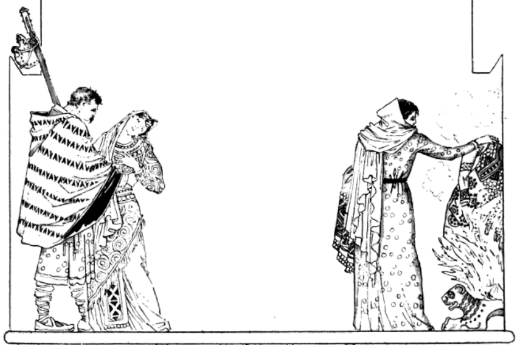
Renaud set off. Richard and his brothers with his people led him far
away.
Renaud said to them, "Lords, I beg you to turn around, for as long as I
am with you I will not be at my ease. Go and console the duchess. For
you, my brothers, I commend my children to you."
After Renaud had bade them farewell, Alard said to him, "My brother, I
beg you to go back, for I am so angry at your departure that I almost
die. I tell you, for the truth, that I will not leave this valley until
you return."
When Alard had said this, he embraced his brother and took leave of him
in tears, as did Duke Richard of Normandy, to whom Renaud said, "My
cousin, I commend to you my brothers, my wife and my children, for they
are all of your blood."
"Renaud," said Duke Richard, "I swear to you that I will help them with
all my power. Therefore do not worry about them, for they will not lack
anything."
CHAPTER 30 - How Richard of Normandy presented Renaud's brothers to the king, and how, when the siege was lifted, the horse Bayard was thrown into the river, and how Maugis went to Jerusalem with Renaud, against the Persians.
When Renaud had left, Richard and his brothers prepared to go find
Charlemagne. Immediately they left Dordogne, and went to the king's
tent, who was joyful when he saw them. He ordered his barons to go in
front of them.
Roland said, "Here are the three very sweet brothers that Duke Richard
is bringing."
When they were before the king, they knelt, then Alard said, "Sire, our
brother Renaud salutes you and commends himself to your kindness. He
sends back Duke Richard of Normandy, and begs him to commend us to you,
as he is overseas to follow your order."
"Friends," said the king, "you are welcome, since we are good friends.
If Renaud returns, I will love him as much as my nephew Roland, because
he is of great valor."
When he had spoken to the brothers of Renaud, he kissed Richard of
Normandy and asked him, "What prison, what food did Renaud give you?"
"Sire," he replied, "I have never in my life been treated so well."
The king then ordered that everyone decamp to go to Liège. When he was
on the Meuse bridge he brought Bayard, Renaud's good horse.
When he looked up, he said to him, "Ah! Bayard, you have irritated me
many times, but I have managed to take revenge."
Then he had a stone tied to his neck, and had him thrown over the bridge
into the river Meuse. [44] Bayard sank to the bottom.
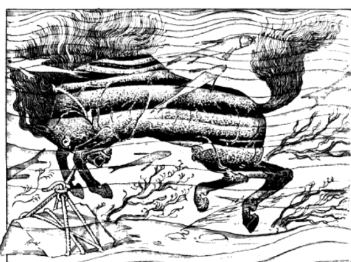
When the king saw this, he was very glad, and said, "I have all that I
asked for. Finally, here he is destroyed!"
Bayard kicked so hard with all four feet that he managed to break the
stone, and returned to the surface. When he was on the surface, he swam
to the other side of the river. When he was on the bank, he began to
neigh loudly, then took off with such rapidity that it seemed as if he
was pushed by lightning. He entered the Ardennes forest.
Charlemagne, seeing that Bayard had escaped, was very irritated, but all
the barons were very satisfied with it. Many people say that Bayard is
still alive in the Ardennes Forest, but when he sees a man or woman, he
flees and cannot be approached.
After all this happened, the king called his barons, and gave them leave
to return to their lands, with which they were happy, because they
wanted to return there to see their wives and children.
Renaud arrived in Constantinople, and lodged with a holy woman who
received him as best she could, gave him to eat what God had sent her,
and then she washed his feet, as she did for other pilgrims.
She took him to her room, and said to him, "Good man, you will sleep
here, because you could not sleep in the other room where there is a
pilgrim who is very ill."
"Lady, please show me this pilgrim who is sick."
"Gladly," replied the Lady. "I promise he will inspire your compassion."
She then led him to where the pilgrim was lying.
Renaud saw clearly that it was Maugis, and he was very happy to see him,
and began to say to him, "Friend, how are you?"
When Maugis heard him speak in this way, he got out of bed, as if he had
not been in any trouble, and kissed him, saying, "How are you? And what
adventure brought you here in such poor clothes? Tell me if you have
made peace with Charlemagne."
"Yes, cousin, in such a way that I will tell you." Then he told him all
that had happened, as you have heard above, and about the treaty he had
made with him, without leaving out a word.
When Maugis heard these words, he was happy, gave thanks to God,
embraced Renaud, and said to him, "Cousin, I am healed by the good news
you announced to me, and we will go together. We will not die of hunger,
because I know how to beg well."
"And me too," replied Renaud.
When the lady saw that the pilgrims were greeting each other so long,
she thought that they were people of noble families, and that they had
done some business with each other.
She said to them, "I see clearly that you know each other. Please tell
me who you are and where you are from."
"Lady, know that we are two pitiable gentlemen who are banished from
France, and we must go overseas wearing these clothes that you see. We
are first cousins, and will travel together, if it pleases God."
The lady was happy and brought in large quantities of food. Maugis, who
had not drunk wine for a long time, drank some with Renaud. One could
not imagine or describe all the friendliness that the two cousins showed
towards each other. When daylight came, Renaud and Maugis got up, took
leave of the lady, and set off on their way.
The two pilgrims, after many days, arrived within a league of Jerusalem.
They could already see the Temple, the Tower of David, and part of
Jerusalem. When Renaud and Maugis saw this, they were very joyful and
gave thanks to God that they had reached the Holy City. When they had
said their prayers, they set out to enter Jerusalem, but they had barely
started walking when they saw a large camp around the city. In front of
the City of David there were several tents and pavilions of the
Christians who had come to destroy the Amiral of Persia, who was keeping
Jerusalem besieged.
Renaud then stopped and said to Maugis, "Cousin, what people are these
in this camp? Are they Christians or Saracens?"
"To be sure," said Maugis, "I know nothing about them. I wonder who they
could be."
As Renaud and Maugis were talking, an old man arrived who came from the
army. Renaud said to him, "Knight, tell me, please, who are these people
who camp before the city?"
"Pilgrims," he replied, "they are Christians who have besieged
Jerusalem, and cannot take it."
"Tell me," said Renaud, "who is in Jerusalem?"
"Know," said the knight, "that it is the Amiral of Persia who took it by
treachery."
"How did he take it?" said Renaud.
"You must know," said the man, "that the Amiral dressed in pilgrim's
garb, and many other people with him. They returned to Jerusalem one
after the other, and when they arrived there they made a great noise and
drew their swords, and fought fiercely. Finally, they made themselves
masters of the city before King Thomas and his people had armed
themselves. He fled with his few remaining people. The country
immediately rose up, so that the Persians were besieged in the city, and
it was hoped, with the help of God, that in a very short time the city
would be taken."
"Now, tell me," said Renaud, "do those from within the city often go out
to fight the Christians?"
"Yes," said the man, "because there are a lot of them. And what destroys
us most is that our people are leaderless."
When Renaud heard these words, he began to smile and said, "We are going
there to see what will happen."
They went to the army. Everyone looked at Renaud who was such a noble
pilgrim. He looked from side to side, not knowing where to stand.
He said to Maugis, "Cousin, we must find a way to accommodate us in the
corner of the wall."
Maugis immediately worked on making a small lodge. Meanwhile, the Amiral
of Persia left Jerusalem with three thousand combatants.
Meanwhile, the valiant Count of Rames returned to speak to them. He
found them making their lodging. Then he watched them without saying
anything.
When he saw that they were tall and well made, especially Renaud, he
said to him, "My friend, I beg you to tell me the truth about what I
will ask you, and by the faith that you owe to the Temple that you come
to worship. Will you tell me your name, who you are, what country you
are from, and why you are so poorly dressed?"
"Lord," said Renaud, "I will gladly tell you my name and my country.
Know that my name is Renaud of Montauban, whom Charlemagne very wrongly
disinherited. Duke Aymon was my father. I came to the Holy Land to serve
Our Lord against his enemies, because Charlemagne, my sovereign lord,
recommended it to me when I made peace with him. And, what is worse, he
forced me to come here as you see, begging for my bread, which I did not
want to contradict in order to have peace."
The Count of Rames was very happy, and, clasping his hands towards the
sky, he said, "Ah! Noble knight Renaud, the best of the knights in the
world, receive my homage, for I give myself and all that I own to you."
Renaud said to him, "Get up, because you are mocking me."
"By God!" said the count, "I will never get up unless you grant me a
gift."
"Lord," said Renaud, "I will grant it to you willingly and with a good
heart."
"Many thanks," said the count. Then he rose up and said to him, "Is it
true that you made peace with Charlemagne? Where are your brothers and
your cousin Maugis, in whom you trusted so much, and your good horse?"
"Lord," replied Renaud, "my brothers remained in France with my wife and
my children, and the king gave them our inheritance. You see my cousin
Maugis here."
The count was delighted to have learned this, and exclaimed loudly, "Ah!
Count Renaud, welcome! You are the most valiant knight in the world.
Praise be to God who inspired you to come here. I beg you to receive me
as a friend. You will save the honor of King Thomas, who is held
prisoner here by these infidels. They have taken him while we have been
here outside the city. If you wish to be our leader, I have no doubt
that in a short time we will take back Jerusalem, and that King Thomas
will be delivered."
All the barons of Syria arrived. They were joyful at the arrival of
Renaud of Montauban, to whom they gave a grand welcome and good food.
Finally they all asked him to be their lord and commander, as the Count
of Rames had been before.
When Renaud saw that the barons of Syria were all urging him to receive
their homage, he said to them, "Lords, since it pleases you to do me
this honor, I take it, except the honor of King Thomas, who is your king
and sovereign lord."
"Lord," said the barons, "we want it that way."
When he had received their homage, the count knelt before him and said
to him, "Lord, I beg you to grant me the gift you promised me."
"Lord," said Renaud, "say what you want and you will have it."
"It is that you come and stay in my tent and that you receive nothing
outside my house, and if you want, I will deliver to you everything you
ask of me."
"I thank you for the honor you do me with these beautiful gifts, they
are certainly not to be refused."
The count took Renaud by the hand and led him into his tent. The barons
took their leave, and each returned to their tents, praising God for
having given them such a good leader. The count brought in very good
horses, well equipped with caparisons of various colors lined with fur,
several hauberks, [45] a large number of swords, and several gold and
silver vessels, which were presented to Renaud. But he did not want
anything except a horse, a hauberk, and a sword, and he distributed what
remained to the poor knights.
The count said to him, "Lord, take another outfit, because you know that
it is not right for a man like you to wear such poor clothing."
"The one I have pleases me," replied Renaud, "and I will not put on any
other clothes until I have kissed the Holy Sepulchre where God was
placed after coming off the cross."
The count then ordered that supper be served. When they had supper, the
count called Galeran, Geoffroy, and the Count of Jaffes.
He said to them, "Lords, let us remember to praise God, since he has
sent us the help of Renaud and Maugis. It seems to me that each of us
must light a large candle in each of our tents, praising Our Lord for
the help he has sent us."
The barons told him that he was right. Then everyone returned to their
tent and lit a large candle. It was beautiful to see the great light
that spread throughout the army! Then they all began to dance around
their tents. The Turks who guarded the Tower of David, having seen such
a great light in the army of Christians, were surprised. Then some of
them went and told their king.
When the Amiral heard this news, he cried out very loudly and said,
"Mahomet! What have they found, these villains, for which they are
having such a big feast? I believe they act like swans who sing when
they are about to die, for I answer for their loss and yet they
rejoice." He swore to Mahomet in front of all his barons that he would
go out the next day to destroy all the Christians.
When King Thomas, who was a prisoner, saw the great joy that the
Christians were having, he did not know what to think, but he said
within himself, "What cause do these people now have for their great
joy? Alas! Do they not remember me? I think so, because the feast they
are having must be for a great occasion."
Those of Rames and the surrounding area, seeing such a great light,
imagined that Jerusalem was on fire, and the others were afraid that
some great affair had happened. While those of the army were having a
good time, a sentry was placed.
As soon as day came, the barons went to greet Renaud in his tent, and
said to him, "Lord, what do you think we should do? Shall we attack the
City?"
"Lords," said Renaud, "it seems to me that we will do it."
They were deciding whether they would attack the city. Then the Amiral
opened the gate and rode out with ten thousand well-armed men. Renaud
and the barons of Syria immediately ran to arms. Renaud was soon armed,
then he took his helmet and his sword, and mounted the horse that the
Count of Rames had given him.
Maugis likewise armed himself, then mounted his horse, and began to
shout, "Barons, fear nothing, for I promise God that I will not return
to being a hermit until the Turks are defeated!"
He said to Geoffrey, "Baron, stand by Renaud, because if all the other
knights were like him, the Amiral would soon be defeated."
When the barons were armed, they ordered their battle as best they
could. [46] The Amiral arrived and placed himself among the Christians.
The first Saracen battalion was led by a king who was called Margaris,
and who carried on his escutcheon a dragon painted with a horrible
figure. [47]
When Margaris saw that it was time to strike at the Christians, he rode
against Renaud, who, seeing him coming, immediately said to the Count of
Rames, "Here he comes seeking death."
And when Renaud had thus spoken, he rode very roughly against Margaris,
and struck him with such force, that he pierced his breast with his
lance, from which he fell to the ground.
When he had done this, he said to him, "May God punish you! Go and keep
company with your predecessors in hell."
Then he drew his sword, and struck a Saracen so roughly on his helmet,
that he split him to the teeth. Then he struck another under his
standard, and knocked his head from his shoulders.
When he had killed these three, he shouted, "Montauban!"
When Maugis heard it, he rushed through the melee, and struck dead the
first one he encountered, then he drew his sword, placed himself in the
great crowd, and he struck right and left with so much force that he
felled so many Saracens to the ground. He killed so many that Renaud and
all the barons were astonished.
Renaud then said to the Count of Rames, "What do you think of my cousin?
Have you ever seen such a good hermit?"
"By my faith!" said the count, "He deserves to be esteemed. Blessed are
the womb that bore him and the hour when you came to this country! I am
sure now that, because of your arrival, the City of Jerusalem will be
taken and King Thomas will be delivered from prison."
When the Count of Rames had thus spoken, he spurred his horse and struck
a Turk with so much fury that he passed his lance through his body, from
which he died. Then he drew his sword and cried, "Rames!" as loud as he
could, saying, "Strike, barons, for the Saracens will be defeated, if
God saves the valiant Renaud and Maugis for us."
The barons of the country pressed together, and began to perform marvels
of arms against the Saracens. Everyone feared encountering Renaud and
Maugis, because they did not dare to stand before them. When the
Saracens saw that they could not withstand the harm that Renaud and
Maugis were doing them, they fled towards Jerusalem.
When the Amiral saw that his people were defeated, he said, "Unfortunate
men, why are you fleeing from me? Do you not know that I am your lord
and that I will defend you against all these false Christians? What
happened to Margaris?"

"Sire," said a Saracen, "he is dead."
When the Amiral heard these words, his thoughts were filled with rage,
and he said, "Who is it that killed Margaris? Is it the one with the big
fourche on his shield?" [48]
"Yes, Sire. He is the best knight in the world. He put many of your
people to death."
The Amiral swore by Mahomet that he would pierce the great villain's
stomach. When he had made his oath, he swooped and entered the fray, and
the first he met was Galeran, who he struck on his shield so fiercely
that his lance passed through him and out his back.
He then drew his sword and entered the fray, shouting, "Strike, barons,
strike at these bad Christians, for they will soon be defeated!"
When the Count of Jaffes and Geoffroy saw that he mistreated the
Christians so badly, they threw themselves into the melee. There was
great destruction of people on both sides, but in the end the Christians
would have been defeated if not for Renaud and Maugis.
CHAPTER 31 - How the City of Jerusalem was taken by the plan of Renaud and Maugis, and delivered from the tyranny of the Pagans.
Renaud, seeing the combat, threw himself into it like a lion upon
beasts, and struck a Persian who was a cousin of the Amiral, whose name
was Orient. He gave him such a great blow with his sword on his helmet
that his head flew off to the distance of a lance, then he struck
another who was a nephew of Maybon, and killed both the man and his
horse. He showed so much courage that the Pagans were astonished, for he
had thrown his shield over his shoulders, wrapped the reins of his horse
around his arm, held his sword in both hands, and left his body
unprotected. He struck to the right and to the left, and with each blow
he killed a Pagan.
When the Amiral saw the damage that Renaud was doing to his men, he
swore to his God Apollo that he would not eat until he had killed the
great villain.
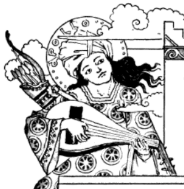
"Sire," said Count Amaury, "I beg you to leave this enterprise, for I
tell you that, if you go to meet him, he will kill you with a single
blow."
Maugis caused great carnage wherever he went. When Renaud saw that
Maugis was doing so well, he was very satisfied.
He gave such a great blow with his sword on the helmet of a Turk that he
separated his head and cried, "Montauban! Strike, and they will be
vanquished!"
The Amiral, having heard the cry of "Montauban!" was very surprised,
because he knew well that the one he called and named the great villain
was the valiant Renaud, whom he had heard of several times as being the
most courageous knight in the world.
When he realized this, he wished he was in Persia. He then turned
towards the city, and went straight towards the Golden Gate to enter it
and protect himself from Renaud, but the valiant Count of Rames followed
him so closely that he finally overtook him. When the Amiral saw that he
was so closely pursued, he feared that he would be taken and fled
immediately to Jerusalem. He left all his men outside, and a great many
of them were killed. Renaud, Maugis, Rames, Geoffroy, and Jaffes killed
so many that very few escaped. When Renaud realized that the Amiral had
escaped, he was very sorry. He saw a chevron which was fifteen feet
long. [49] He dismounted and took this chevron and put it under the
portcullis so that it could not fall at all. [50] The gate could not be
closed either. There were so many Turks lying dead on the road that one
could not pass. Renaud and his companions did this with great fatigue.
When Renaud saw the portcullis stopped, without further delay he put his
sword in hand and entered the Castle of Jerusalem, shouting "Montauban!"
He fought so well that Maugis and the Count of Rames entered the castle.
The Amiral, seeing that the Christians had entered the city, became
furious and swore to his God Apollo that if King Thomas did not save his
life, he would have him killed.
Then he ran towards him, and said to him, "King Thomas, if you do not
save my life now, I will have you killed, and I will throw you down."
Then King Thomas said to him, "Have a little patience until I have
spoken to my men."
"Go and speak to them," said the Amiral, "hurry up."
King Thomas then went to the windows, and saw Renaud and Maugis
approaching, who were the first to attack the tower where he was a
prisoner.
He did not know them, but then he saw the Count of Rames approaching,
whom he knew, and Geoffroy and the Count of Jaffes, with whom he was
pleased and shouted to them, "Lords, look at your king who is a
prisoner! The Amiral tells you that if you do not let him return to his
Kingdom of Persia, he will throw me from the windows at the top of the
tower."
"Ah! Good king," said the Count of Rames, "God save you! It is true that
we serve this lord that you see, who is our master and governor. He is
the most valiant knight in the world. Tell him your situation, because
we can do nothing without him."
King Thomas, hearing this, thought he was going to die. He then said
angrily to the Count of Rames, "Ah! Count, you have betrayed me by
accepting another lord."
"Sire," said the count, "do not fear, we have done it for you, and you
will lose nothing by it. This knight has enough in France. You must know
that he and his cousin Maugis took this city by their courage. Have no
suspicion, neither for him nor for us. I answer that he will do as you
wish, for he is only here to deliver you, and, as soon as he has visited
the Holy Sepulchre, he will return to France."
King Thomas said, "Lords, what is the name of this knight?"
"Sire, his name is Renaud of Montauban, son of Duke Aymon, the best
knight in the world. He is such that Charlemagne could not defeat him,
and they waged war against each other for fifteen years. He performed so
many feats that he acquired a great reputation throughout the world."
"Count," said the king, "I beg you to tell him on my behalf everything I
have proposed to you."
"Sire," said the count, "I will do it very willingly."
He went to Renaud, and told him what King Thomas had sent him to say.
"Lord," said Renaud, "we will not do it like that, but we must go and
attack him impetuously, for, at worst, we will always be able to grant
the Amiral the request he has made to us. And I tell you that the tower
will be taken, that we will deliver King Thomas, and put the traitor
Amiral to death."
Then they climbed the tower on all sides with ladders. Renaud went up
first, Maugis, the Count of Rames, Geoffroy, and twenty other knights
went up after. The old Count of Jaffes remained with the archers and
crossbowmen.
The Amiral said to King Thomas, "By Apollo! You and I will jump down."
"Sire, for God's sake! Do not kill yourselves or me, and I will stop the
assault."
Then he led him to the window, took him by the legs, and cried out to
Renaud, "I will throw King Thomas down, if you do not pardon me."
Renaud, seeing that King Thomas was about to fall, took pity on him, and
said, "Sire, it would be a great shame for us to abandon the assault,
for the tower is almost taken, and it would be a pity also if King
Thomas died."
Then all the barons began to cry out, "Lord, for God's sake! Do not
suffer our king to die so shamefully."
"Lords," said he, "I would not have the king die for me."
Then he cried out to the Amiral, "Leave King Thomas. You will be
delivered by such inconvenience that you and three of your men must go
on foot, and leave all of your equipment behind."
"By Mahomet!" said the Amiral, "I will not do it. I will go on
horseback, and my three men also. If you will not allow it, then I will
let the king fall."
Renaud said to the Amiral, "I grant you what you ask of me."
The Amiral was pleased when he heard Renaud say this. He drew the king
away, and said to him, "King Thomas, you are rid of me."
Then he went down, opened the gate, and went away with his three men.
There was a great feast among King Thomas, Renaud, and all the barons of
Syria. After that, the Amiral took his safe-conduct, and returned to
Persia.
Thomas, Renaud, and all the barons went up to the tower together.
When they were at the top, King Thomas knelt before Renaud, who said to
him, "Sire, you are wrong to act in this way."
"No," said the king.
Renaud took him by the hand and raised him up.
Then the king embraced him and said to him, "Blessed be Our Lord who has
brought you to this country, for you have rescued Jerusalem, the Holy
City, and delivered me from prison. Now, tell me, if you please, have
you made peace with Charlemagne who has done you so much harm?"
"Yes, Sire," said Renaud. "And, on the occasion of the peace, I am here
in poor clothes, asking for my bread."
They then came down from the tower to go to the Holy Sepulchre, where
they gave thanks to God, and held a great feast throughout the whole
city to celebrate the victory that had been won.
When Renaud and Maugis had adored the Holy Sepulchre, they were led by
King Thomas and the barons to the palace, where they were feasted
suitably. This feast lasted more than a hundred days, and they gave
beautiful presents to Renaud. He was given horses and cloth of gold, but
Maugis would not accept anything, nor change his clothing, because he
wanted to remain barefoot and in the habit of a pilgrim, which Renaud
was very angry about. The king had a ship moored at the port of Jaffa to
take Renaud away.
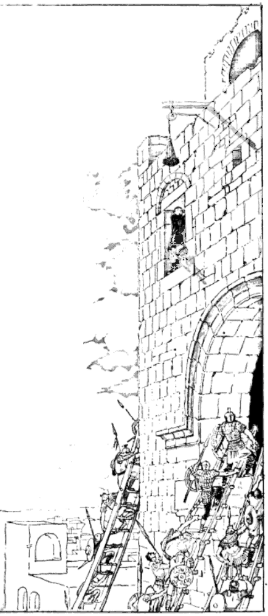
When everything was ready, King Thomas sent Renaud to the port of Jaffa.
The Count of Rames and Geoffroy accompanied him there, and were very
sorry about his departure. Renaud took leave of King Thomas and the
other barons in tears and then they headed out to sea. They remained
there for about eight months. They finally landed on a Thursday, in a
place called Palermo and, having arrived at the port, Renaud ordered
that he be put ashore, and that the ship be unloaded.
The King of Palermo was at the windows of his palace, and saw that a
ship was being unloaded. Then he said to his barons, "I see that a ship
is being unloaded on the shore. It might be the ship of some great lord,
or perhaps poor pilgrims."
The king, without waiting any longer, went to the port with several of
his knights, and there they found Renaud, who had gone ashore. When the
king saw him, he was very happy and received him well.
"Renaud," said the king, "be welcome. I invite you to come and lodge in
my palace, and then we will speak of your journey and of the war."
As the king was in conversation, a knight arrived who said to the king,
"Sire, the Amiral of Persia has come to Palermo, accompanied by his
men."
When the king heard this news, he was irritated, but Renaud was pleased.
Renaud said to the king, "I pray you not to be surprised, for you will
be avenged."
The king ordered everyone to arm themselves, and stirred up the whole
city.
Renaud, seeing this, asked for armor.
Maugis answered him, "I am determined to bear arms out of friendship for
you, for I could not suffer you to be in danger."
When the king heard Maugis speak thus, he was grateful to him, and
embraced him, saying, "By my faith! Here is a good hermit, for he knows
how to draw a sword when necessary."
"Sire," said Renaud, "you are right, for it would be difficult to find a
better knight."
Each of them armed himself immediately, and the king went to Maugis, and
said to him, laughing, "My friend, I make you my standard-bearer, and I
cannot choose a better one."
"Sire," said Maugis, "if you give it to me, I will put it in such danger
that you will be captured."
The Amiral heard them cry out, "Montauban!" He was so afraid that he did
not know what to do, and said, "By Mahomet and Apollo! I believe they
have the devil in their pay! I left him in Jerusalem and now he is
here."
Trembling with fear, he said to his nephew, "By Mahomet! We were wrong
to have come here to make war on King Simeon, since he has the devil
with him. He is the first in the world in chivalry. Would to Apollo that
I were in my ship, for I fear losing my life in this battle."
"Sire," said his men, "fear nothing, for if he falls into our hands he
will perish."
"Lords," said the Amiral, you do not know his courage. Even if we were
ten times as many, we could not resist him, so I do not want to stay
here any longer." He turned his back, and at the head of his men,
returned to his ships.
Renaud, seeing that the Pagans were defeated, began to cry to Maugis,
"It is finished with the Pagans!"
He began to pursue them with King Simeon, and they killed them like
beasts. They put to death a very considerable number of them, so that
the frightened Amiral took flight.
When he had escaped in his ship, he looked towards the land, and saw the
loss of his men caused by Renaud and Maugis, for the sea shore was
covered with Pagans lying dead on the sand. He was so angry that he tore
out his beard and cursed the moment of his birth. Renaud arrived at the
port and saw that the Amiral had escaped. He was very angry, and threw
rockets at the Amiral's ship. [51] He burned a good part of them, and
the Pagans were forced to change ships.
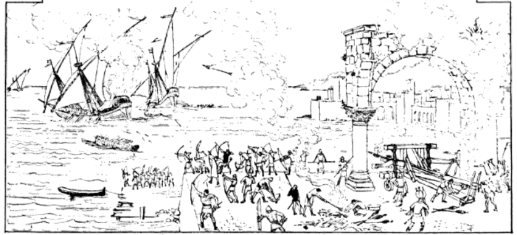
King Simeon, seeing that he had conquered his enemies, ran to embrace
Renaud, saying to him, "I see well that it is through you that I am
king, and so I make you lord of all that is mine."
"Sire," said Renaud, "I thank you for your kindness."
After having spoken for some time on the sea shore, the king took Renaud
by the hands, and they returned to the city. The king had the booty they
had taken brought, and presented it to Renaud and Maugis, who did not
want it, but gave it to their knights. When Renaud had enjoyed himself
for four days, he asked the king for permission to leave. When he saw
that he wanted to return, he gave him rich presents, and had Renaud's
ship provisioned with good food. He took leave of the king and the
barons, who accompanied him to the ship. When he was ready to leave, the
king embraced him in tears, then returned to Palermo.
Renaud and Maugis went to Rome, and confessed their sins to the Pope,
then embarked to go to Dordogne, where they were well received by the
inhabitants, who told of their arrival to Alard and his brothers, who,
hearing the news, went to embrace their cousin Maugis. They went up to
the palace and had great joy.
Then Renaud looked at Alard and saw that his face was pale. He was
surprised, and said to him, "Brother, how are my wife and children? I do
not see them."
"Brother," said Alard, "do not be worried, they are all well, and since
your departure we have had the town closed and the castle fortified
against our enemies."
Renaud was very happy to hear this news from his brother.
At the same time he saw Maugis arrive, who said to him, "Lord, you must
know that what Alard says is not true. Your lady wife is dead, because
she has not stopped crying since your departure. She threw all her
dresses into the fire, and would only wear a serge cloak, [52] like you.
She was so upset that she died."
When Renaud learned this, he began to cry, saying, "King Charlemagne, I
must hate you, because you caused me to lose my wife, by driving me out
of France."
Then Alard led him into the church, and showed him the tomb of the
duchess, over which he wept and said, "Ah, what a Pilgrim I am! I
believe that there is noone less happy in the world. I see now that I
have lost all my wealth, by losing the most amiable woman in the world."
As he said these words, his children arrived and knelt before him.
Renaud then embraced them out of friendship, and said to them in tears,
"My children, think of doing well for yourselves, for I know that I will
leave you before long."
When he had said this, he began to mourn more than before. Maugis was
just as sad as he was.
Mourning then began throughout the city, and lasted for the space of ten
days, and on the eleventh day Renaud left to return to Montauban. Then
Maugis returned with Renaud. They made the journey on foot. When the
inhabitants of Montauban learned of the arrival of their Lord, they were
pleased. They lined the streets where he was to pass and they came
respectfully to meet him. Renaud received them honorably, for he was at
that moment hiding all his sorrow to honor his people who gave him such
a great welcome. When Renaud was in the Castle of Montauban, he was very
joyful and stood at the window to look down, and seeing so many people,
he was surprised at where they all had come from, for he never thought
he would feel so good.
When Renaud and his brothers had stayed a few days at Montauban, it
happened one day that Maugis found Renaud all alone, and said to him,
"Cousin, it is time that I take leave of you. You know that so many
people have died because of us, for which you are bound to ask God's
pardon."
Maugis then took leave of Renaud and his brothers, returned to his
hermitage, and would not let anyone lead him away. While he was there,
he led a very holy life and lived only on roots. He lived for seven
years in this manner, and in the eighth year the good Maugis died close
to Easter. We will speak no more of him from now on, and will return to
Renaud and his children.
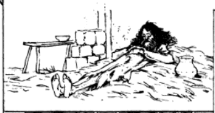
CHAPTER 32 - How Renaud sent his two children to Paris, to Charlemagne, honorably accompanied, so that he would receive them as knights.
Renaud was very sad, both at the departure of Maugis and at the death of
his wife. But he consoled himself with his brothers as best he could. At
this time, Duke Aymon died and made his children heirs to all his
property. Renaud shared his father's property with his brothers. [53] He
kept only Montauban for himself. He then married them very richly. He
remained at Montauban with his children, whom he instructed in good
morals, and nurtured them until they were able to bear arms. One day he
took them into the countryside, and had them carry shields and lances to
try them at jousting. They jousted as well as if they had been at war
for ten years.
Then, seeing that they defended themselves well, he said to them, "My
children, you are grown up. It is time for you to become knights,
wherefore I want you to go into the service of Charlemagne, your
sovereign lord, who will make you knights, for you cannot do this
without him."
"Father," said Aymonet, "we are ready to obey you in what you command
us. It seems to me that you are doing well to train us for war."
"Father," said Yonnet, "you will not be sorry. Since you said that we
would become knights, we are quite ready to present ourselves when it
pleases you."
Renaud and his children then returned to the Castle of Montauban. When
they arrived at the castle, he called his seneschal, and said to him, "I
order you to have my children honorably dressed in rich clothing,
because I want to send them to the court of the king to be made
knights."
Immediately, the seneschal did as his master commanded. He had two
beautiful horses brought covered with rich saddlecloths. He put two very
beautiful competition saddles on the horse for the two young knights.
Then, when he had them well arranged, he had them brought before Renaud
who, seeing them in such beautiful order, was very satisfied, and then
he armed about five hundred knights to accompany his children.
And he said to them, "My very dear children, you are well equipped,
thank God! And here is a good company of good people to accompany you.
You will go to King Charlemagne, who, I believe, will surely show you
much friendship out of respect for me. You are of a noble family, so I
beg you not to do anything that could bring reproach upon yourselves. I
commend you, on the faith that you owe me, to spend the money that I
give you honestly, and not to use it with poor gentlemen. When you have
no money left, send for some more. Above all, I commend you to serve God
in whatever you have to do. I also commend the poor Christians to you,
and ask that no bad word comes from your mouth, neither to a girl nor to
a woman. Give honor to good people, I commend it to you, and do not
speak ill of one another, but always keep yourselves in inviolable
fidelity. As for you, Yonnet, you must show honor and respect to
Aymonnet, your brother, because he is older than you."

Yonnet answered him, "Be sure that I will serve my brother as I would
like to serve you."
"I swear to you, my son, that if you act in this way, you will be
esteemed all your life, wherever you may be. But I also command you to
take care not to speak too much, because if you speak too much, the
French will say that you are not like me or your uncles, because we do
not speak willingly."
"Father," said the children, "we have hope in Our Lord Jesus Christ that
he will preserve us from error, and that we will do things so that you
will be pleased."
When Renaud heard his children speak like this, he was pleased, and
taking them aside, he said to them, "My children, you are going to
France. Remember what I will tell you. You must know that there are many
people of King Charlemagne who do not like us much, they are those of
Mayence. I recommend that you neither come nor go because of anything
that they might say to you, and if they insult you, think of taking
revenge, and show them that you are the son of Renaud of Montauban."
"Father," said the children, "do not fear that we will suffer to be
insulted."
"My children," said he, "stand before me."
Then the children knelt before him, and he gave them his blessing, and
embraced them all while shedding tears.
CHAPTER 33 - How the two children of Renaud of Montauban fought with the sons of Foulques of Morillon and vanquished them.
Aymonnet and Yonnet arrived in Paris, where they dressed themselves
honorably. They then went up to the palace, both holding hands, and when
the barons saw them coming so richly dressed, and with them such good
company, they greatly wondered who they could be, and followed them when
they went up to the palace, to learn the truth of who they could be.
They entered a large hall where they found King Charlemagne. When they
saw the king, they knelt before him and kissed his feet.
Aymonnet spoke first, saying, "Sire, God preserve you and your company
from misfortune. We have come to you to be received as knights, if it is
your good pleasure. We will be at your service until you give us the
order of chivalry."
"Who are you," said Charlemagne, "to speak like this?"
"Sire," said Aymonnet, "we are the sons of Renaud of Montauban."
When Charlemagne heard that they were sons of Renaud, he rose and
received them honorably, saying to them, "My children, be welcome. How
is your father?"
"Sire," said the children, "he is well, thank God! He commends himself
to you, and asks you to please let him know your news. We left him at
Montauban, but he is growing very old.
"Such is the world, my children," replied the King. "Everyone must pass
away."
Charlemagne, seeing before him the children of Renaud, was joyful and
said to his barons, "Lords, if these children wanted to deny their
father, they would be very wrong, because it is impossible to be more
like him. I think that they will one day be valiant knights."
He then turned to them, and said, "Beautiful children, you will be made
knights when you want, out of affection for your father, my good friend.
I will even give you more land than your father holds. I will also
receive with you a hundred other knights, because you are born of a
family that must be honored and cherished."
When Duke Naimon, Roland, Oliver, and the other Peers of France saw
them, they were pleased. Each one embraced them, then they were asked
how Renaud and his brothers were doing.
"Lords," said the children, "who are you who show such great joy at our
arrival?"
"Children," said Duke Naimon, "we are your very close relatives." Duke
Naimon then told them all of their names.
When the children learned who they were, they bowed before them, and
said to them, "Lords, our father greets you and asks you to care for us
as your relatives."
The barons, hearing these children speak like this, were pleased to see
them, but the two sons of Foulques of Morillon were very sorry. When the
king saw that they behaved so well, he loved them, and ordered that they
be served at the meal as they deserved. The two sons of Foulques, seeing
that the king loved them so much, became extremely jealous, and swore
that they would have them killed before leaving the court.
It happened that the king was in Paris and wanted to hold a plenary
court. [54] Aymonnet and Yonnet were with all the barons of the city.
However, a knight from Germany arrived who presented the king with a
beautiful knife in the fashion of the country. Then Charlemagne called
Yonnet, and gave it to him as a present out of friendship. Yonnet,
having received this beautiful present from the king's hand, was
returning to his place when he accidentally bumped into Constant.
Constant was upset and said, "What is this? Should we make such a big
feast for two traitors who are not worth a rotten apple!" Constant said
several insults to Yonnet that it was not appropriate to say.
Yonnet, having heard himself called a traitor, became furious and went
against Constant saying to him, "You have learned a very bad trade, that
of slandering. I have heard that you have treated my brother and me as
traitors. Charlemagne knows well how my father killed yours, as a
traitor from a traitorous family, but my father is not like that, nor my
uncles. My father killed yours, but it was against his will, [55] and as
the valiant knight that he is, and if you are bold enough to dare to say
that it was by treason, here is my pledge from now on, for you have lied
falsely, except for the honor of the king and his company."
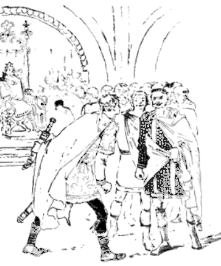
When Charlemagne saw that the barons said nothing about the debate
between Yonnet and Constant, he was angry and said to him, "Constant,
you are wrong to say that the Peers of France and I know well that
Renaud killed your father by treason. Be silent, and never speak of it.
I command you to deny what you have said to Yonnet, or to leave my
court, because I am displeased that you have troubled it."
When Rohars heard what the king had said to his brother Constant, he
rose up and said, "Sire, I am ready to prove against Yonnet that their
father killed ours by treason, and here is my pledge."
"Constant," said Charlemagne, "you are taking a bad tone, and you will
repent it."
Aymonnet and Yonnet knelt before the king, and said to him, "Sire,
accept the pledge that Rohars has thrown. We promise to support the
quarrel, no one has ever betrayed them."
"My children," he said to them, "I will take it, but, on my word, I am
sorry."
Constant said, "Sire, we want to be two against two, each his own."
The king having the pledges of Constant and Rohars, he asked them for a
surety.
Then the traitor Ganelon, Béranger, Estou of Morillon, Finèble, and
Griffon of Hautefeuille came forward to the king, who said to the king,
"Sire, we will be sureties for Constant and Rohars. They are from a
noble family and we must support them."
"Lords," said the king, "I give them to your custody, and command you to
bring them when the time comes."
Aymonnet and Yonnet came forward and said, "Sire, here are our pledges
as we wish to defend ourselves from the accusation that our father
killed Foulques of Morillon by treason."
Then Roland, Oliver, Duke Naimon, Ogier, Richard of Normandy, and
Estout, the son of Odon, said, "We will be sureties for the sons of
Renaud, and we will present them on the day of battle."
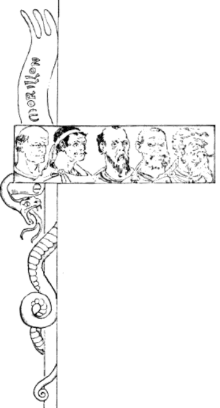
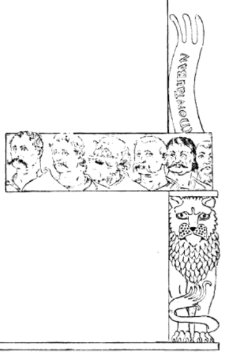
"Lords," said the king, "it pleases me very much. The children are not
knights, but with the help of God, they will be tomorrow. We will ask
Renaud to come and see the battle of his two children."
And when it was about the hour of Vespers, Charlemagne called his
seneschal and said to him, "Bring the two children of Renaud, for
tomorrow I want them to become knights. See that they are well dressed,
for I want to do it out of friendship for Renaud."
The seneschal brought Aymonnet well dressed, with all the others who
were to be made knights. They had kept watch in the Church of Notre
Dame. And when they had come before the king, Aymonnet and Yonnet came
forward and asked for the Order of Chivalry, which the king granted to
them as well as to the others, out of friendship for them. Then he made
a great feast that day. When the feast was over, the king sent for
Renaud to come to court in good company, for his sons were accused of
treason by the children of Foulques of Morillon, saying that their
father had been killed in a shameful manner, and his children had both
given their pledges, saying that their accusers had all lied like
traitors and were descended from a family of traitors.
When Renaud heard this news, he was very pleased and sent word to his
brothers to arm themselves, and they went to Montauban. When they
arrived, Renaud, pleased, told them the matter.
"Brother," said Richardet, "do not fear anything. It will go differently
than you think. I am of the opinion that we should go to court. We will
then see all that they claim to say, and if there is any contempt
towards our nephews. May God never have pity on my soul, if I do not
kill them whatever happens!"
When they arrived, the Twelve Peers of France went with Aymonnet and
Yonnet to meet Renaud and his brothers in great joy.
Renaud said to his children, "At this hour we will see if you are of my
blood or not, for you must avenge me for this great shame which these
traitors very wrongly accuse me of."
"Father," said the children, "do not fear anything, for if there were
ten traitors, they would still not last against us."
When the king heard of the arrival of Renaud, so well accompanied, he
was very happy, and sent for him to come and speak to him. When he saw
him, he welcomed him, and his brothers too. When Renaud had stayed some
time, he took leave of him and went to his lodgings.
He called his children and said to them, "My children, tell me how the
king behaved towards you?"
"Father, know that he loves us all and maintains us honorably. He made
us knights, and has always supported our quarrel against the traitors,
and against all others."
When Renaud and his brothers heard the children speak like this, they
were very happy, for they feared that it would be otherwise.
Renaud then said, "I will acknowledge this benefit."
The next day he went to find the king at his rising, and thanked him for
the honor he had done to his children.
The king said to him, "Since you obeyed me and did my command, I have
abandoned all hatred against you. I want you to know that I am and will
be your friend all my life, and that I will render you service."
When Renaud heard the king, he threw himself at his feet and humbly
thanked him.
Renaud had made two good sets of tested armor for his two children, and
had made provision for two good horses of great price. When the day of
the fight arrived, the children of Foulques of Morillon came to present
themselves before the king, prepared to fight.
The king said to them, "You had bad advice to make such a foolish
appeal. I believe that you will repent it. This is not the first fault
that those of your family have committed, nor will it be the last."
When Ganelon and those of his family heard the king speak in this way,
they were so surprised that they did not know what to say.
Constant said to the king, "Sire, we beg you to please tell us the place
where we must fight our enemies, and whether we must fight two against
two or one against one."
Then Duke Naimon stood up and said, "Sire, it seems to me, since
Constant called Aymonnet a traitor without naming another, and Rohars
accused Yonnet, that they must fight two by two together."
Renaud said, "Sire, Duke Naimon has spoken very well."
"That is true," said the king, "but I want the battle to take place at
the Isle of Notre Dame on the Seine."
The next morning, Renaud took his two children with him. The two
children of Foulques of Morillon also came with their relatives and
friends. When Renaud and his brothers had eaten and enjoyed themselves,
he had the armor brought. Alard, Guichard and Richardet brought the two
children. Aymonnet and Yonnet showed how they would defend themselves
against their enemies, and the manner in which they would attack them.
After that, Renaud sent his two children to Saint Victor. The traitors
went to watch at Saint Germain of the Meadows. When day came, a bishop,
who was related to Constant and Rohars, sang Mass for them. Archbishop
Turpin sang Mass at Saint Victor in front of Renaud, his children, and
the Twelve Peers of France. When the young knights had heard Mass, they
all came to the palace fully armed and appeared before the king.
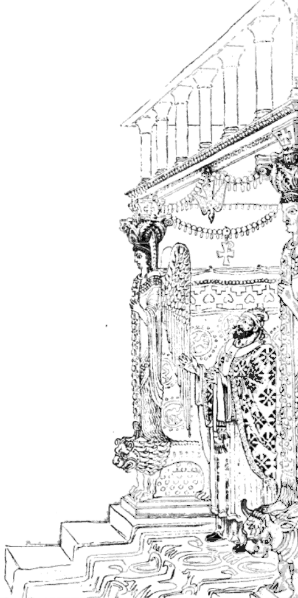
When he saw them, he called Roland, Oliver, Duke Naimon, and Duke
Richard of Normandy, and said to them, "Lords, I command you to guard
the battlefield honorably, and to carry with you the Holy Gospel. You
will make them swear that they will enter it in good order. I commend to
you above all that my honor be preserved there. I fear that there will
be a melee, for Ganelon is full of ill will as well as his friends. On
the other hand Renaud and his brothers are powerful and wise. They will
not suffer that one does them or their relatives wrong, even Richardet,
the brother of Renaud, for when he is angry, he spares neither counts
nor knights, and for that I esteem him more than any other, for once he
wanted to kill me myself, which I still remember. I fear nothing from
Renaud, for he is wise and reasonable."
"Sire," said Duke Naimon, "do not fear anything, for we will keep our
rights and our honor, without doing harm to others."
Meanwhile, the children of Foulques went to the island that Charlemagne
had designated for them. After they had arrived at the island with all
their horses, they dismounted and tied them up, and then they sat down
on the meadow awaiting their opponents. This is how the traitors had
arranged themselves. You will know that, during the time that
Charlemagne was speaking to his barons, Béranger, Hardes, and Griffon of
Hautefeuille laid in ambush near the island, with the intention that if
the sons of Renaud were the victors against the two sons of Foulques,
they would then come out of their ambush in great numbers to make them
perish shamefully.
When Renaud saw that it was time for his sons to leave to go to battle,
he called Aymonnet to him, and said to him, "Come forward, my dear son.
You are the eldest, and for that you must have more honor than the
youngest. Receive Flamberge, my good sword, which I give to you. With it
you will be able to take revenge on these traitors. You have the right,
and they are wrong."
"My father," replied Aymonnet, "be certain that you will see something
that will please you, for we will put the traitors to death, if it
pleases God."
When Renaud heard him speak in this way, he was very satisfied. He
embraced him, then gave him his blessing. He also gave his blessing to
Yonnet. When he had done this, he led his brothers and his two children
to the Isle of Notre Dame. When they arrived there, Renaud and his
brothers returned to go to Charlemagne.
At the same time, a messenger came who cried to Renaud, "Have pity on
your dear children! They are lost with no means to avoid it. Griffon is
lying in ambush to make them perish."
When Renaud heard this, he fell into weakness, and said, "Ah! France,
what a pity that you can never be without traitors!"
When he had said this, he called his brother Richardet, and said to him,
"Go and arm yourselves, and have all our men armed, and lead them to the
Isle, and if the traitor Griffon comes to kill my children, kill him.
When you are there, make yourself seen, and take care, if the two sons
of Foulques have the advantage, not to help my children in any way, but
let them perish if that happens, for it would be a great dishonor for
you if you do not act in this way."
"Do not worry," said Richardet. He went to arm himself with his men, and
then he went where Renaud had told him to go.
The king, seeing Renaud coming without Richardet, was suspicious and
said to him, "Where is your brother Richardet, that he has not come here
like the others?"
"Sire, he has gone on certain business, but do not fear him."
"No, certainly," said the King, "as long as I am alive. But we must go
to the Tower of Seine to see the battle of your children."
"Let us go when it pleases you," said Renaud.
Then they went with Archbishop Turpin, Salomon, Ogier, Idelon, and
several others. When Charlemagne had climbed the tower to see the
battle, he saw Richardet, Renaud's brother, coming with a large number
of armed men. The king knew him well, for he wore his own armor.
Richardet had done so to be recognized.
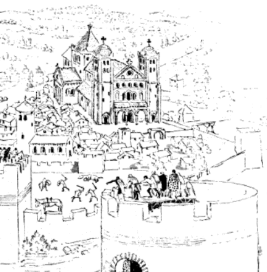
When Charlemagne saw this, he was quite surprised, and he then called
Renaud and said to him, "What do you want to do? Do you want to dishonor
both of us? Have you forgotten your loyalty?"
"Sire," said Renaud, "no, except your honor, but I want to serve and
honor you as my rightful lord.
Meanwhile the fight had begun, and Constant had knocked Aymonnet down.
When Aymonnet saw himself on the ground, he quickly got up and struck
Constant on his helmet, but it was so hard that Flamberge could not
penetrate it, and the blow slid over the visor, broke it, and cut his
chin so that all his teeth were visible. The blow then fell on the horse
in front of the saddle bow, separated the horse into two pieces, and
Constant fell to the ground, but immediately he got up as best he could.
Constant was very surprised.
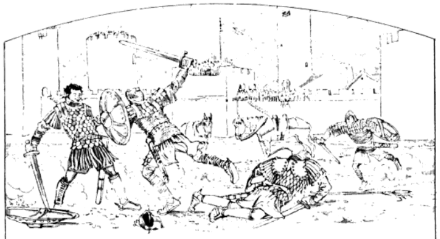
Then Aymonnet said to him, "Traitor, you must die. You acted badly to
have accused my father of treason, but today the day has arrived that
you will pay dearly for it."
When Renaud heard his son speak like this, he was pleased. Aymonnet,
seeing Constant get up, ran towards him and struck him with great blows,
so much so that Constant was unable to strike a single blow, then he
withdrew.
When Constant saw that he no longer knew what to do, he threw his shield
to the ground and grabbed Aymonnet across the body to wrestle. Aymonnet
was not surprised by anything, for he was strong and powerful. He
grabbed Constant by his helmet and pulled it towards him with such force
that he removed it from his head.
Constant called his brother Rohars, and said to him, "My brother, help
me, for I have no more power to defend myself."
Rohars, hearing his brother cry out in this way, was very angry that he
could not help him, for he had lost all his blood, and he could not
support himself. However, he struggled until he came to his brother
Constant, and he tried to strike Aymonnet from behind, but he could not,
for Aymonnet struck him so roughly on the shoulders that he made him
fall to the ground, and he ran towards Constant, whose face he cut.
Then Constant cried out, "My brother, help me, for I am very wounded."
The king then said, "The two sons of Foulques of Morillon are dead
through their own fault."
"Sire," said Ogier, "we must not worry about it, for they wanted to
support bad quarrels."
Renaud, seeing that his children were the victors, was very satisfied,
but Ganelon was not, for, from the anger he was in, he became black as a
devil. Ganelon then called Béranger, Hardes, and Henry of Lyon.
He said to them, "Lords, we are dishonored, for the children of Foulques
are vanquished. I would willingly help them, but I fear the king too
much."
"Sire," said Hardes, "I am very sorry. We can do nothing but show that
we are not angry about it. Let us endure it until the time comes to take
revenge on their parents and friends."
Aymonnet, seeing that he had mortally struck Constant, was well
satisfied.
Then his brother Yonnet said to him, "Brother, you have done wrong to
have killed such a great traitor. I wanted to kill him myself. But since
it is so, go and finish him off, and I will go and kill Rohars."
Aymonnet answered him, "You speak well. This is how they should be
treated."
When the two brothers had agreed, each ran towards his enemy. Aymonnet
said to Constant, "Why accuse my father of treason? I tell you that my
father is one of the bravest knights in the world, and that he killed
your father against his will, and your father wanted to kill him by
treason. Do you recognize your wickedness? Otherwise, you are dead."
"Aymonnet," Constant said to him, "for God's sake! I surrender to you."
Aymonnet took his sword, and led him before the king, to whom he said,
"Sire, hold this traitor. I give him back to you to do with him what you
wish."
The king said to him, "Friend, you have done enough, and I ask nothing
more of you. When we have the other, I will have them both hanged."
Aymonnet, holding his sword in his hand, returned to his brother to help
him, and he said to Rohars, "Traitor, you are going to perish." Then he
ran to strike him.
When Yonnet saw this, he said to him, "Brother, do not kill him. I want
to conquer mine as you did yours."
"Brother," said Aymonnet, "you are wrong. I want to help you, for mine
has been forgiven."
Yonnet said to him, "Brother, if you touch Rohars, I will never love
you."
"Brother," said Aymonnet, "I will withdraw since it displeases you. But
I promise you that if I see that he has power over you, I will help
you."
"Brother," replied Yonnet, "I am willing."
Then Yonnet ran towards Rohars. He struck him on the shoulder and
knocked him down completely, and his arm fell to the ground.
"Traitor," he said, "learn that Renaud of Montauban is not a traitor,
but one of the best knights in the world and if you do not admit it, you
will die on the spot."
He grabbed Rohars by the helmet, and tore it off. Then he struck him
with great blows with the pommel of his sword.
When Rohars saw that he was so mistreated, he cried, "God! Have pity on
my soul. I see that I am defeated."
When Constant heard his brother speak, he began to cry, unable to do
anything else.
Then Yonnet, seeing that Rohars would not recant or ask for mercy, cut
off his cuisses and placed them on his body, saying to him, "Traitor,
reveal your wickedness, or you are dead."
He would not answer anything to that, so he cut off his head.

When Aymonnet and Yonnet had vanquished their enemies, they took each
other by the hands, and returned to King Charlemagne, to whom Aymonnet
said, "Sire, do you think that we have done enough? We are ready to do
even more if you command us."
"Children," said Charlemagne, "you have done enough. Constant is wounded
and Rohars is dead. Go and rest. I promise you that I will do with the
traitors what is necessary."
Charlemagne ordered that Constant be hanged, and the body of his brother
beside him, for he was very unhappy about it.

When Ganelon saw them hanged, he almost lost his head. He called Hardes,
Béranger, and Malu, very wicked people, and said to them, "Lords, you
see how Charlemagne has done us a great dishonor. We will know how to
recognize it, for he has hanged our good friends in a vile manner, but
we will still see the hour when this shame will be avenged."
The traitor Ganelon is right! For he betrayed the Peers of France and
had them killed at Roncevaux.
Renaud, seeing his children victorious, gave thanks to God, he and his
brothers. He asked his children how they were.
"Very well," they answered him, "thank God!"
Alard and Guichard bandaged their wounds, and they were soon healed.
After that, they went to the palace to see the king, who gave them a
warm welcome, and considerable gifts. He gave them castles and
fortresses. Renaud and his brothers took leave of the king. He granted
it to them, recommending that they return soon. They walked until they
finally arrived at Montauban.
Renaud called his children and said to them, "I want Yonnet to have
Dordogne for his inheritance from now on. Aymonnet will have Montauban,
because I have heard that Our Lord curses the tree that is never ripe.
Know that Our Lord Jesus Christ is considerably angry with me. So the
time has come to rectify myself, and I tremble greatly for my poor soul.
It is necessary, as a consequence of this, that I do penance, in order
to restore it to the God who made me in his image and likeness."
CHAPTER 34 - How Renaud left Montauban in the habit of a pilgrim, after having distributed his goods to his children, who mourned greatly when they learned that he had left without saying anything to them.
After Renaud had distributed his possessions to his children, he
returned to his room, and remained there until night. He then put on a
large robe, and took his staff to defend himself from the dogs. He left
the palace and went to the gate of the city, which he had opened.
When the gatekeeper saw that his lord was so poorly dressed, he said to
him, "Lord, where are you going? I will wake your brothers and your
children, for you are in great danger from thieves, seeing that you
carry nothing to defend yourself."
"Friend," said Renaud, "do not go there, I have hope in God. But you
will tell my brothers and my children that I wish them salvation and
friendship, that they always think of doing good, that they do what I
have told them, and that they will never see me again. I am going to
save my soul, if it pleases God, and will die when it pleases him, for I
have caused many people to die and my soul is burdened with them. If I
could do so well that it would be delivered, I ask for nothing else."
Then he looked at his finger, and saw his ring on which there was a
stone worth five silver coins. He gave it to the gatekeeper, who thanked
him for this present, and said to him, "Alas! Sire, you do great harm to
this country!" Then he began to cry.
Meanwhile, Renaud set out in the habit of a pilgrim. As he went, the
gatekeeper followed him with his eyes, and when he could no longer see
him, he fell to the ground in weakness, and remained there for a very
long time. When he recovered, he began to cry as he had done before.
When he had finished his grief, he closed the gate and returned to his
lodging. When he was in his room, he looked at the ring that Renaud had
given him. When he saw that he was so rich, he was very happy. The next
day, as soon as the sun rose, the gatekeeper went to find Renaud's
brothers, and told them all that Renaud had said to him. They all
regretted that Renaud had gone away without saying anything to them.
CHAPTER 35 - How Renaud began to serve the masons at Cologne. They killed him, out of disgraceful jealousy, and threw him into the Rhine.
When Renaud left Montauban, he walked deep into the woods without
finding anything to eat except wild apples and medlars. [56] When it was
night, he lay down under a tree and, as he tried to fall asleep, he made
the sign of the cross over himself, commending himself to God. Then he
fell asleep. When day came, he set out into the woods, where he remained
for the space of eight days without eating anything but wild fruits. He
walked until he left the woods, and found a house of monks where he
slept. The brothers wanted to give him something to eat, but he only
wanted bread. The next day he set out for Cologne, where the Church of
Saint Peter was being built. He entered it, and knelt before the altar,
where he offered his heart to God. He felt the desire to serve in this
place, for the honor of God and Saint Peter, and that it was better to
serve the church than to be in the woods.
After thinking, he went to the architect, and said to him, "Sir, know
that I am a foreign man. Is it your pleasure that I serve here?"
Then the architect said to him, "My friend, go then and help these four
who cannot carry this stone."
"Master," he said, "do not be angry with these poor people. I will fetch
the stone immediately."
"Friend," said the master, "do not hurry, for, if no one else puts his
hand to it, the stone may well remain where it is. It is too heavy a
burden."
"Master," said he, "you will have it immediately, without help from
anyone else but me, if it pleases God."
Then he took the stone and carried it to the master mason, and did so
much work that he won the favor of the architect. The other laborers
became so envious of him that they killed him in his sleep and put him
in a sack. Then they threw him into the Rhine.
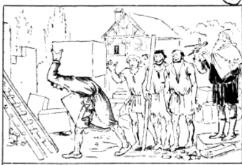
But, by the power of God, the fish prevented him from sinking, and there
appeared such a great light around his body that the inhabitants of the
country were very surprised. They took the body, and put it in the tomb.
Then the barons of the country put his body in a cart and wanted to take
it to the City of Cologne, but they could not, which made them say, "We
see well that we are not worthy to touch the body of this holy man,
because we are too great sinners."
While the barons were speaking, the cart left on its own, by the power
of God. It went very quickly, in front of all the people. When the
clergy and the people saw this, they all began to weep.
You must know well that, when the cart began to move, passing in front
of the tomb where they wanted to bury him, it rolled so fast that it
could not be stopped. It then went out of Cologne, and when it had gone
out, it continued along the main road, and all the people began to weep.
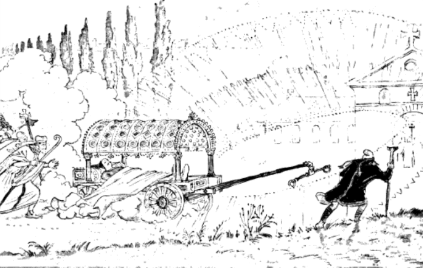
The bishop then said to them, "Lords, you can see that this body is
holy, by the beautiful miracles that it has done today before you. So,
let us go and follow it. It would be wrong to let it go like this all
alone."
Then the clergy and all the people, small and great, set out after the
holy body. All the clergy sang behind it, out of great devotion. The
cart went on until it came to a small town, called Croine, where it
stopped. [57]
Our Lord showed many beautiful miracles for the love of the holy body.
Many people who came to see the holy body were cured, whatever illness
they were attacked by. His fame was made known to everyone, so that
people went there from the country of France and Germany. And so many
offerings were given to the holy body that the small chapel of Notre
Dame where it had stopped was made into a beautiful cathedral. Bishop
Turpin, seeing that the body had stopped, uncovered his face so that
everyone could see him and know his name, if anyone recognized him. But
no one recognized him. When the bishop saw that no one recognized him,
he was very angry.
You will know that the brothers of Renaud, being one day near a
fountain, were worried because they had received no news of their
brother. Then they saw a pilgrim who was passing and who greeted the
barons.
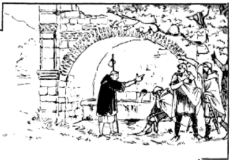
"Pilgrim," said Alard, "where do you come from? If you know any news,
tell us."
"Lords," said he, "I come from a small town in Germany, called Croine,
near Cologne on the Rhine, where I saw great miracles performed by a man
who came to Cologne. He was very tall, and everyone said that he was a
giant. When he was in Cologne, he saw that there were masons at the
Church of Saint Peter. He presented himself to the master to work as a
laborer. He was received very willingly. To cut a long story short, this
man did wonders in serving well, for he accomplished more in one blow
than ten others were able to do, which the masons were very pleased
with. When the other workers saw this, they were jealous and killed him.
They then threw him into the Rhine, and, by the will of God, he was
raised up in a holy body, and performed several beautiful miracles."
He told them point by point everything that had happened. Alard,
Guichard, and Richardet, having heard the pilgrim, began to cry with
grief at having lost their brother, for they felt that he was the one of
whom the pilgrim was speaking.
"Alas!" said Richardet to his brothers, "we are lost, for I see well
that it is our brother that we have sought for so long."
All grieving, they took leave of the pilgrim. They directed their march
towards Croine, then came down to the church, where they found such a
great crowd of people that they could hardly enter. However, having
entered the church, they approached the body which was placed on a
beautiful stone, and saw so much light around it that there seemed to be
a hundred torches. They approached more closely, and began to look at
it. They knew well that it was their brother.
Then they fell into weakness, and said, "Alas! We have lost our brother
by whom we were feared and dreaded. Alas! Who was so bold as to have
laid hands on him? I think they did not know his goodness and his valor,
for they would not have killed him so cruelly."
Then Alard turned to his brothers, and said to them, "My brothers, we
must be very angry since we have lost our brother, who was all our
consolation and our help."
Then the Archbishop went to them, and said to them, "Lords, do not be
displeased with what I say to you. You must not grieve in this way. You
should, on the contrary, be joyful that your brother is a saint in
Paradise. He suffered martyrdom for the glory of Our Lord. You see that
God rewarded him. You also see the beautiful miracles that he performed.
So I beg you to console yourselves, and tell us, if you please, who you
are, and what the holy body is called, so that we may have his name put
on his tomb."
When they heard the Archbishop speak in this way, they began to moderate
their grief. Then Alard, who was the eldest after Renaud, said to him,
"Lord, since it pleases you to know who we are, and how this body is
called, you will know that it was the valiant Renaud of Montauban, one
of the best knights in the world. We are his brothers. Have you not
heard of the four sons of Aymon? Renaud of Montauban was one of them."
Then all three of them began to shed tears of sorrow, and of joy at
seeing that the bravest of the knights had died for the glory of Our
Lord. After the three brothers had somewhat passed their grief, they had
their brother buried very honorably. He was placed in a rich tomb that
the Archbishop had had made, where he is still known to everyone. He is
called Saint Renaud, martyr. His memory was authentically recorded, and
a great ceremony is performed every year throughout the country. After
the body of this saint was buried, his brothers returned to their
country.
THE END
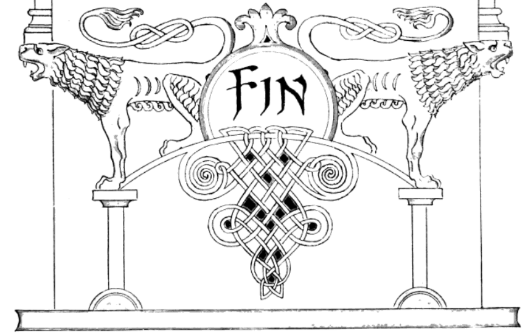
NOTES
NOTE 1 (CHAPTER 1). "The Twelve Peers of France came to the Court." The
trouvères brought back to the time of Charlemagne many institutions and
customs that they saw in use among their contemporaries. The Twelve
Peers of France only appear authentically in history at the Coronation
of Philip Augustus, in 1179; which does not prevent them from playing
the leading roles in all the romances of the Carolingian cycle.
NOTE 2 (CHAPTER 1). "Duke Aymon of Dordogne." According to legend, Aymon
of Dordogne, prince of the Ardennes, father of Renaud, Alard, Guichard,
and Richardet, known as the four sons of Aymon, was brother, by the same
father and mother, of Duke Beuves of Aigremont, Duke Gérard of
Roussillon, and the Duke of Nanteuil.
NOTE 3 (CHAPTER 1). "Duke Naimon of Bavaria." In romances of chivalry,
the character of Duke Naimon of Bavaria corresponds to that of the old
and wise Nestor in the Greek Epic. Naimon was related to Duke Aymon,
although some poems give his parents as Gasselin, King of Bavaria, and
Queen Seneheult.
NOTE 4 (CHAPTER 1). "He then called his son Lohier." This Lohier, eldest
son of Charlemagne, is an imaginary character, whose name corresponds to
that of Louis.
NOTE 5 (CHAPTER 1). "Ogier the Dane, who was their relative." Ogier or
Ogier the Dane is believed to be the same as an Austrasian character
known in history as Autcarius. This Lord took the side of the sons of
Carloman against Charlemagne. He had to take refuge at the court of
Dider, king of the Lombards, where Charlemagne pursued him. He ended up
renouncing the world, took the religious habit, and became a monk at the
monastery of Saint-Faron, near Meaux. But perhaps he was confused with
another Ogier, lord of Charmentraisur-Marne, who was in fact a monk of
this monastery. In the romances and chansons de geste, Ogier is given
the nickname "the Dane", because he is supposed to be the son of
Geoffrey, king of Denmark. According to some critics, he is from
Ardennes, and such is the opinion of the author of the present romance,
who assigns him a relationship with Aymon. Ogier would have been raised
by his uncle Girard of Roussillon, brother of Duke Aymon, and would
therefore be a cousin of the latter's sons.
NOTE 6 (CHAPTER 1). "God increases you in goodness, honor, and courage."
All the ceremonies, briefly indicated here, were used in the thirteenth
century, when new knights were created.
NOTE 7 (CHAPTER 1). "The King had a quintain drawn up." The quintain was
a shield, or even a mannequin representing a man, erected on a post
stuck in the ground and which served as a target. After having been
solemnly armed, the new knight performed a sort of carousel to show his
skill in driving his horse and using his weapons.
NOTE 8 (CHAPTER 1). "The vanguard arrived with the Oriflamme." A ninth
century mosaic, which adorns the church of Saint John Lateran, in Rome,
represents Charlemagne receiving from the hands of Saint Peter a red
banner cut into three strips at its end. It was the banner of the
empire, the first banner. There was later another, the only one
generally known, which was the banner of the Abbey of Saint Denis. It
was made of cendal or red silk. The Count of Vexin, as the abbey's first
vassal, was responsible for taking it to war. The kings of France, very
devout towards Saint Denis, borrowed his banner, and had it carried at
the head of the army in their wars, after having solemnly received it
from the hands of the abbot during the high mass. It ended up being
considered the national standard of France.
NOTE 9 (CHAPTER 1) "Archbishop Turpin." There really existed an
archbishop of Reims named Turpin around the middle of the eighth
century. The very uncertain time of his death is between 788 and 811.
The Turpin of the romances of chivalry is at the same time a priest and
a warrior. He is one of the Twelve Peers of France, skilled in council,
and striking hard in combat. He is of the same type of warrior prelate
as were encountered in the feudal era. He was related to Ogier the Dane.
NOTE 10 (CHAPTER 1). ""Sire," replied Ganelon." Scholarly critics
identify Ganelon with Wenilo, archbishop of Sens, who betrayed the cause
of his benefactor Charles the Bald in favor of Louis the German. The
trouvères made a fantasy figure of this historical character, no longer
a cleric, but a layman, personifying and embodying disloyalty and
betrayal. It was Ganelon who betrayed the brave Roland, and was the
cause of his death at Roncesvalles. Throughout the Middle Ages his name
remained in execration. The trouvères even created a long series of
descendants for him, all felons like their ancestor.
NOTE 11 (CHAPTER 2). "Maugis, cousin of Renaud." According to legend,
Maugis was the son of Beuves of Aigrement and Arnault of Montclair's
daughter. Through his father, he was first cousin of the four sons of
Aymon. A thief, although a good knight, well versed in magical sciences,
Maugis is represented by the trouvères as a powerful enchanter and
necromancer. The Château of Aigremont (Haute-Marne), his family's
estate, contained a high tower called the Tower of Maugis. This castle
was destroyed around the middle of the seventeenth century.
NOTE 12 (CHAPTER 3). "And slept in Montlion." Montlion is one of the
many localities cited in this romance which, if they ever existed other
than in the author's imagination, are no longer found today.
NOTE 13 (CHAPTER 3). "He had his flag flown on a rich carbuncle." A
carbuncle is a marvelous stone, casting a dazzling clarity of its own.
It is often discussed in novels and fairy tales. It is believed to be
the spinel ruby.
NOTE 14 (CHAPTER 3). "Charlemagne had the back ban announced." That is
to say, he summoned the back ban (arrière-ban). Announcing the ban was
the summoning of the vassals immediately reporting to the king, and that
of the arrière-ban was the summoning of the vassals who only indirectly
reported to him.
NOTE 15 (CHAPTER 3). "All the others were in the bailey." In a feudal
castle, the bailey (basse-cour) or courtyard was the part included in
the fortified enclosure, where the stables were located, and where the
servants lived, and if necessary the landlords, who took refuge there in
case of danger.
NOTE 16 (CHAPTER 4). "Take these sommiers." Sommiers are beasts of
burden, horses carrying baggage and provisions.
NOTE 17 (CHAPTER 7). "Free from all rights for ten years." In the Middle
Ages, when a new town was created, as many were in the thirteenth
century, the overlord granted privileges or exemptions to those who came
to settle there. It was the way to attract the population there. Here it
is a castle, a word taken in its broadest sense, that is to say
including the castle itself, the main part of which was the keep, and
the outer enclosure containing, in addition to the common areas, housing
for the population. Around the castle thus constituted, the village was
usually formed, located outside the enclosure. In the event of war, the
inhabitants of the town took refuge within the castle walls.
NOTE 18 (CHAPTER 8). "How King Yon, after having received several
services from Renaud." We have here retained the title of chapter 8 as
given in the Troyes edition, although its statement only partly responds
to the text of the romance.
NOTE 19 (CHAPTER 10). "A handsome damoiseau arrived." The editor of the
Troyesan text, deceived by the assonance of the word, had written une
belle demoiselle (a beautiful damsel) for un beau damoisel, that is to
say a young lord. We corrected this nonsense. Roland, referred to here,
is the same as the hero of Roncesvalles, although he is generally
presented here in an unsympathetic manner. He was a nephew of
Charlemagne but there are several different traditions relating to his
origin. Some say he was born from Milo, Duke of Angers, and Berthe,
sister of Charlemagne, and made him Count of Le Mans. According to other
authors, he would be the incestuous son of Charlemagne and one of his
sisters, and would have been count of Gátinais.
NOTE 20 (CHAPTER 10). "In Melun, where they stayed in the bourg." The
Bourg, that is to say the town, the part occupied by the inhabitants,
the bourgeois, and located outside the particular enclosure of the
castle.
NOTE 21 (CHAPTER 10) "Non Draphonis gagner mi." Language counterfeited
at will. Renaud is pretending that he cannot speak French well.
NOTE 22 (CHAPTER 10). "You will have neither your crown nor Bayard."
Renaud's horse was named Bayard, which means a bay, named after the
color of this famous horse's coat. He had been raised on the island of
Brescau. He was a fairy, invulnerable, faster than the wind, and gifted
with human intelligence. Maugis, having seized it, gave it to his cousin
Renaud. According to legend, Bayard still lives in the Ardennes forest,
but, having become a misanthrope as a result of his experience of men,
he no longer lets himself be approached, and flees at the appearance of
a human creature.
NOTE 23 (CHAPTER 11). "Everyone is ready for the next Candlemas."
Candlemas is the feast of Purification, which the Church celebrates on
February 2. Its name comes from the numerous candles that were lit on
this day, or that were carried in processions.
NOTE 24 (CHAPTER 12). "To the Banner of Saint Denis!" It is the
Oriflamme, the Banner of Saint Denis.
NOTE 25 (CHAPTER 13). "Lord Rambaut went to meet them." Damp Rambaut
went to meet them. Damp, Dam, Domp, Don, are various forms of the same
word, an honorific title meaning Lord, and coming from the Latin
Dominus.
NOTE 26 (CHAPTER 13). "They will call him the dethroned king." Allusion
to an old children's game called the dethroned king.
NOTE 27 (CHAPTER 13). "They rode against the four sons of Aymon, whom
they dismembered." They ran on the four sons of Aymon, whom they
separated.
NOTE 28 (CHAPTER 14). "Sword in hand, and said to it." It is to his
sword that Ogier addresses these words.
NOTE 29 (CHAPTER 16). "Lady Claire went to meet them." The sister of
King Yon, wife of Renaud, is named Yolande in some modern editions, and
Clarisse in the old texts.
NOTE 30 (CHAPTER 16). "We cannot hurt him." Like Achilles, who could
only be injured in the heel, Roland was invulnerable except at the soles
of his feet.
NOTE 31 (CHAPTER 18). "I will become your man." I will pay you feudal
homage and I will recognize myself as your vassal.
NOTE 32 (CHAPTER 18). "It will be at Montfaucon." Although this is the
name of the famous gallows in Paris, it cannot be the one that is
mentioned here.
NOTE 33 (CHAPTER 19). "Renaud killed my uncle at the ford of Balançon."
Foulques of Morillon, killed by Renaud in the plains of Vaucouleurs,
following his treason.
NOTE 34 (CHAPTER 20). "My brother made him bishop of the fields." A
popular expression very widespread in the sixteenth century. During
religious wars prisoners were often hung from trees in the fields, for
lack of gibbets. The soldiery called these hanged men "Bishops of the
fields who give the blessing with their feet."
NOTE 35 (CHAPTER 21). "I will avenge the death of my father." Beuves of
Aigremont, killed by Ganelon, Foulques of Morillon, and Griffon of
Hautefeuille.
NOTE 36 (CHAPTER 22). "Play tables." Play checkers.
NOTE 37 (CHAPTER 22). "Rubbed the king's nose and beard with it, and
decharmed him." That is to say, removed the charm, disenchanted him.
NOTE 38 (CHAPTER 22). "Pinabel, nephew of Charlemagne." According to a
generally accepted tradition, Pinabel was the nephew of the traitor
Ganelon, and his accomplice in the treason of Roncevaux. During the
trial of Ganelon, Pinabel took his defense and offered combat to his
accuser, Thierry the Ardennois. The combat took place at Laon. Pinabel
was defeated, confessed treason, and was hanged. Ganelon was drawn and
quartered by four horses.
NOTE 39 (CHAPTER 26). "You should know that this place was once closed
off." It should not be forgotten that during the story of the founding
of Montauban by Renaud, it is said that he built his fortress in a place
where there were ruins of ancient buildings. The underground passage,
the existence of which he is unaware, and which an old man indicates to
him, dates from the construction of these ancient buildings. It is on
the Mound of Fronsac, in sight of Libourne, and at the confluence of the
Isle and the Dordogne, that the castle of Montauban stood.
NOTE 40 (CHAPTER 26). "He placed his watch on the wall of the city." He
placed the sentinels on the rampart.
NOTE 41 (CHAPTER 27). "Take your rings and go." Take your property, what
belongs to you, your baggage.
NOTE 42 (CHAPTER 27). "He took his black bread and made soups." Formerly
the word soup properly meant bread cut into thin slices and eaten with a
liquid. In Champagne, among the people, we still say "a soup in wine"
for bread cut into slices that we eat by dipping it in wine.
NOTE 43 (CHAPTER 29). "Renaud made good cheer to his brothers." Good
reception, good face. Chère comes from the Italian cera or ciera which
means face.
NOTE 44 (CHAPTER 30). "Thrown over the bridge into the river Meuse." In
the province of Namur, the curious are shown the Rock of Bayard, from
where Renaud's good horse was thrown into the Meuse.
NOTE 45 (CHAPTER 30). "Several hauberks." Iron mail coat of arms,
falling below the knee, which was the only defensive armor until the
invention of cuirasses.
NOTE 46 (CHAPTER 30). "They ordered their battle as best they could."
The French word bataille was used historically to mean either a battle
or a battalion of troops.
NOTE 47 (CHAPTER 30). "Carried on his escutcheon a dragon." An
escutcheon (écusson) is a small shield pointed at the bottom, or by
extension the coat of arms displayed on such a shield.
NOTE 48 (CHAPTER 30). "With the big fourche on his shield." In heralrdy,
a cross with forks or branches at the ends. This is the coat of arms
that Renaud bears on his shield while fighting the Saracens outside
Jerusalem.
NOTE 49 (CHAPTER 31). "A chevron which was fifteen feet long." A chevron
is a rafter, a roof beam that slopes down from the top of a roof to the
eaves, in heraldry, a chevron is the inverted V shape that is named
after the roof beams it resembles.
NOTE 50 (CHAPTER 31). "Put it under the portcullis." Portcullis (porte-
coulisse) means sliding gate and is the iron grate sliding in a groove
and falling in front of the entrance to the gate.
NOTE 51 (CHAPTER 31). "And threw rockets at the Amiral's ship." It is
almost childish to point out that rockets (fusées) were not known in the
time of Charlemagne. In the thirteenth century, the Crusaders were as
surprised as they were frightened when the Saracens threw Greek fire at
them, that precursor of gunpowder.
NOTE 52 (CHAPTER 31). "Would only wear a serge cloak." Serge is a type
of wool fabric used in making coats worn by soldiers and members of the
clergy. Silk serge is used for lining garments.
NOTE 53 (CHAPTER 32). "Renaud shared his father's property with his
brothers." The memory of the sons of Aymon has been preserved in
Belgium. Alard had, it is said, in his share of inheritance, the
lordship of Berthem, a village near Louvain, whose name means Home of
the Horse, and which bears in its coat of arms the representation of the
horse Bayard. Nearby, in the forest of Merdeel (valley of the horse),
Bayard's crèche (nativity scene) was shown, and the imprint of his
hooves on a stone. Alard gave the lordship of Berthem to the abbey of
Corbie.
NOTE 54 (CHAPTER 33). "The king was in Paris and wanted to hold a
plenary court." A plenary court in the Middle Ages is where a king
presides over important matters with a full assembly of advisors and
judges.
NOTE 55 (CHAPTER 33). "My father killed yours, but it was against his
will." Constant and Rohars are the sons of Foulques of Morillon, killed
by Renaud in the plains of Vaucouleurs, at the time when he
treacherously wanted to seize the four sons of Aymon. Foulques of
Morillon was one of the murderers of Beuves of Aigremont, father of
Maugis and uncle of Renaud.
NOTE 56 (CHAPTER 35) - "Without finding anything to eat except wild
apples and medlars." Medlars are a fruit that has been cultivated in
Europe since ancient times. The fruit is not fit to eat until it has
started to decay and turned soft and brown.
NOTE 57 (CHAPTER 35). "The cart went on until it came to a small town,
called Croine." The Bollandistes, in the Acta Sanctorum, give, under the
date of January 7, a Life of Saint Renaud, monk and martyr. According to
this Life, Aymon's eldest son became a monk in Cologne in the convent of
Saint Pantaleon. Charged by his abbot with leading the masons, he was
killed by them, then thrown into the Rhine. His body was found and given
by Annon, archbishop of Cologne, to the inhabitants of Trémoigne, today
called Dortmund, in Saxony. The translation of the holy body took place
on January 7. A magnificent tomb was erected for Saint Renaud in the
church of Trémoigne, where he performed numerous miracles.
REFERENCES
